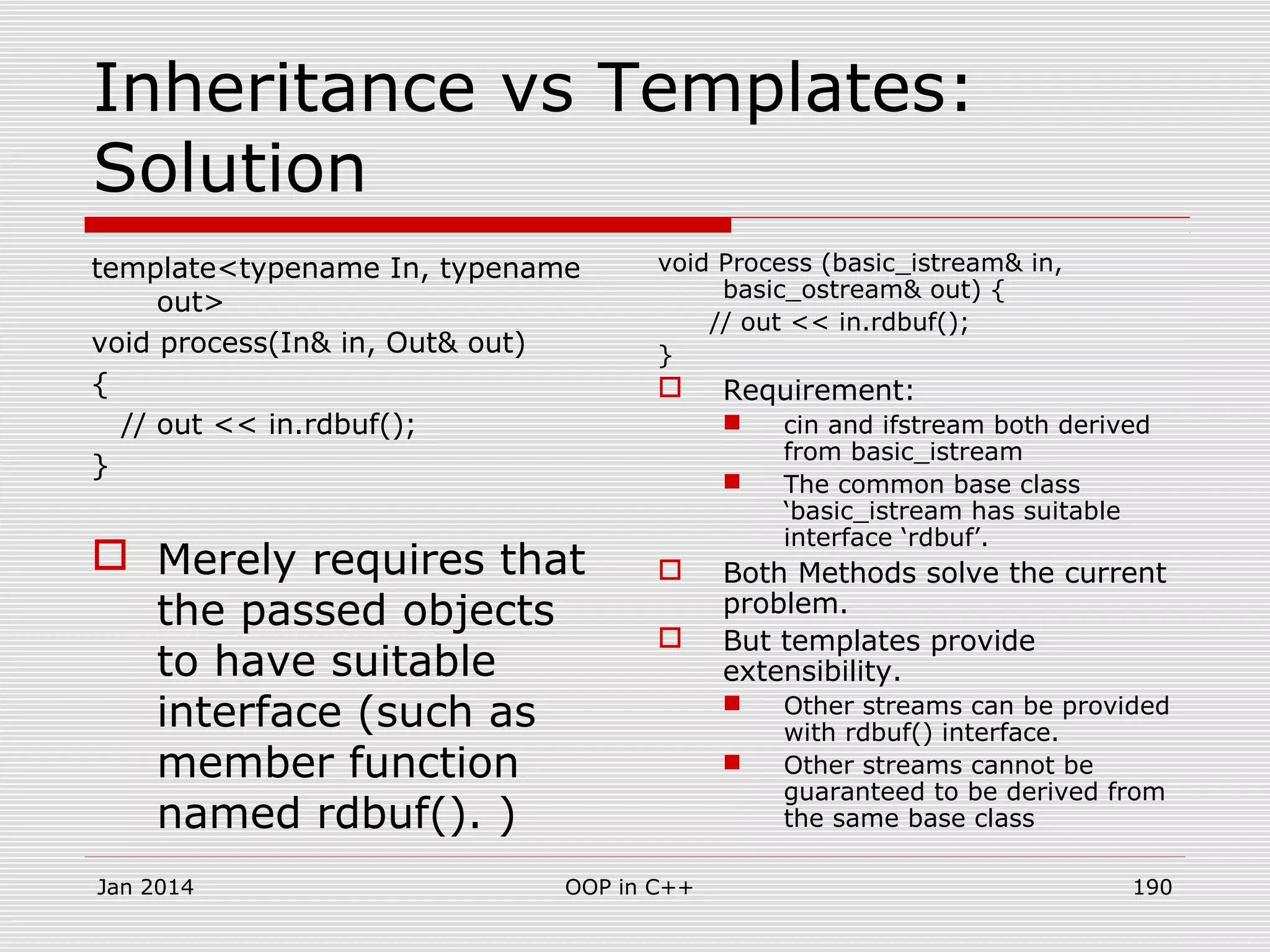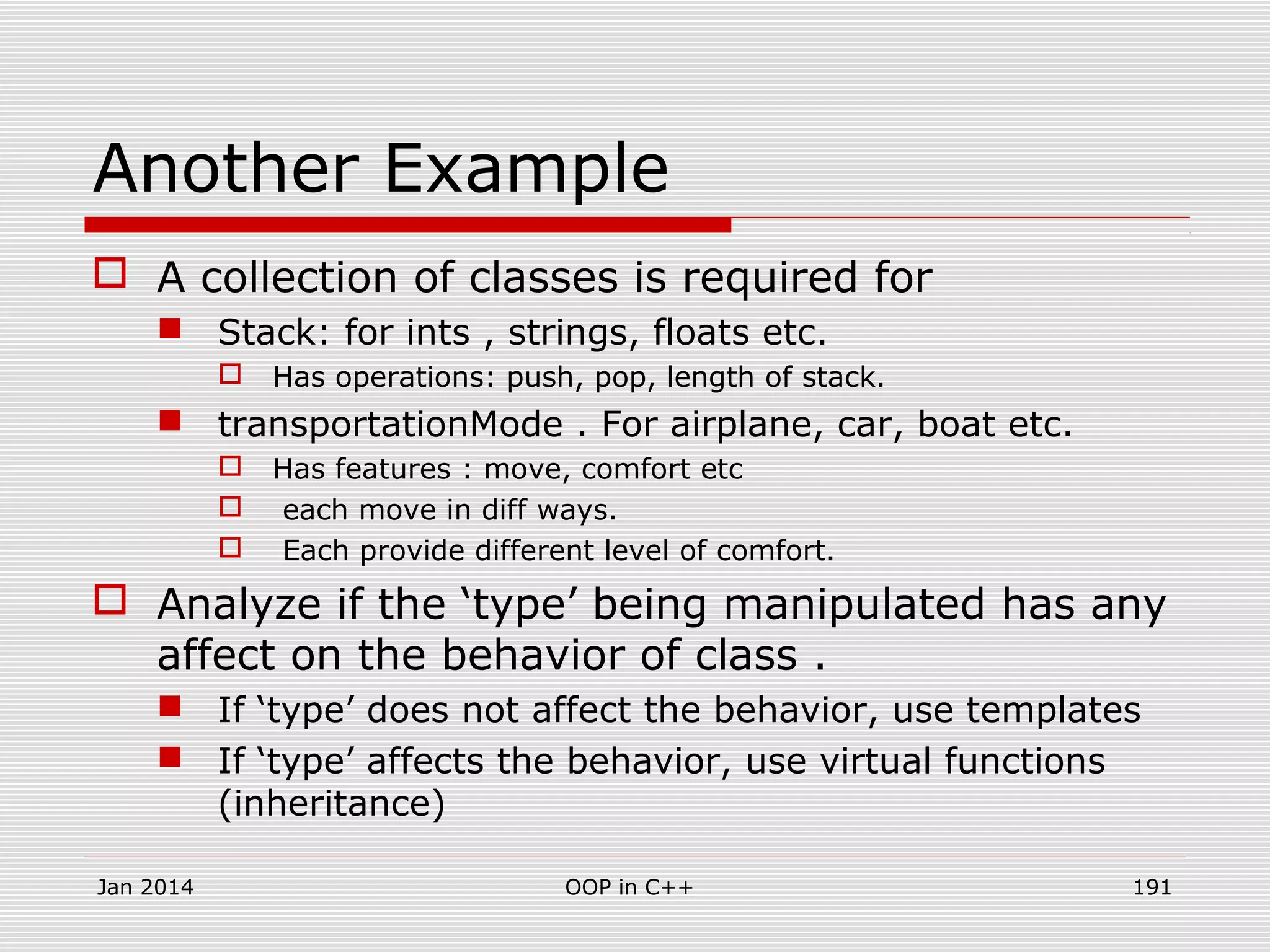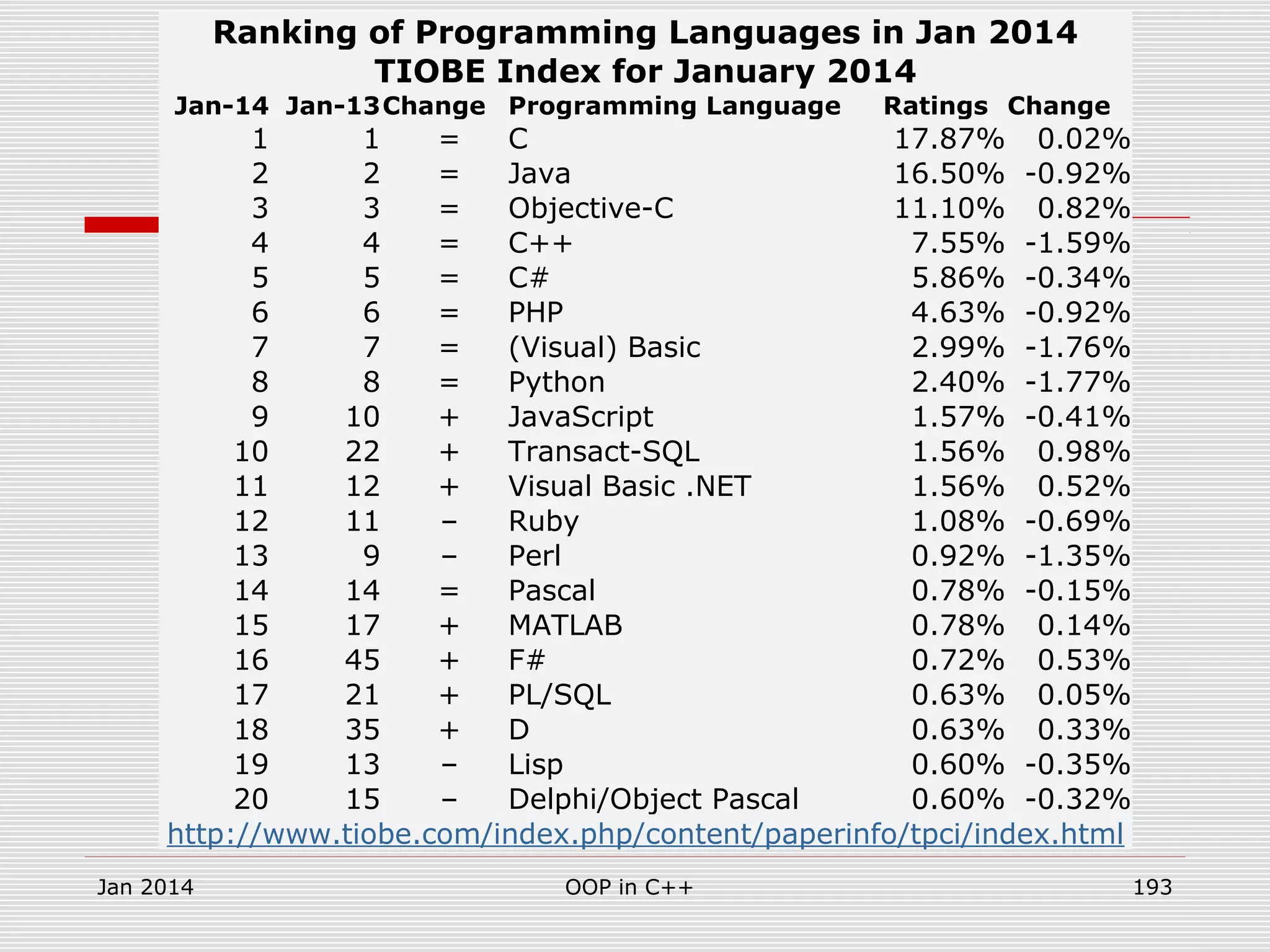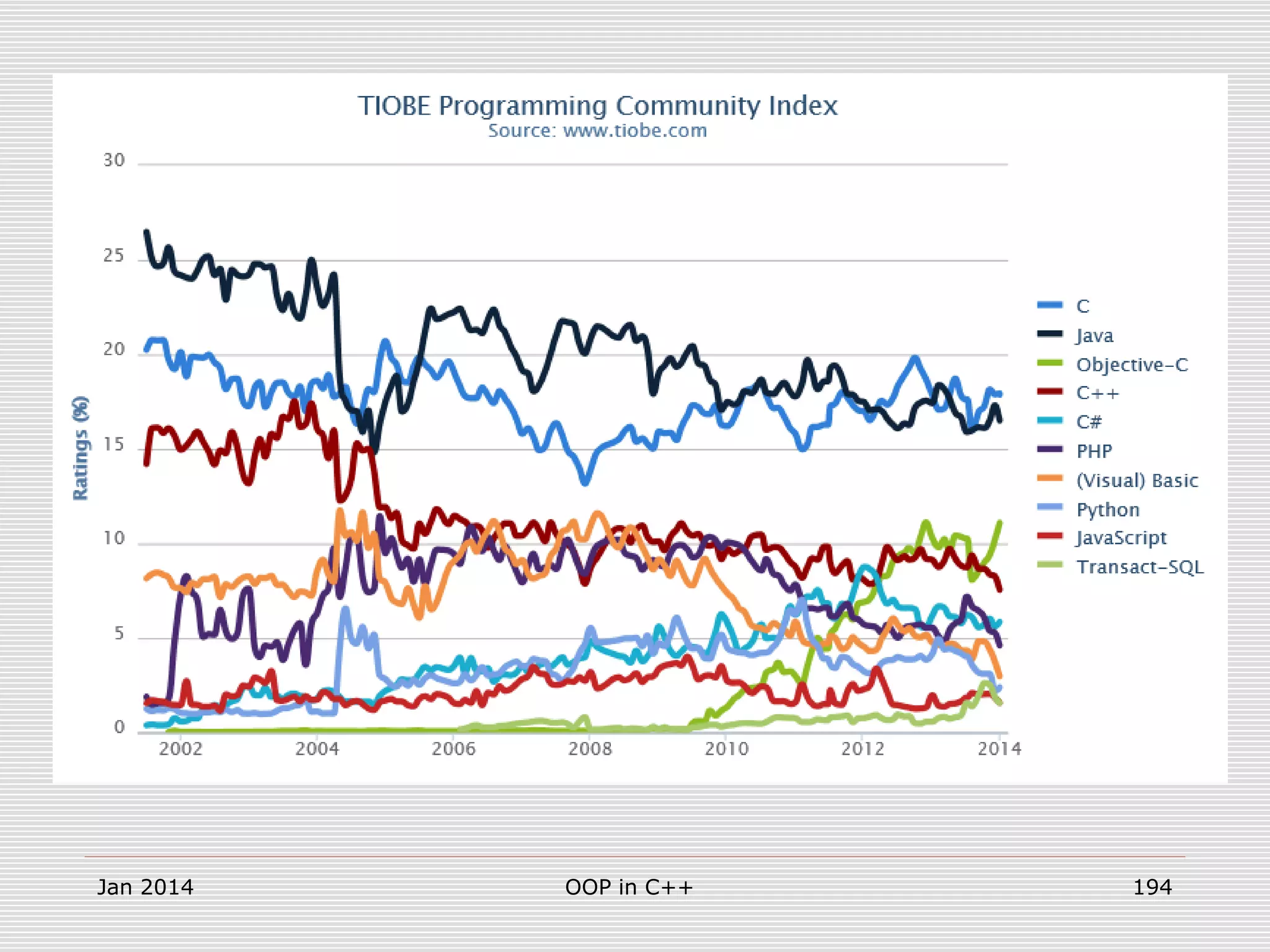This document discusses object-oriented programming in C++. It covers several topics related to OOP in C++ including classes, constructors, destructors, inheritance, polymorphism, and templates. The document consists of lecture slides that define key concepts and provide examples to illustrate how various OOP features work in C++.
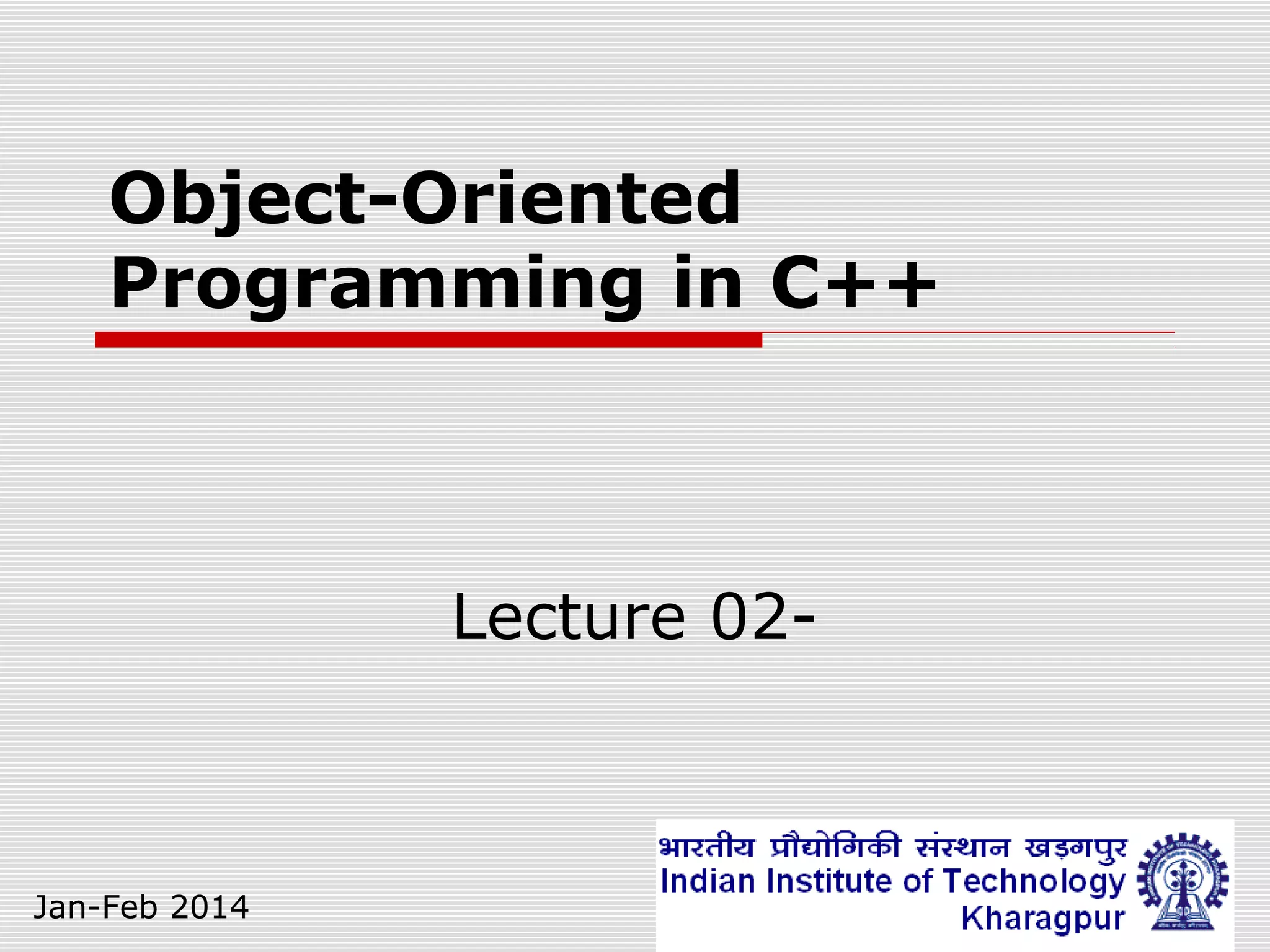
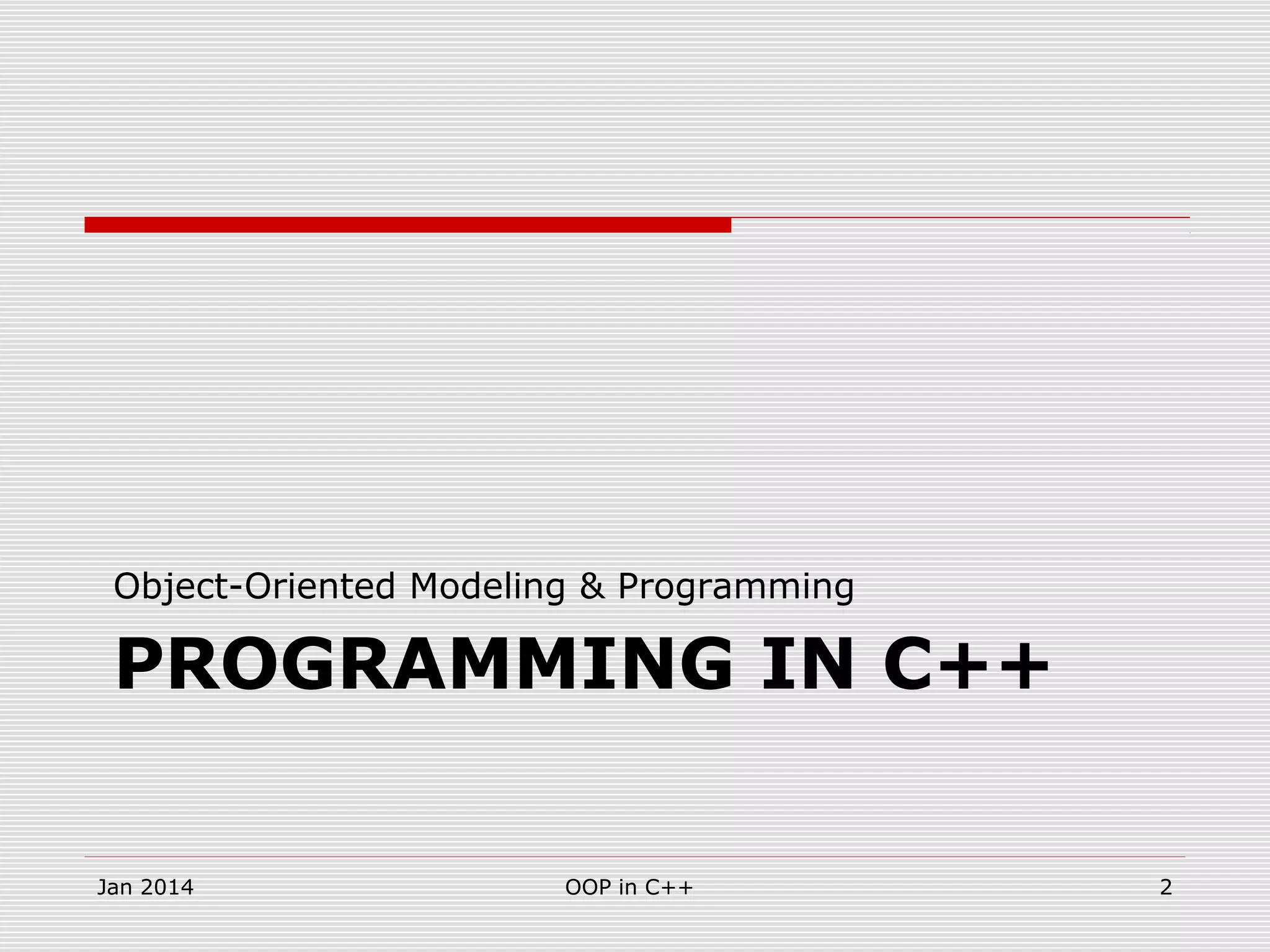
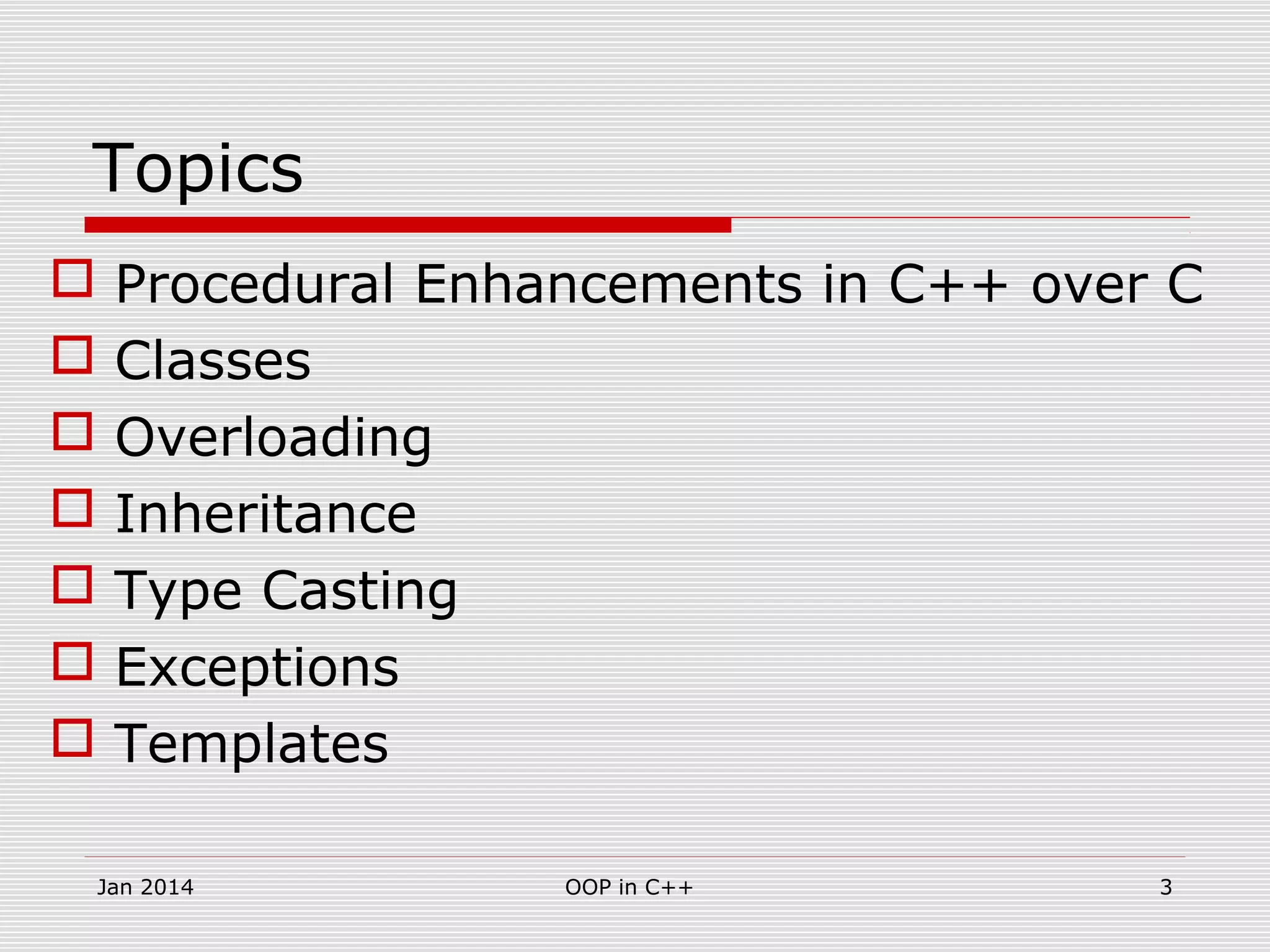

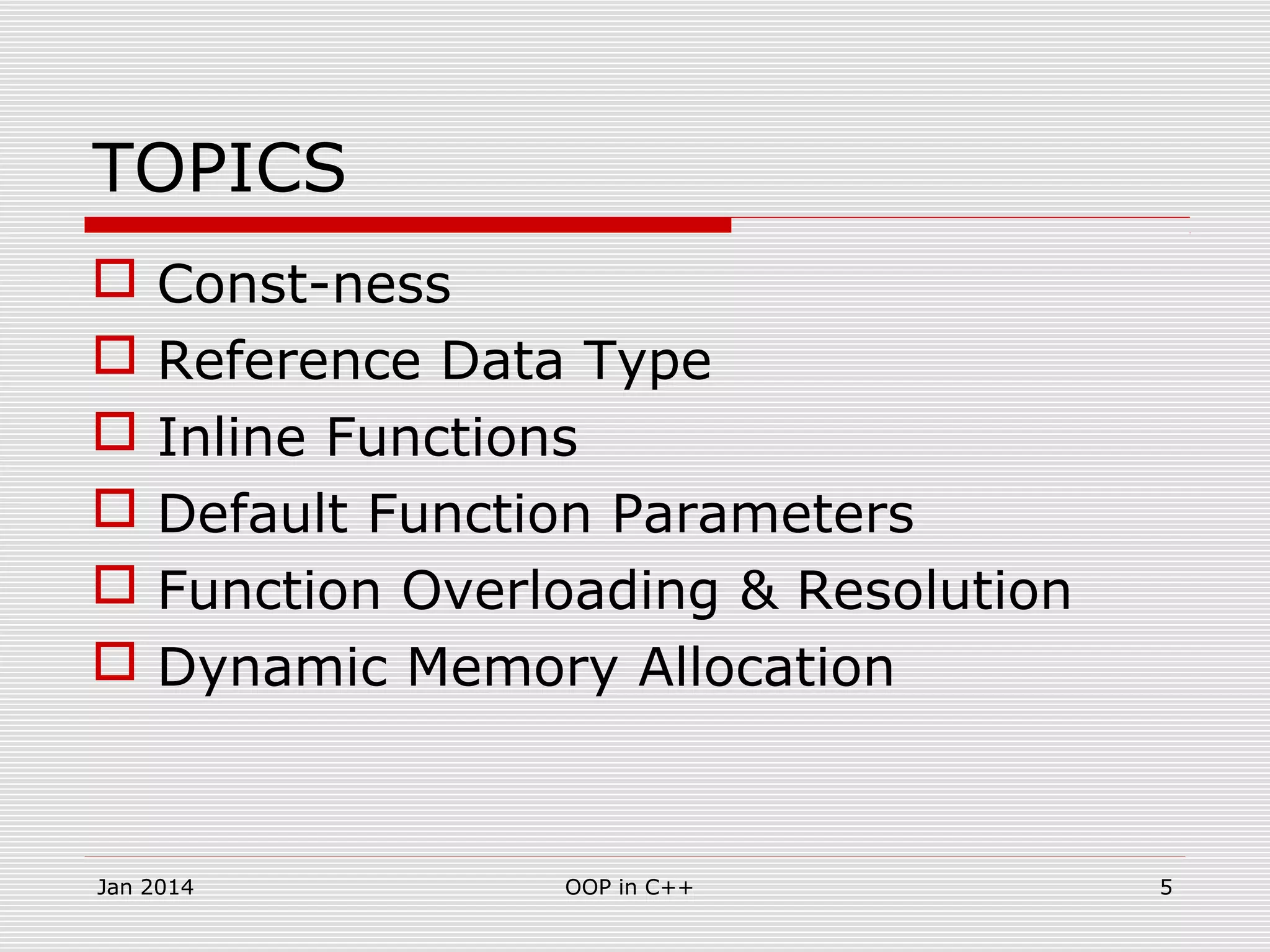
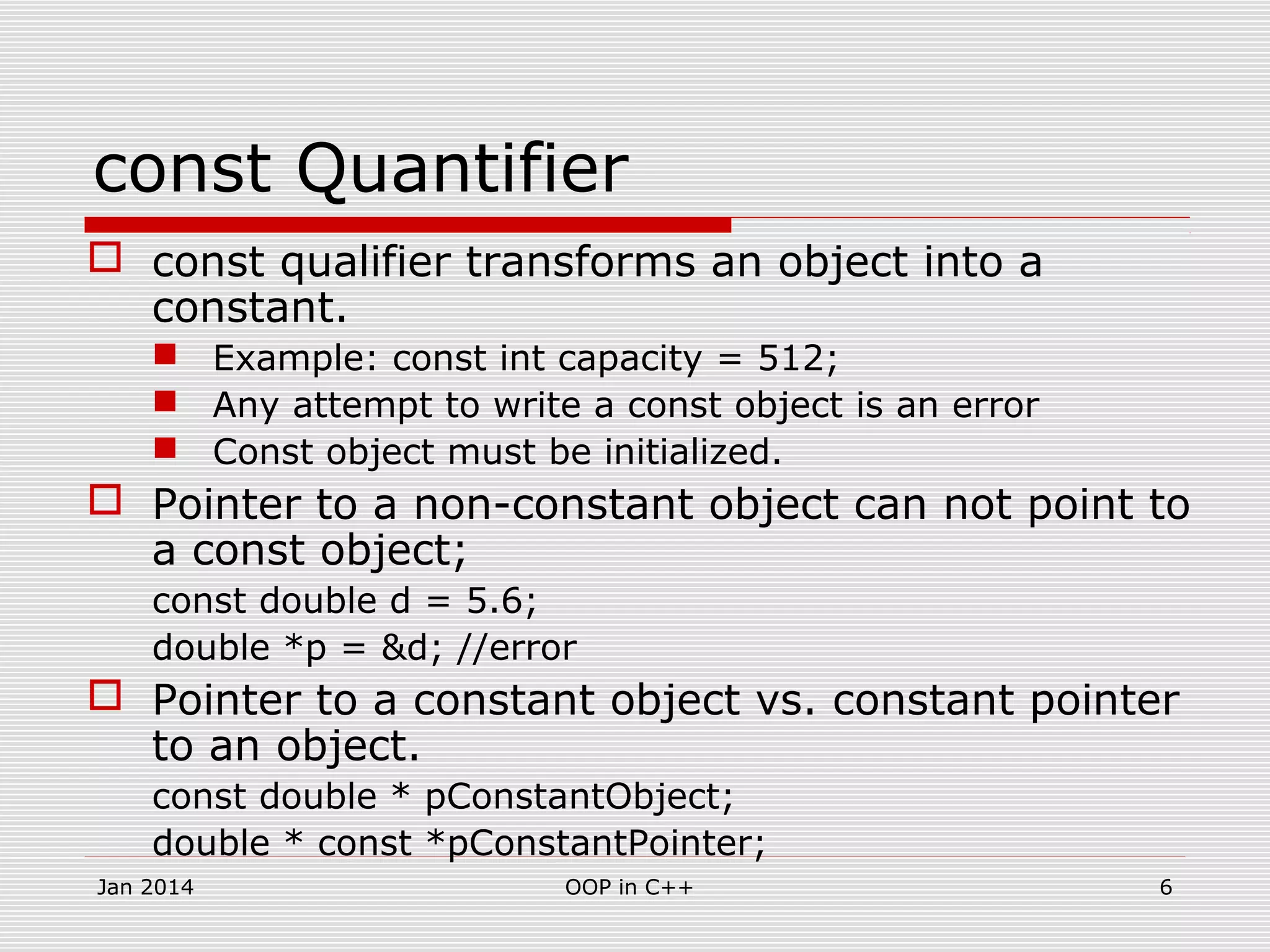
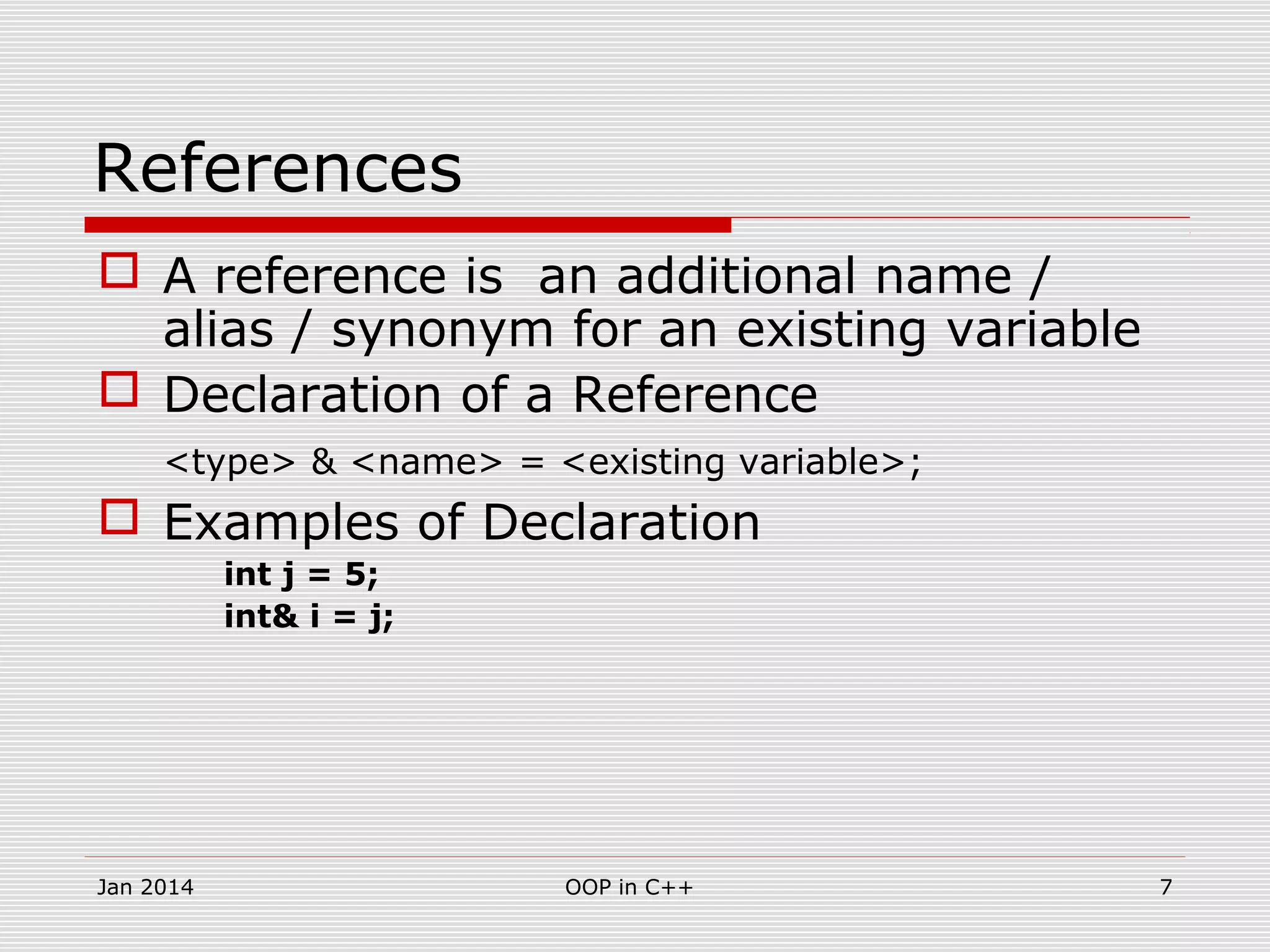
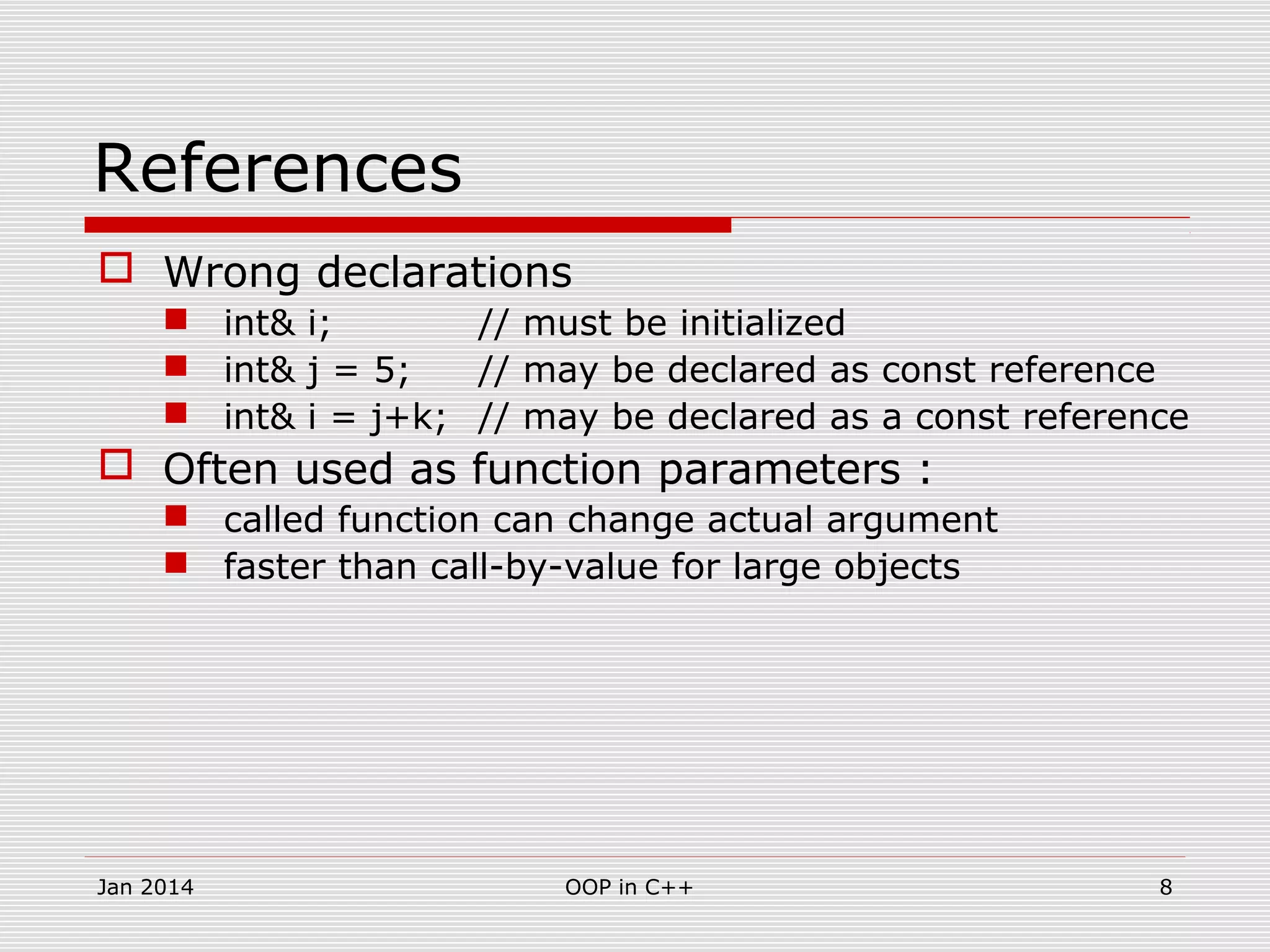
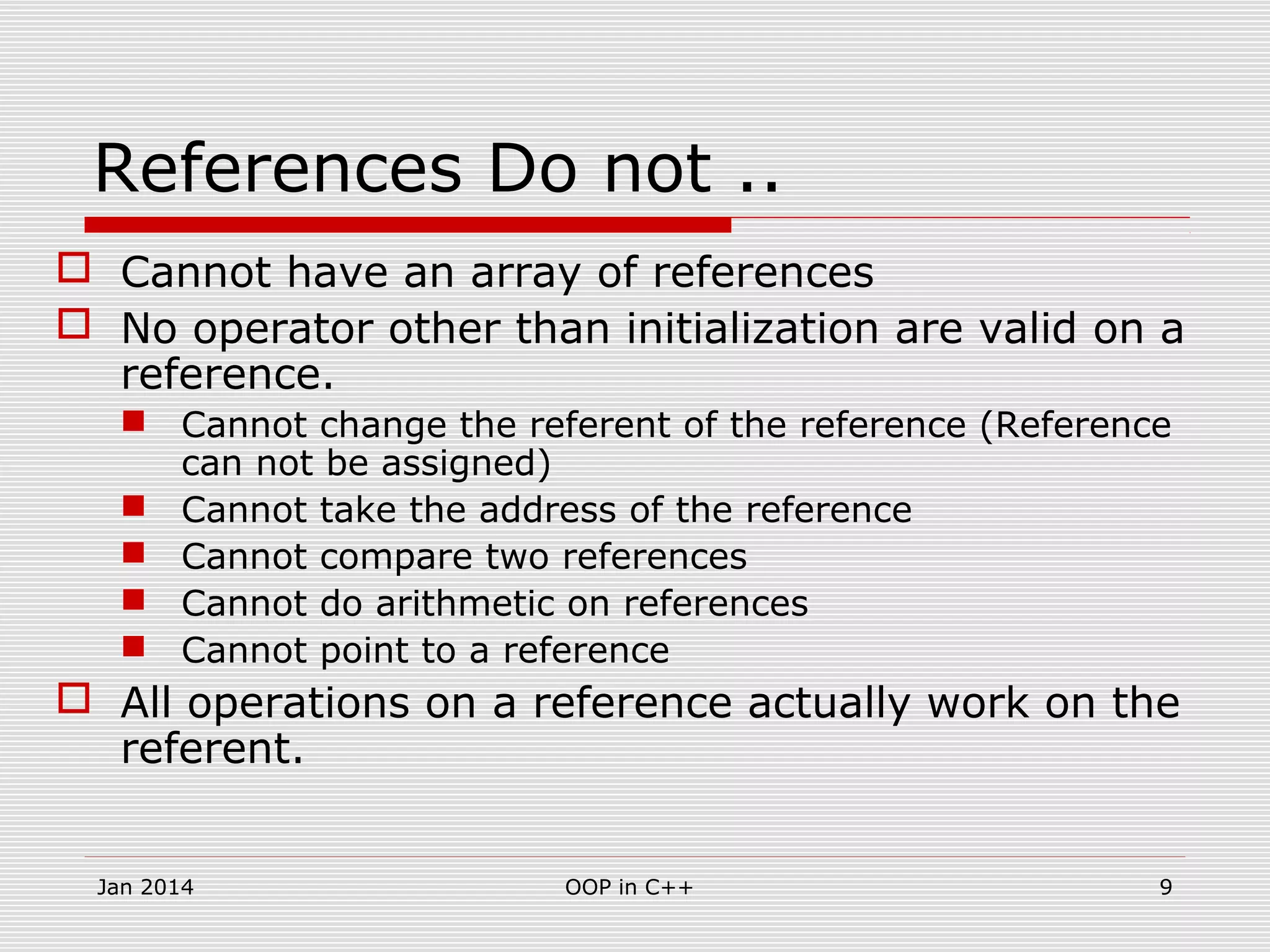
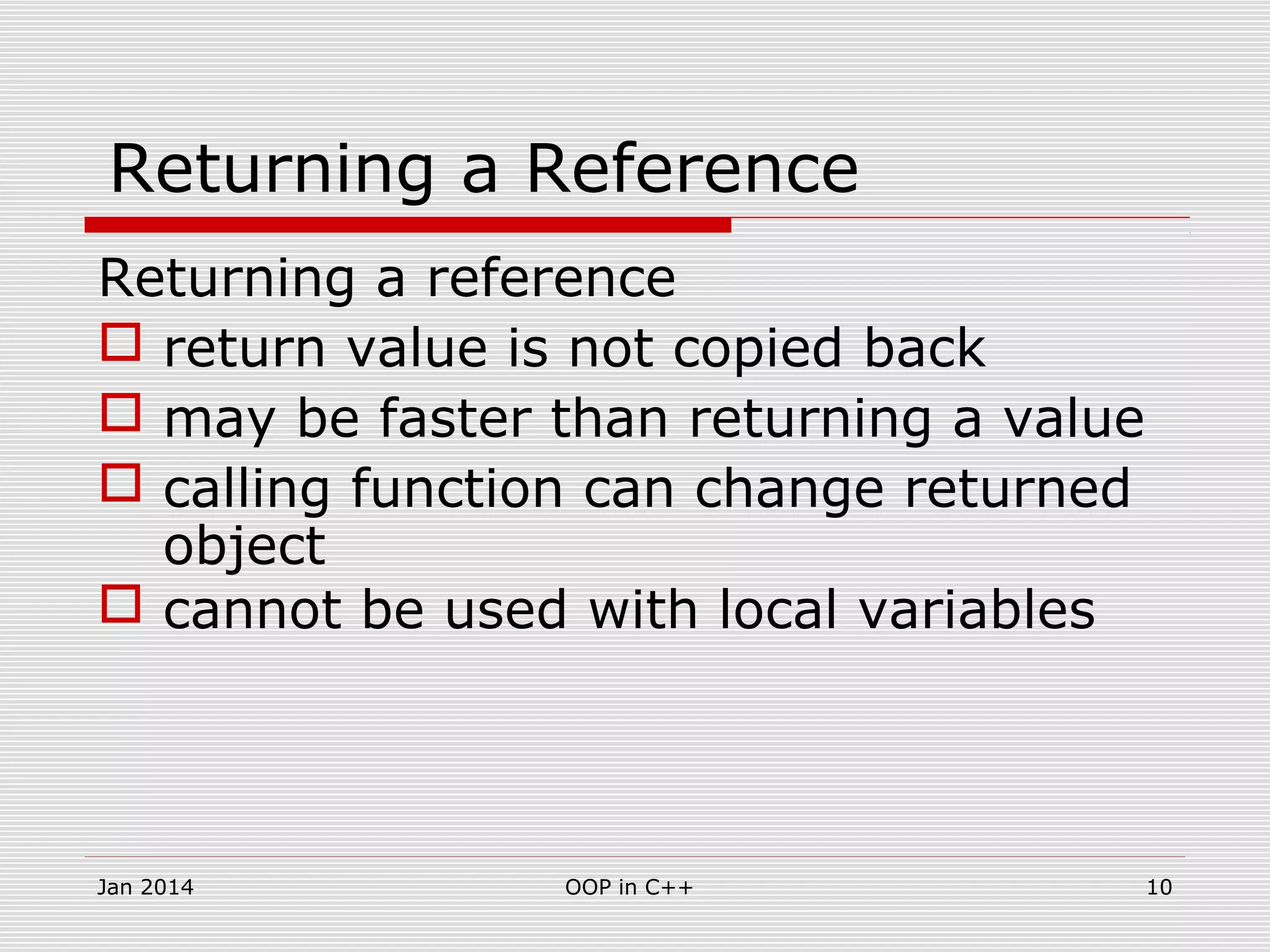
![Returning a Reference
#include <iostream>
using namespace std;
int& max(int& i, int& j) {
if (i > j)
return i;
else
return j;
}
int main(int, char *[]) {
int x = 42, y = 7500, z;
z = max(x, y) ; // z is now 7500
max(x, y) = 1 ; // y is now 1
cout << "x = " << x;
cout << " y = " << y;
cout << " z = " << z << "n";
return 0;
}
11OOP in C++Jan 2014](https://image.slidesharecdn.com/se-lecture02-30oopinc-140803025901-phpapp02/75/OOP-in-C-11-2048.jpg)
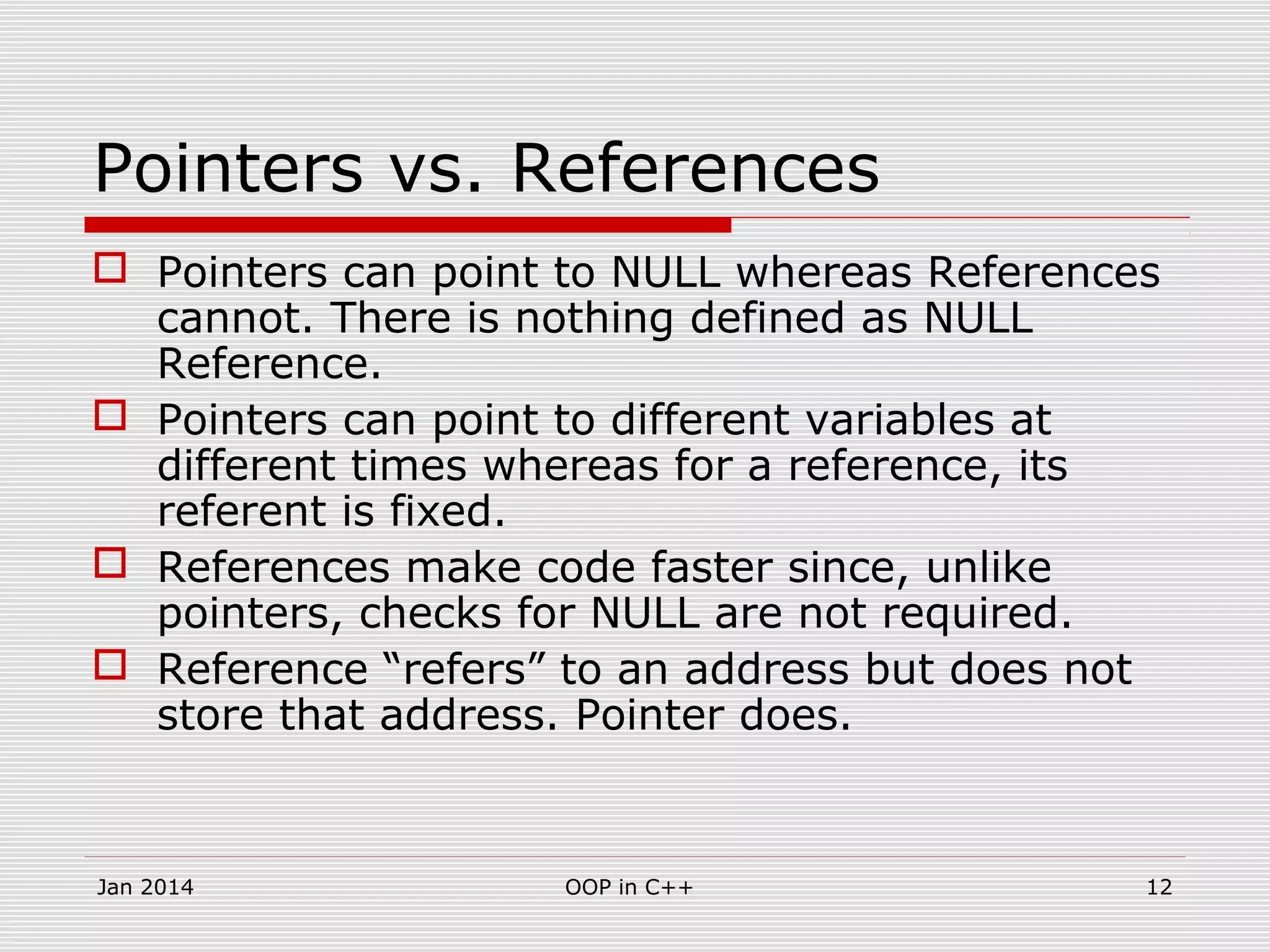
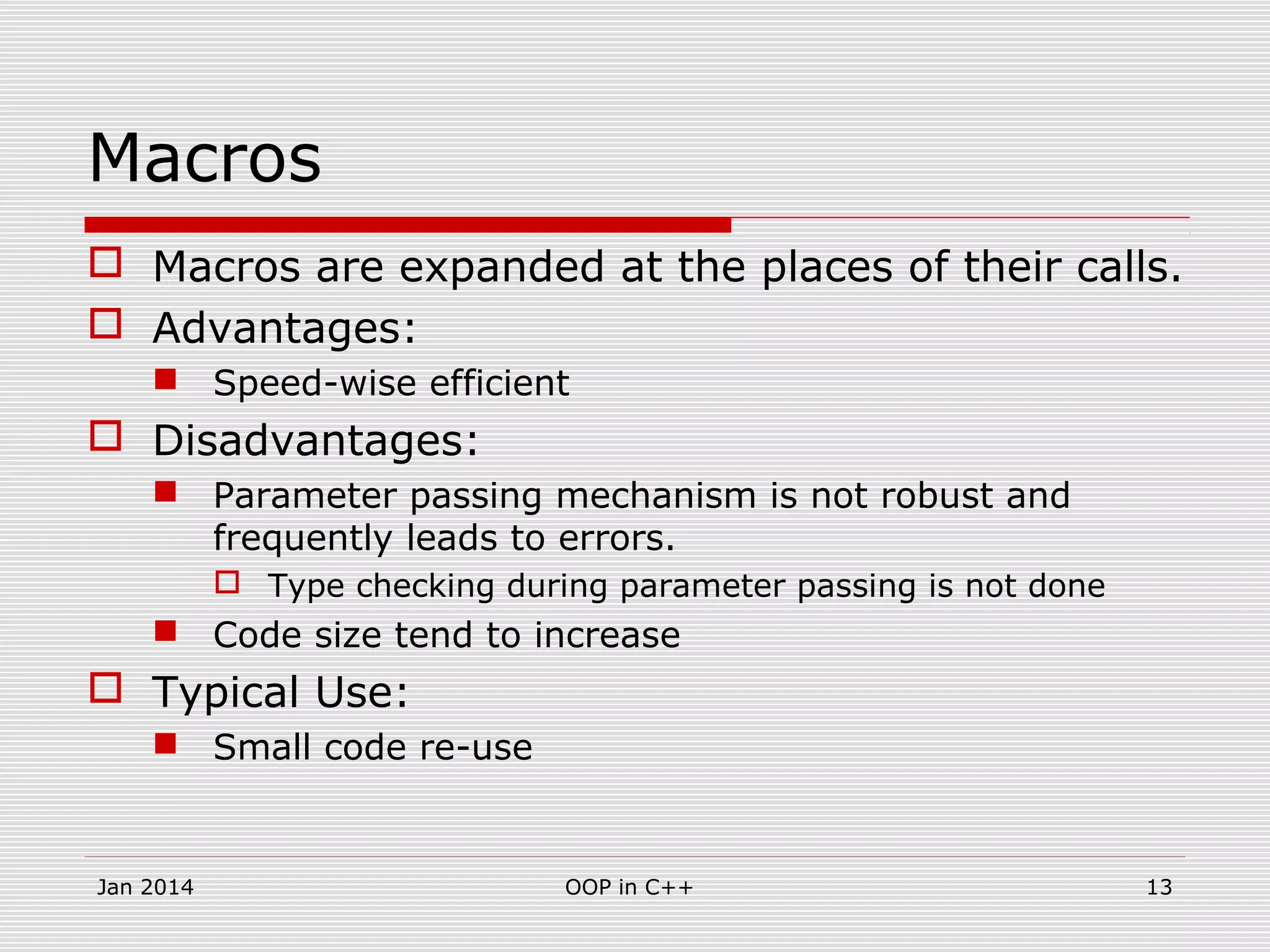
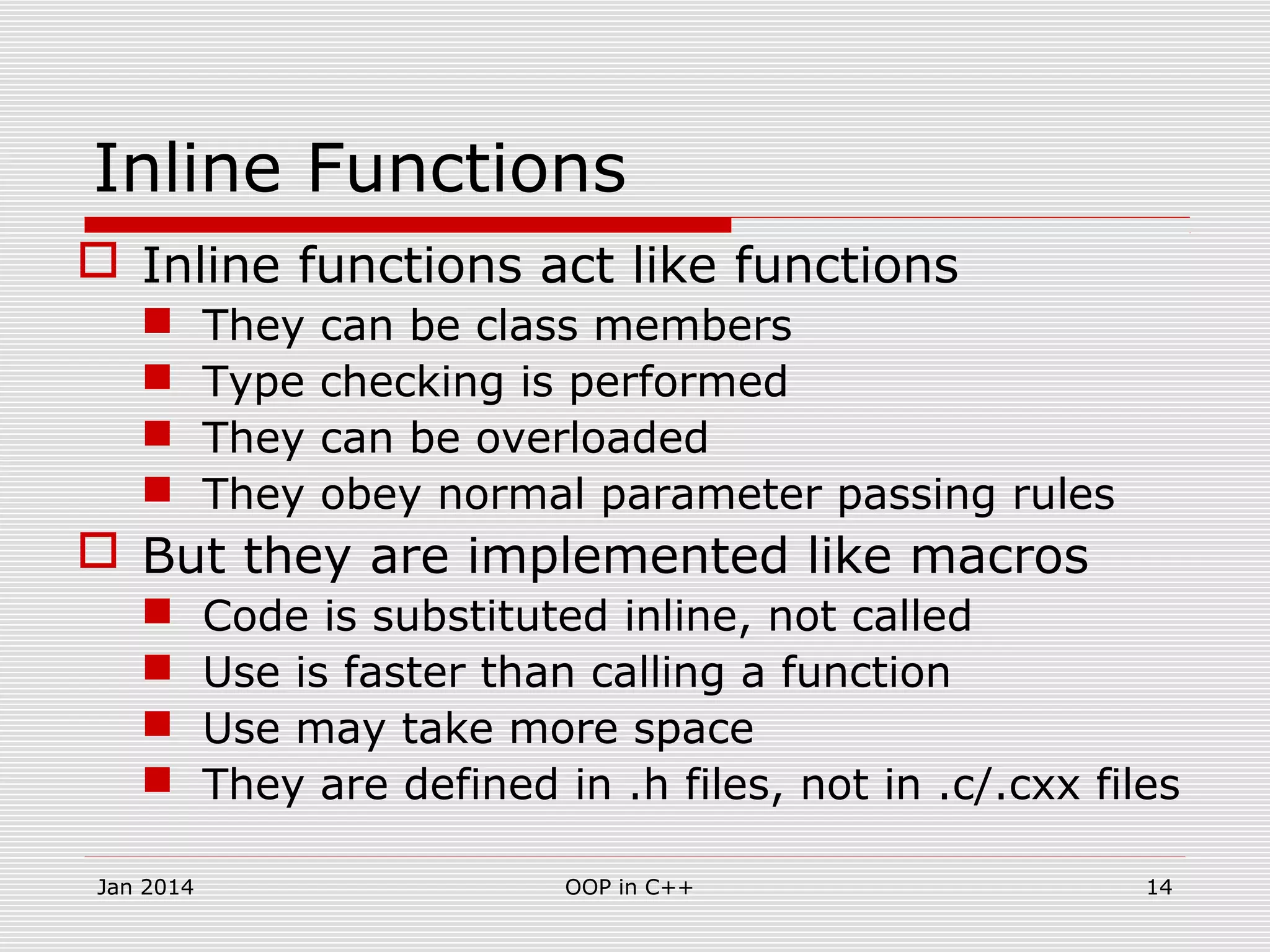
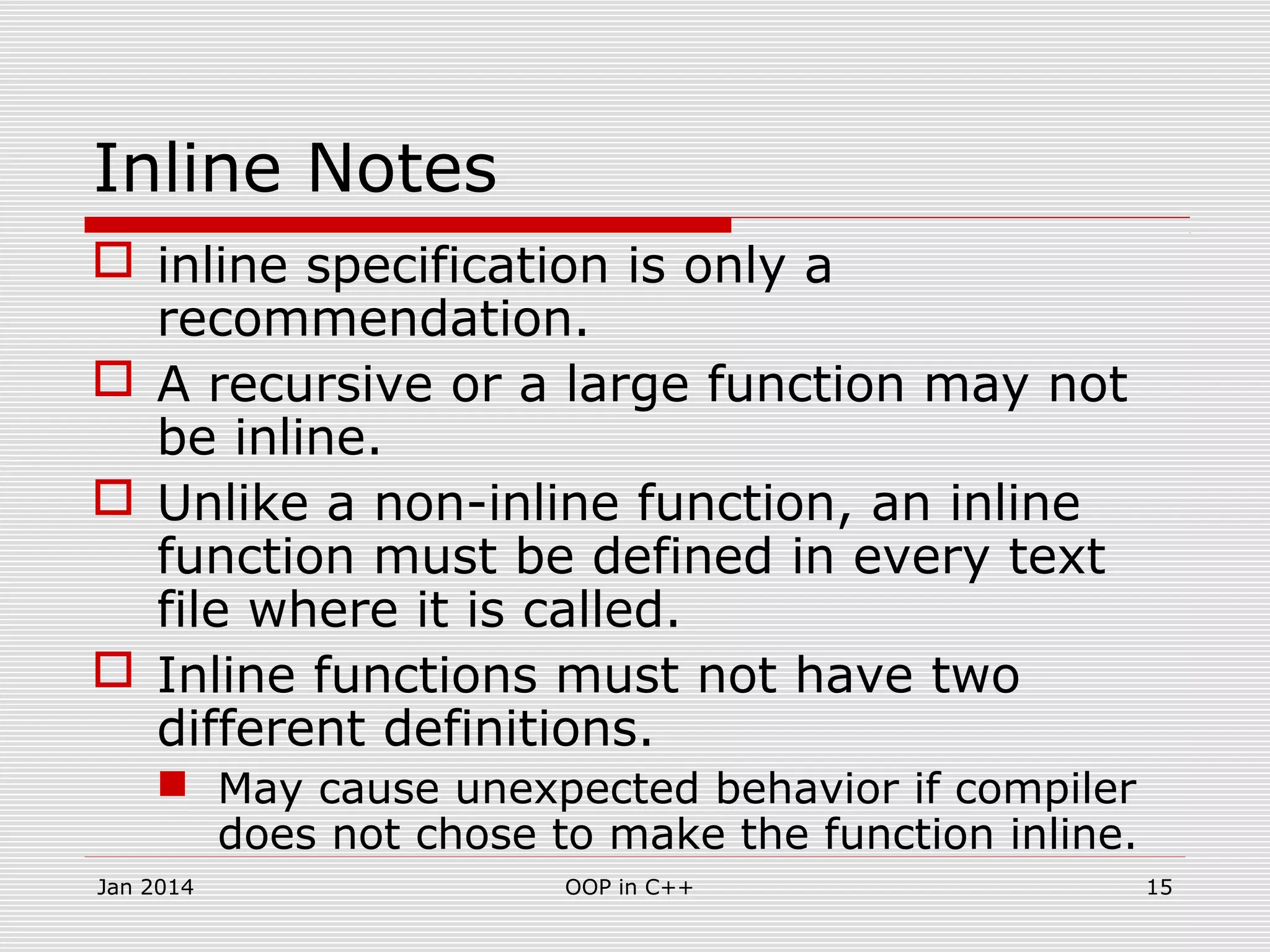
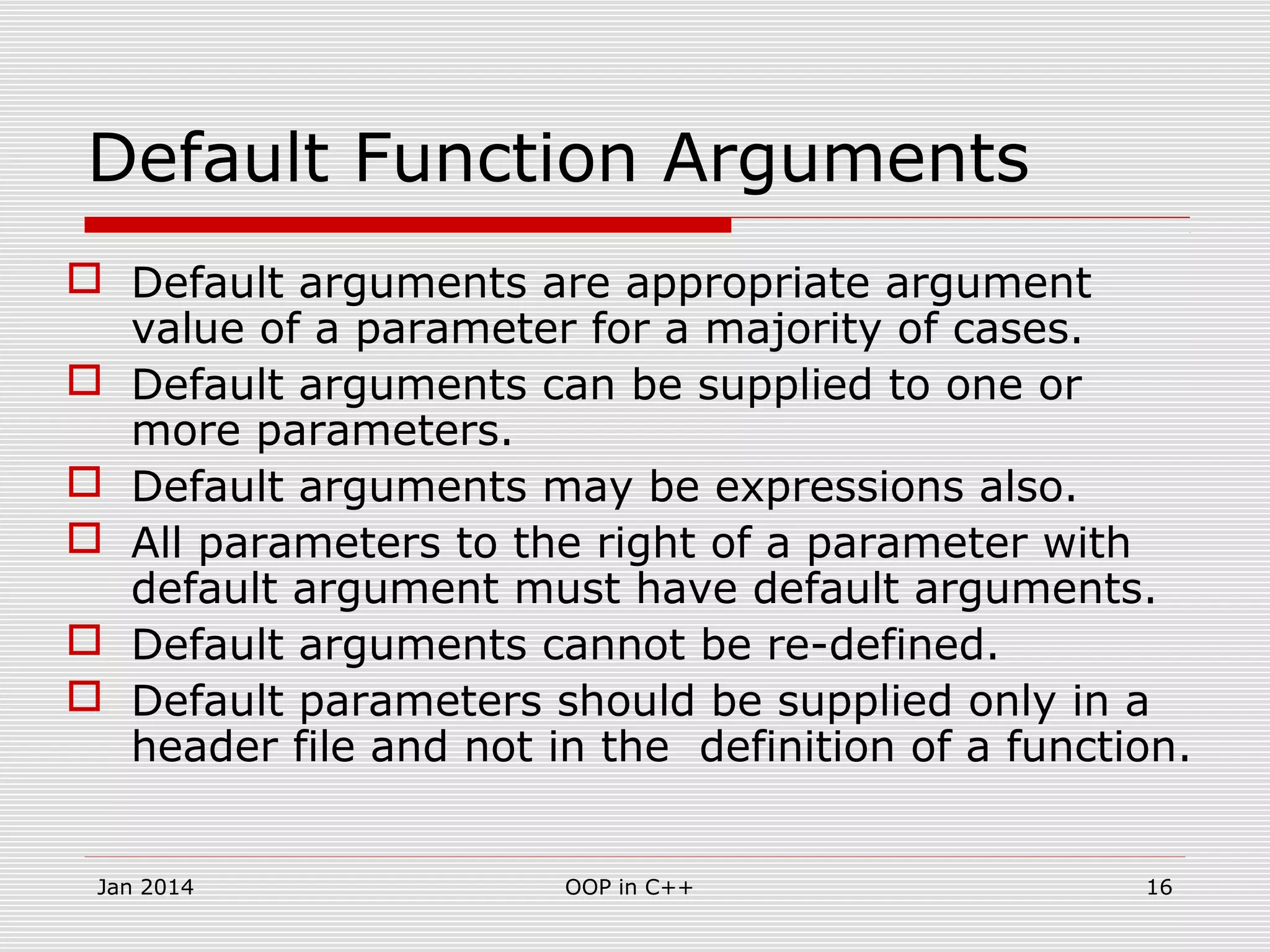
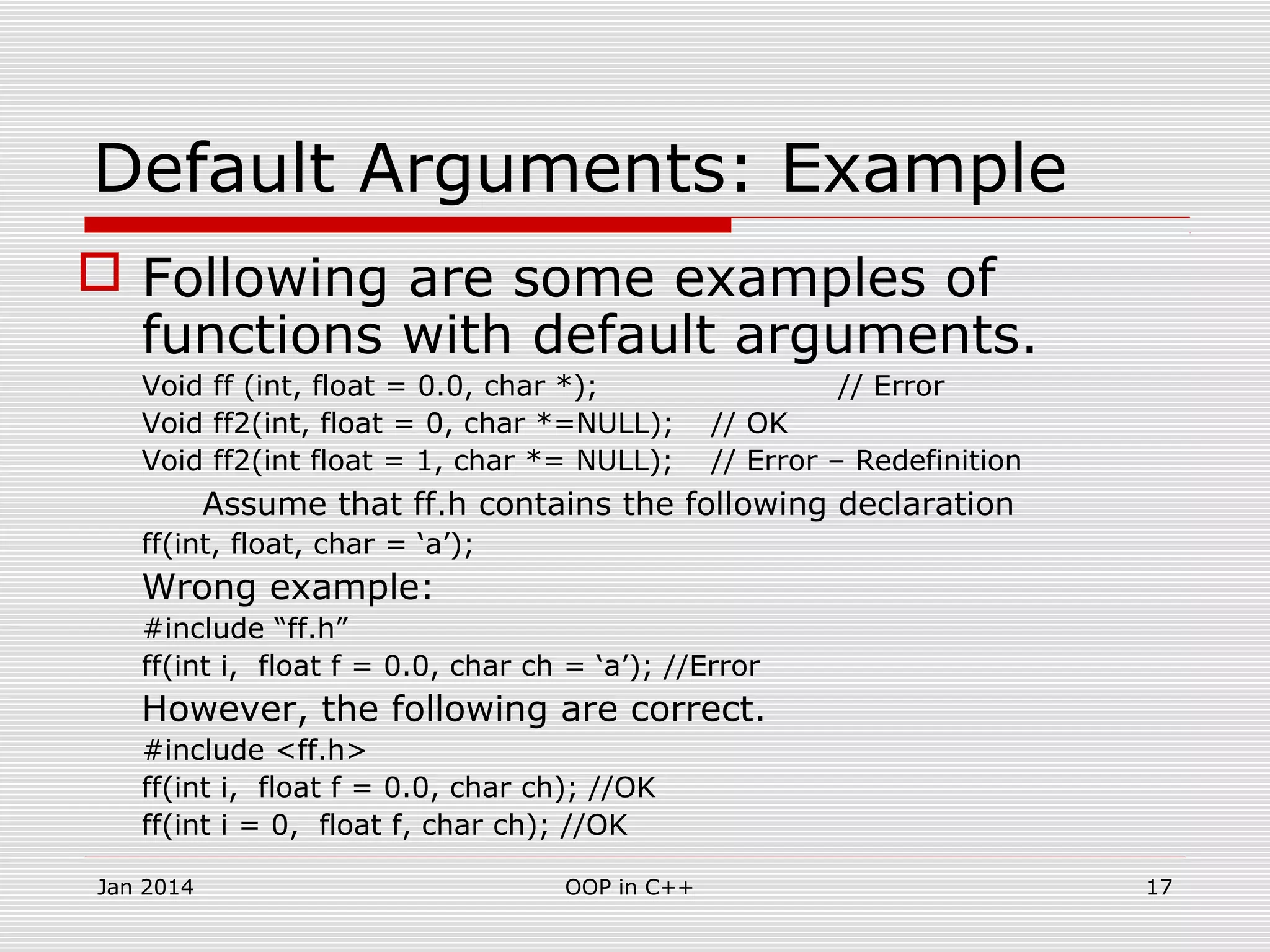
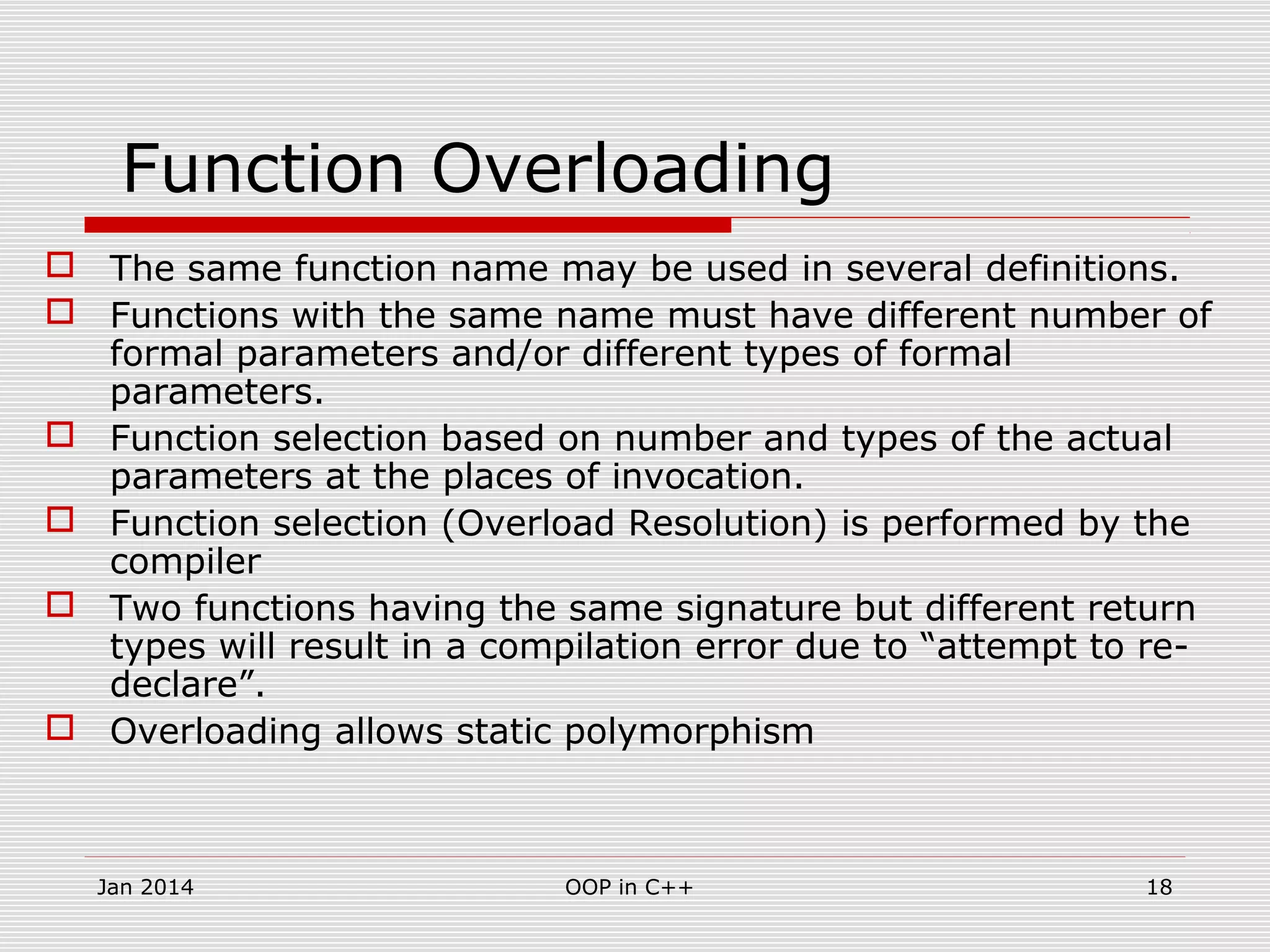
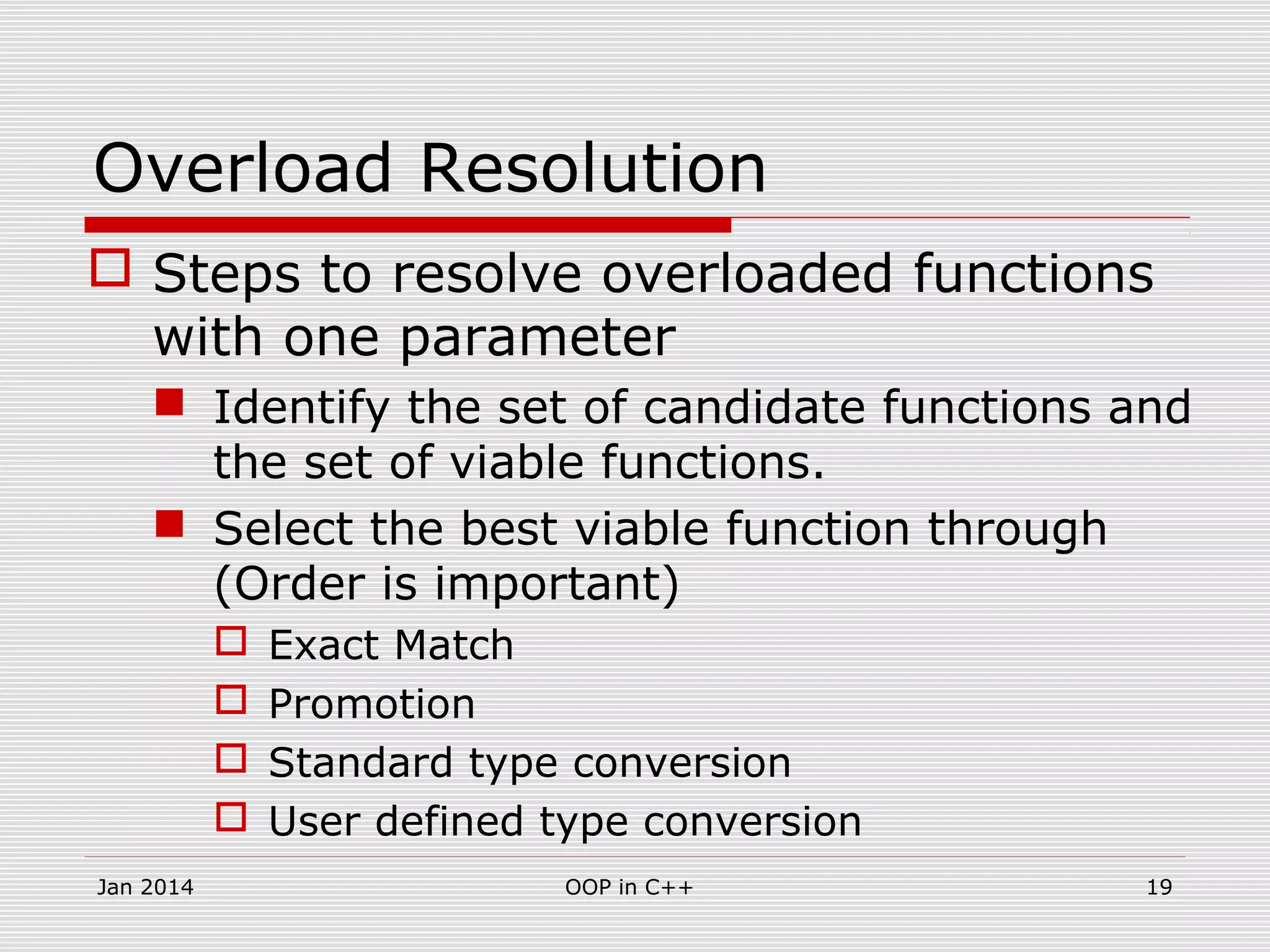
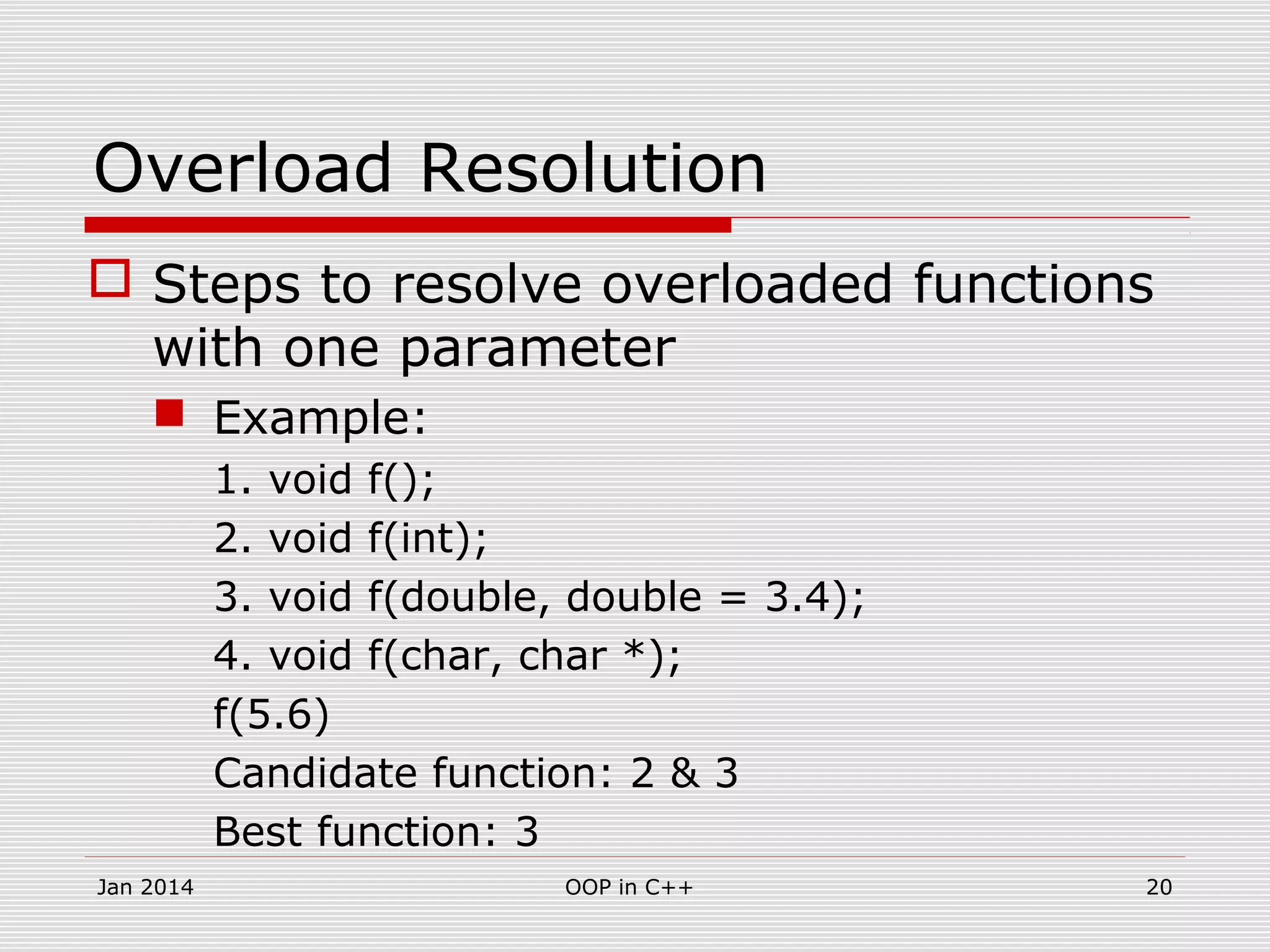
![Exact Match
lvalue-to-rvalue conversion
Most common
Array-to-pointer conversion
Definitions: int ar[10]; void f(int *a);
Call: f(ar)
Function-to-pointer conversion
Definitions: int (*fp) (int);
void f(int x, fp); int g(int);
Call: f(5, g)
Qualification conversion
Converting pointer (only) to const pointer.
21OOP in C++Jan 2014](https://image.slidesharecdn.com/se-lecture02-30oopinc-140803025901-phpapp02/75/OOP-in-C-21-2048.jpg)
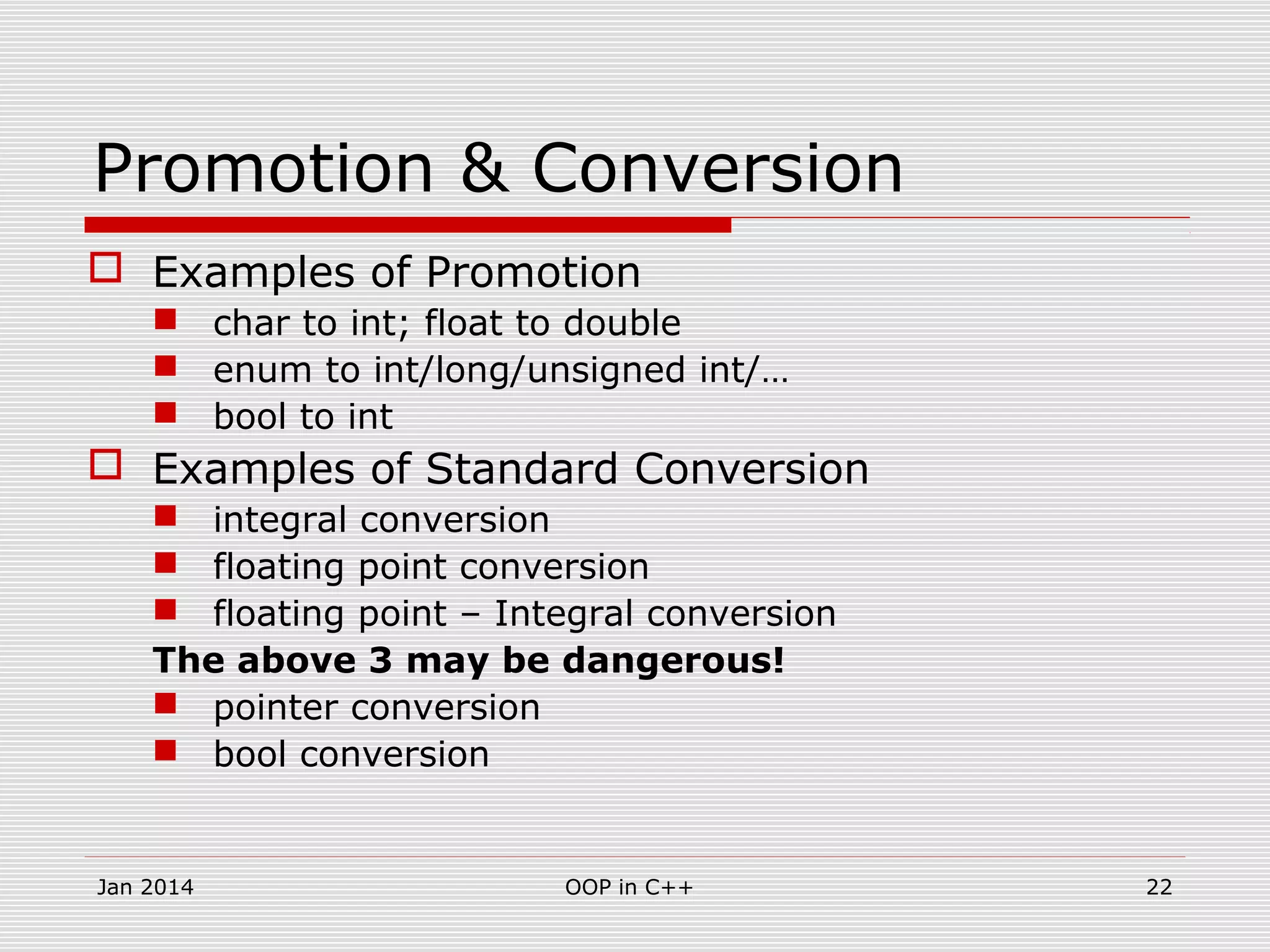
![Examples of Resolution
1. Promotion
enum e1 { a1, b1, c1 };
enum e2 { a2, b2, c2 = 0x80000000000 };
char *f(int); char *f(unsigned int);
int main() {
f(a1); //Which f?
f(a2); //Which f?
}
2. Standard Conversion
void print(int); void print(char *);
void set (int *);
void set (const char *);
int main() {
print (0); //Which print?
set (0); //Which set?
}
3. Conversion Sequence
int arr[3];
void putValues(const int *);
int main() {
putValues(arr);
}
23OOP in C++Jan 2014](https://image.slidesharecdn.com/se-lecture02-30oopinc-140803025901-phpapp02/75/OOP-in-C-23-2048.jpg)
![new/delete operators
In C++, the new and delete operators provide built-in
language support for dynamic memory allocation and de-
allocation.
int *pI = new int;
int *pI = new int(102); //new initializes!!
int *pArr = new int[4*num];
Arrays generally cannot be initialized.
const int *pI = new const int(100);
Array of constant cannot be created.
delete pI;
delete [] pArr;
new is polymorphic
new does more than malloc!
24OOP in C++Jan 2014](https://image.slidesharecdn.com/se-lecture02-30oopinc-140803025901-phpapp02/75/OOP-in-C-24-2048.jpg)
![new/delete & malloc/free
All C++ implementations also permit use of
malloc and free routines.
Do not free the space created by new.
Do not delete the space created by malloc
Results of the above two operations is memory
corruption.
Matching operators
malloc-free
new-delete
new[] – delete []
It is a good idea to use only new and delete in
a C++ program.
25OOP in C++Jan 2014](https://image.slidesharecdn.com/se-lecture02-30oopinc-140803025901-phpapp02/75/OOP-in-C-25-2048.jpg)
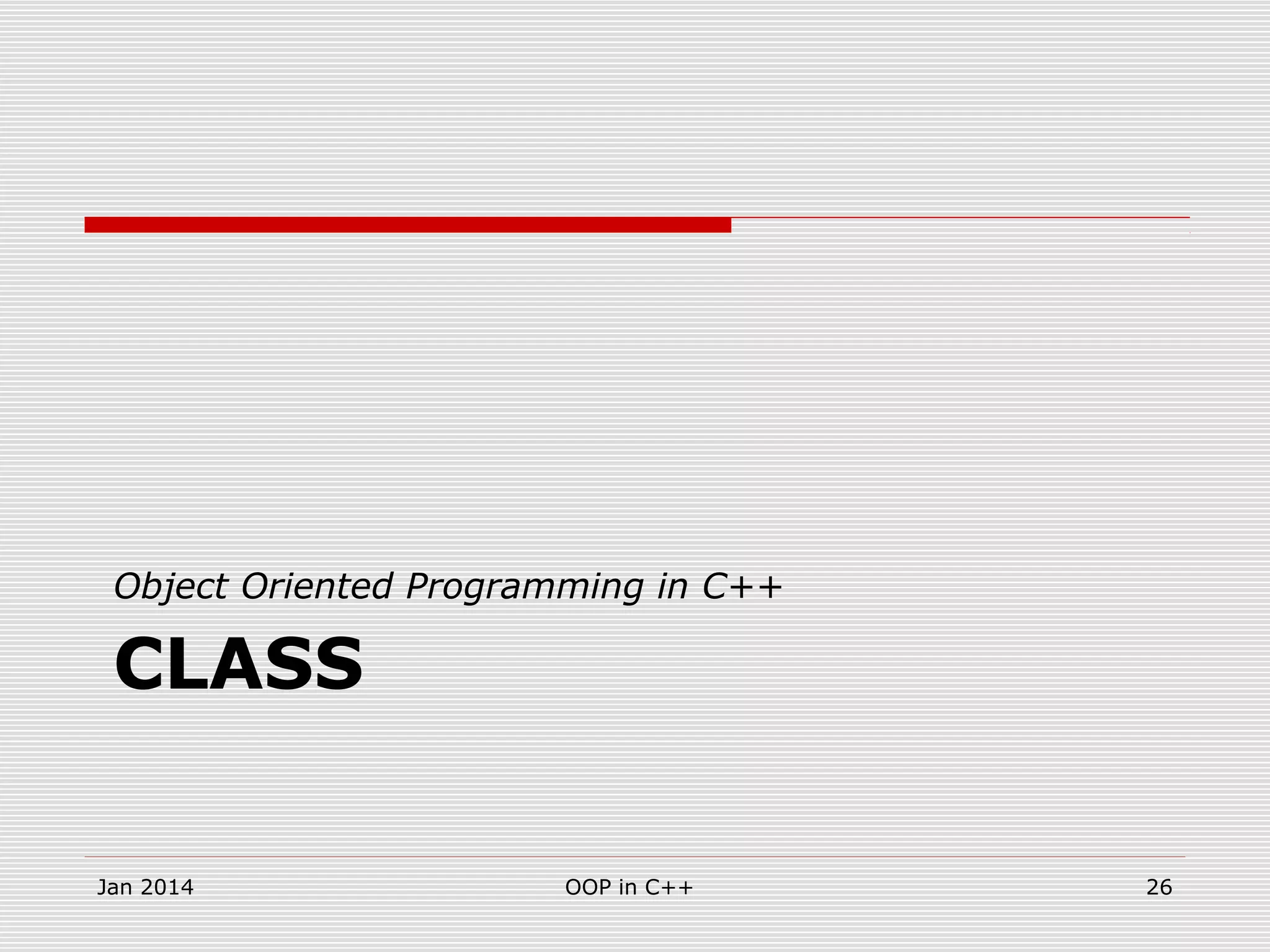
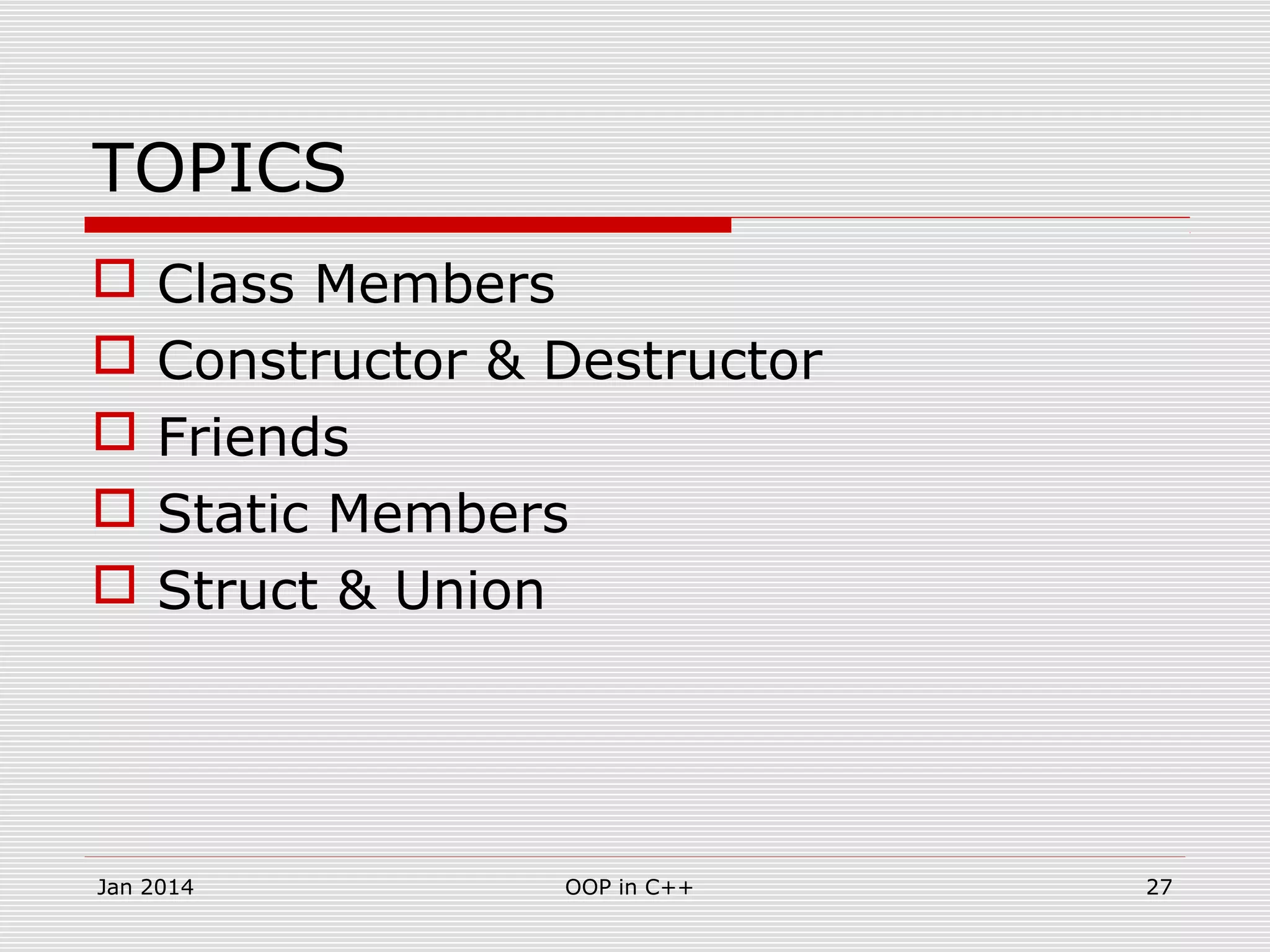
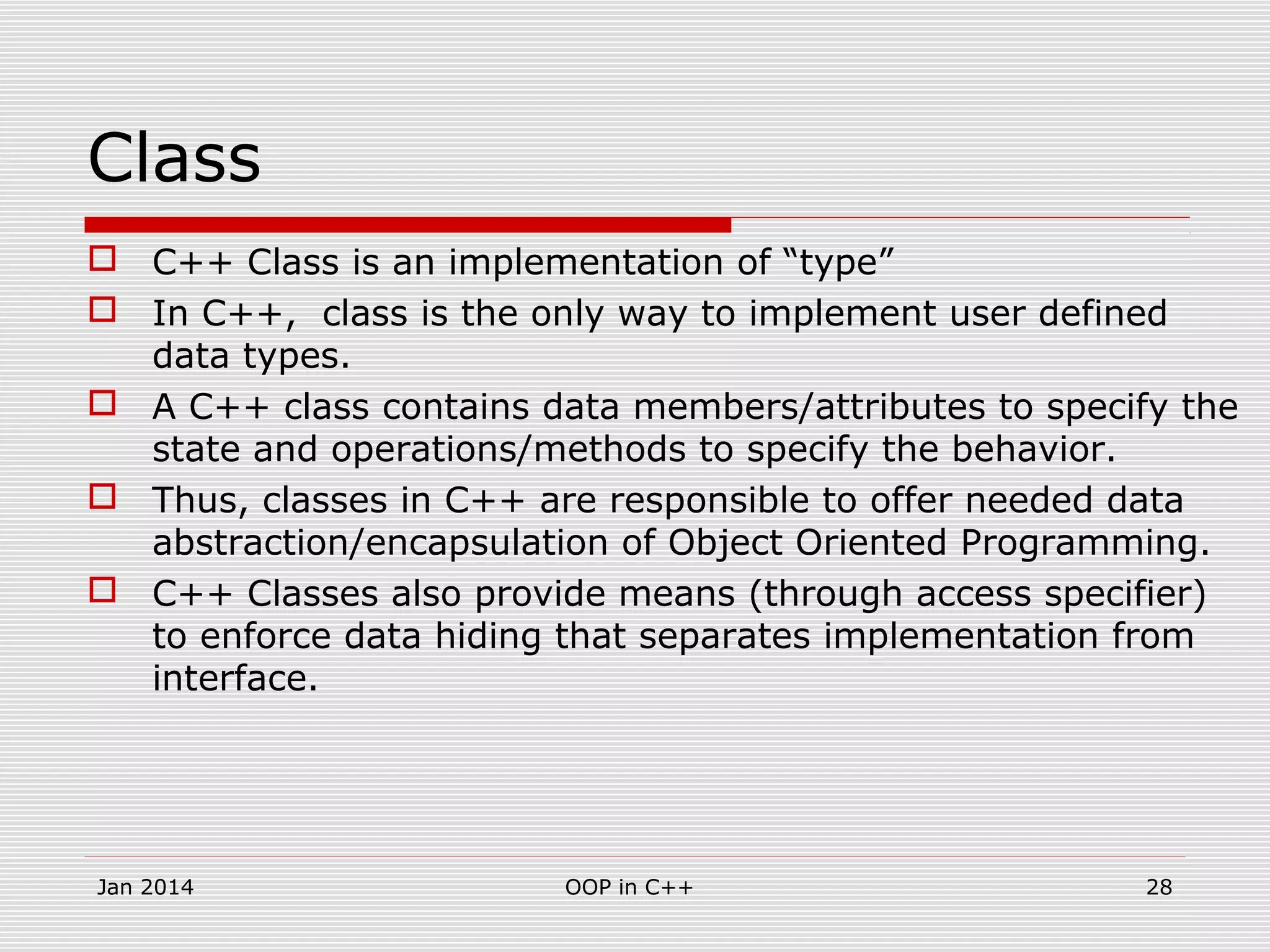
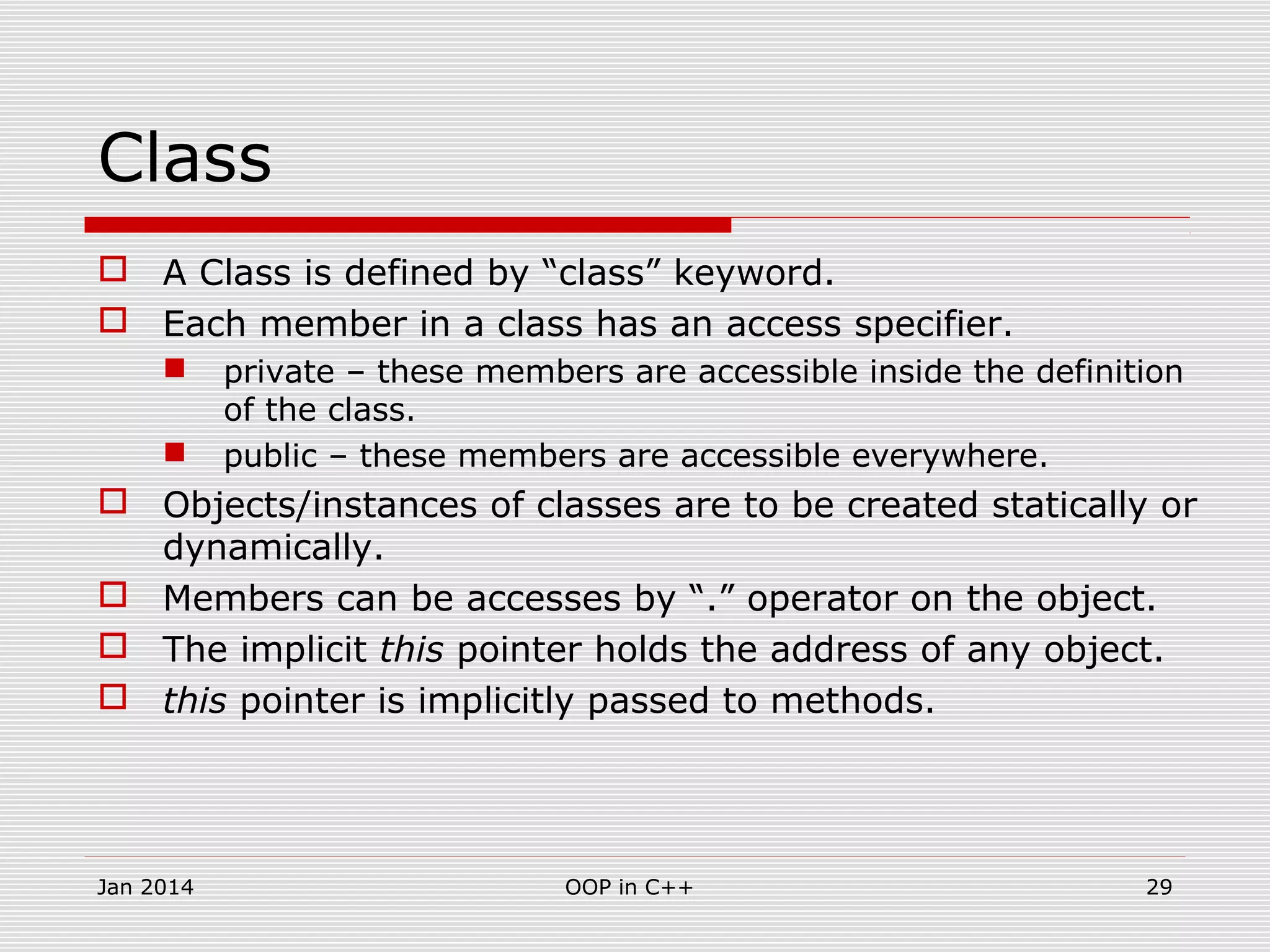
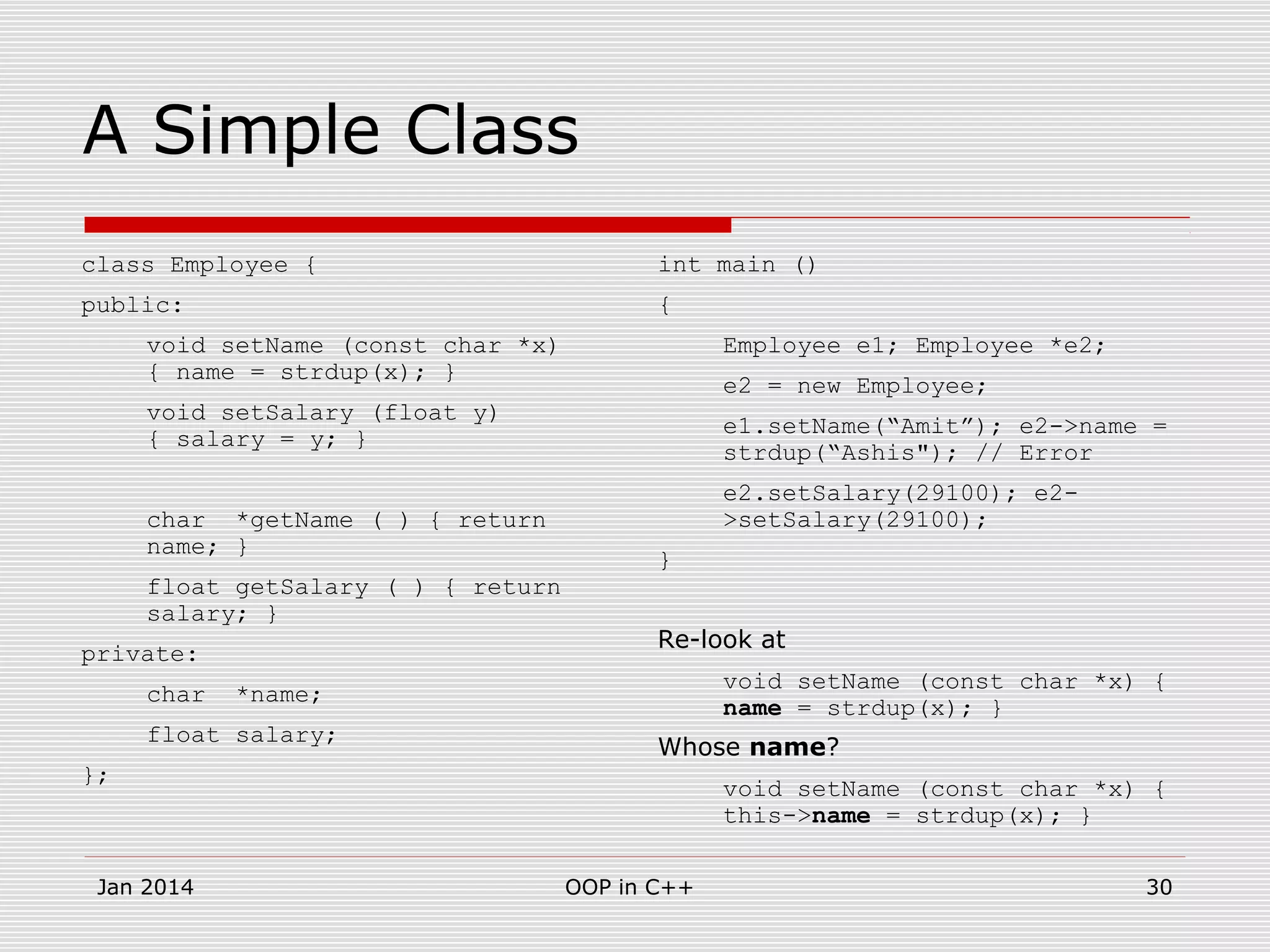
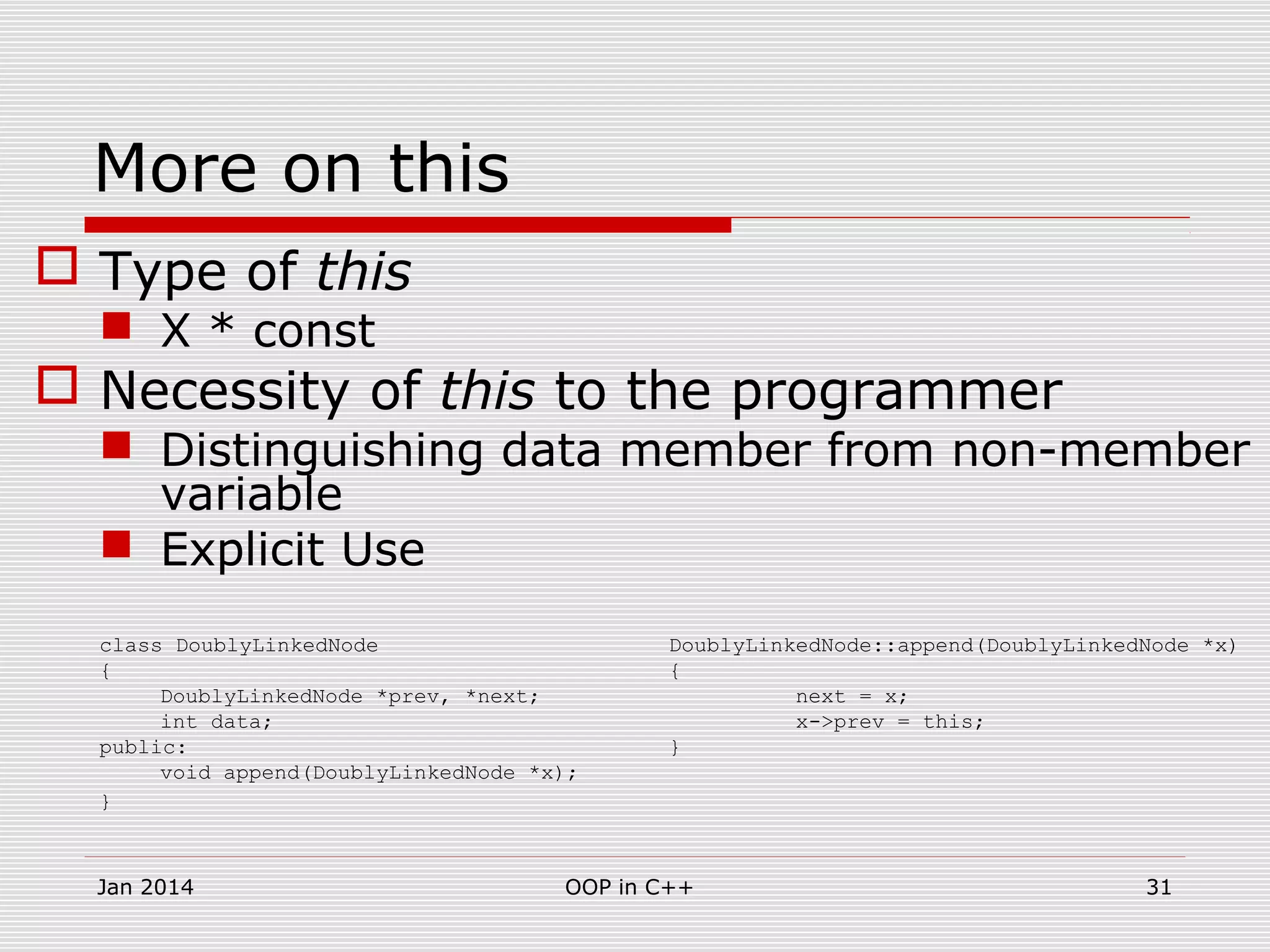
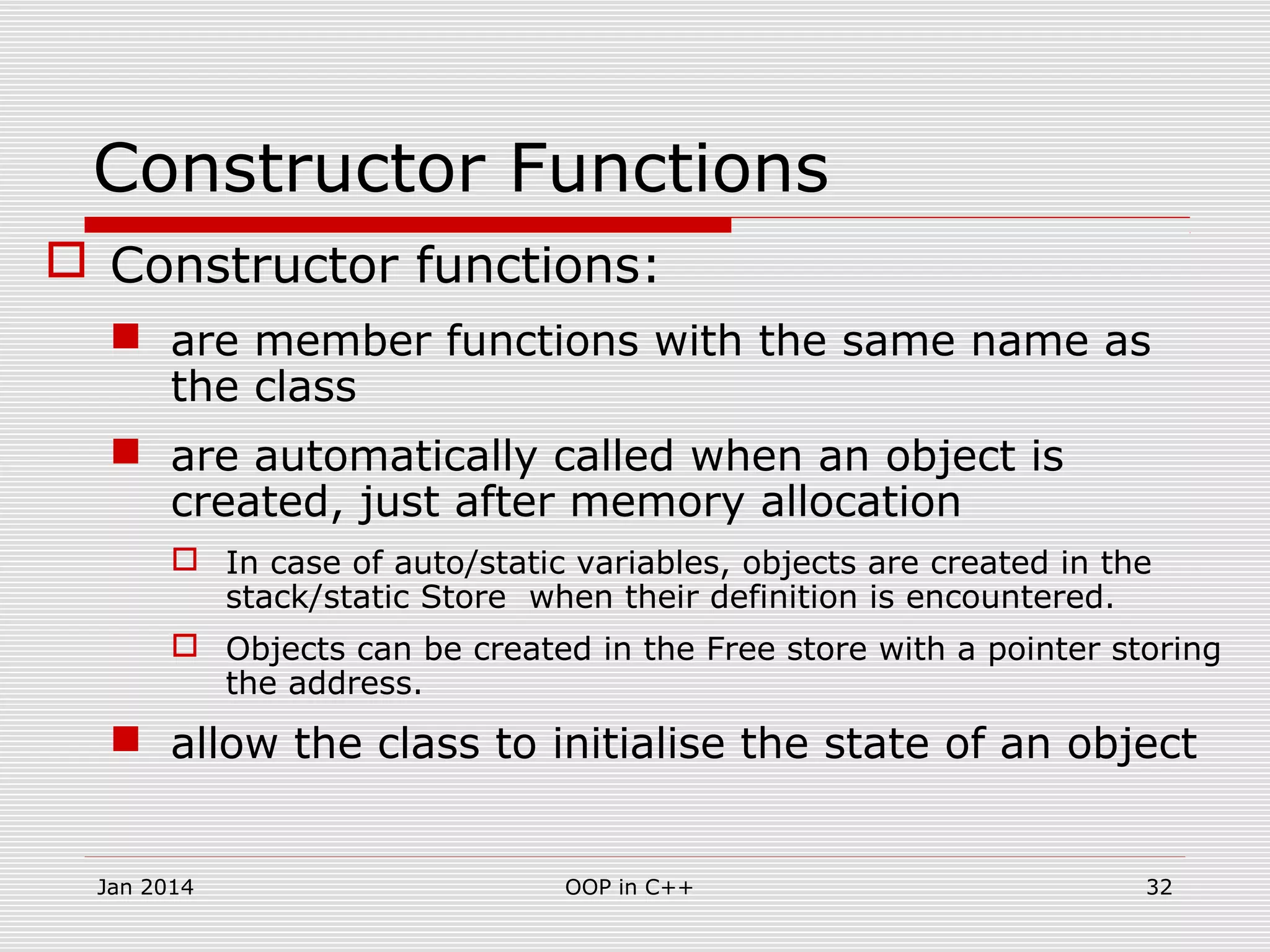
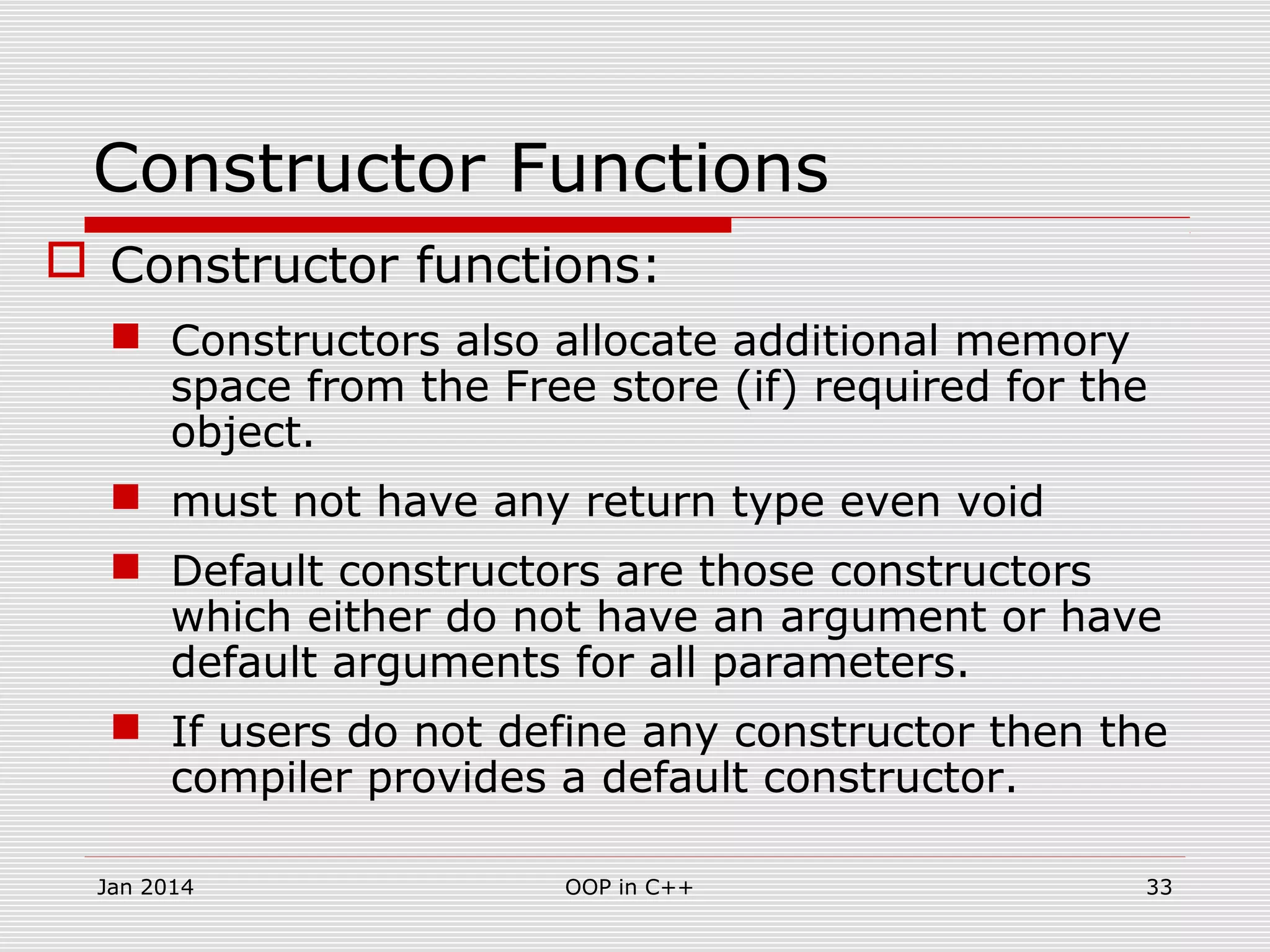
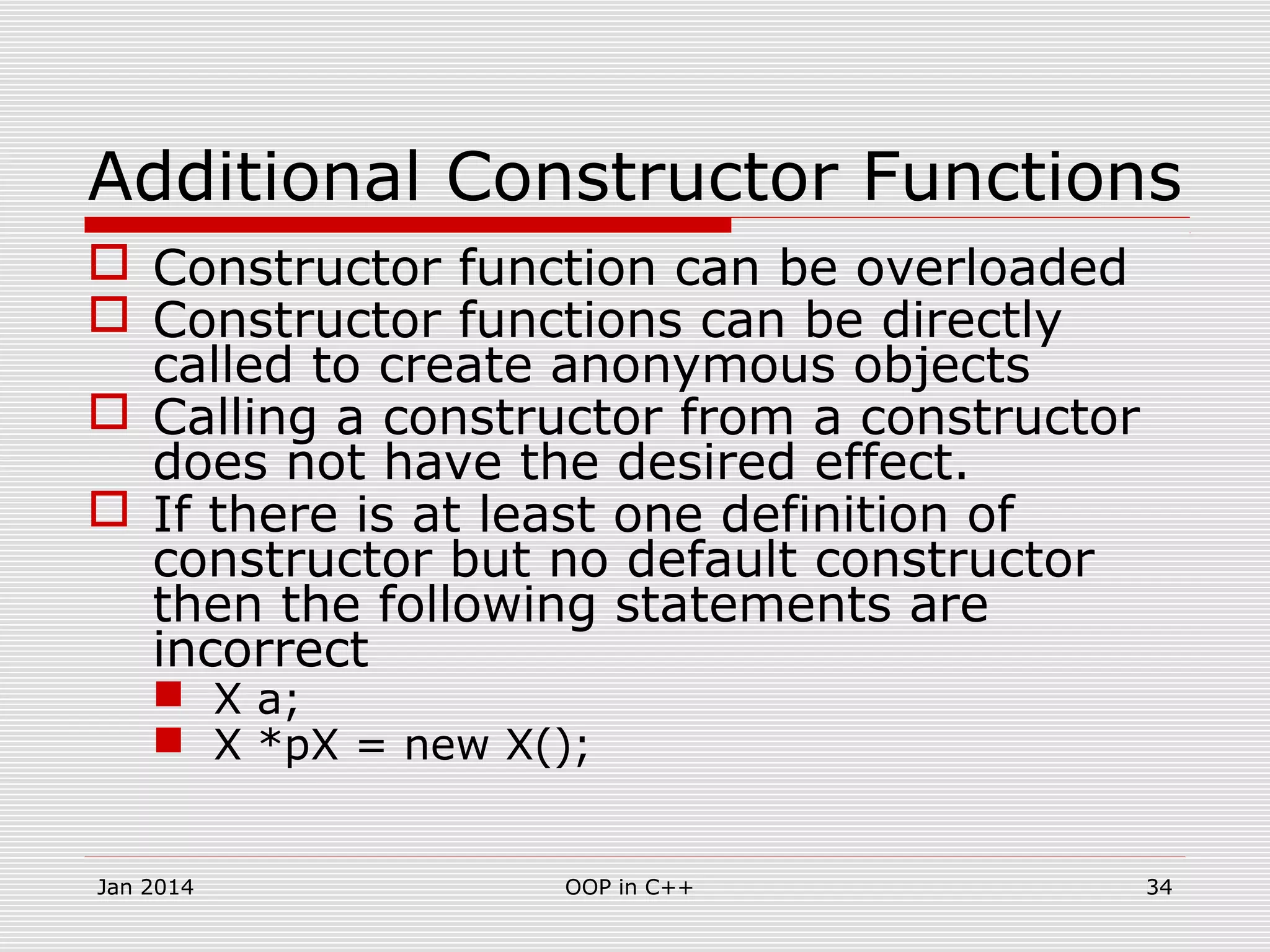
![Destructor Functions
Destructor function:
is a member function named “~ <class-name>” (e.g. ~
String ( ) )
is automatically called when an object is destroyed,
just before memory is freed
For auto variables when the variable goes out of scope
For objects created in the Free store, destructor is called after
“delete” or “delete[]” is explicitly invoked by the programmer.
must not have any argument or return value
If destructor is not called then there could be
memory leaks for objects which calls “new” in
the constructor.
35OOP in C++Jan 2014](https://image.slidesharecdn.com/se-lecture02-30oopinc-140803025901-phpapp02/75/OOP-in-C-35-2048.jpg)
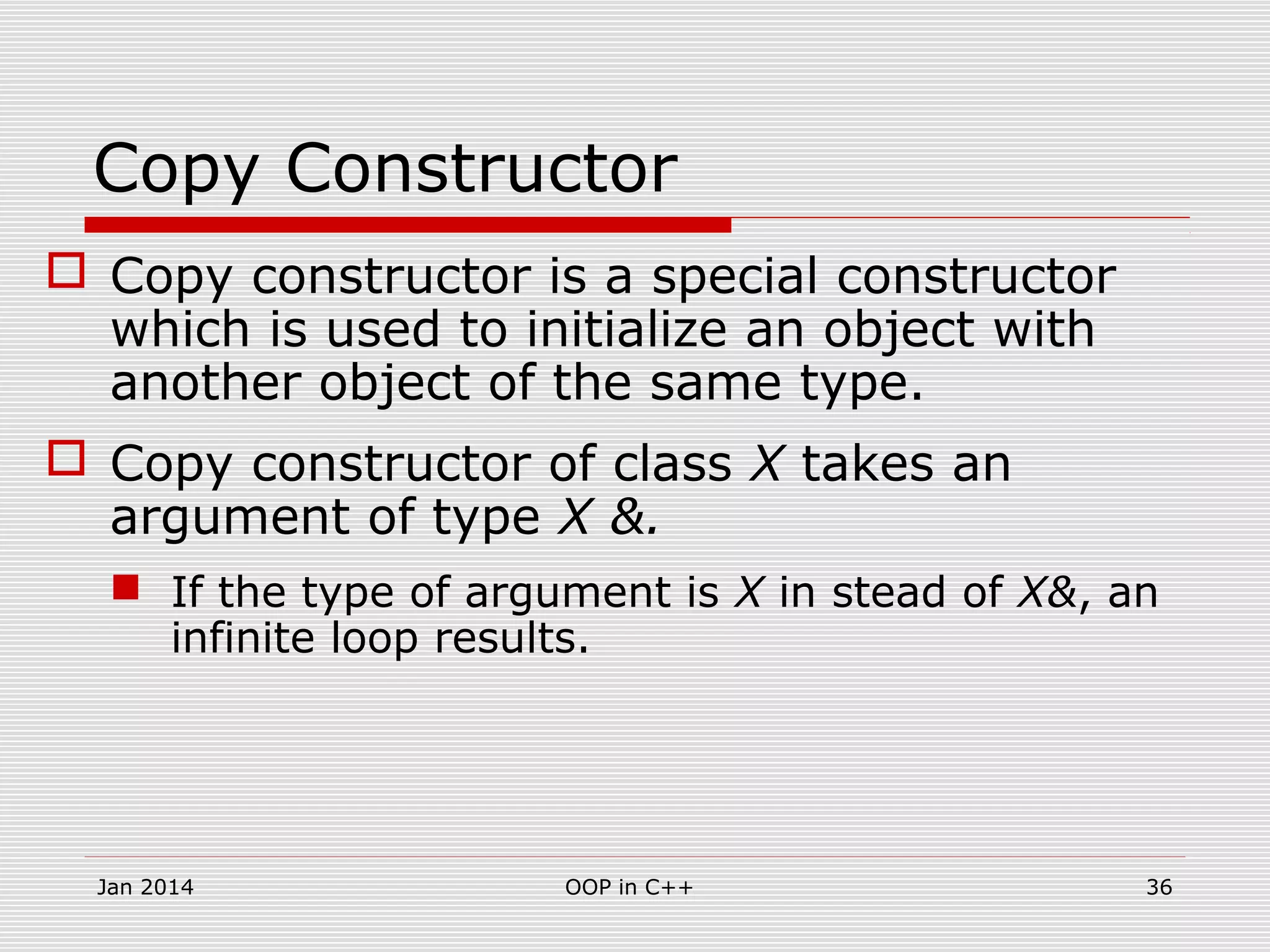
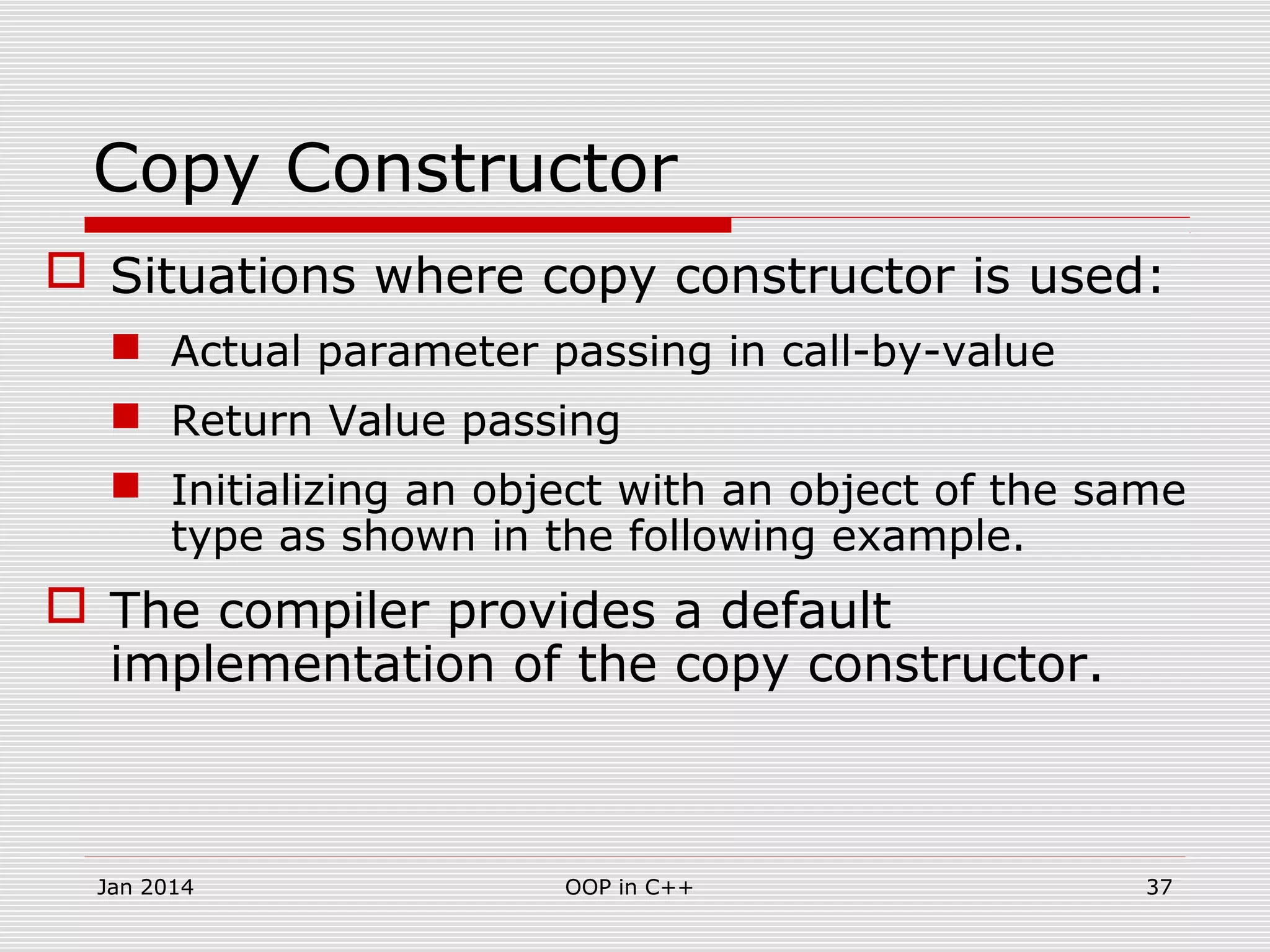
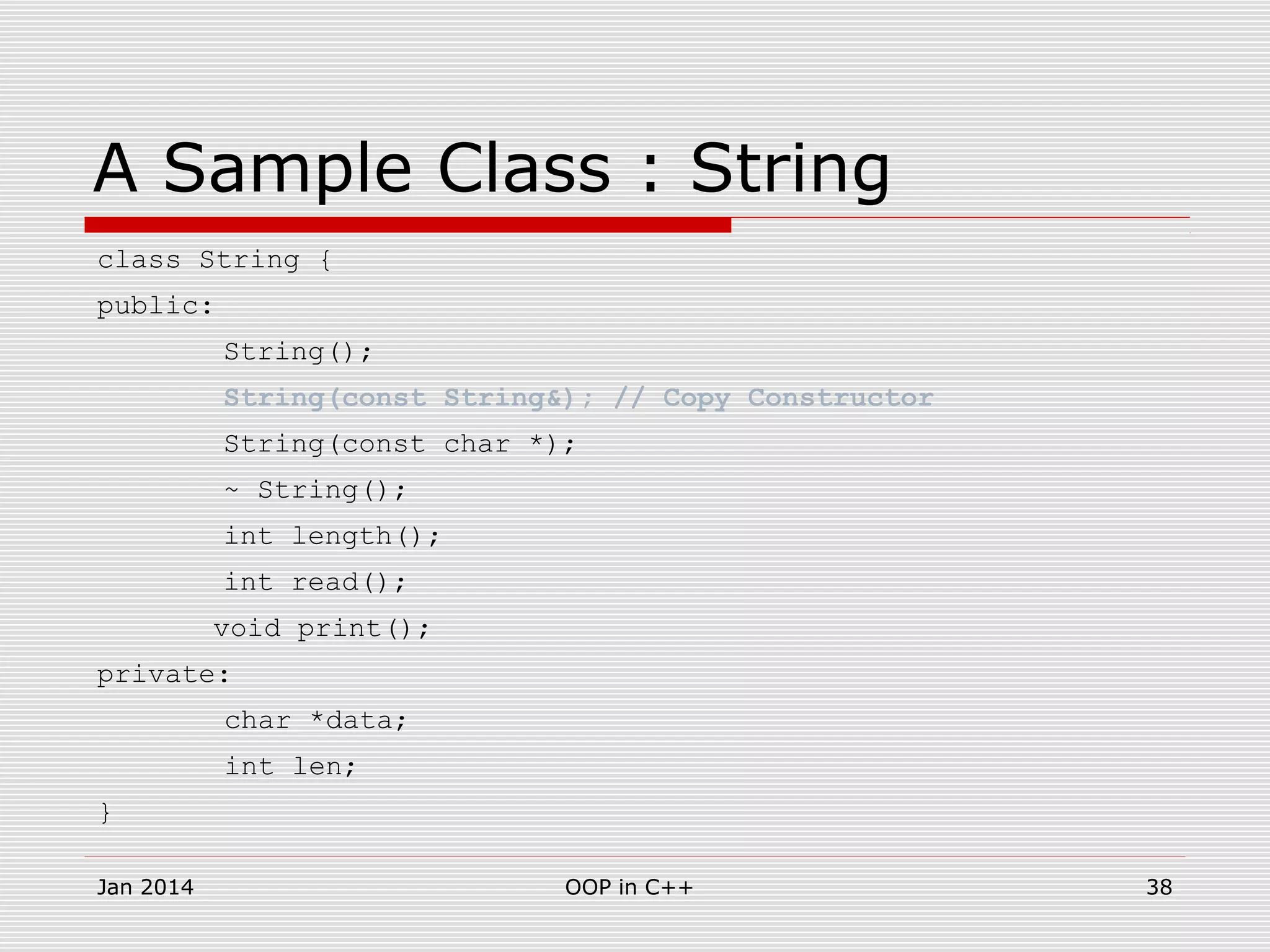
![Class String::Constructor &
Destructor
String::String() {
data = NULL;
len = 0;
}
String::String(const char *s) {
data = new char[strlen(s)+1];
len = strlen(s);
strcpy(data, s);
}
void ~String() {
if (data != NULL)
delete [] data;
}
int main()
{
String s1; //default constructor
String s11(); //Error
String s1(“test”);
char str[6];
strcpy(str, “Hello”);
String s2(str);
String s3(s2); //Copy Constructor
String s4 = new String(“one”);
String s5 = new String();
delete s4;
delete s5;
}
39OOP in C++Jan 2014](https://image.slidesharecdn.com/se-lecture02-30oopinc-140803025901-phpapp02/75/OOP-in-C-39-2048.jpg)
![Arrays
Using Default constructor while
creating an array of objects
String arrayOfString[100]; // 100 objects created using the default
constructor
Using specialized constructor while
creating an array of objects.
String arrayOfString[2] = { String(“abc”), String(“def”) };
Using different constructor for creating
array objects dynamically.
String *pArrayOfString[2] = { new String(“abc”), new
String(“def”) };
40OOP in C++Jan 2014](https://image.slidesharecdn.com/se-lecture02-30oopinc-140803025901-phpapp02/75/OOP-in-C-40-2048.jpg)
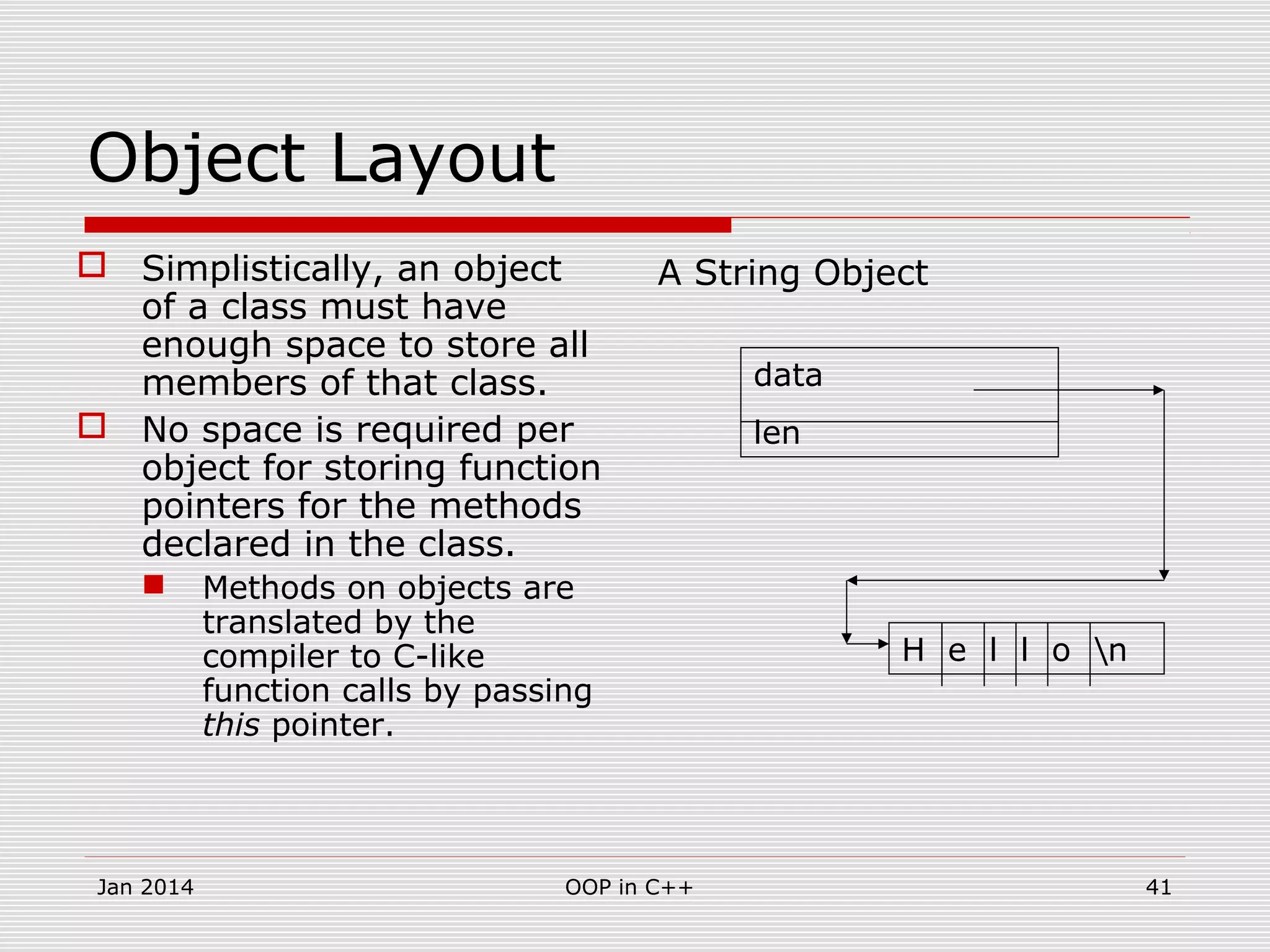
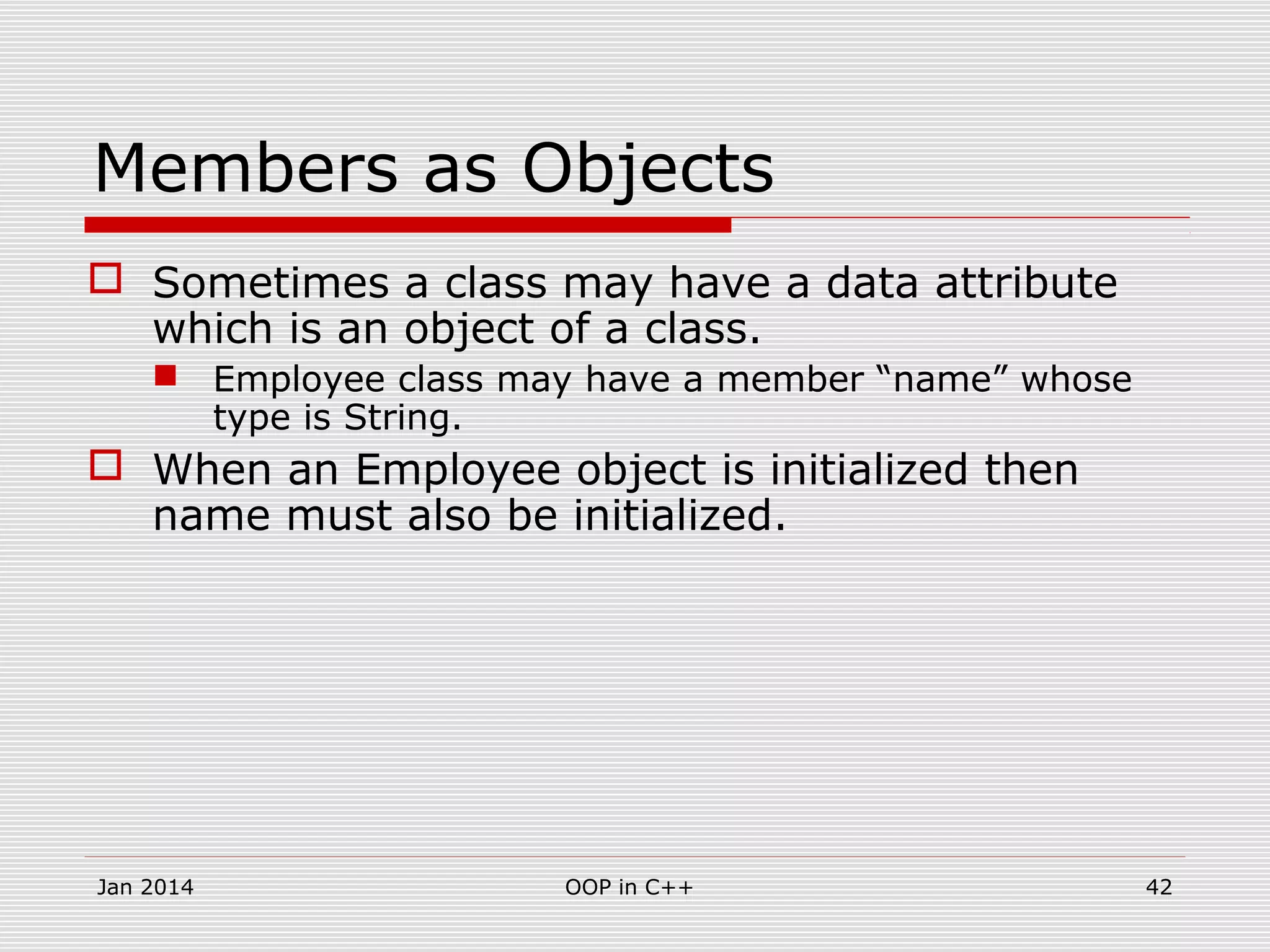
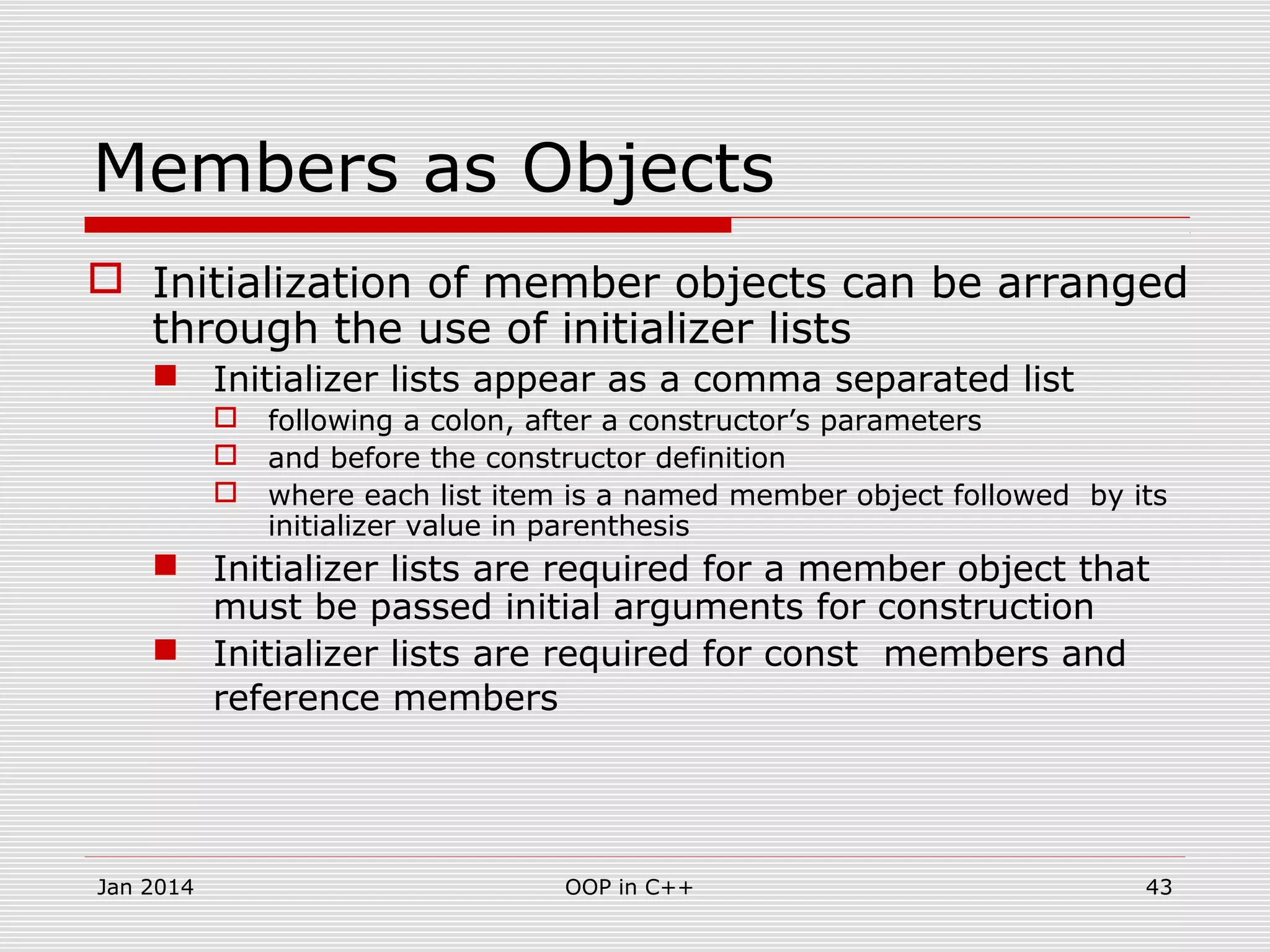
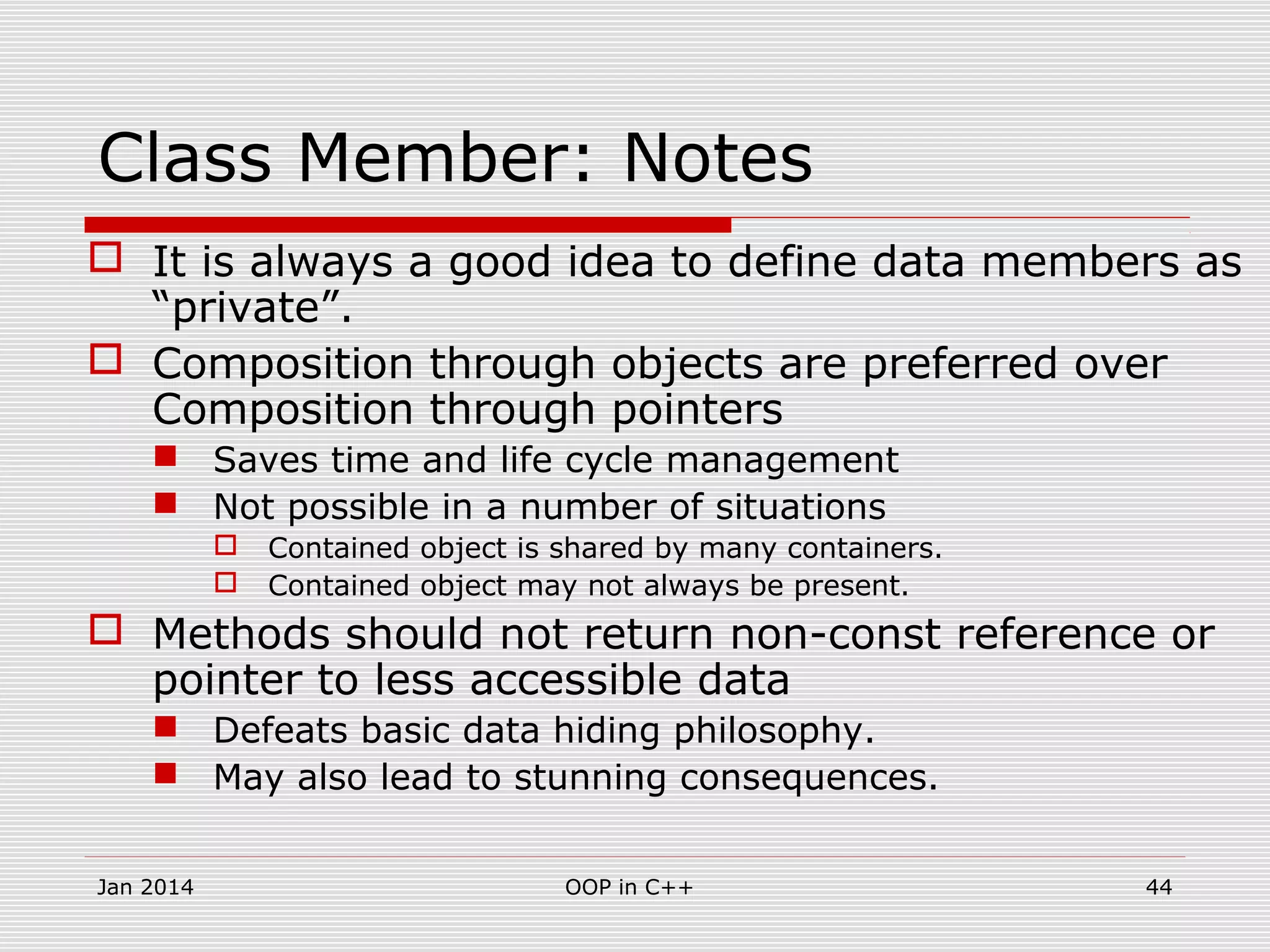
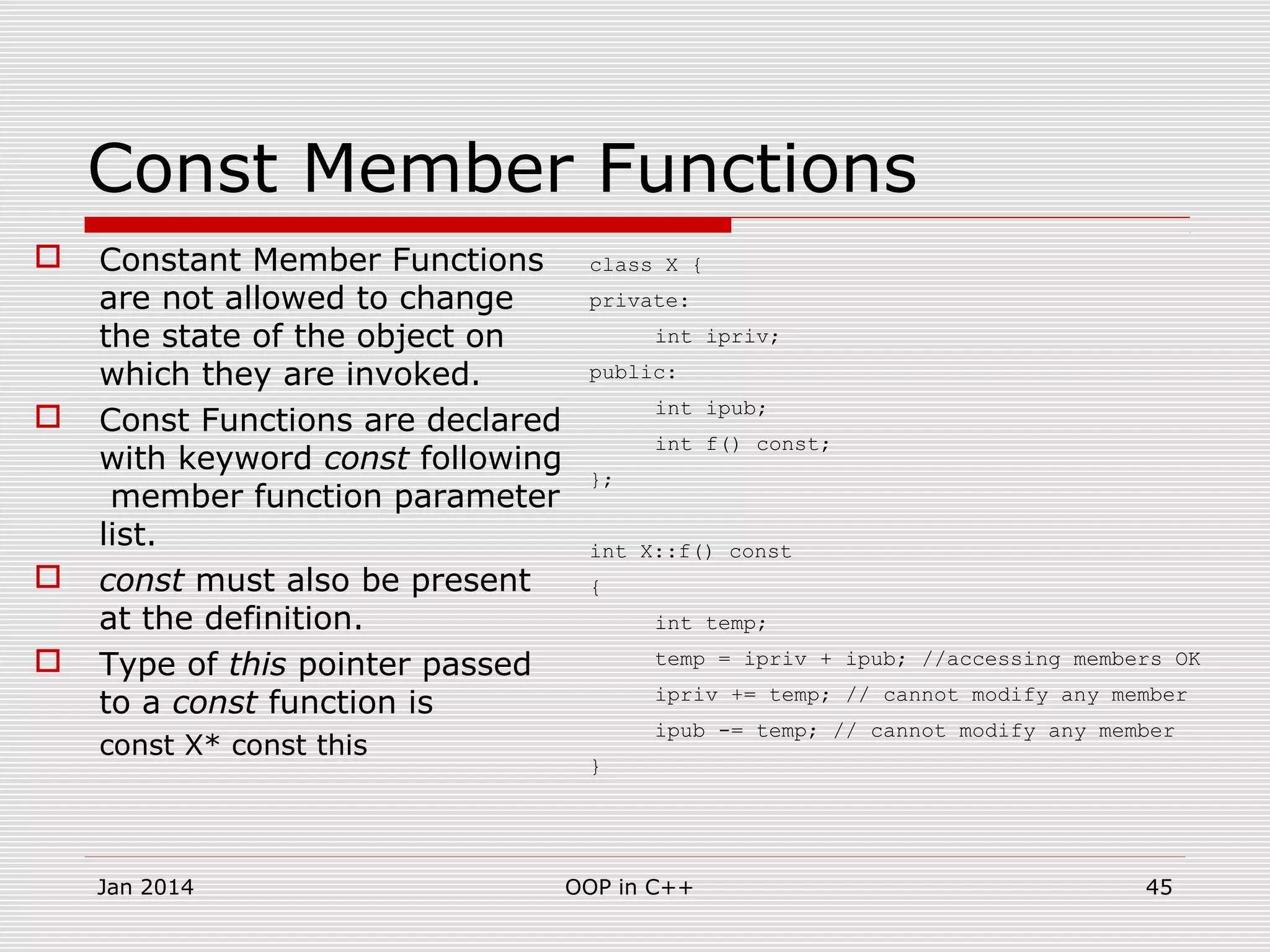
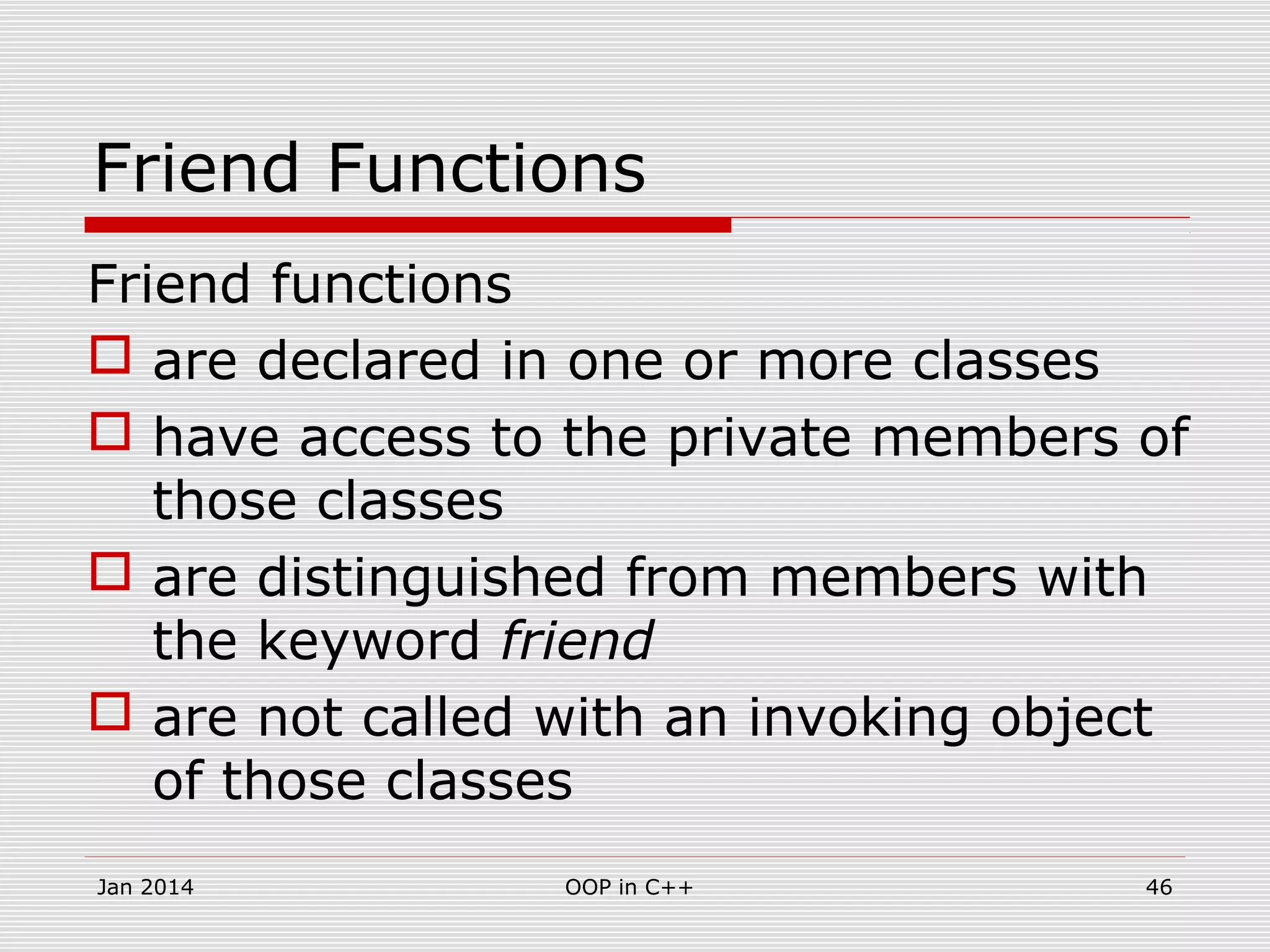
![Friend Functions: Example
class String {
public :
String();
String(const char *);
String(int len);
friend String concat(String *, String *)
friend String concat(String *, char *);
friend String concat(char *, String *);
private :
char *data;
int len;
} ;
String::String(int len)
{
this->len = len;
data = new char[len+1];
data[len] = ‘0’;
}
String concat(String *left, String *right)
{
String both[left->len + right->len + 1];
strcpy(both.data, left->data);
strcat(both.data, right-> data) ;
return both;
}
String concat(char *left, String *right)
{
String both[strlen(left) + right->len +
1];
strcpy(both.data, left);
strcat(both.data, right->data);
return both;
}
47OOP in C++Jan 2014](https://image.slidesharecdn.com/se-lecture02-30oopinc-140803025901-phpapp02/75/OOP-in-C-47-2048.jpg)
![Friends of More Than One class
class Matrix; // Forward declaration to make
// declaration of crossprod legal
class Vector {
public :
Vector(int n) ;
friend Vector prod(Matrix *pM, Vector *pV);
private :
int elements[10] ;
int n;
};
class Matrix {
public :
Matrix(int m, int n) ;
friend Vector prod(Matrix *pM, Vector *pV);
private :
int elements[10][10];
int m, n;
};
Vector prod(Matrix *pM, Vector *pV)
{
int V(pM->m);
for (i = 0; i < pM->m; i++)
for (j = 0; j < pM->n; j++)
{
v[i] += pm->elements[i][j]*
pV->elements[i];
}
}
48OOP in C++Jan 2014](https://image.slidesharecdn.com/se-lecture02-30oopinc-140803025901-phpapp02/75/OOP-in-C-48-2048.jpg)
![Friend Members & Class
Member of a different class
may be a friend function.
A class may be declared as a
friend implying all member
functions of that class are
friends.
Friend-ship is neither
commutative nor transitive.
Friends tend to break data
hiding.
It is best to avoid friend in
an ideal OO Design.
class Matrix;
class Vector {
public:
void Vector(int n);
Vector prod(Matrix *pM);
int elements[10];
int n;
} ;
class Matrix {
public:
void Matrix(int m, int n);
friend Vector Vector::prod(Matrix *pM);
private:
int elements[10][10];
int m, n;
} ;
49OOP in C++Jan 2014](https://image.slidesharecdn.com/se-lecture02-30oopinc-140803025901-phpapp02/75/OOP-in-C-49-2048.jpg)
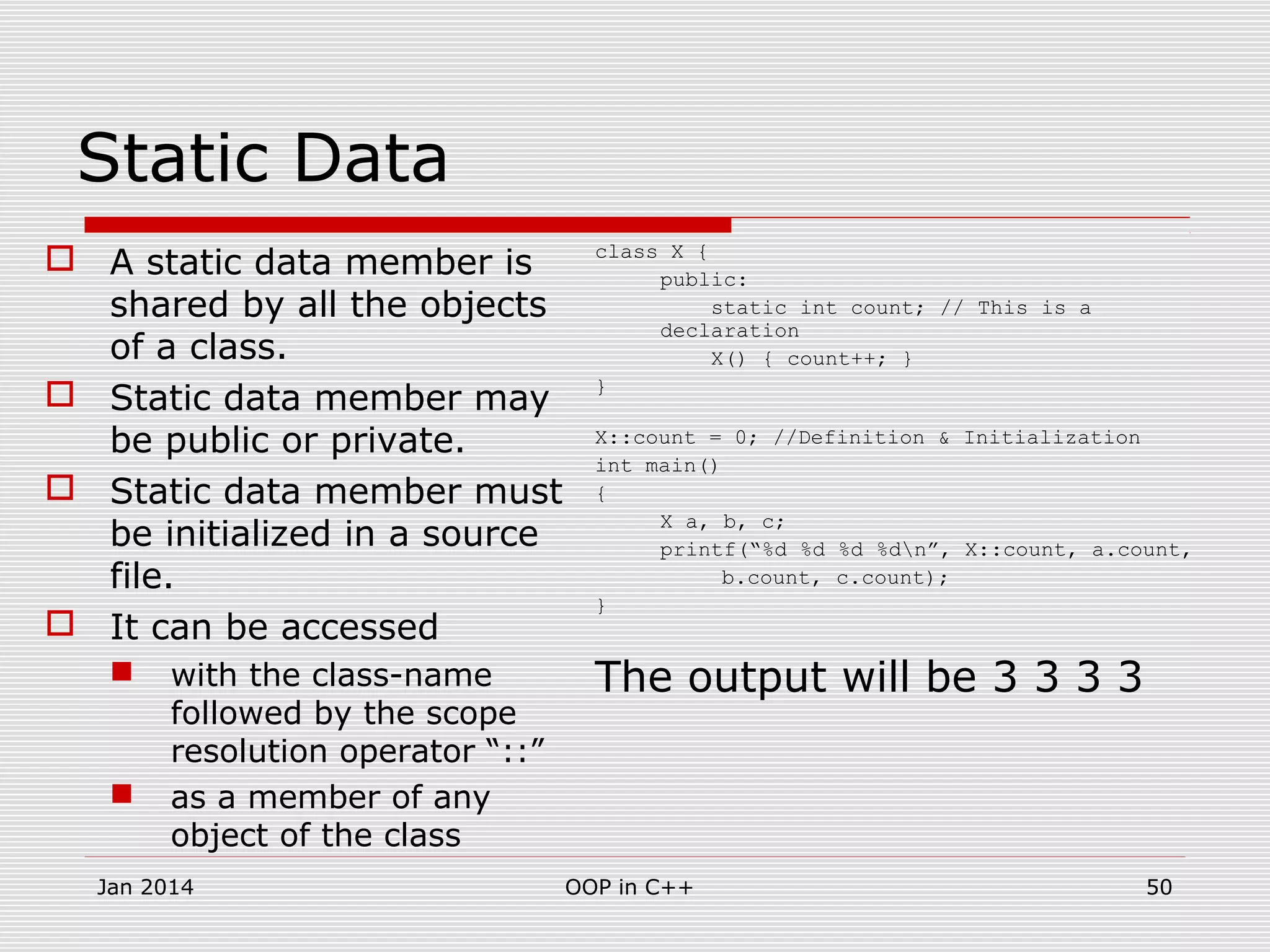
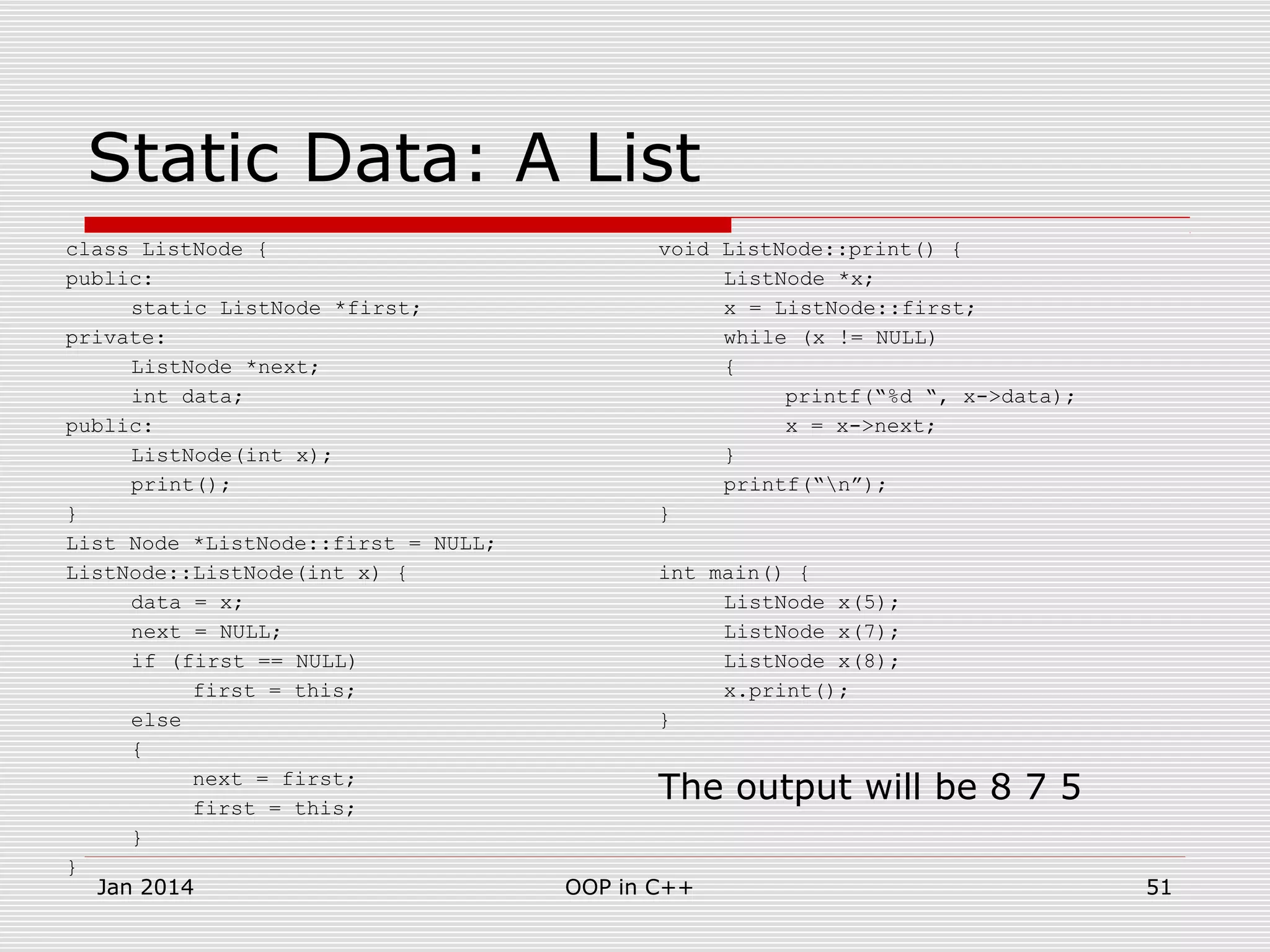
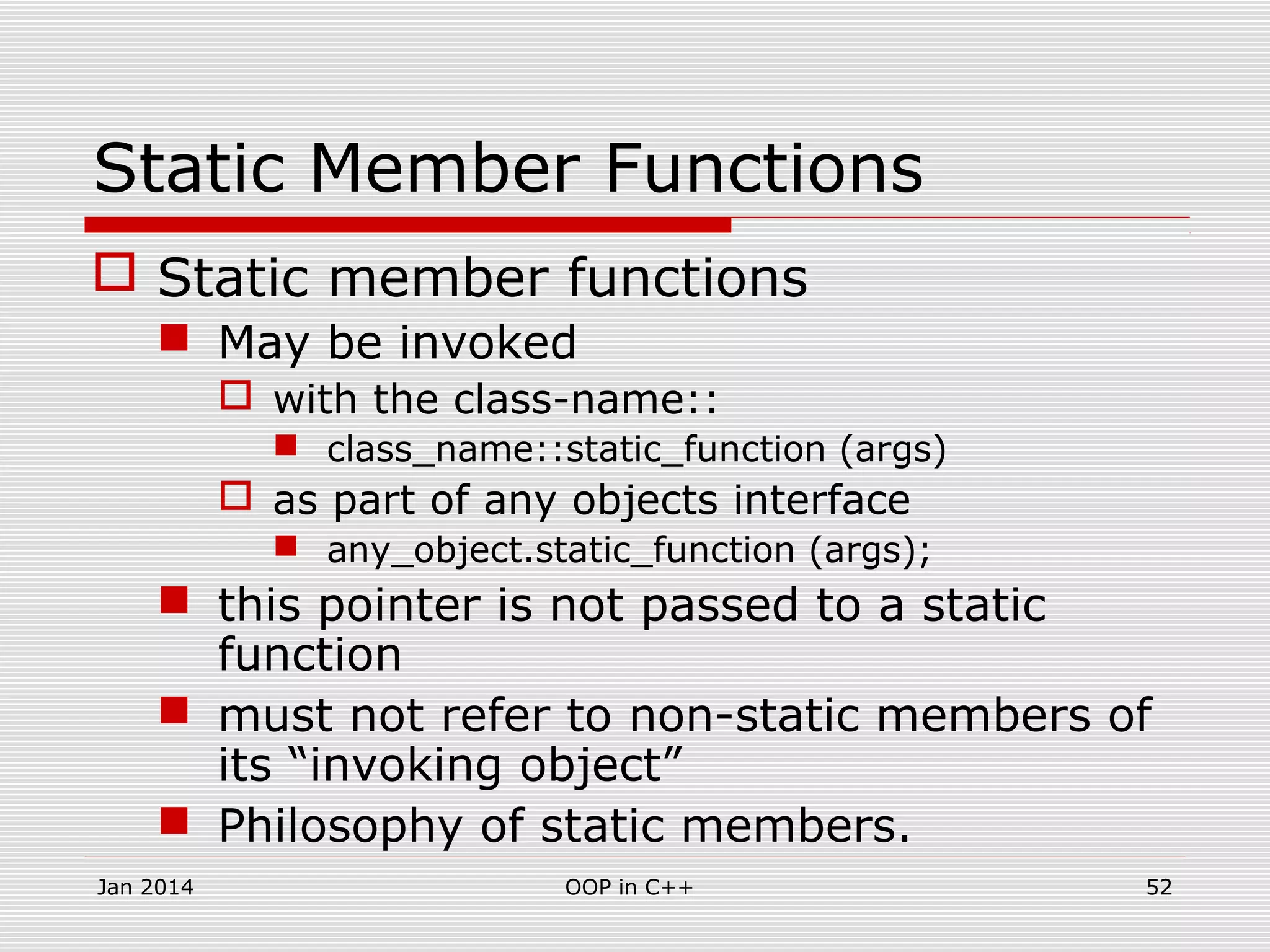
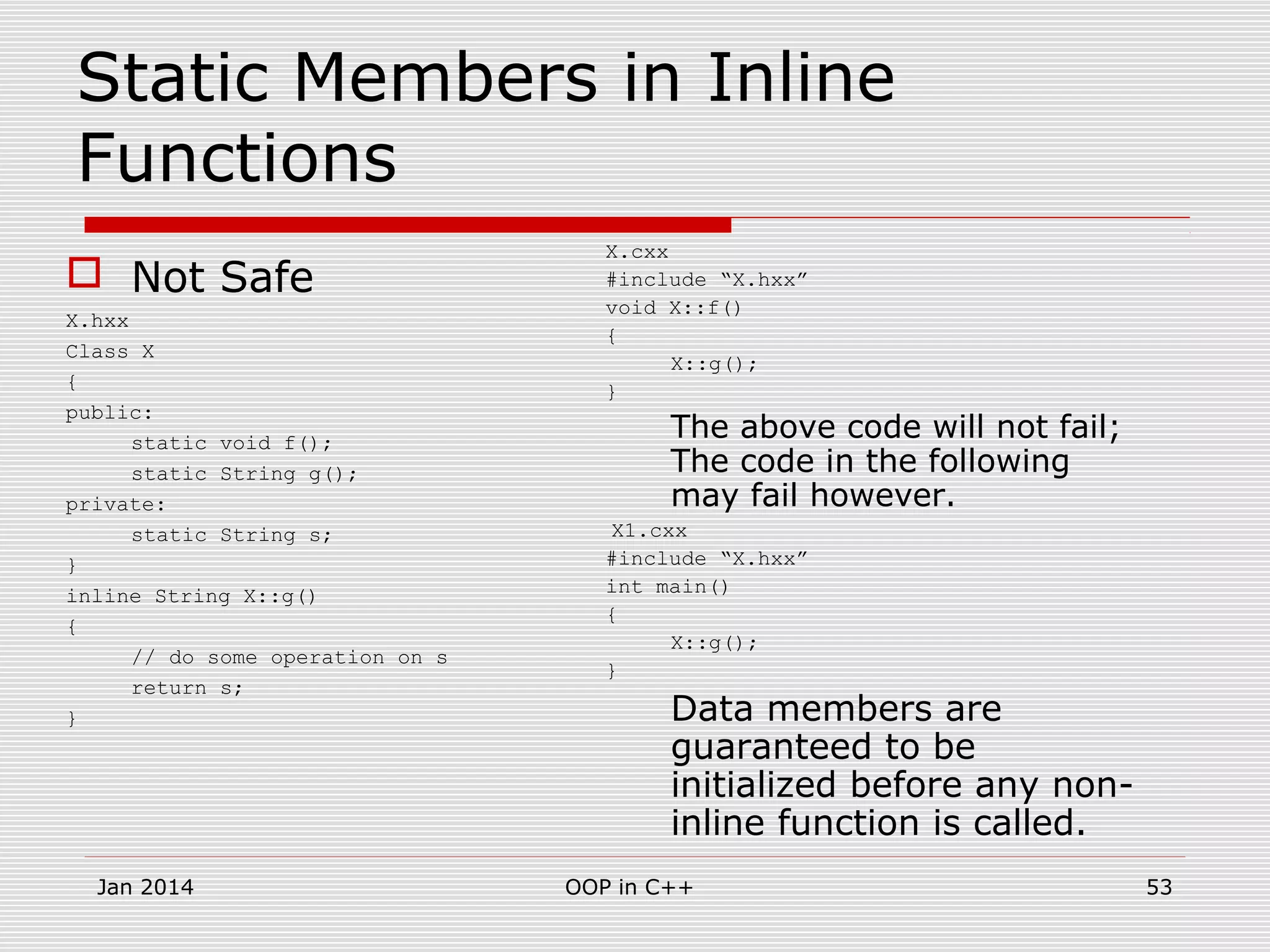
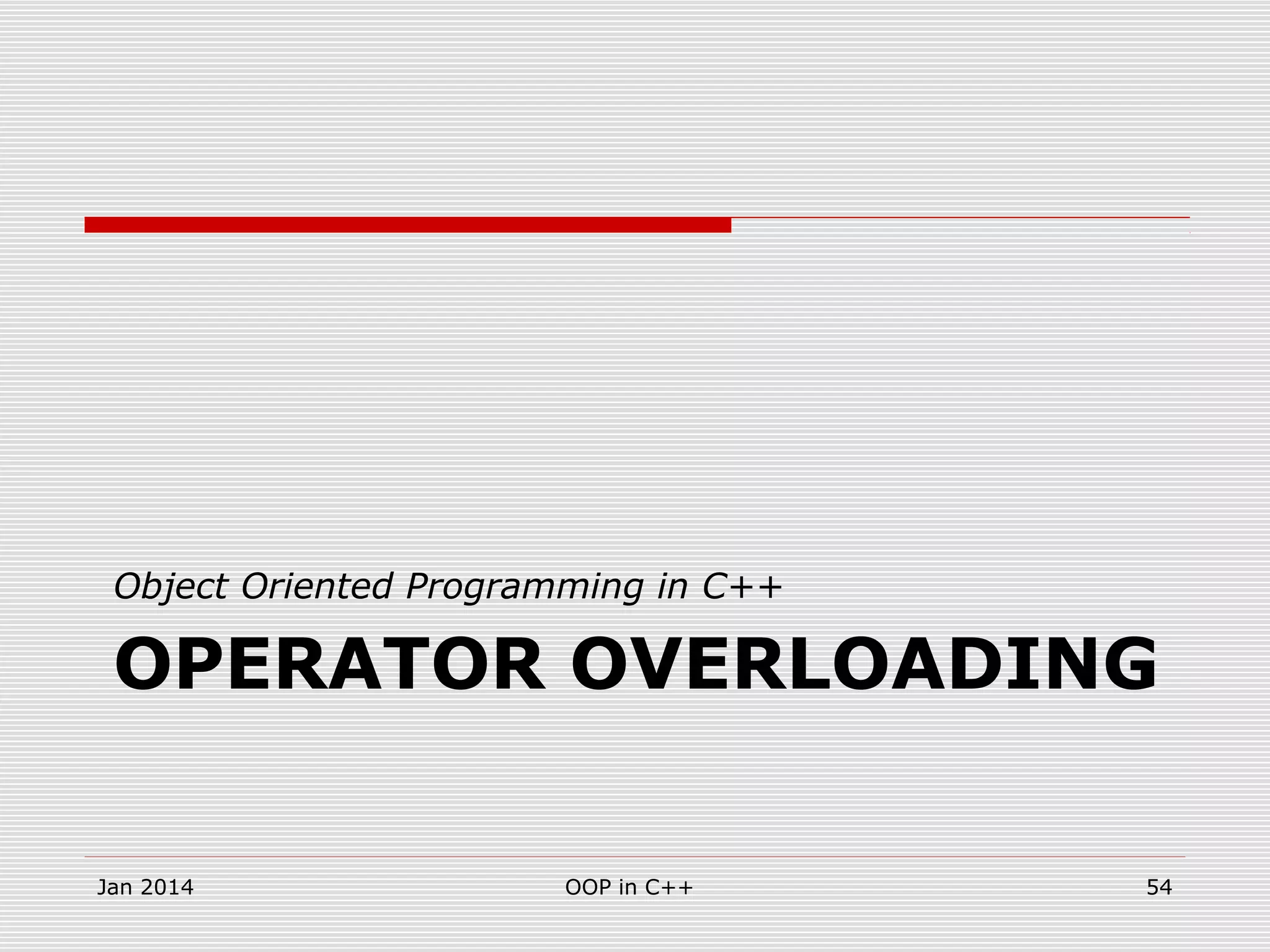
![Overloading Operators
Semantics of an operator is
represented by a function named
operator op, where op is an operator
symbol (+,*, - , [ ], etc. )
These functions can either be
implemented as global friend functions
and/or methods.
55OOP in C++Jan 2014](https://image.slidesharecdn.com/se-lecture02-30oopinc-140803025901-phpapp02/75/OOP-in-C-55-2048.jpg)
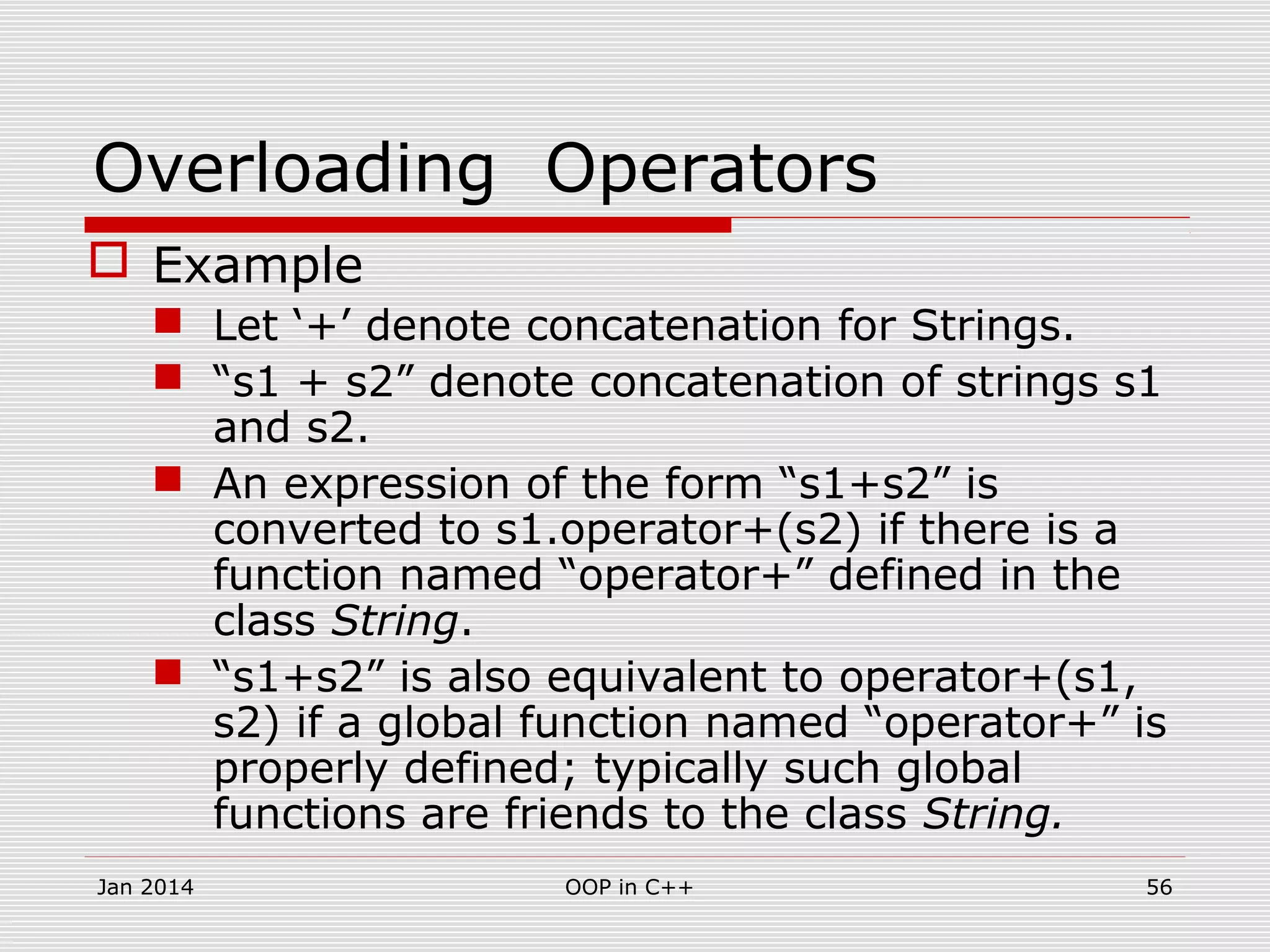
![Example of overloading
operator +
/ * string .h * /
const int max_string_length = 128 ;
class String {
public :
String operator + (char *text) ;
String operator + (String &s1) ;
String (char *data);
String () { data = NULL; len = 0; }
private :
char *data;
int len;
} ;
String operator+(char * text)
{
char *save = new char[len+1];
strcpy(save, data);
data = new char[len +strlen(text)
+ 1];
strcpy(data, save);
stcat(data, text);
delete[]save;
return (*this);
}
57OOP in C++Jan 2014](https://image.slidesharecdn.com/se-lecture02-30oopinc-140803025901-phpapp02/75/OOP-in-C-57-2048.jpg)
![Overloading Assignment
Operator
String & String: :operator=( char *rhs)
{
data = new char [strlen(rhs) + 1];
strcpy ( data, rhs);
return *this ;
}
Bug:
Memory Leak as previous
data of this is not
deleted.
.
.
.
String String: :operator=( String &rhs)
{
data = new char [rhs.len + 1];
strcpy ( data, rhs.data);
return *this ;
}
Bug:
The following
assignment cannot be
made
String x(“abc”), y(“def”),
z(“ghi”);
x = y = z;
(x.operator=((y).operator=(z)
));
Solution
Change the return
type to String &
58OOP in C++Jan 2014](https://image.slidesharecdn.com/se-lecture02-30oopinc-140803025901-phpapp02/75/OOP-in-C-58-2048.jpg)
![Overloading Assignment
Operator
String & String: :operator (String &rhs)
{
delete [] data;
data = new char [rhs.len + 1];
strcpy ( data, rhs.data);
return *this ;
}
Bug:
Self Assignment will cause problem
Solution:
Check the following condition and return if
false.
if (this != rhs) .
59OOP in C++Jan 2014](https://image.slidesharecdn.com/se-lecture02-30oopinc-140803025901-phpapp02/75/OOP-in-C-59-2048.jpg)
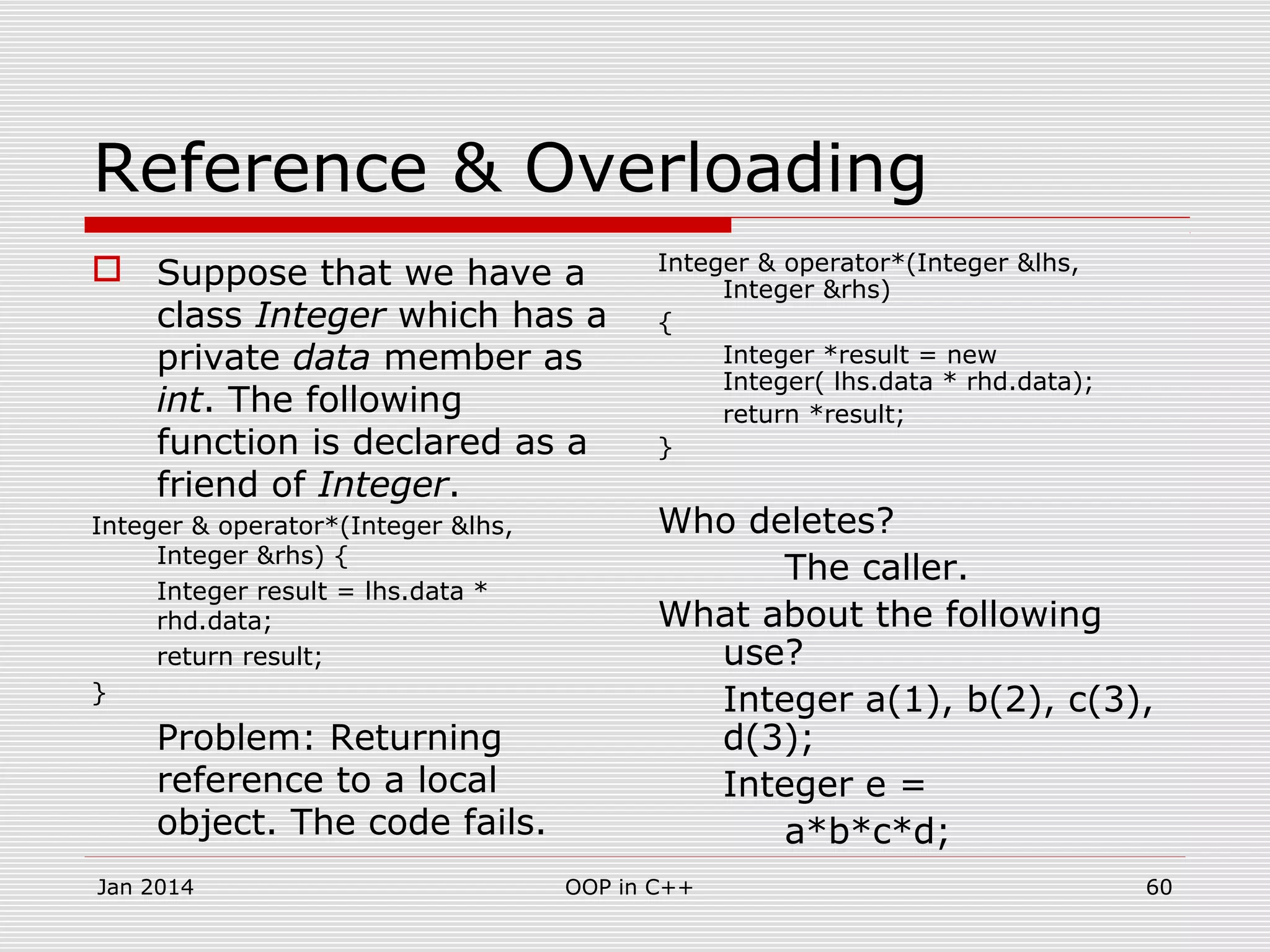
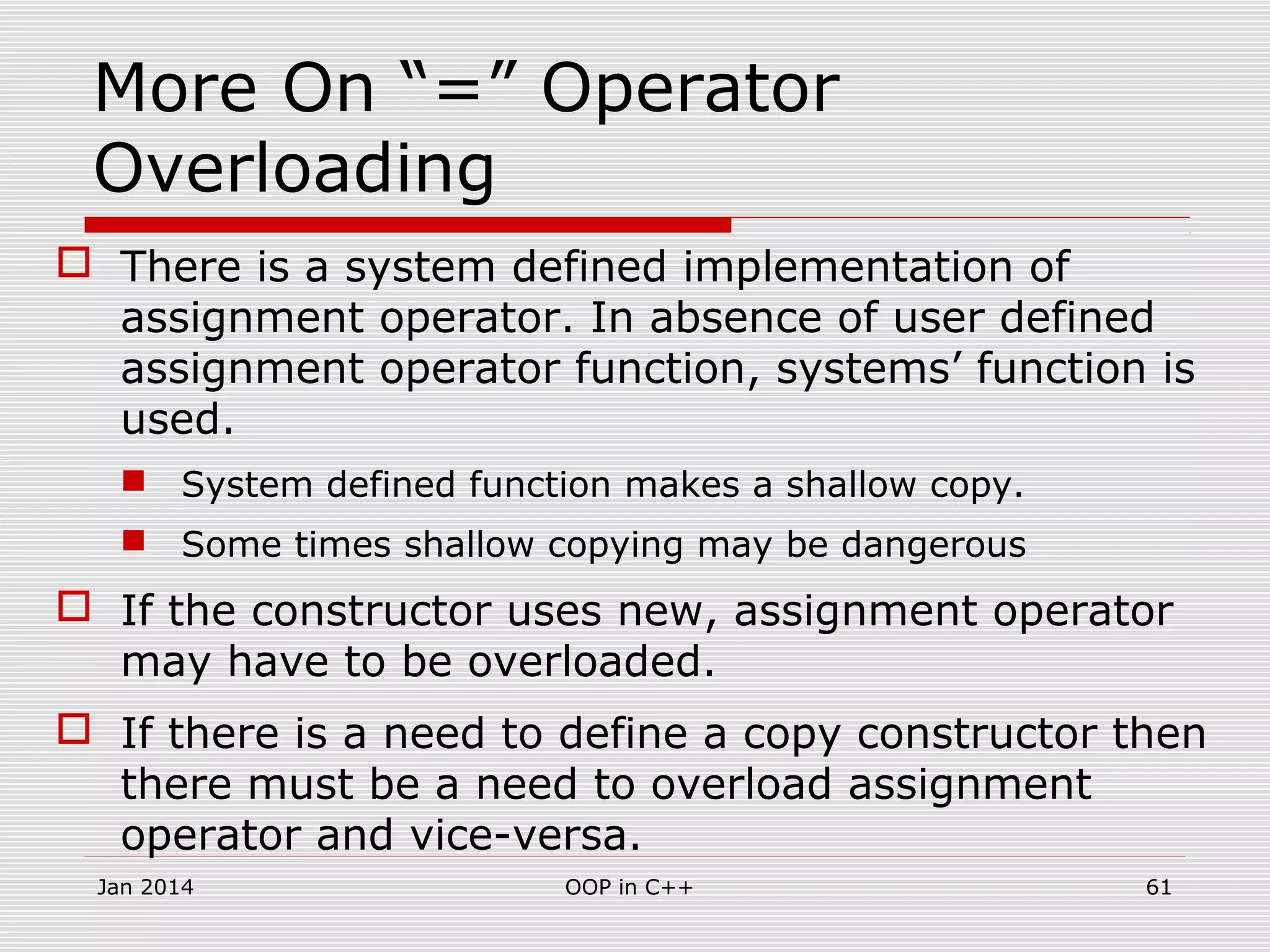
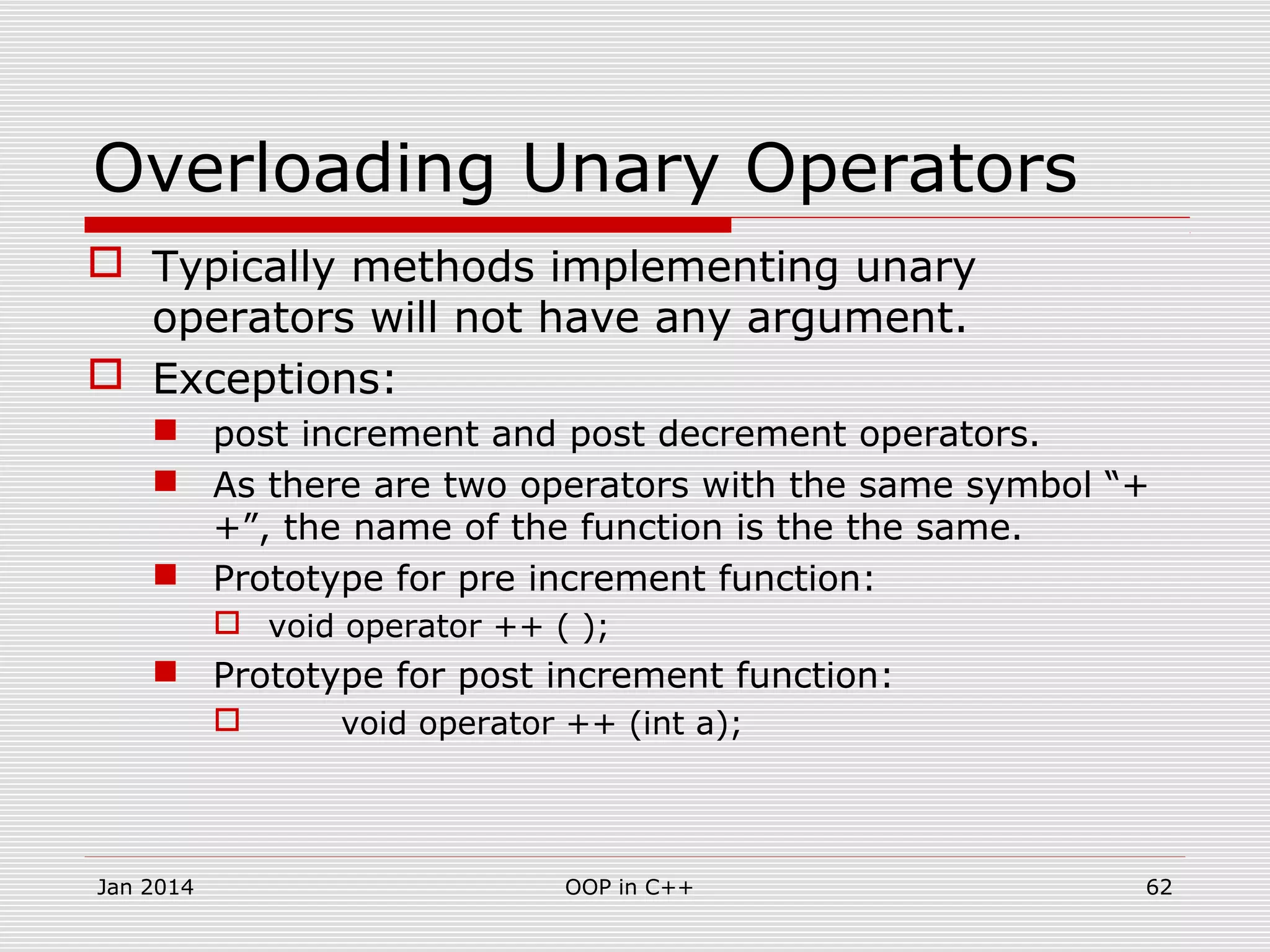
![Operator Overloading Facts
Some operators can not be implemented as
global(friend) functions.
=, [] etc.
Some Operators cannot be overloaded
::,.*.?:,., sizeof() etc.
Precedence or arity of an operator cannot be
changed by overloading an operator.
Conditional Operators like &&, ||, comma
operator should not be overloaded.
63OOP in C++Jan 2014](https://image.slidesharecdn.com/se-lecture02-30oopinc-140803025901-phpapp02/75/OOP-in-C-63-2048.jpg)
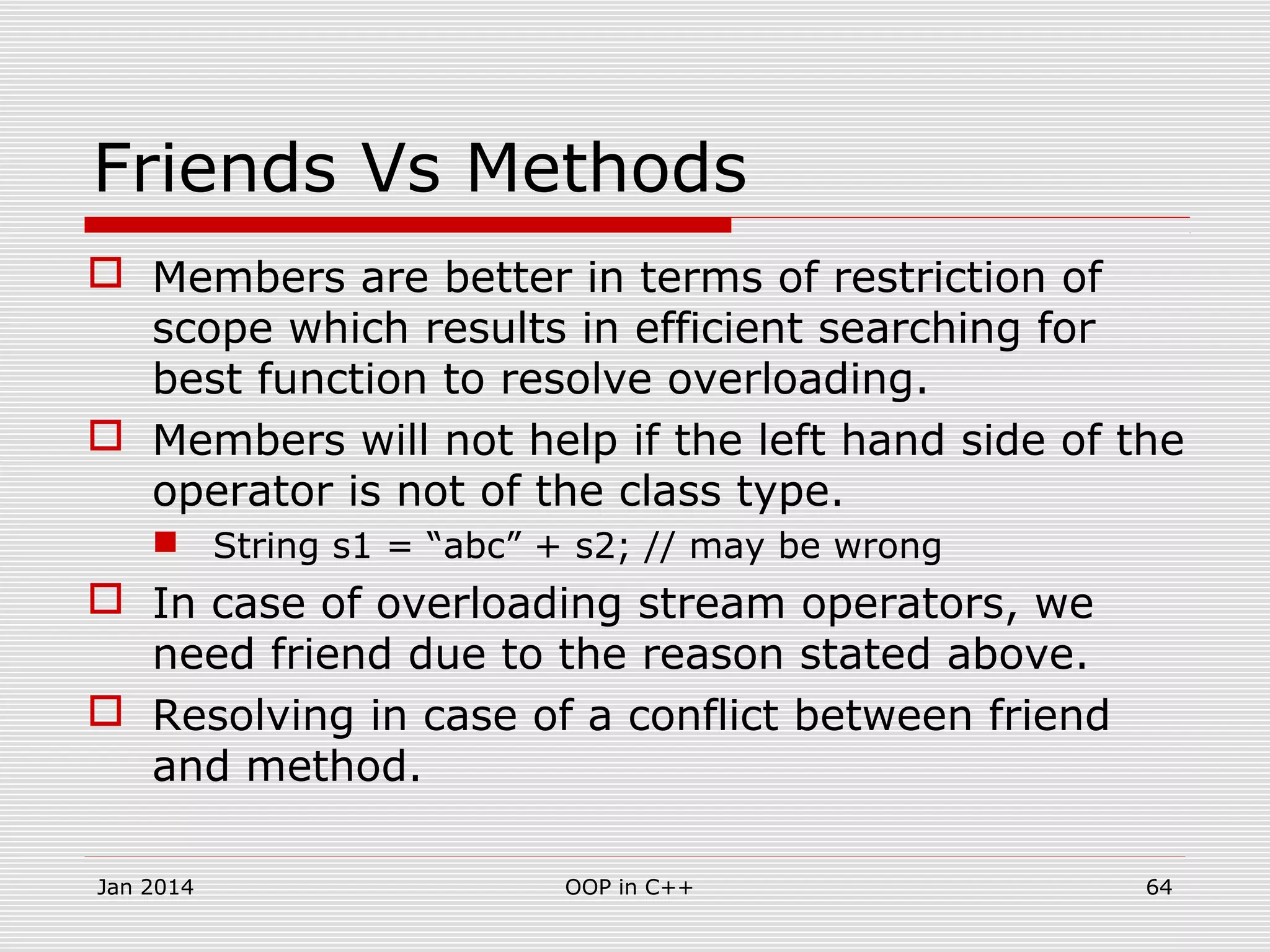

![Overloading using const
Class String {
public:
char & operator [ ] (int pos)
{ return data[pos]; }
const char & operator [ ] (int pos)
{ return data[pos]; }
private:
char * data;
……
}
String s1 = “Hello”;
cout << s[0]; // fine
s[0] = ‘x’; // fine
const String cs = “World”;
cout << s[0]; // fine
s[0] = ‘x’; // Error!!!
Jan 2014 OOP in C++ 66](https://image.slidesharecdn.com/se-lecture02-30oopinc-140803025901-phpapp02/75/OOP-in-C-66-2048.jpg)
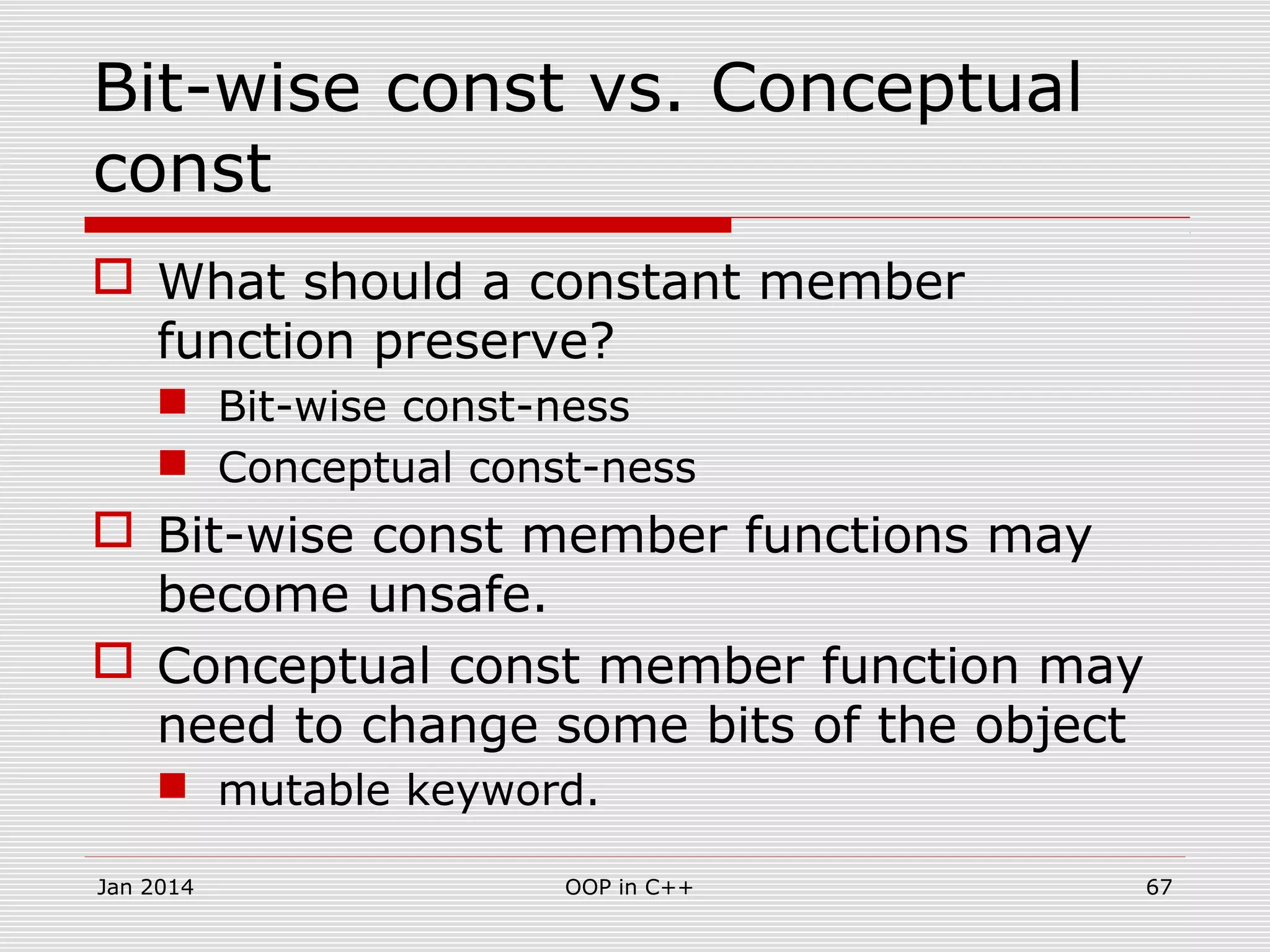
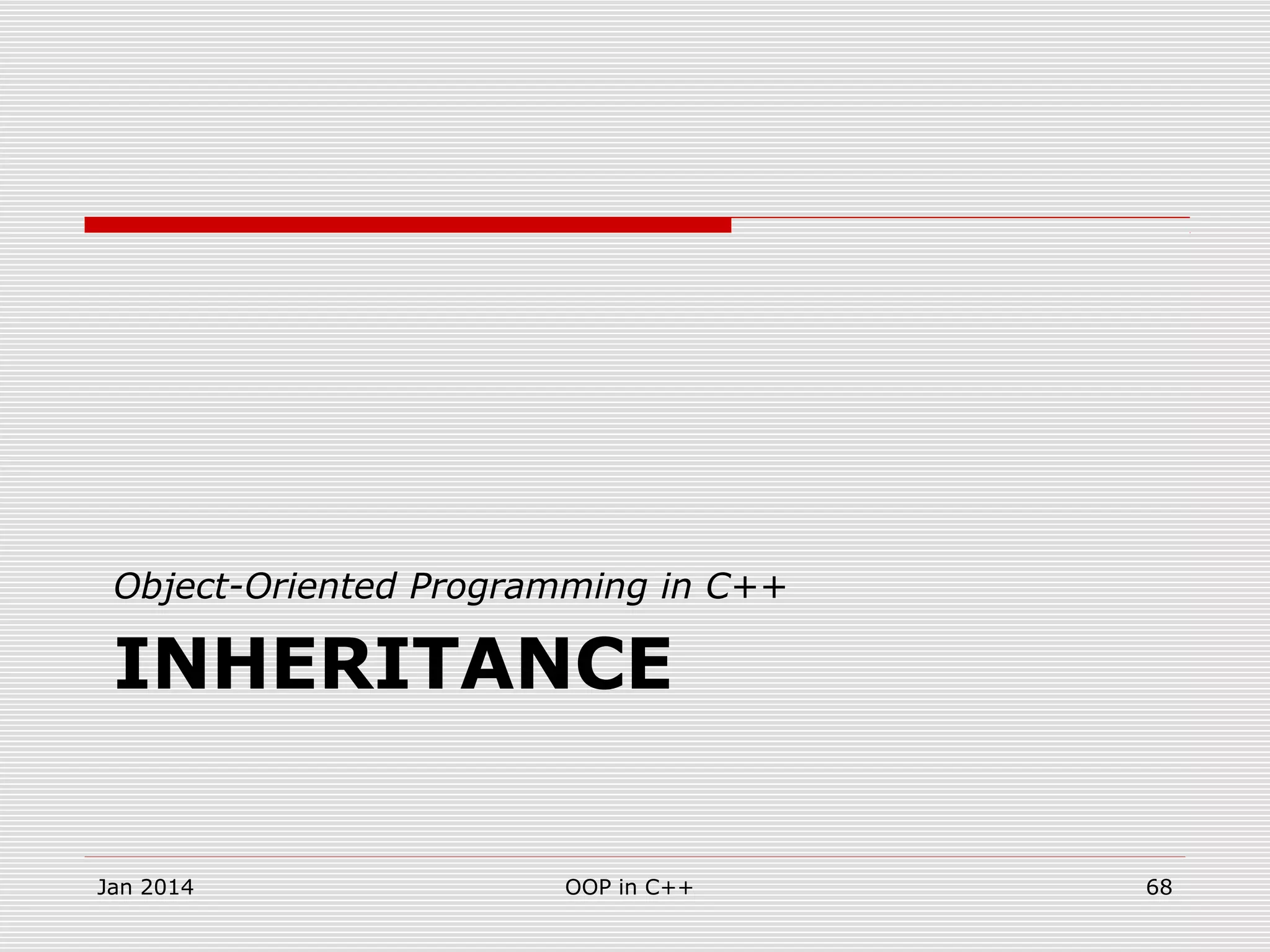
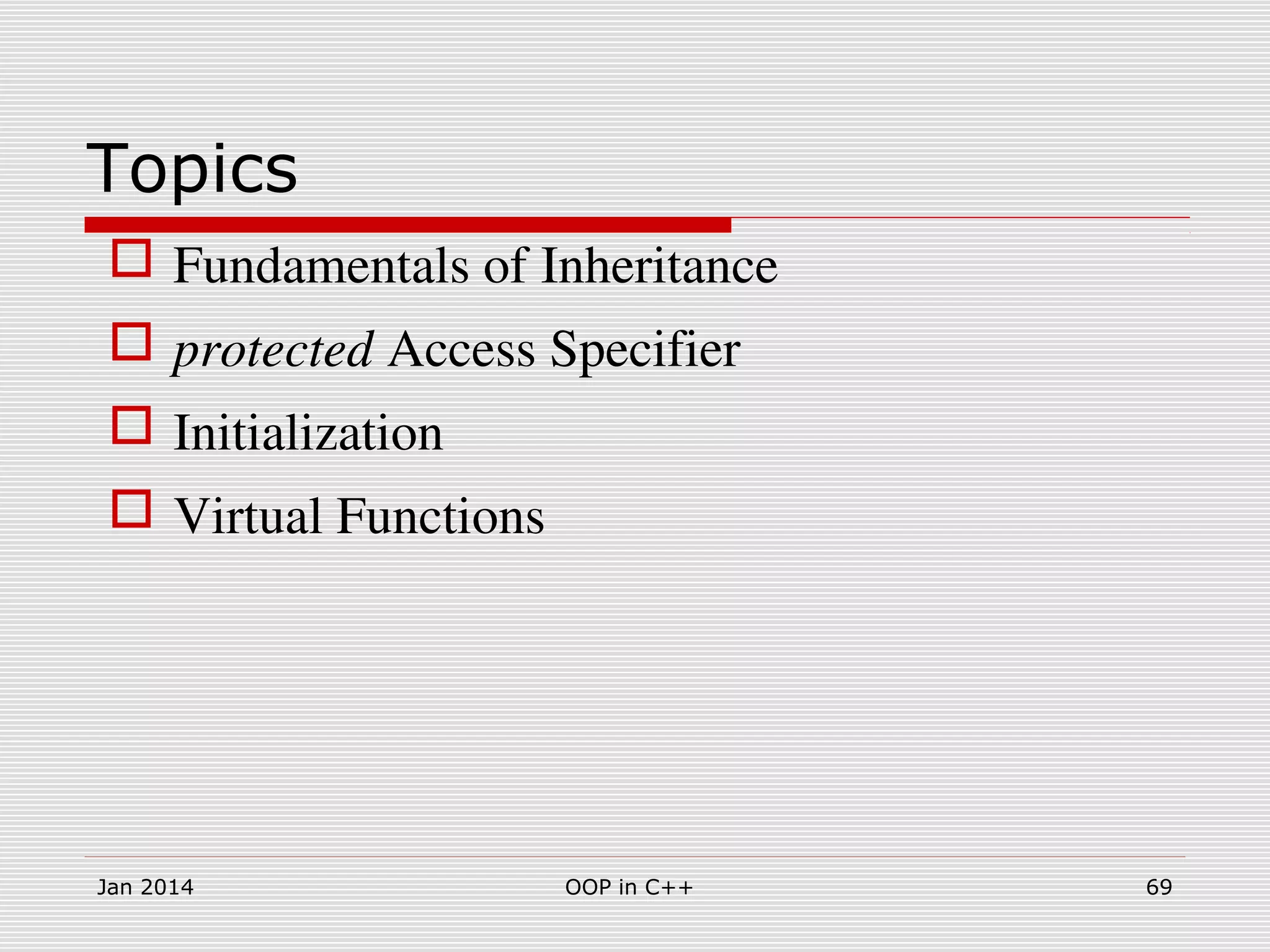
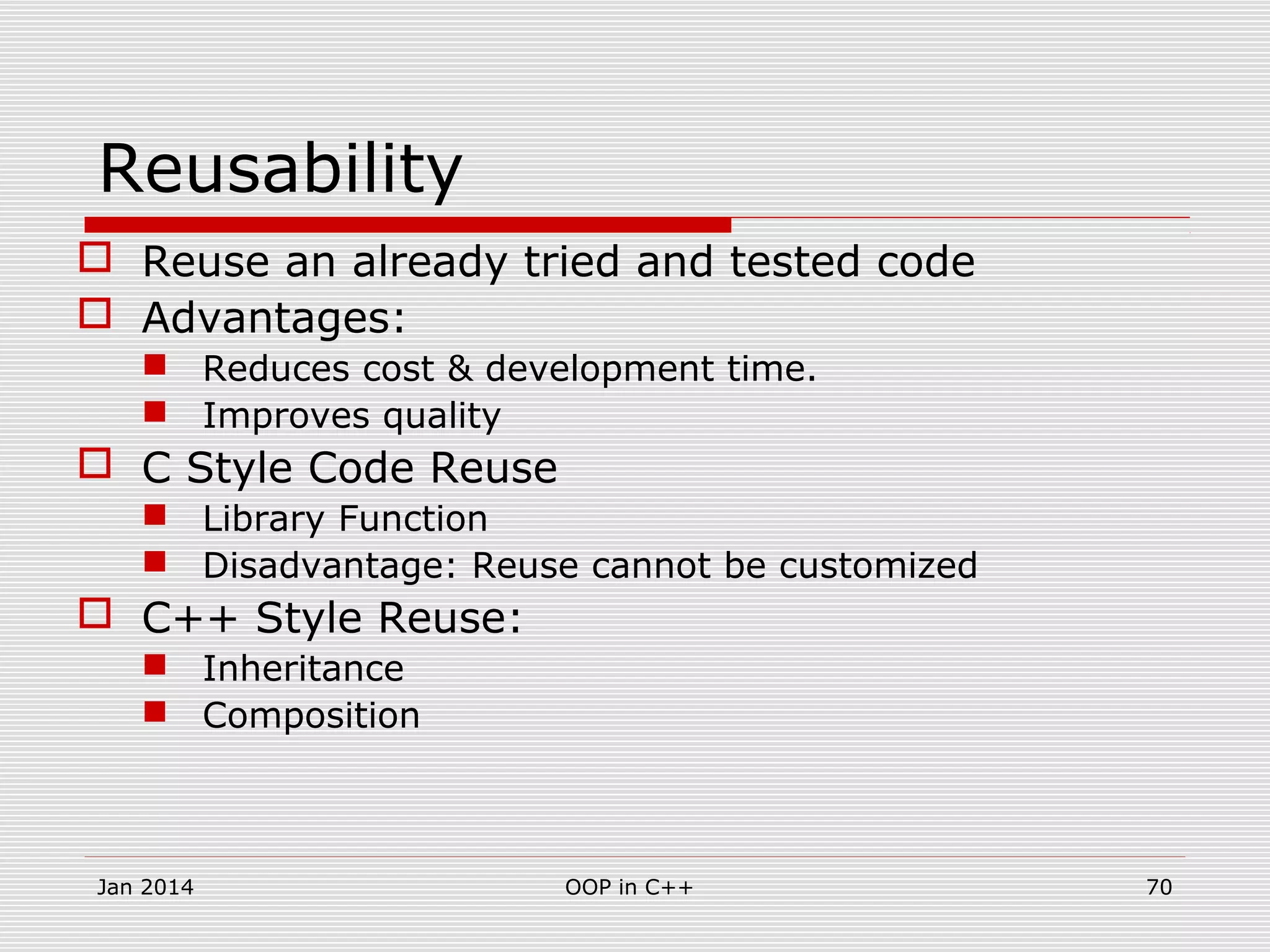
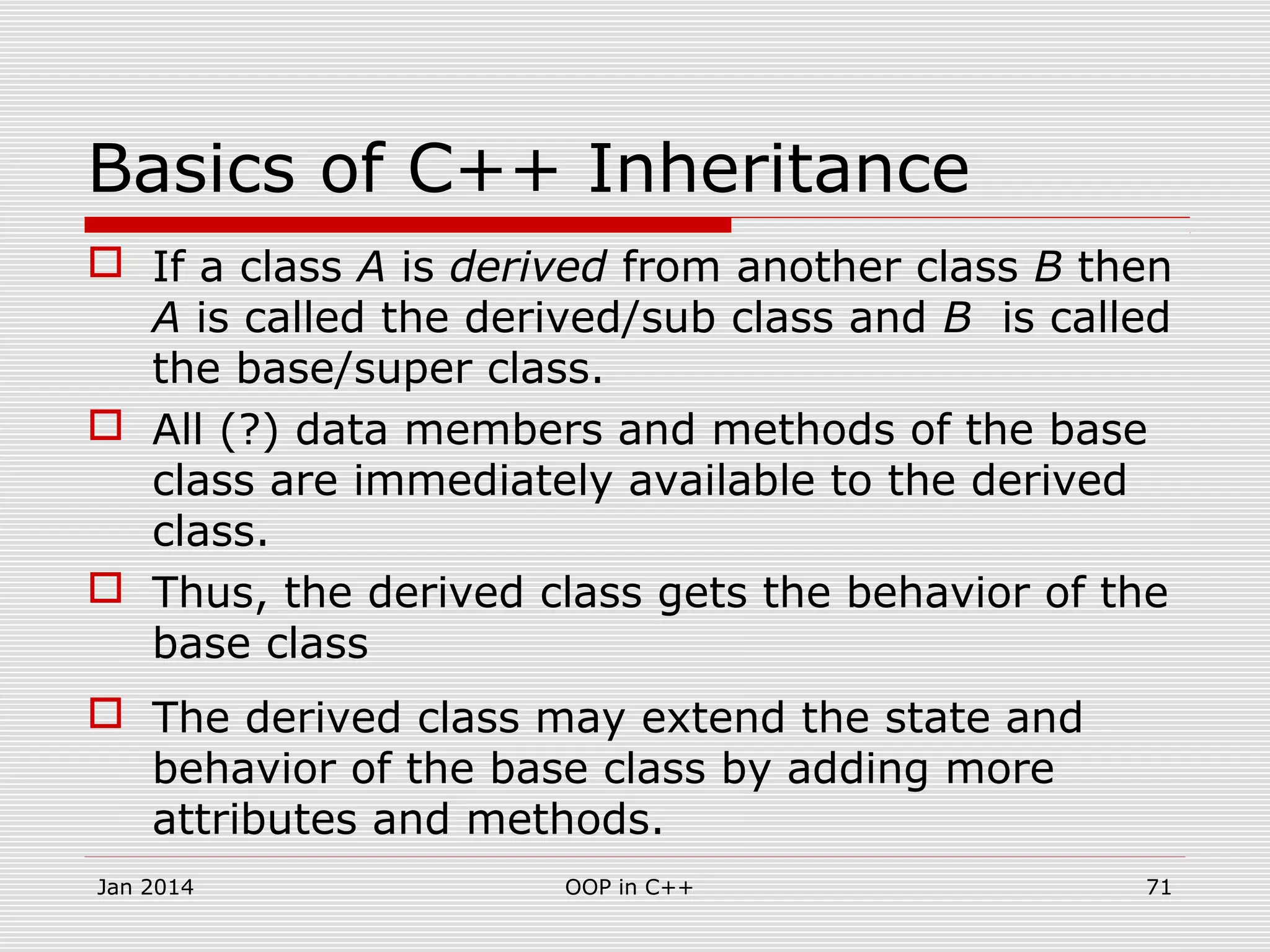
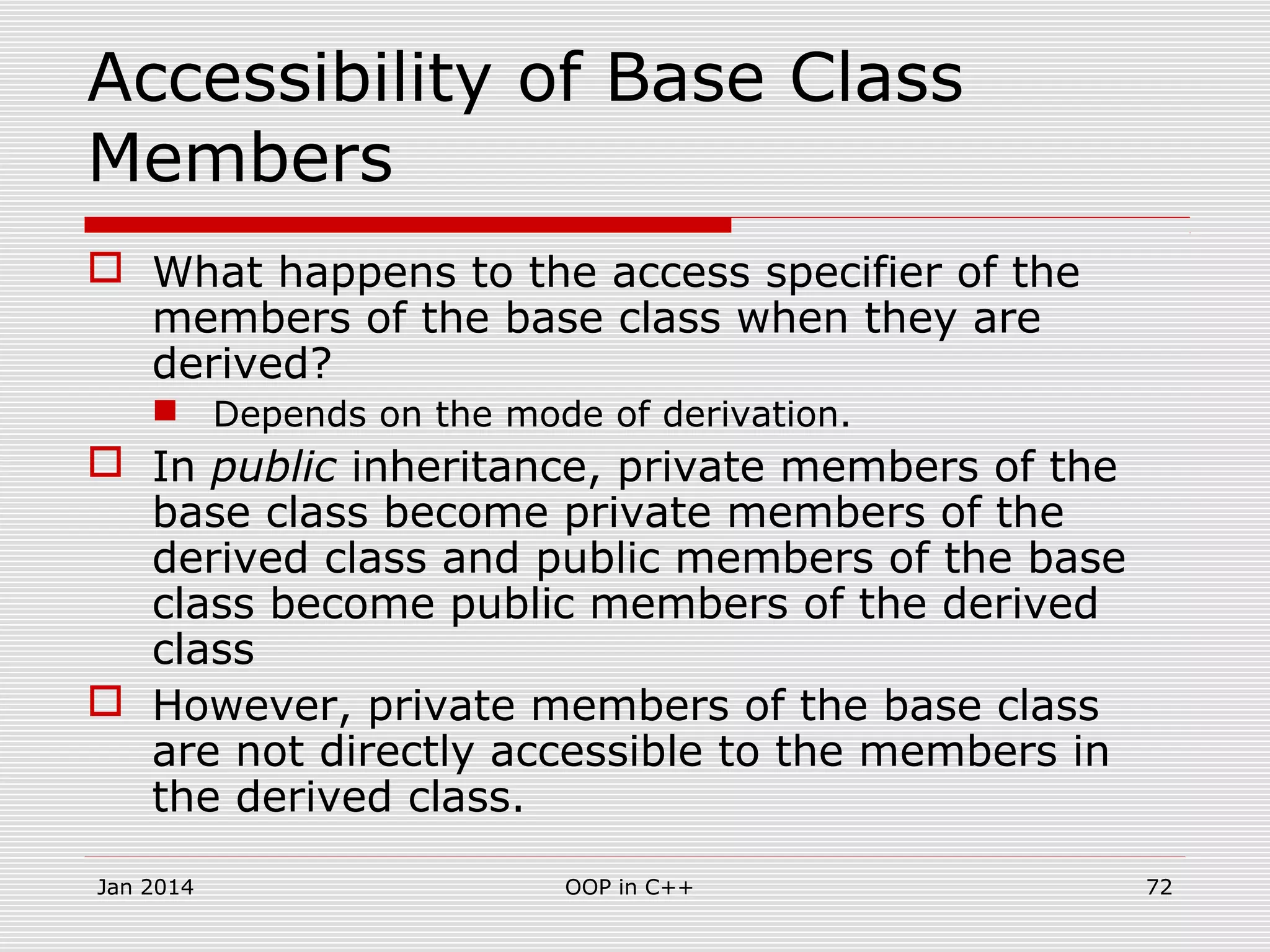
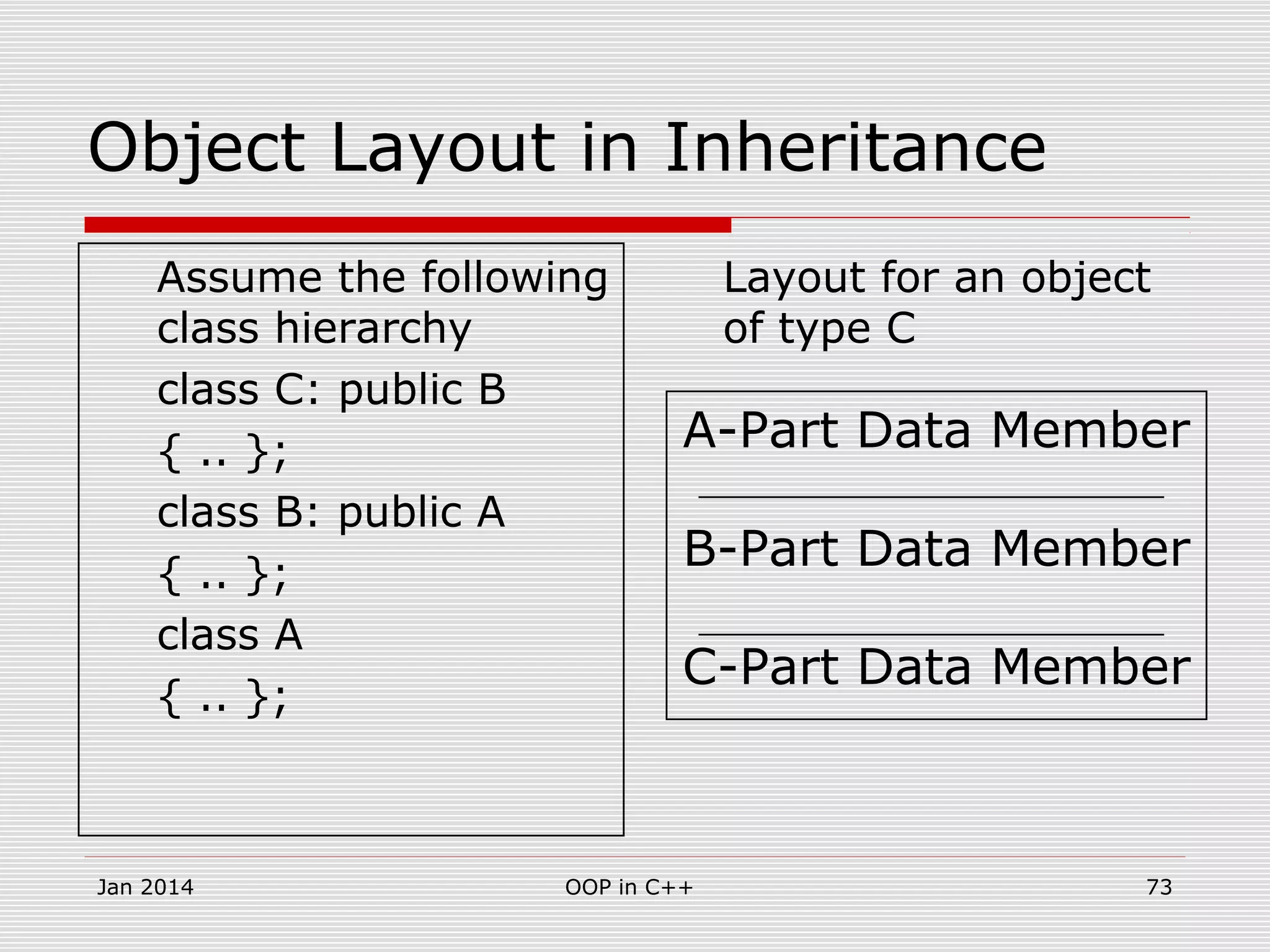
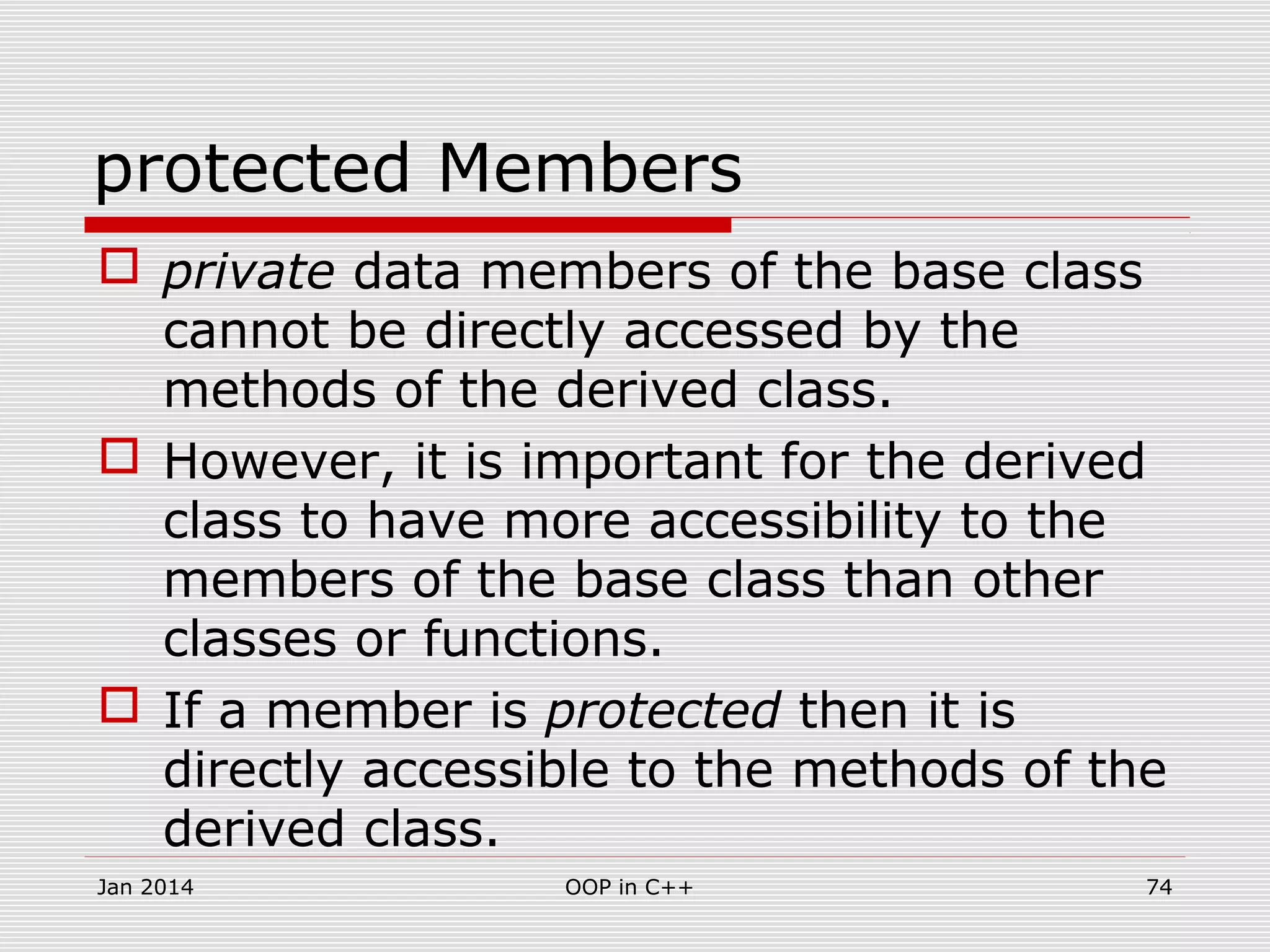
![Syntax of Inheritance
An example
class Employee {
protected:
float basic;
long id;
public:
Employee(long id);
float getSalary();
};
class Manager : public Employee {
protected:
Employee *supervised[10];
int numberOfPeopleManaged;
public:
Manager(Id, n);
float getSalary();
void printSupervisedEmployeeId();
}
Jan 2014 75OOP in C++](https://image.slidesharecdn.com/se-lecture02-30oopinc-140803025901-phpapp02/75/OOP-in-C-75-2048.jpg)
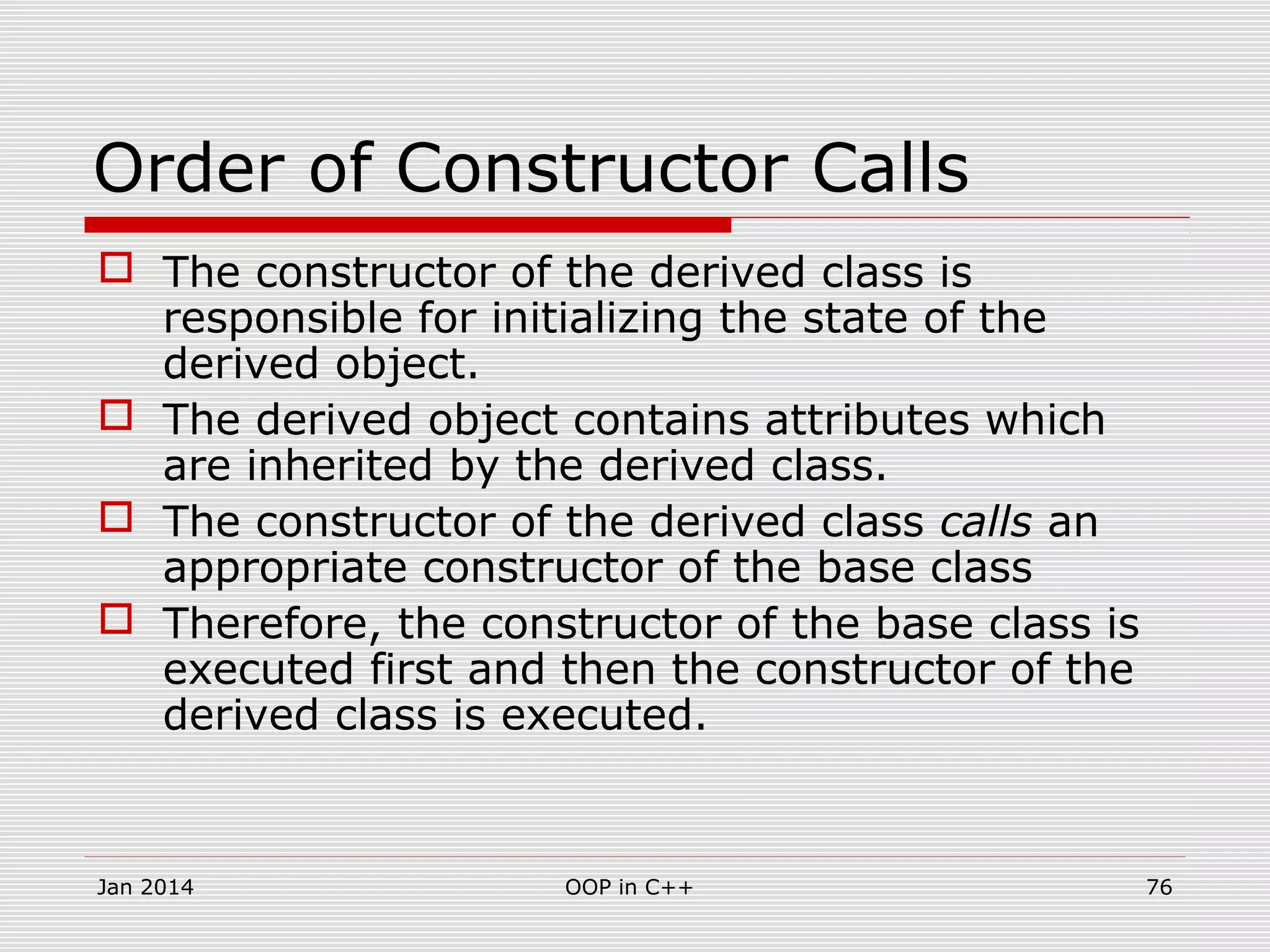
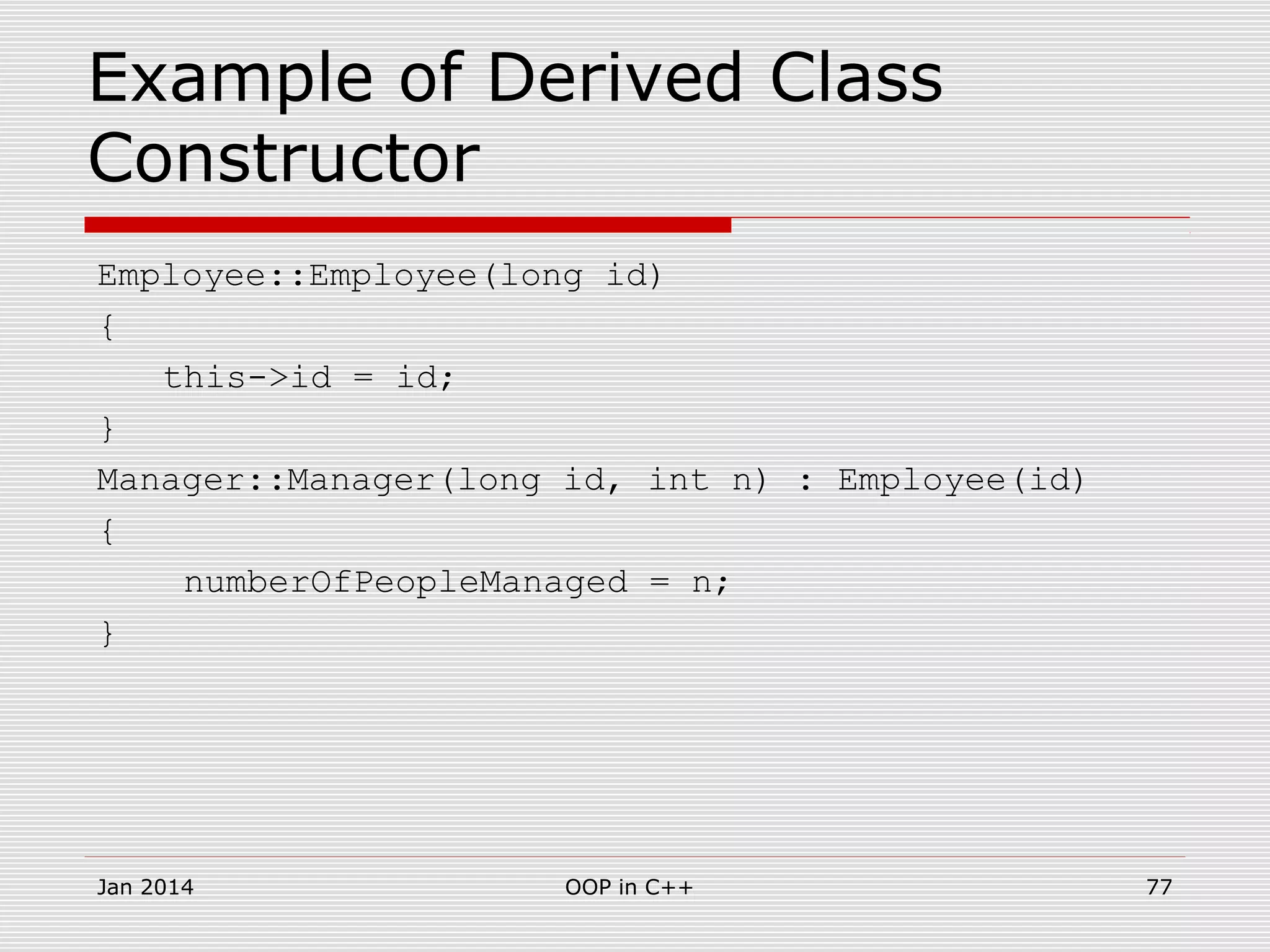
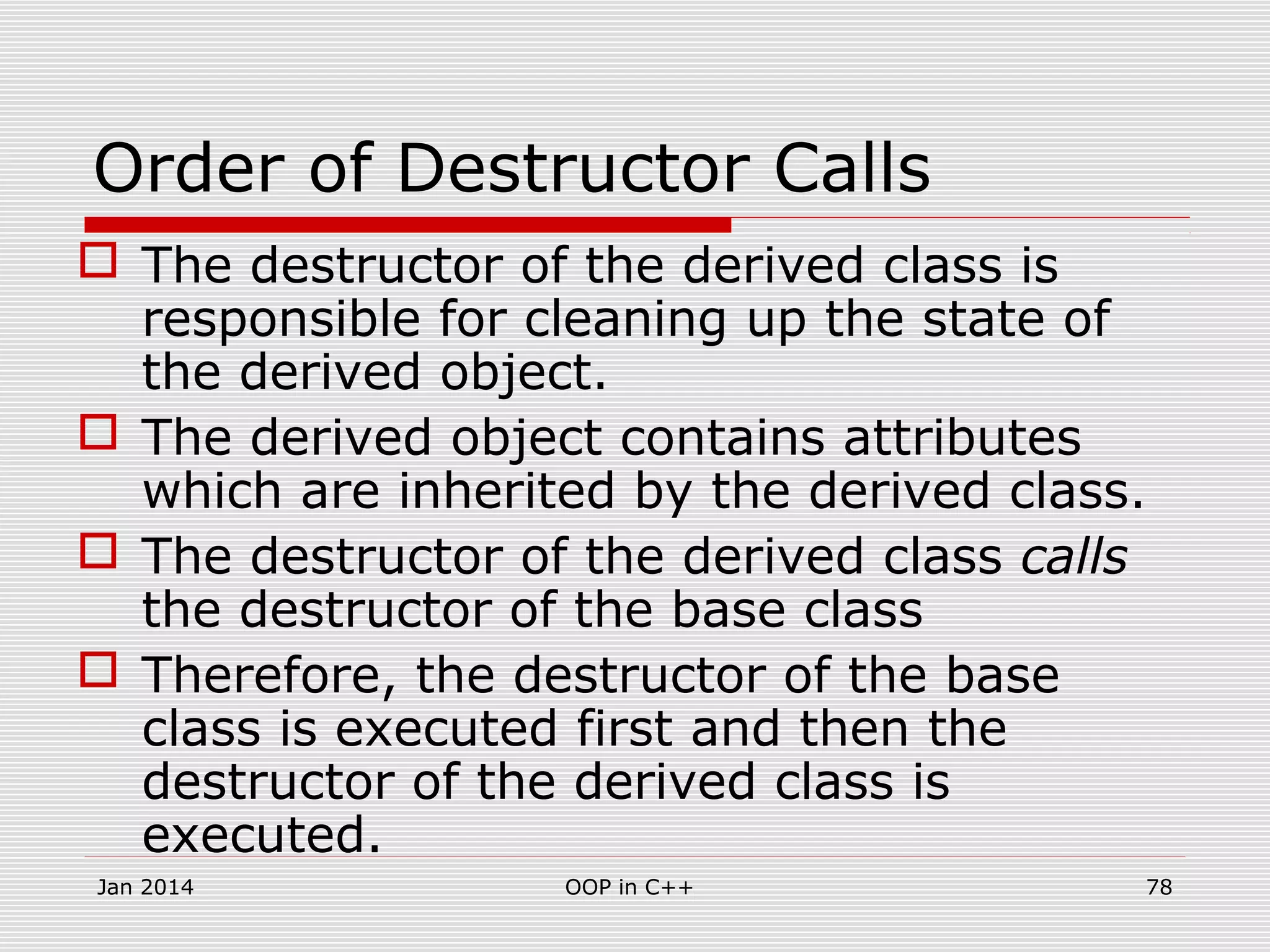
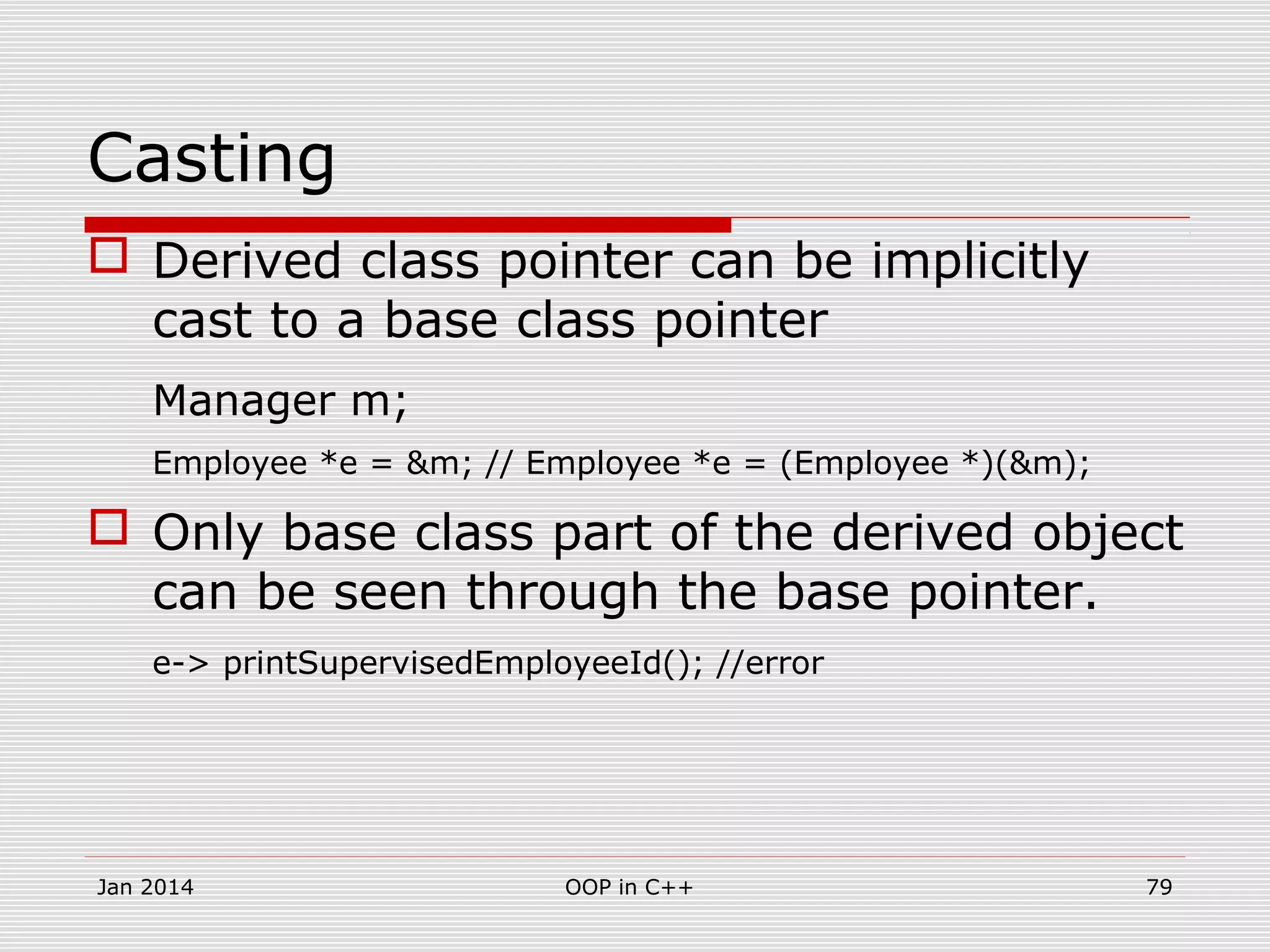
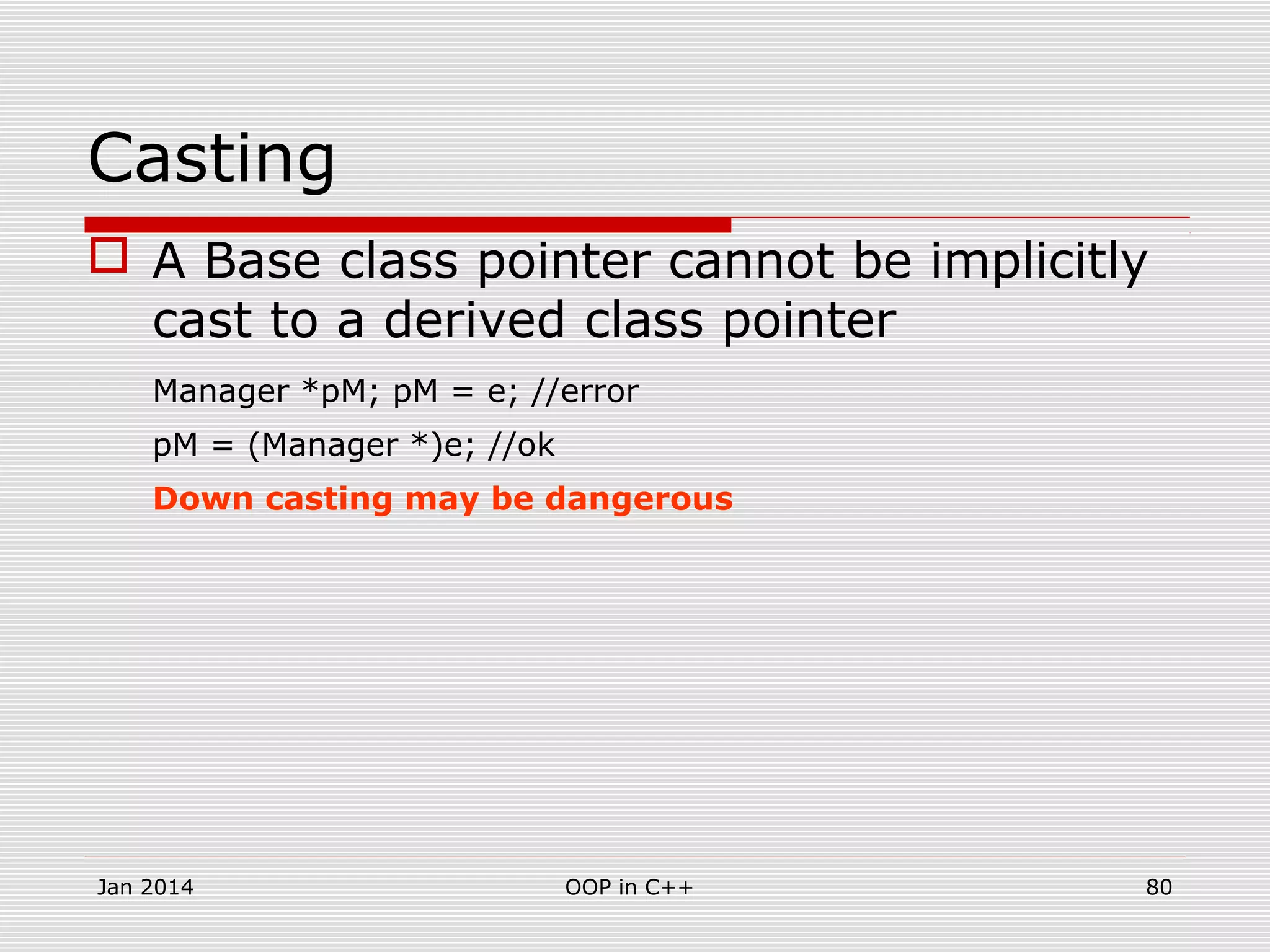
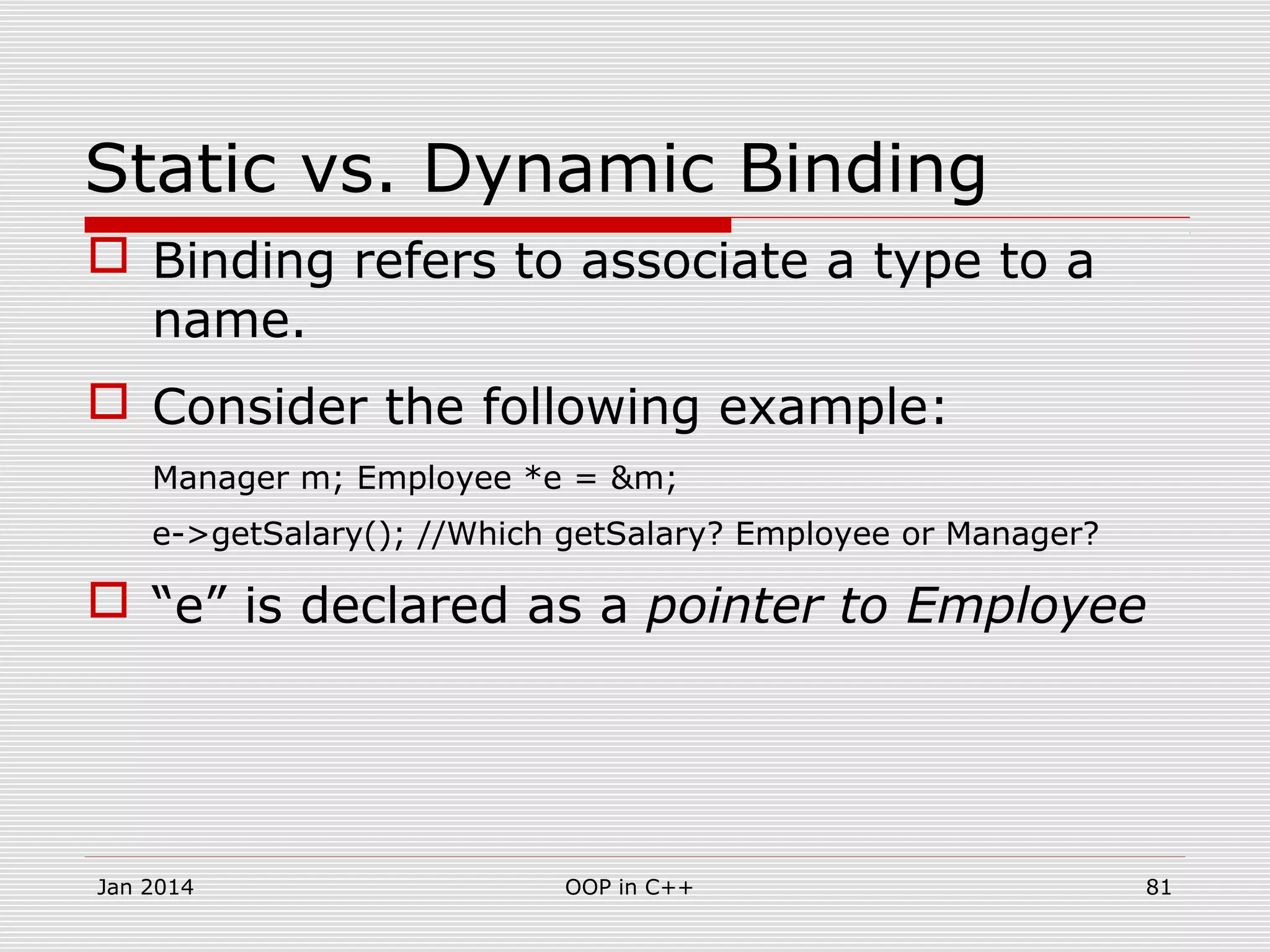
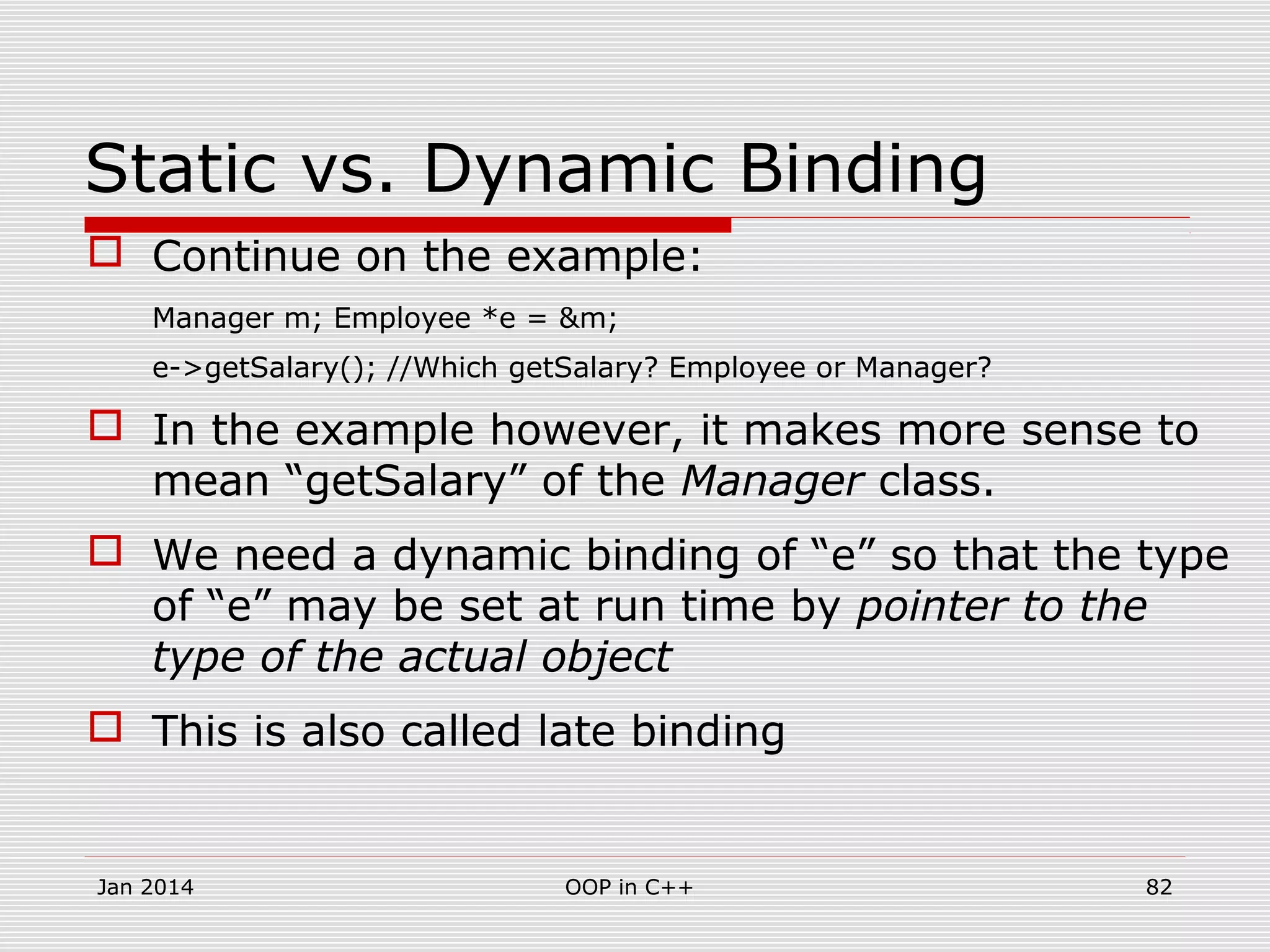
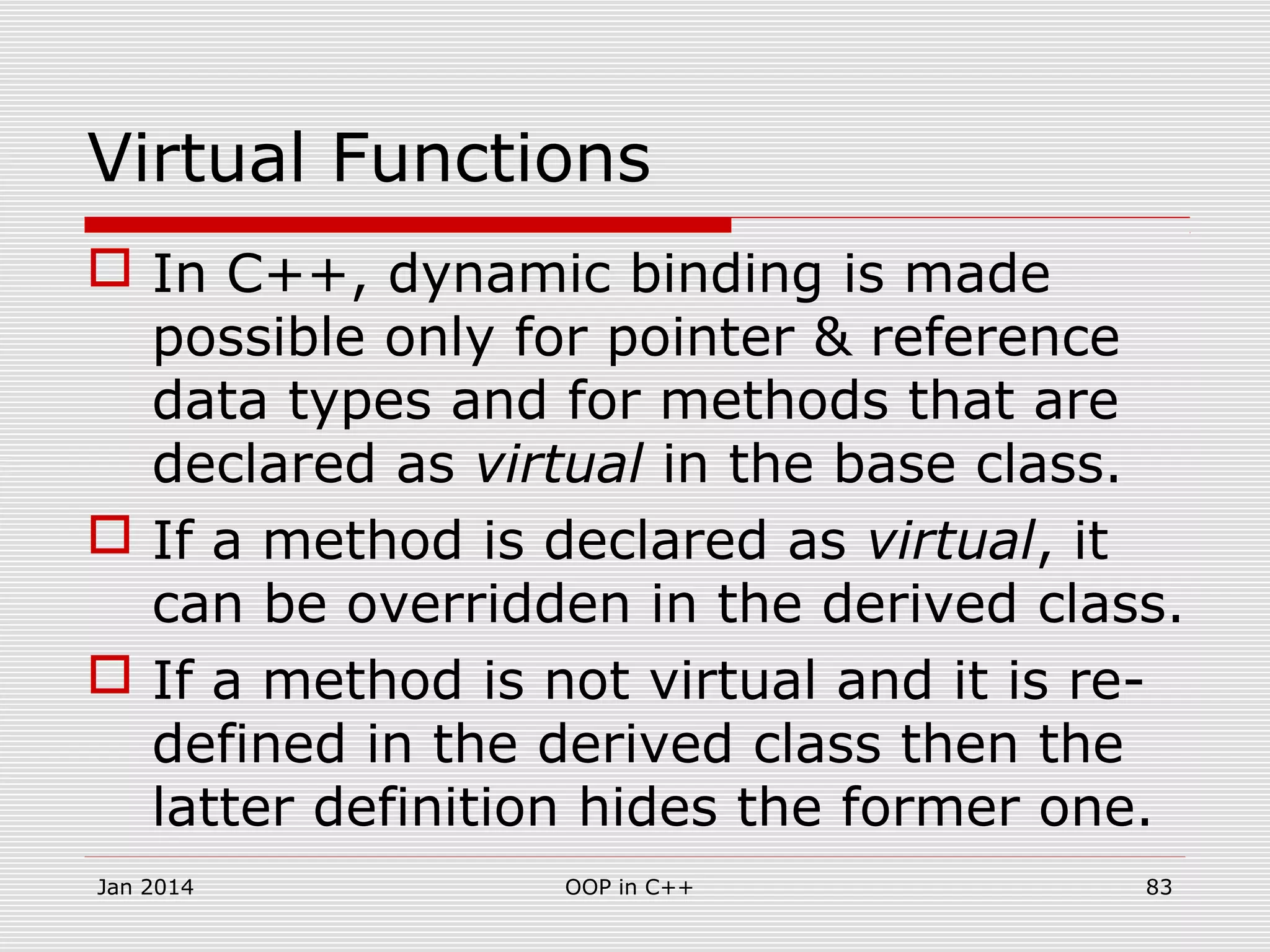
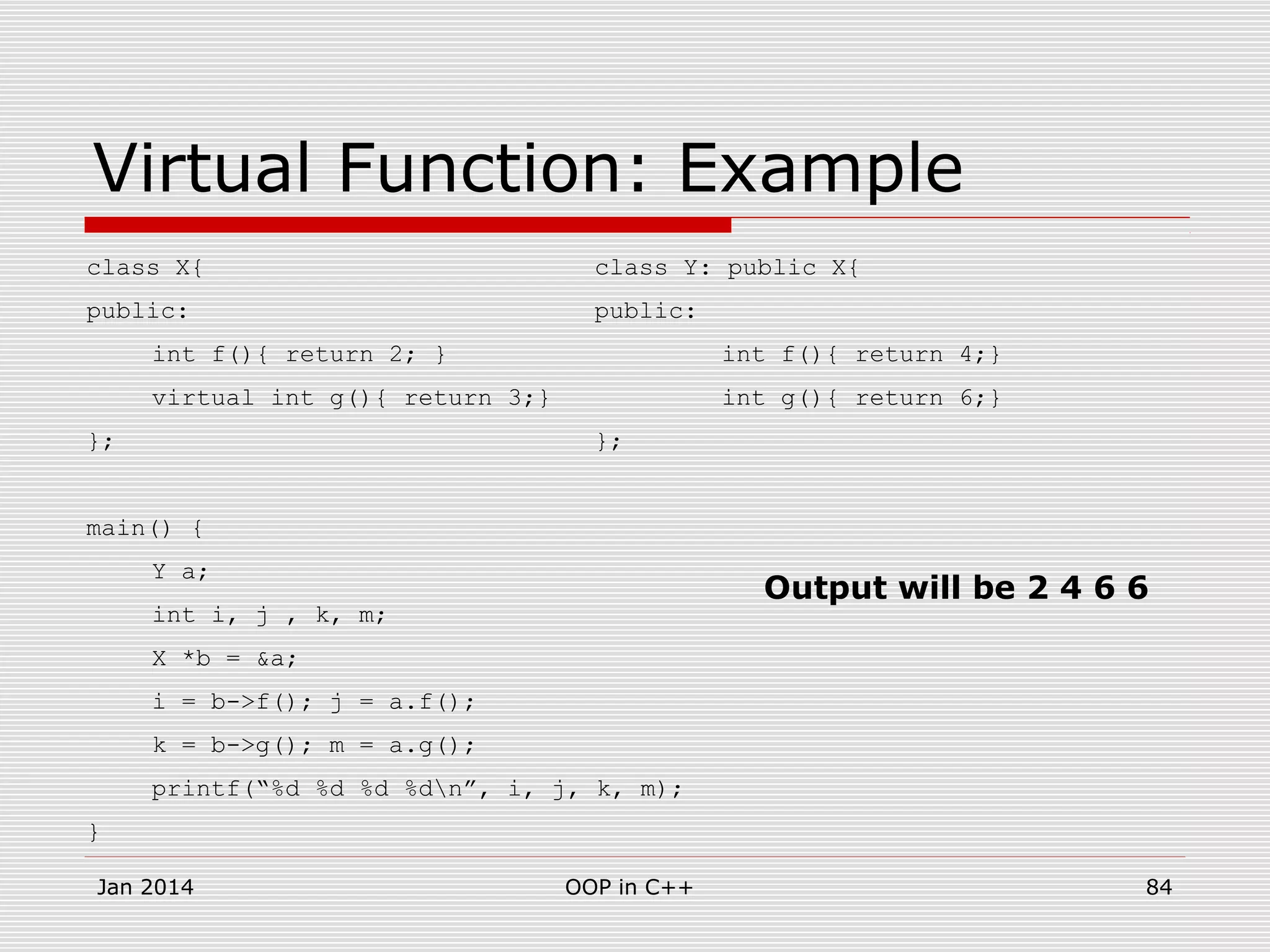
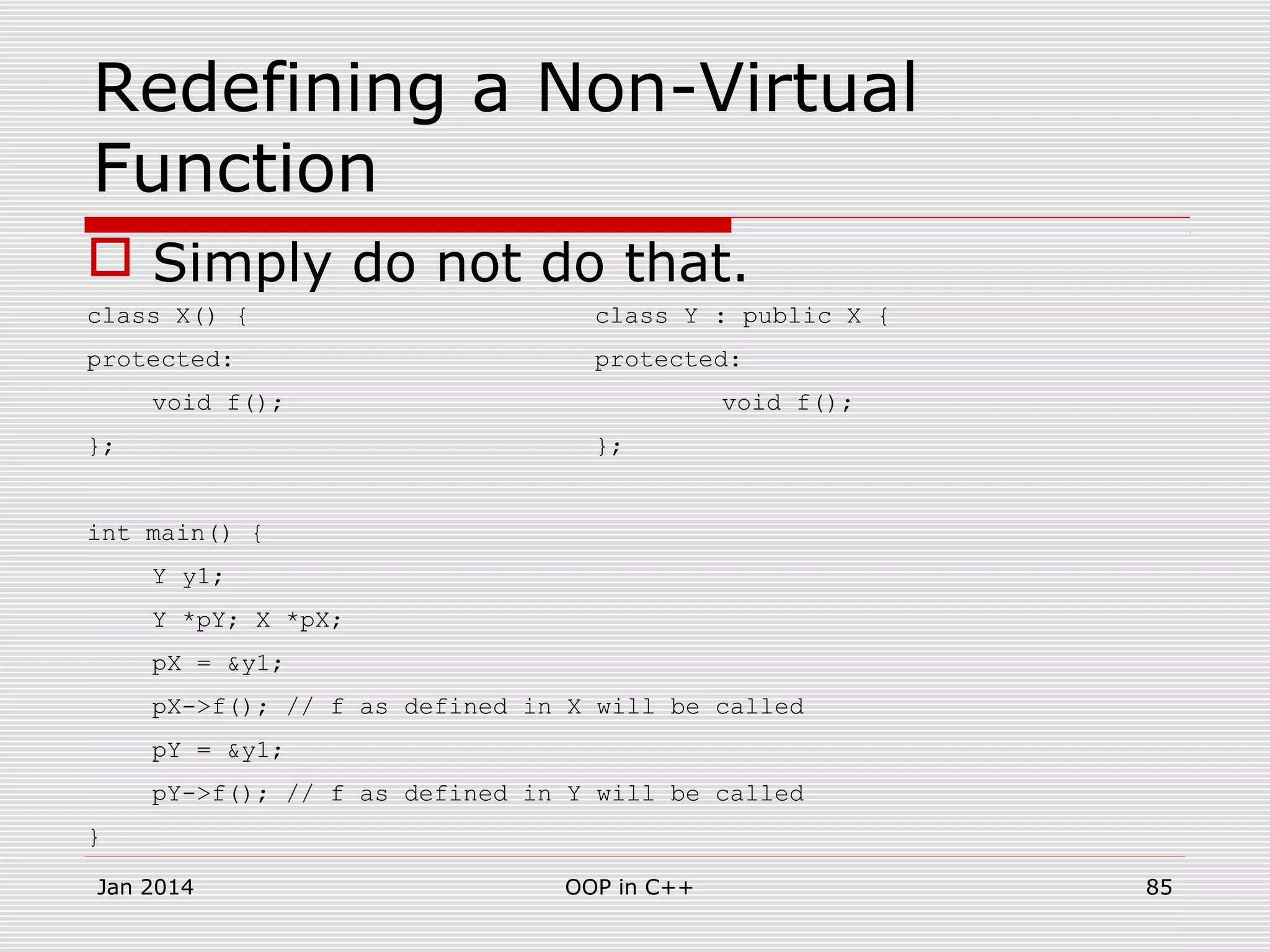
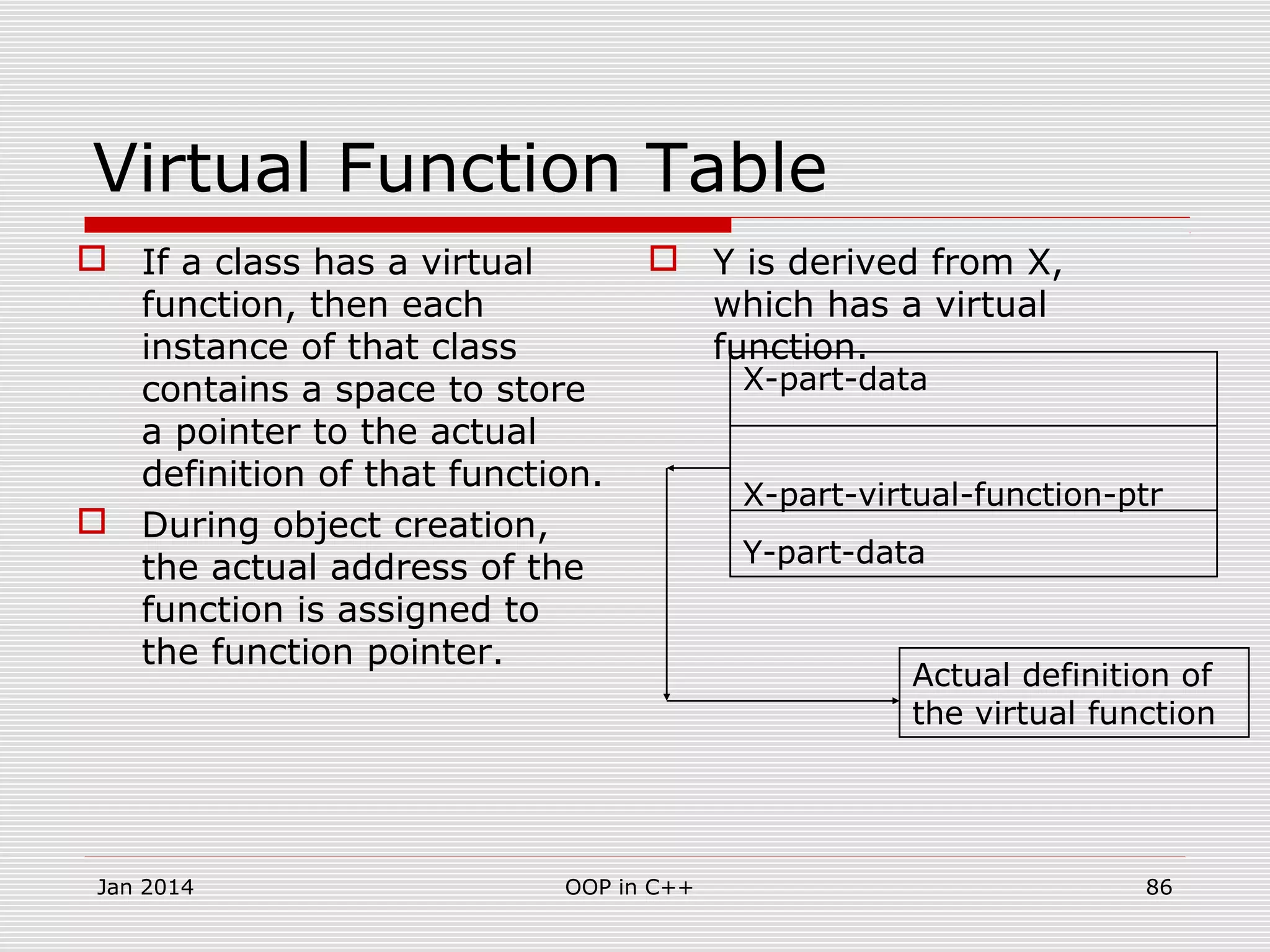
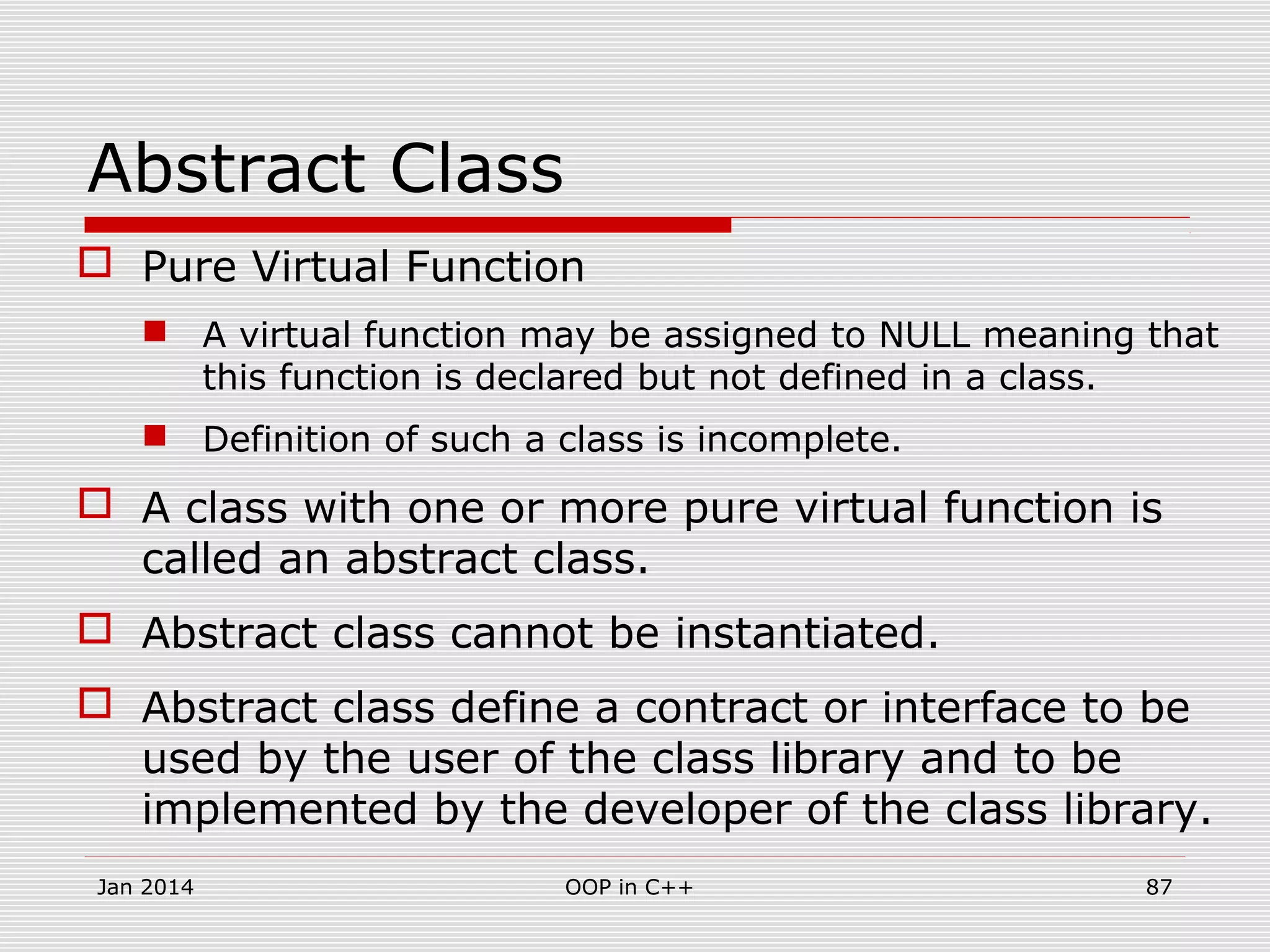
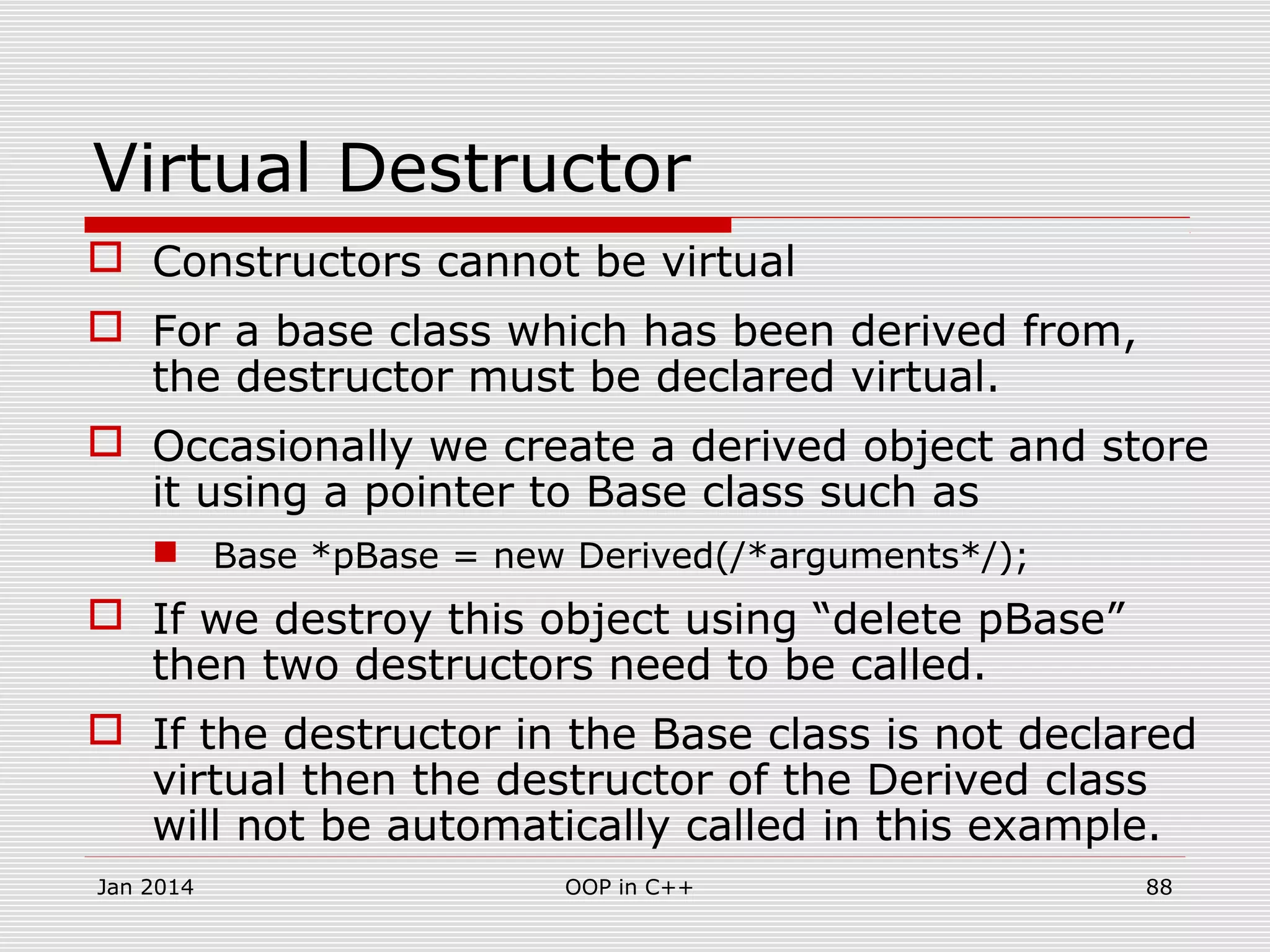
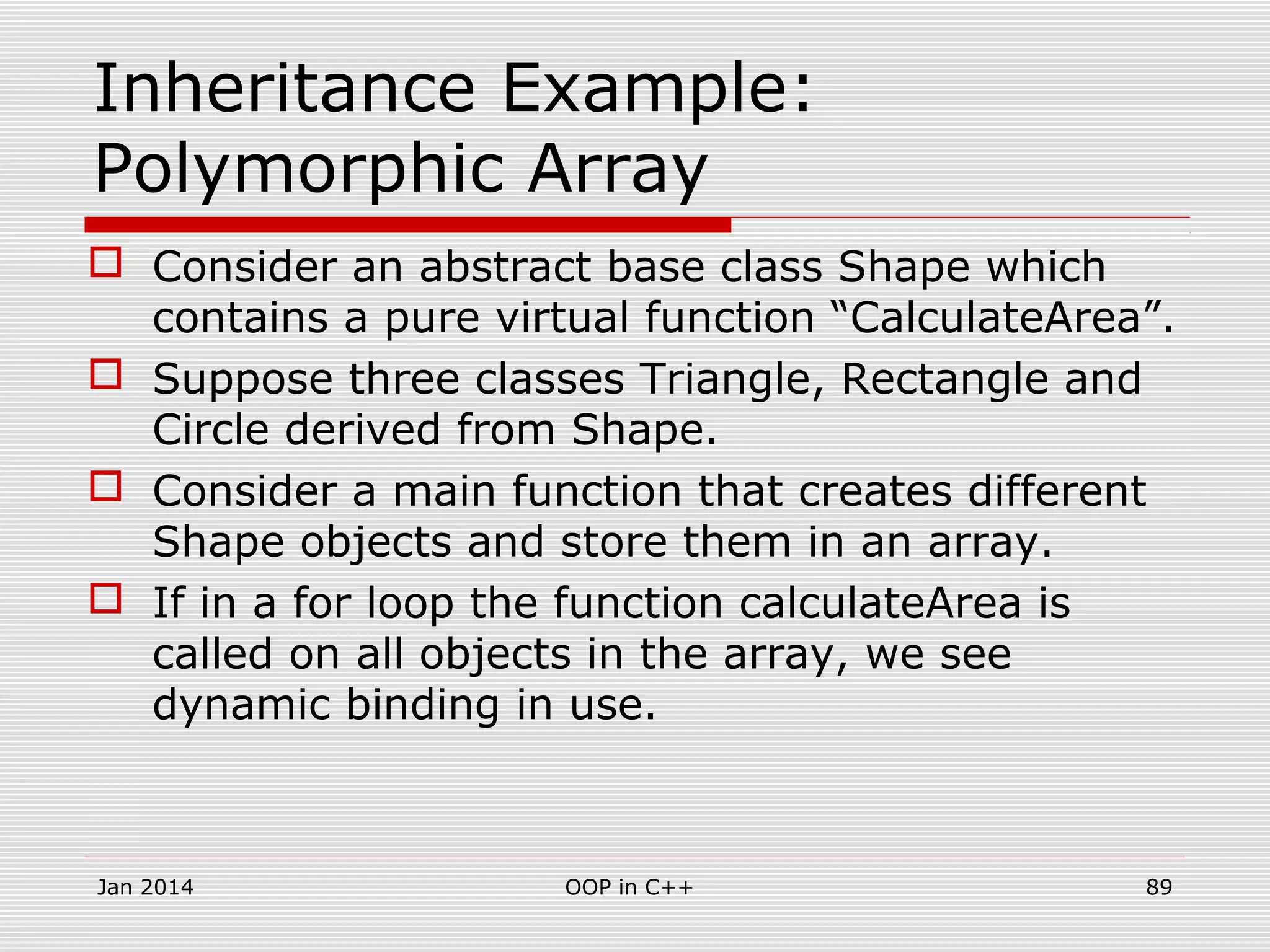
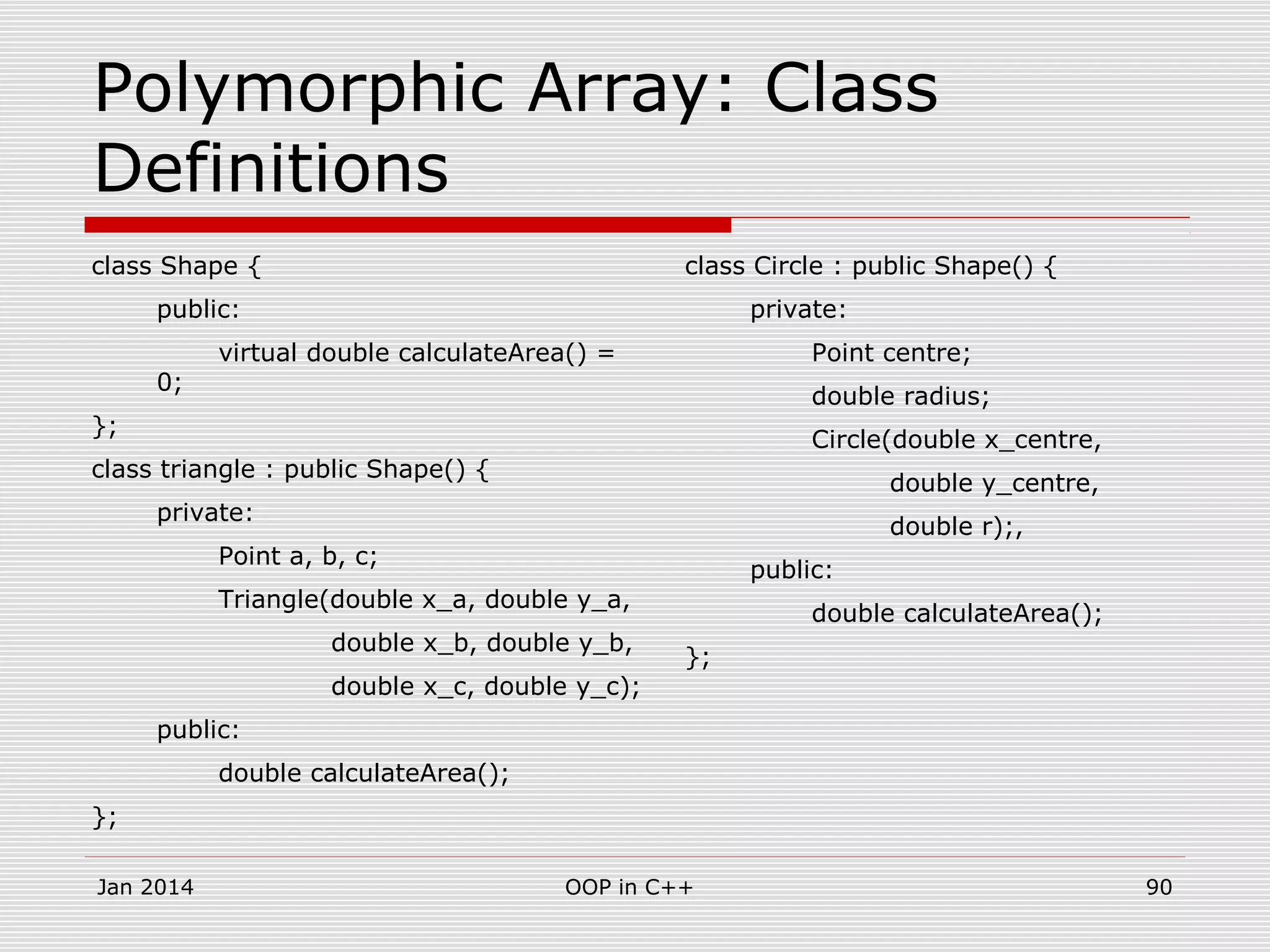
![Polymorphic Array: main
function
int main() {
Shape *pArr = NULL;
int n = getInput(pArr);
for (int i = 0; i < n; i++) {
double area =
Shape[i]->calculateArea();
printf (“%d %lf n”, i, area);
}
}
int getInput(Shape *pArr) {
printf(“Which Shape do you want to
create?n”);
printf(“Write 1 for triangle, 2 for
rectangle, 3 for circle and 0 to
quitn”);
int i,
double x_a, x_b, x_c, y_a, y_b, y_c;
while (1) { int j = 0;
scanf(“%d”, &i);
switch (i) {
case 0: break;
case 1:
scanf(“%f%f%f%f%f%f”, &x_a,
&y_a, &x_b, &y_b, &x_c, &y_c);
pArr[j++] = new Triangle(&x_a,
&y_a, &x_b, &y_b, &x_c, &y_c);
break;
……..
}
}
}
Jan 2014 91OOP in C++](https://image.slidesharecdn.com/se-lecture02-30oopinc-140803025901-phpapp02/75/OOP-in-C-91-2048.jpg)
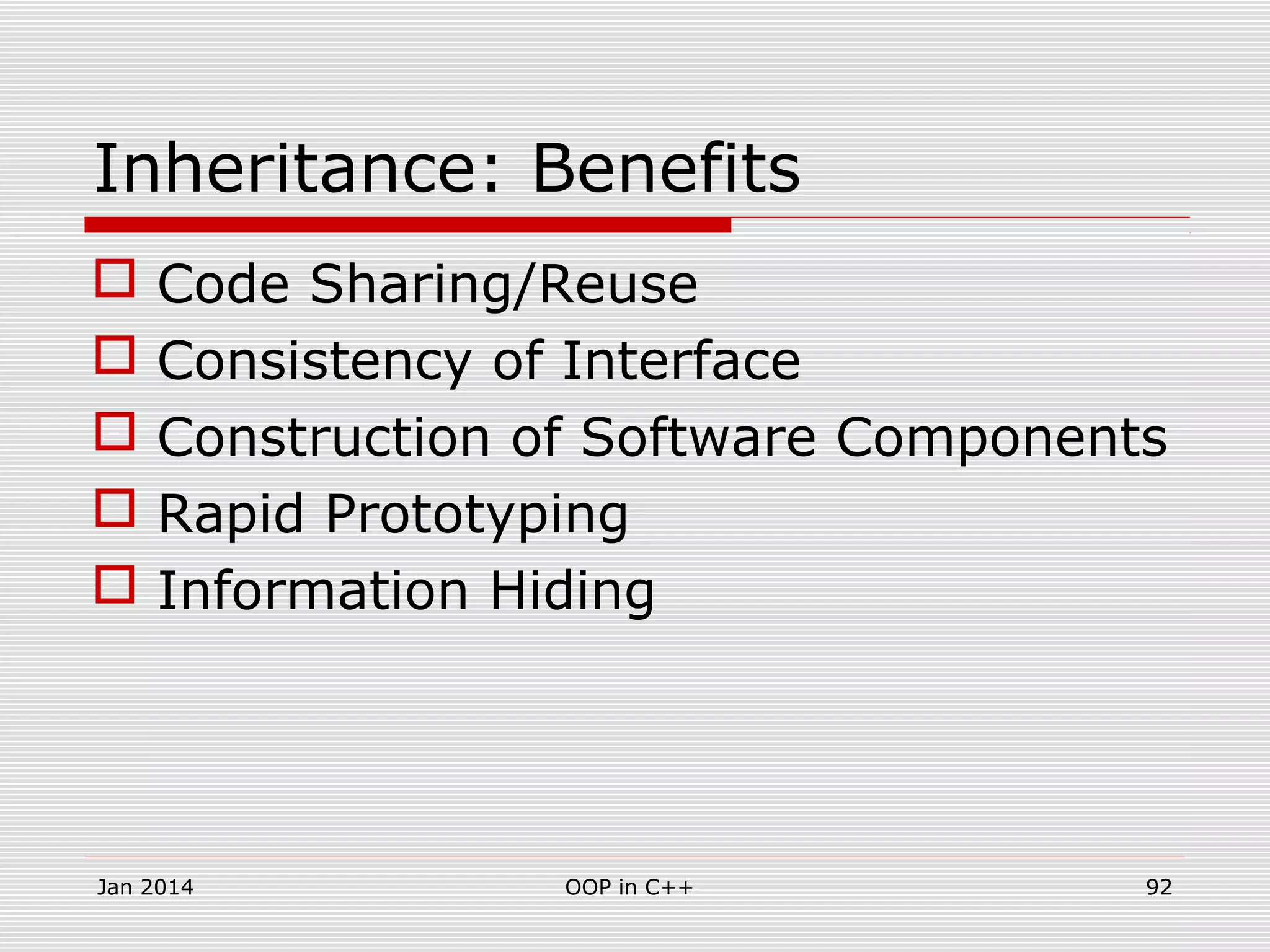
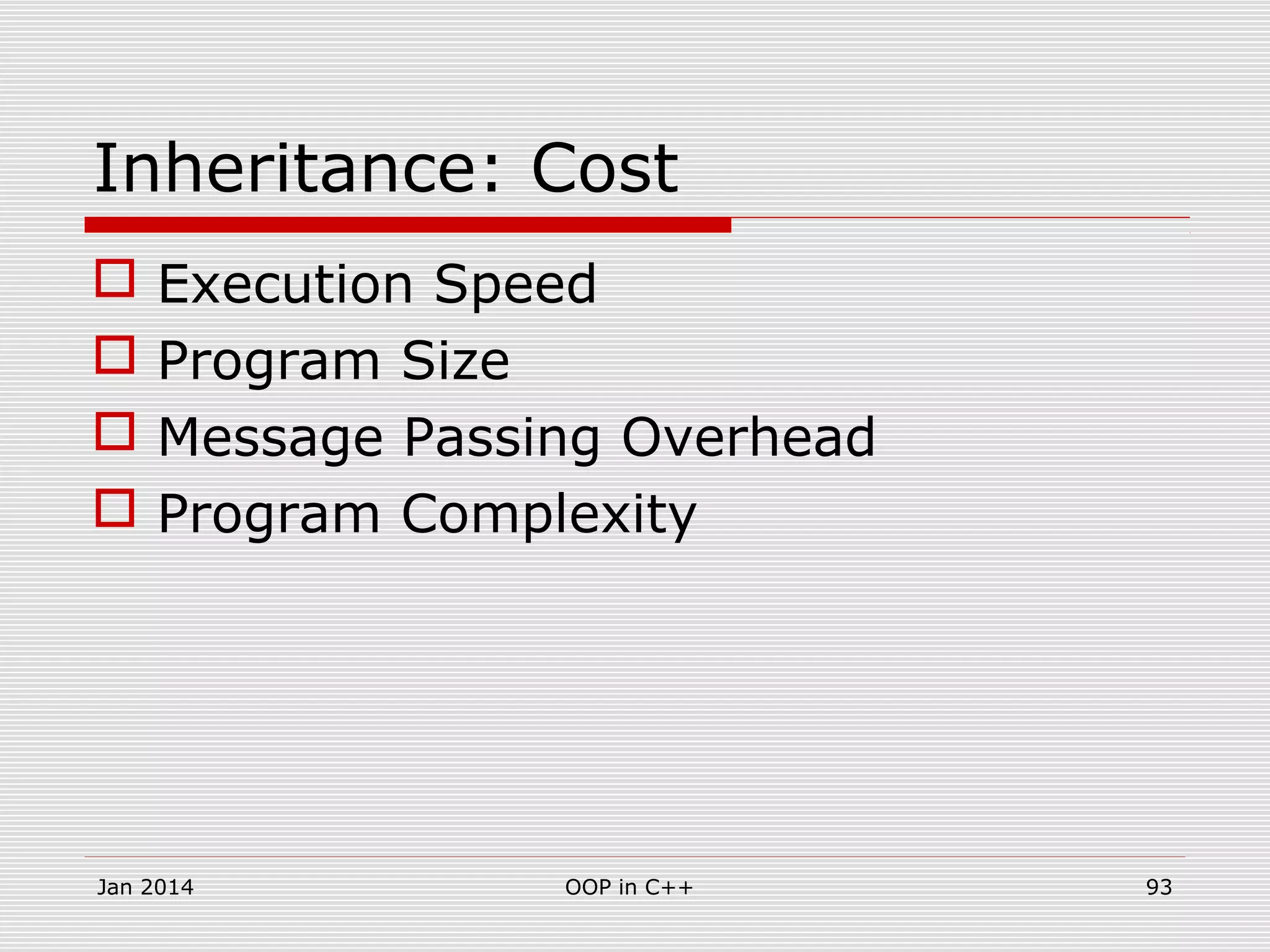
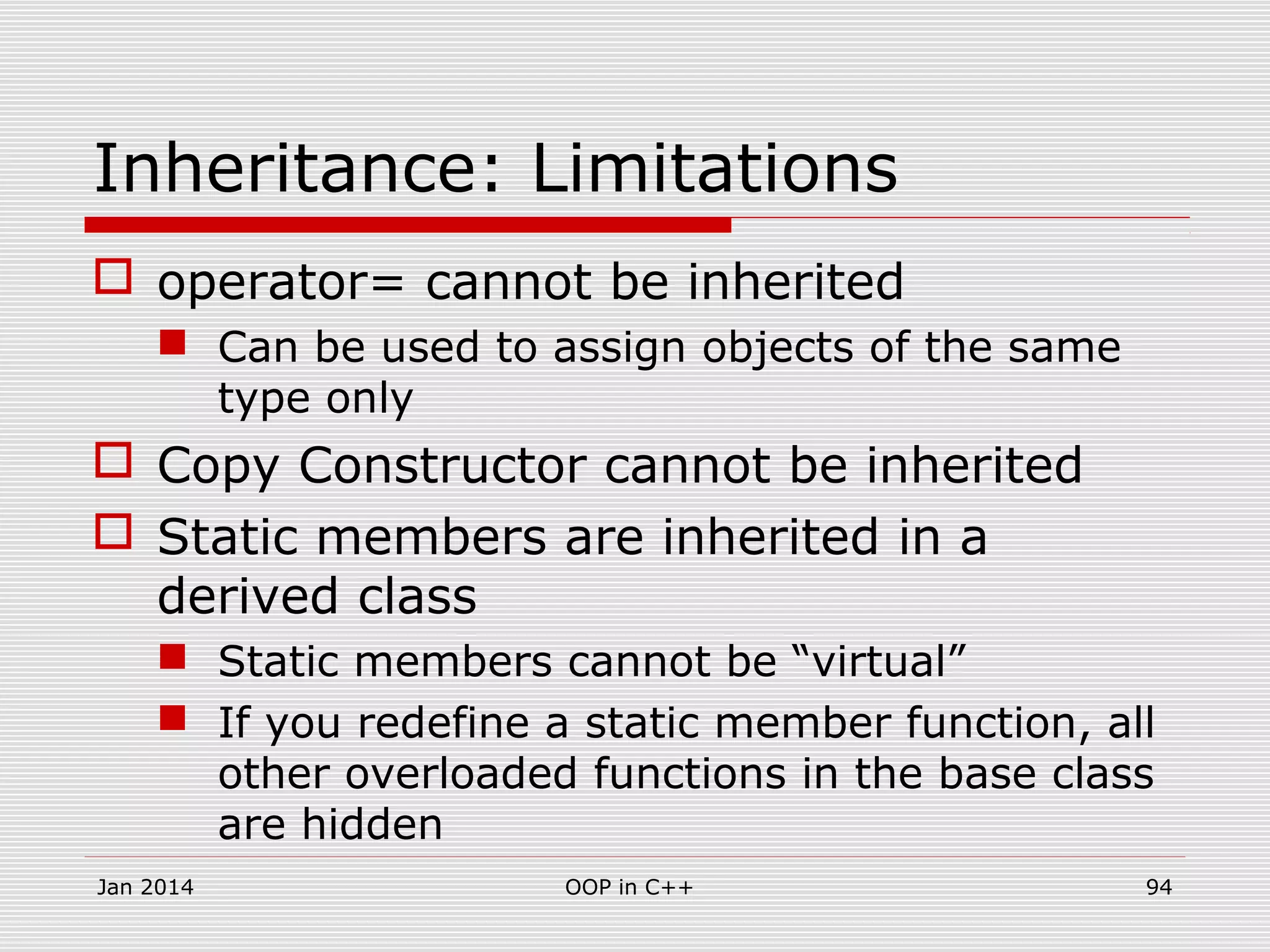
![Inheritance Notes
Constructors cannot be virtual
Calling a virtual function from within a
constructor does not have the desired effect.
The following code is buggy. Tell why.
void f(Base *b) { int main() {
b[0].f(); b[1].f(); Derived d[10];
} f(d);
}
Derived is publicly derived from Base.
Class Base has a virtual function “f” which is
redefined in Derived.
Jan 2014 95OOP in C++](https://image.slidesharecdn.com/se-lecture02-30oopinc-140803025901-phpapp02/75/OOP-in-C-95-2048.jpg)
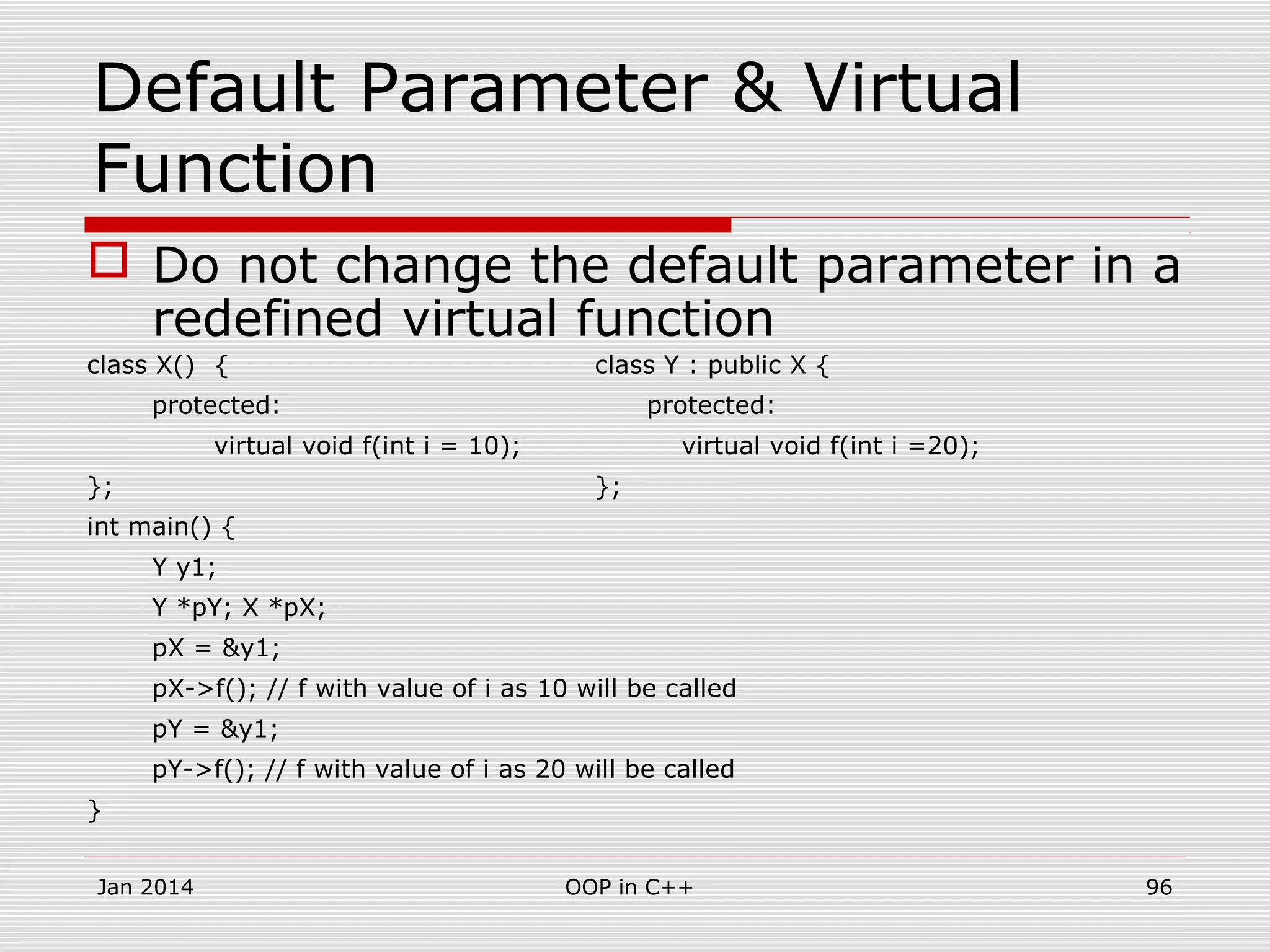
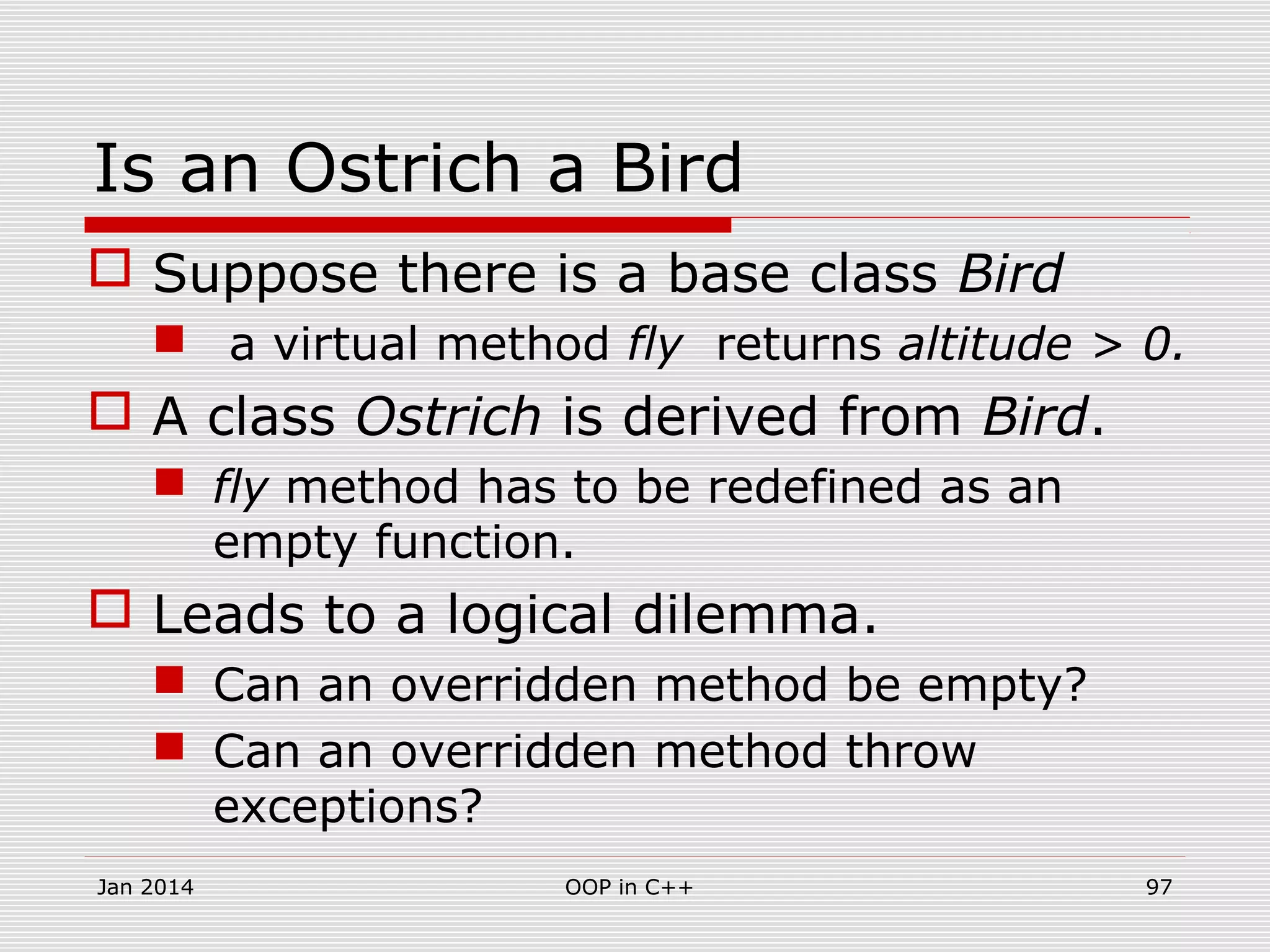
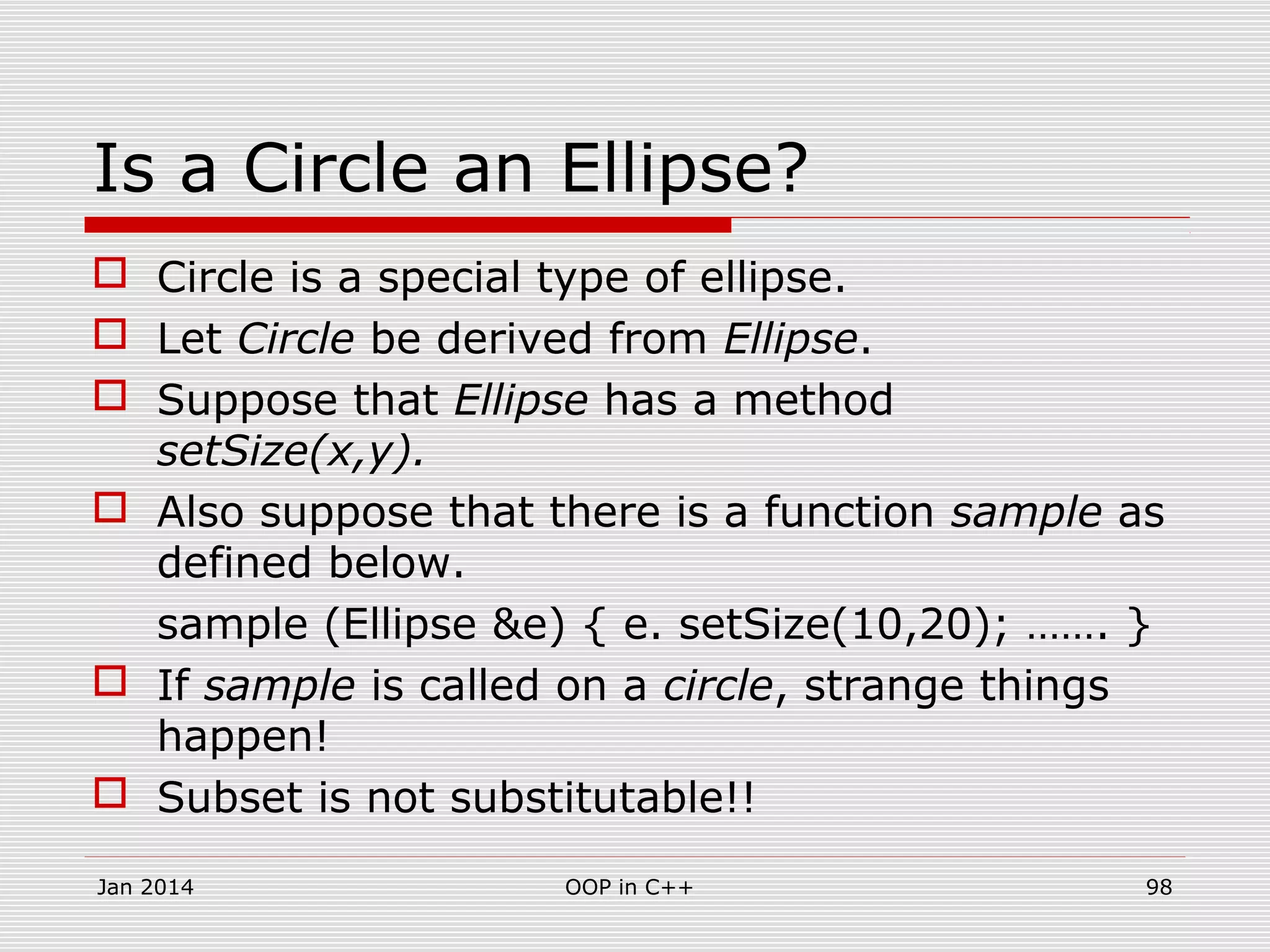
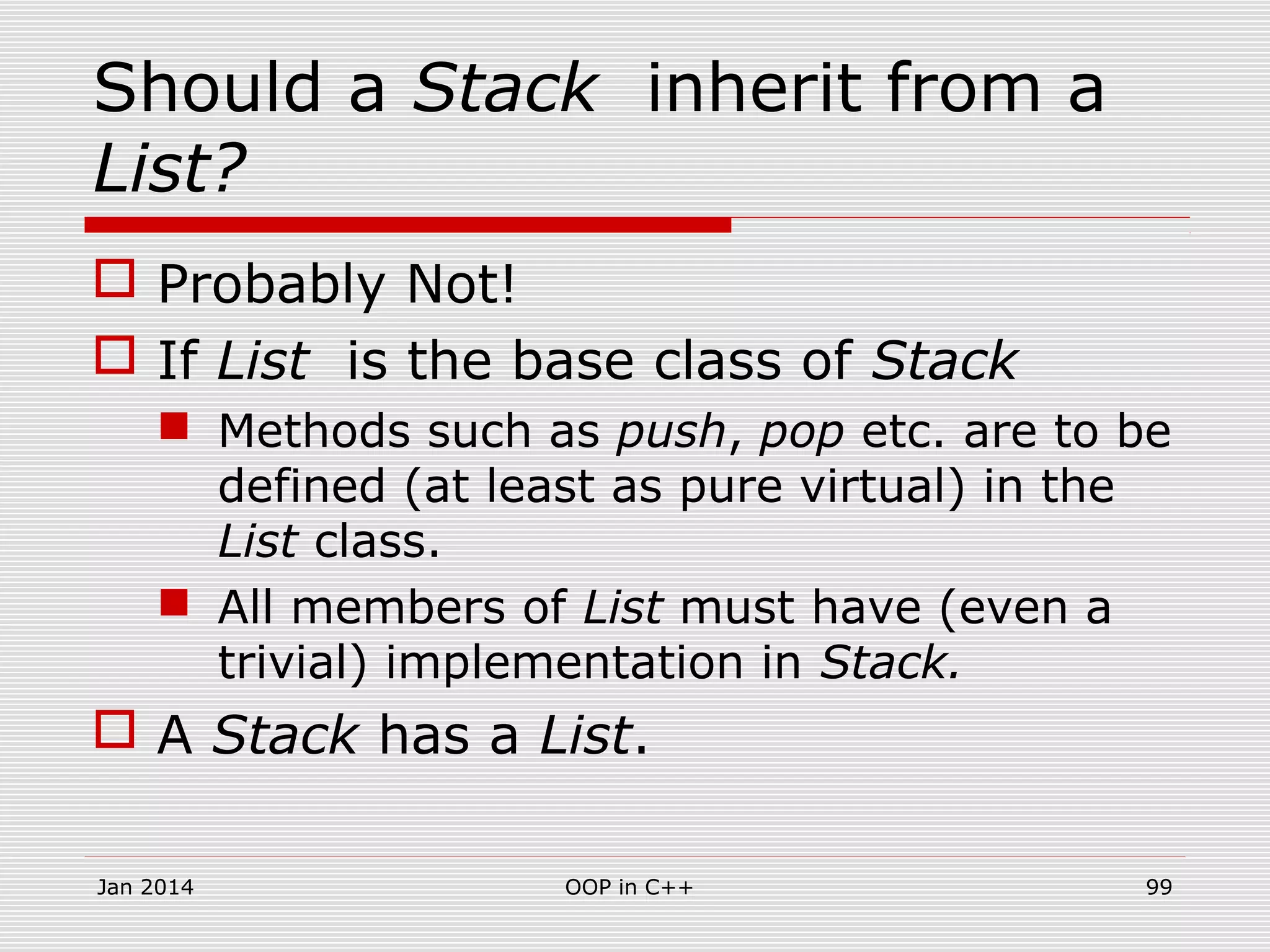
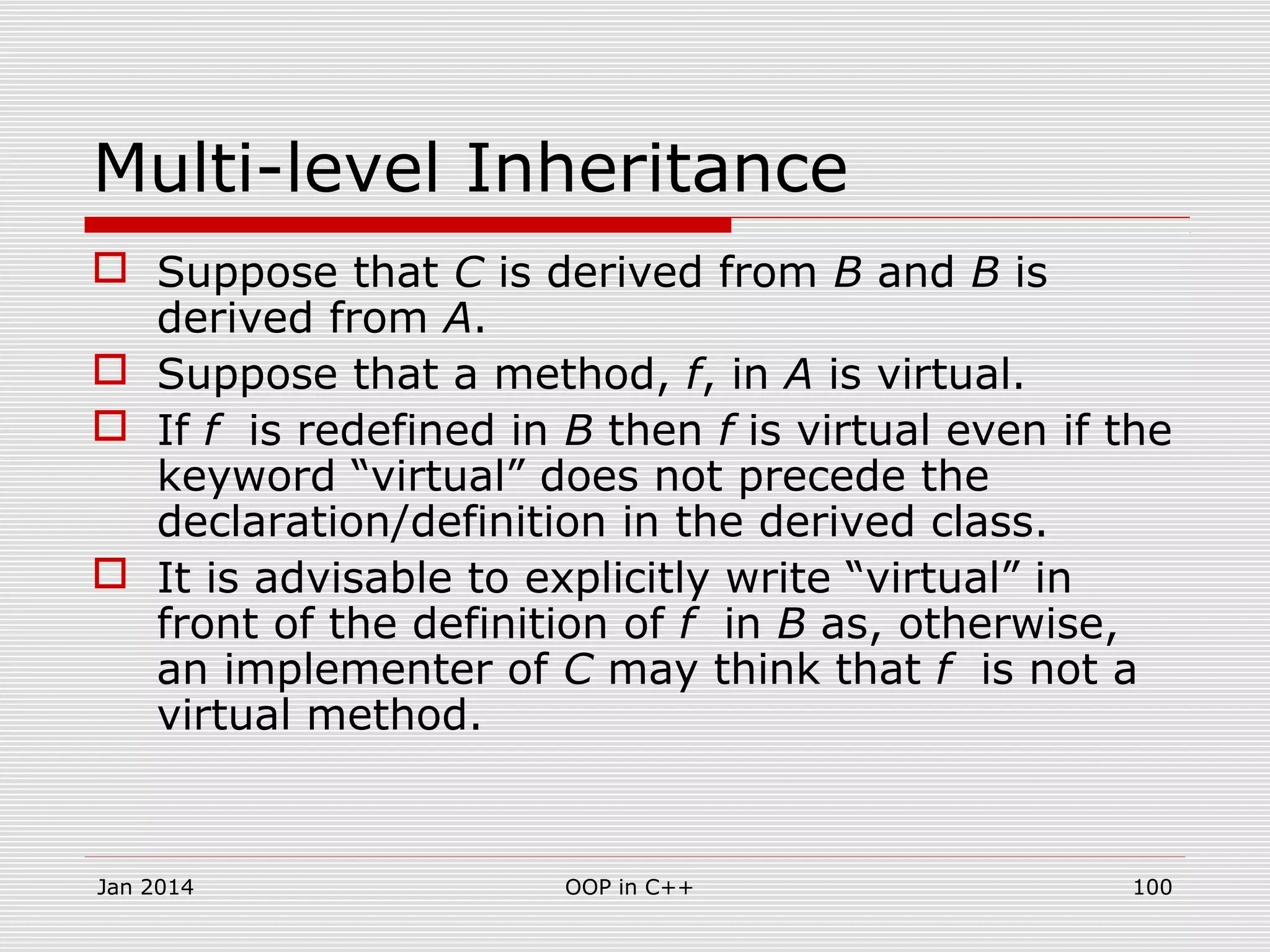
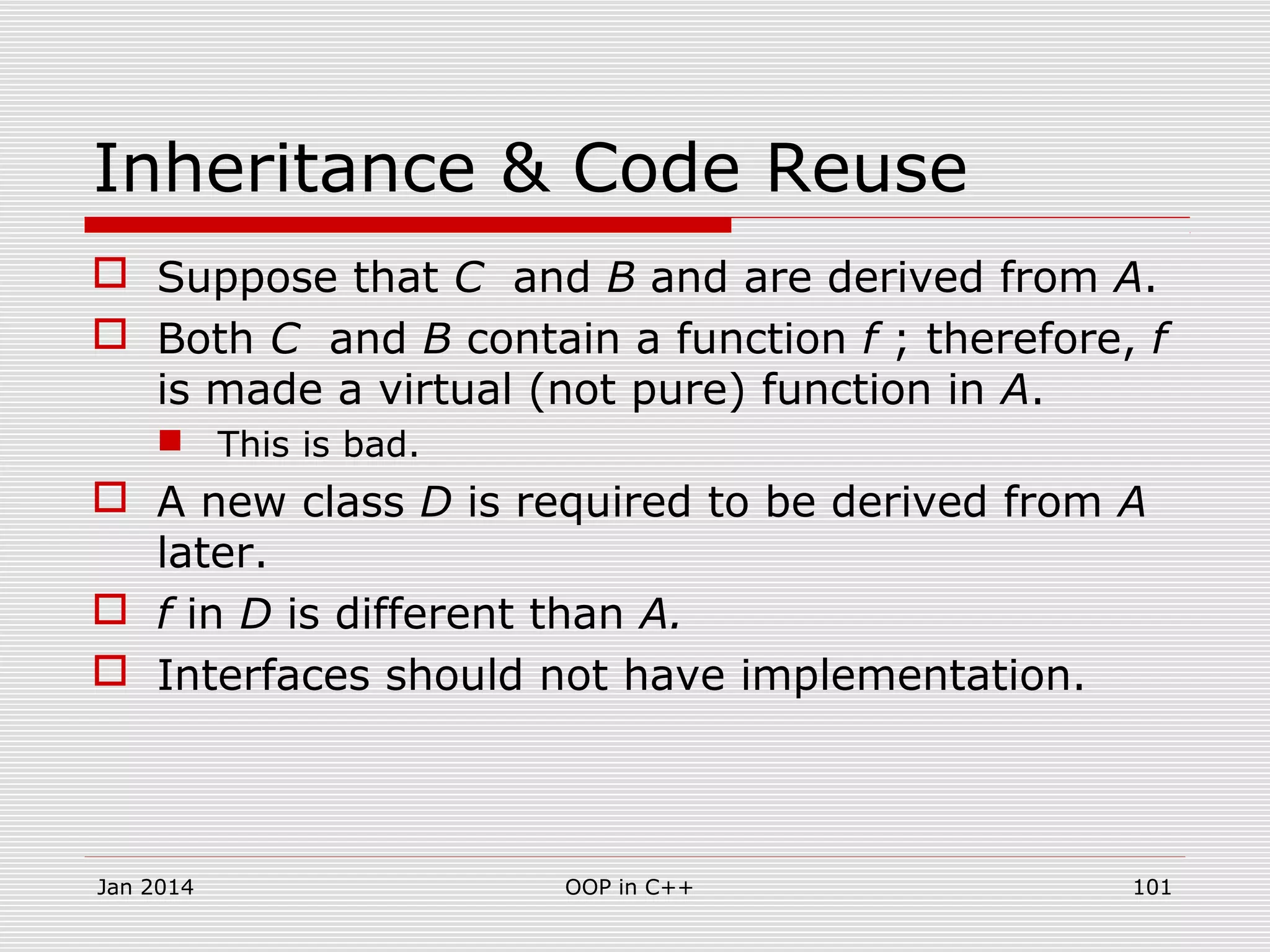
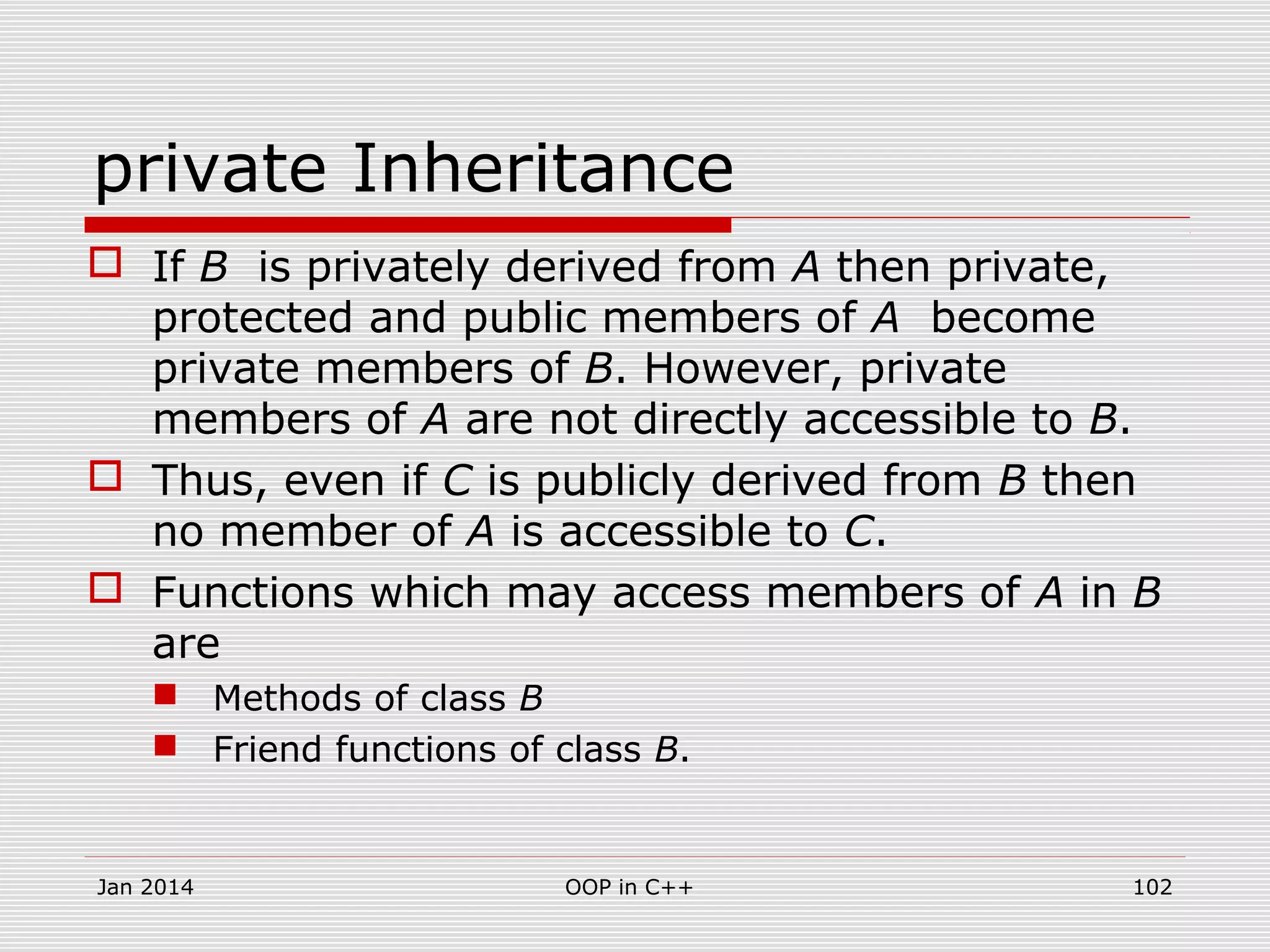
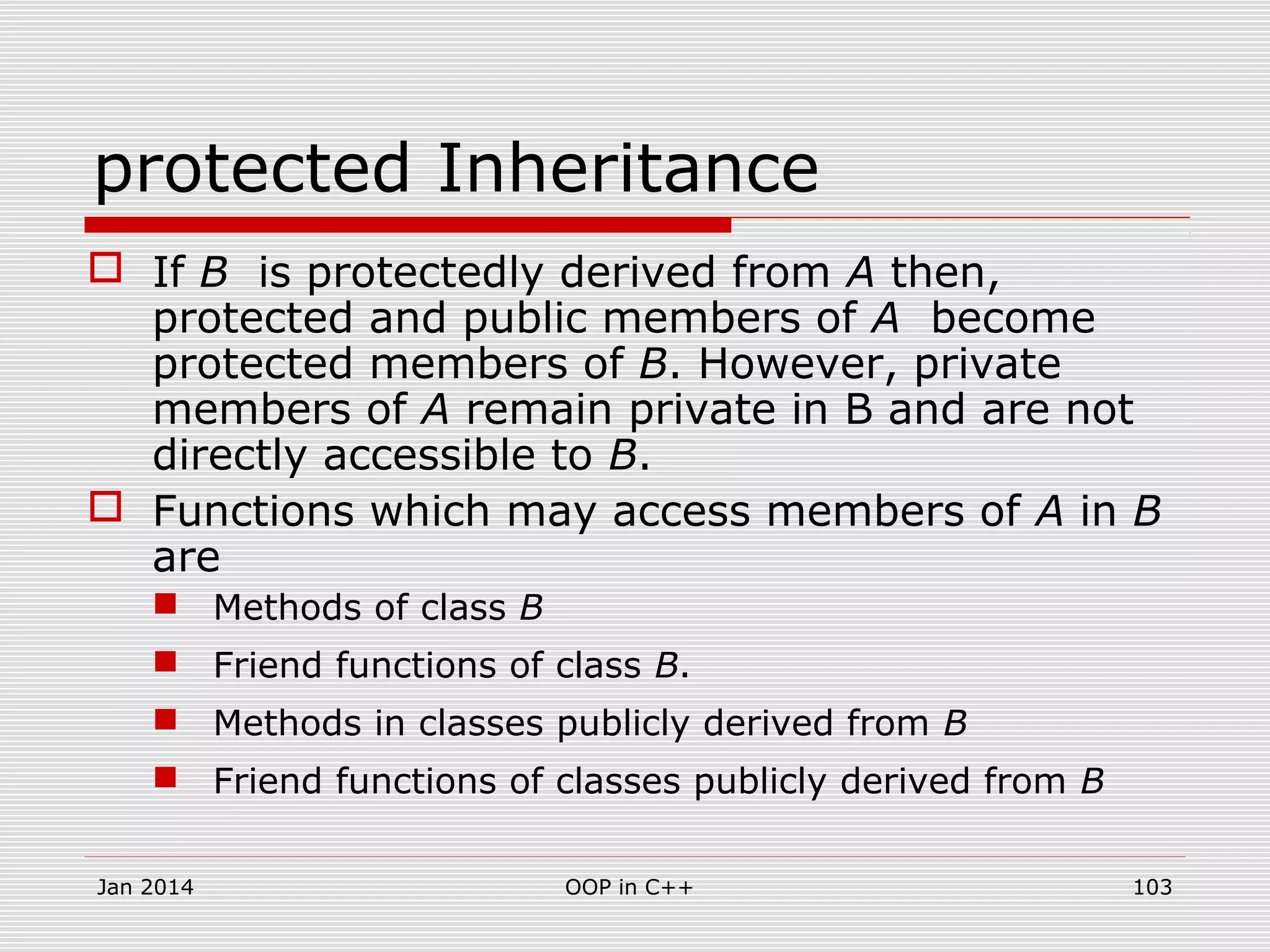
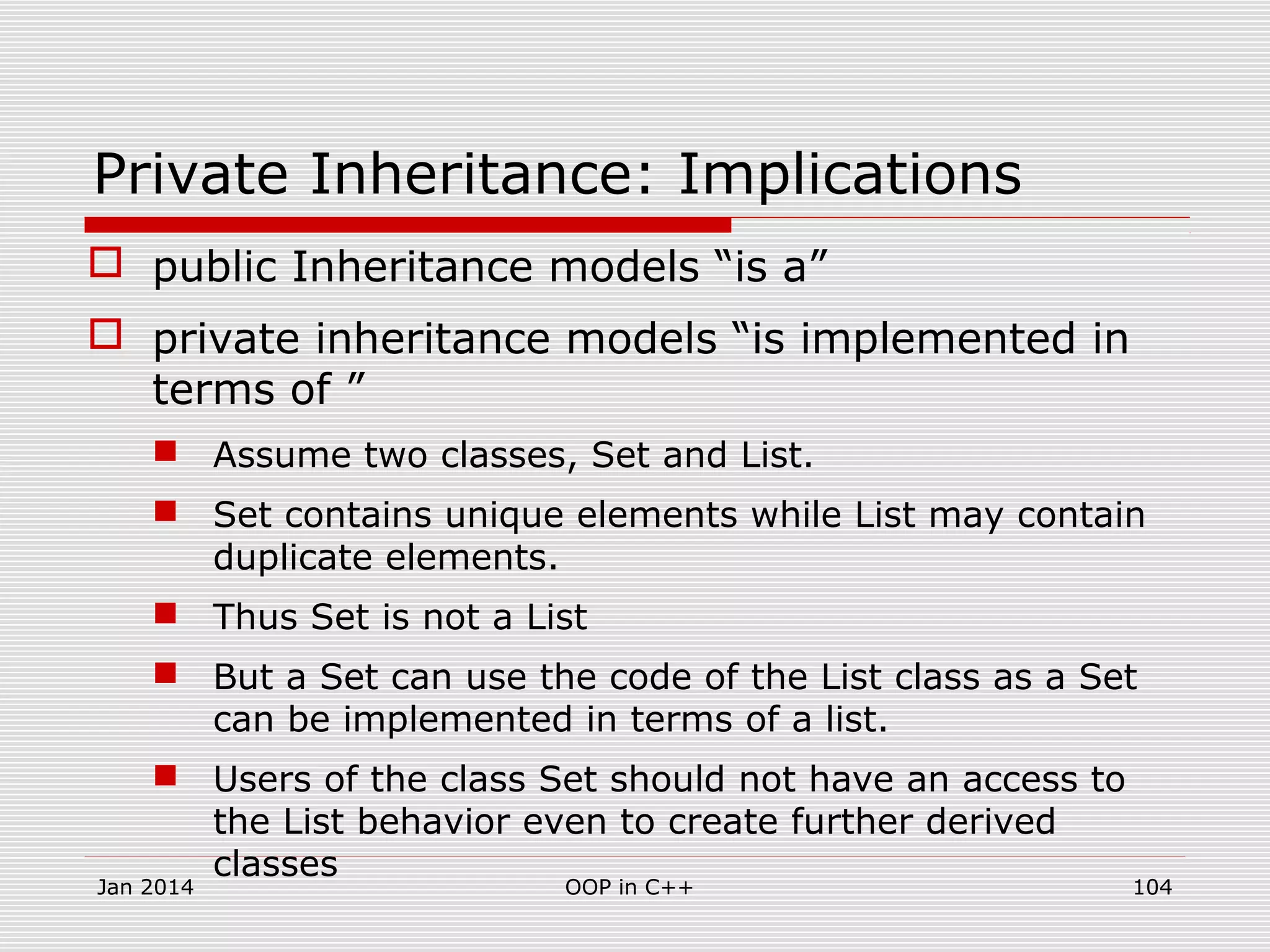
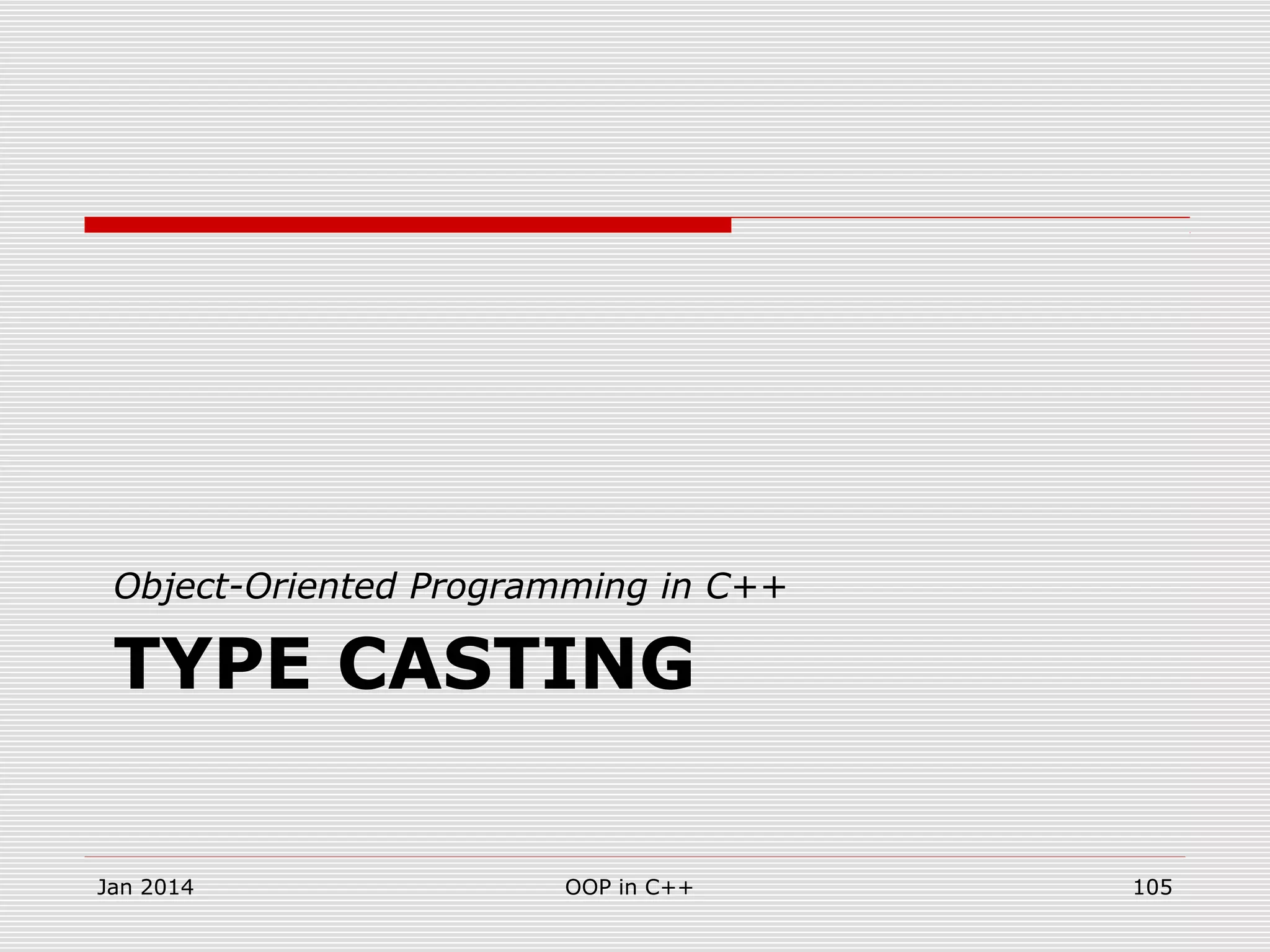
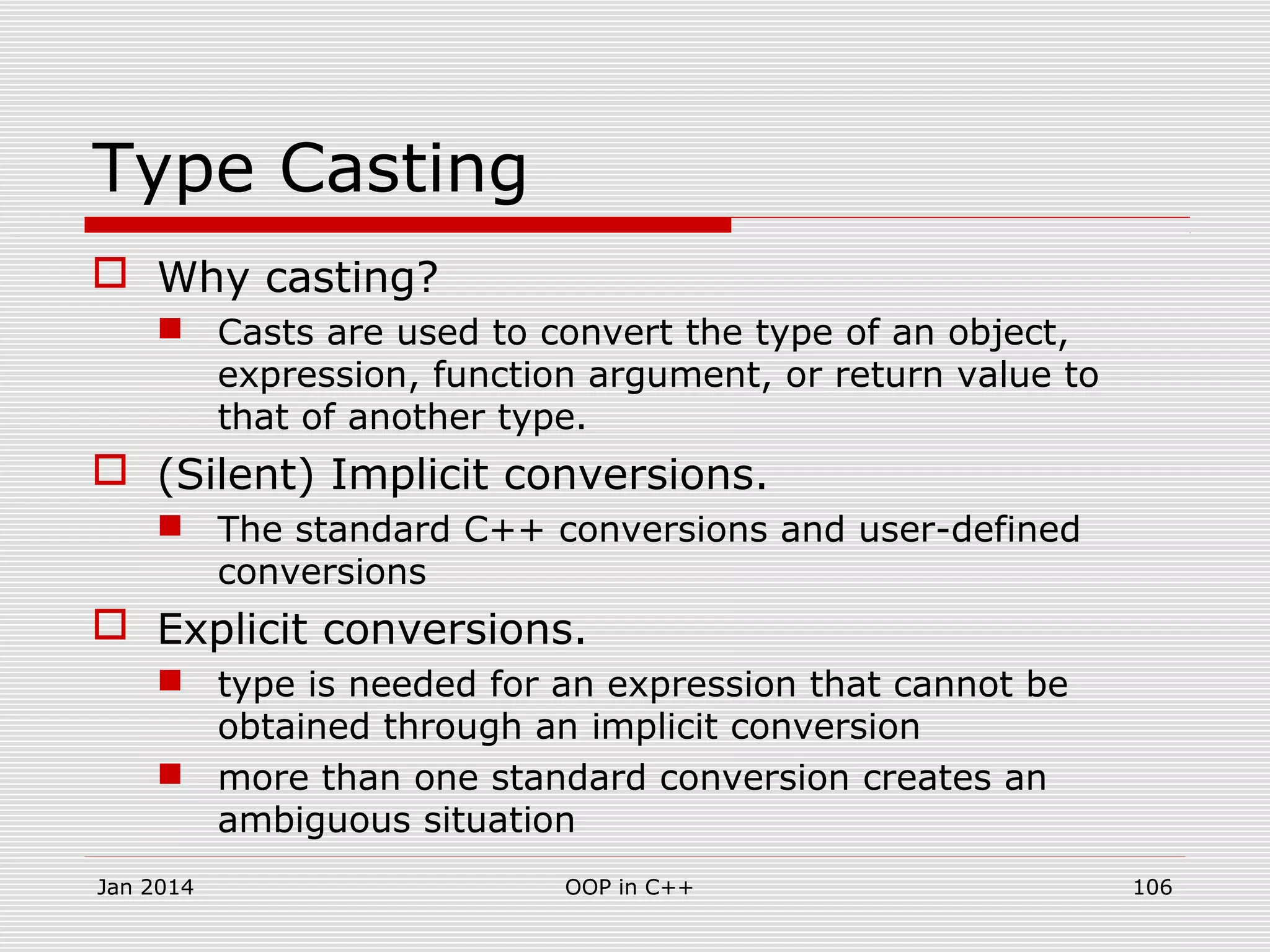
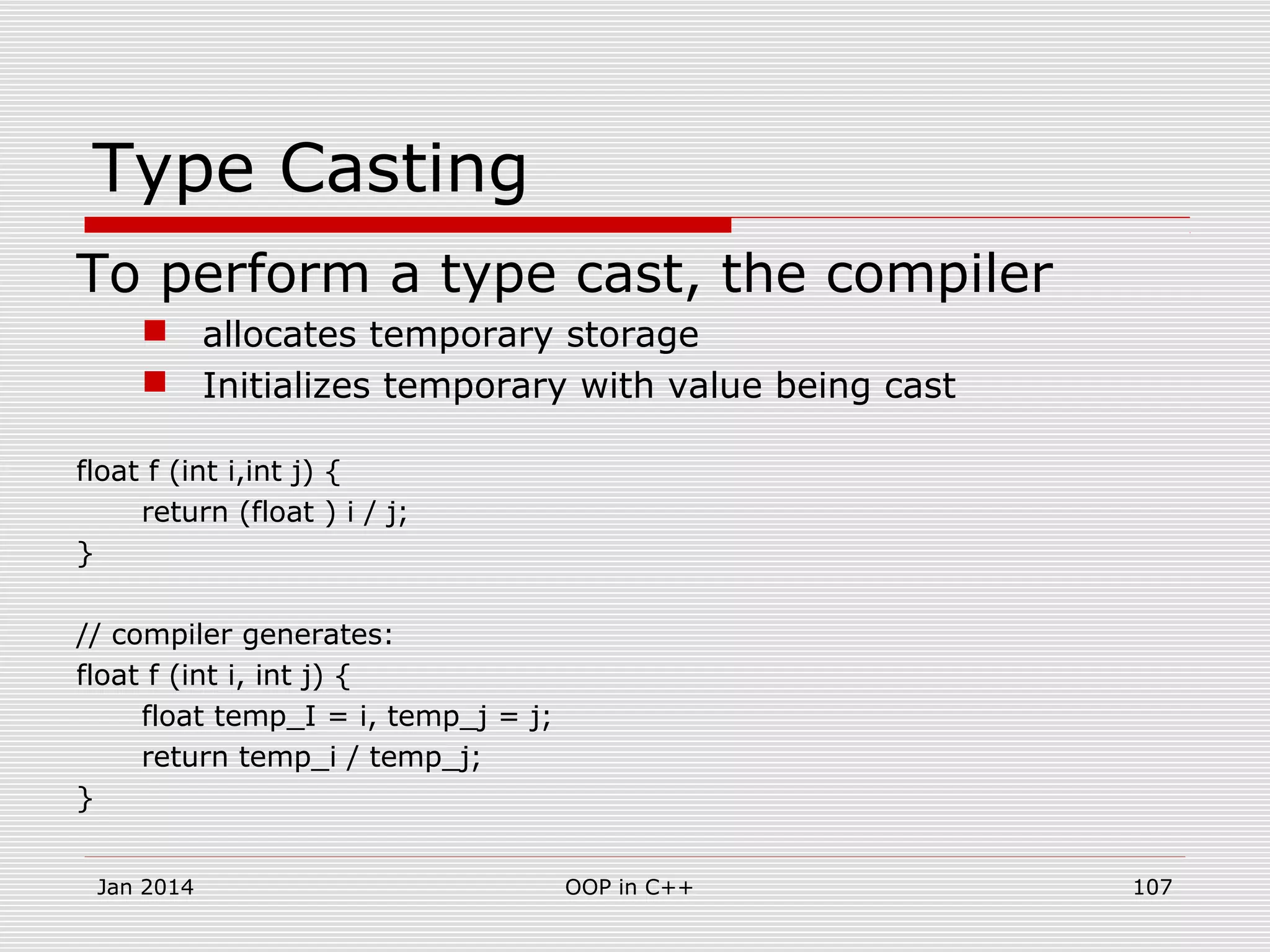

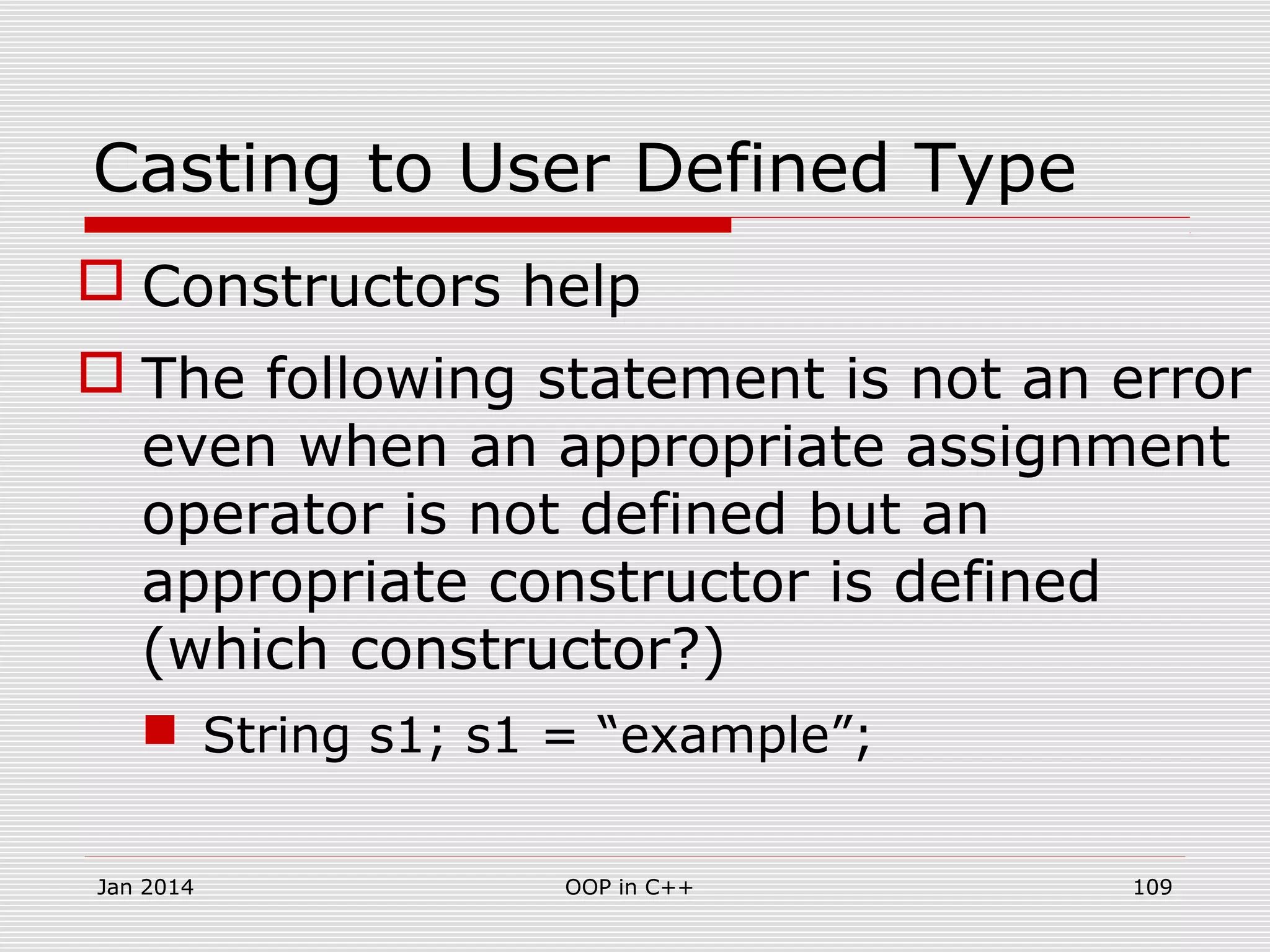
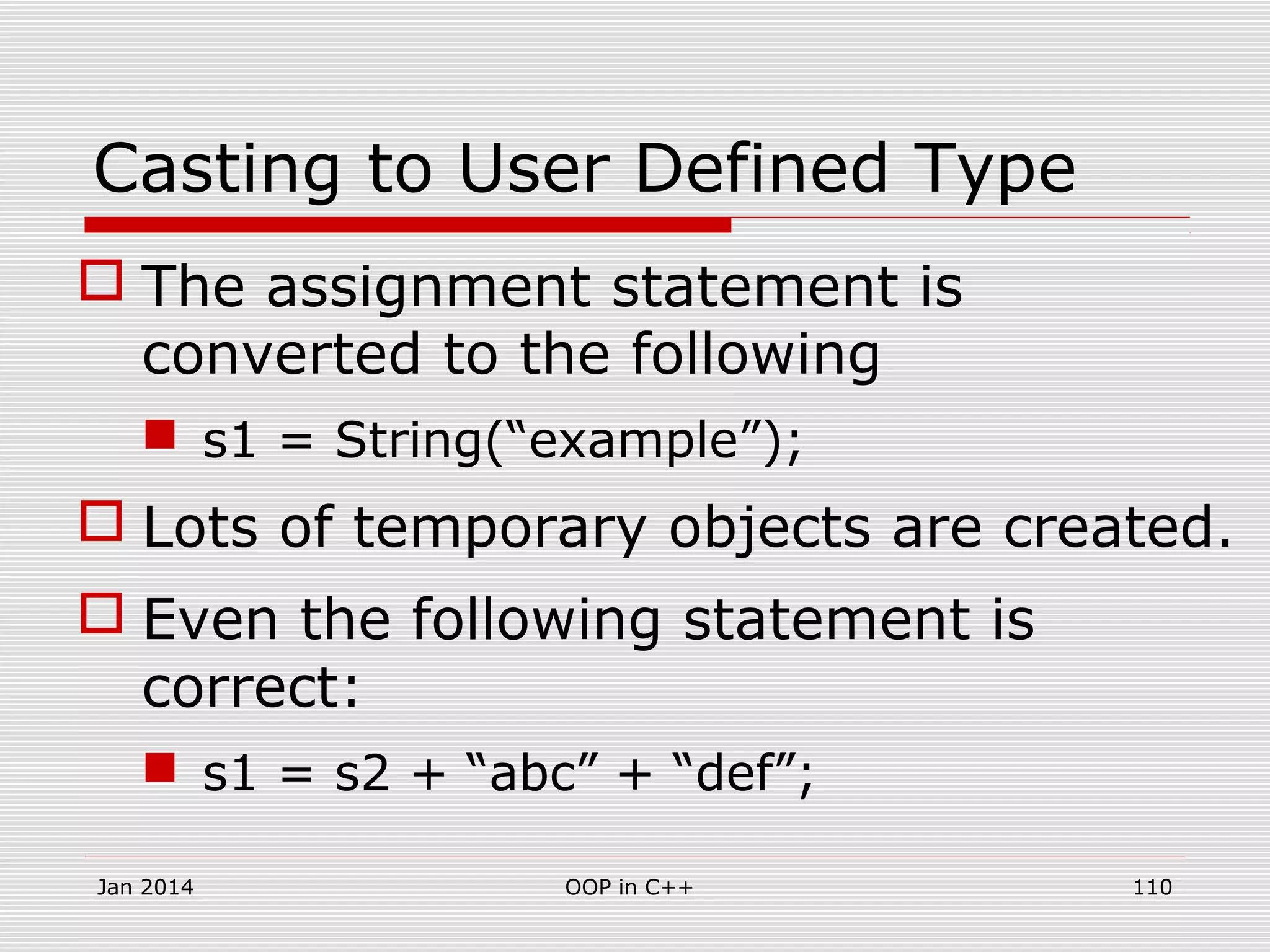
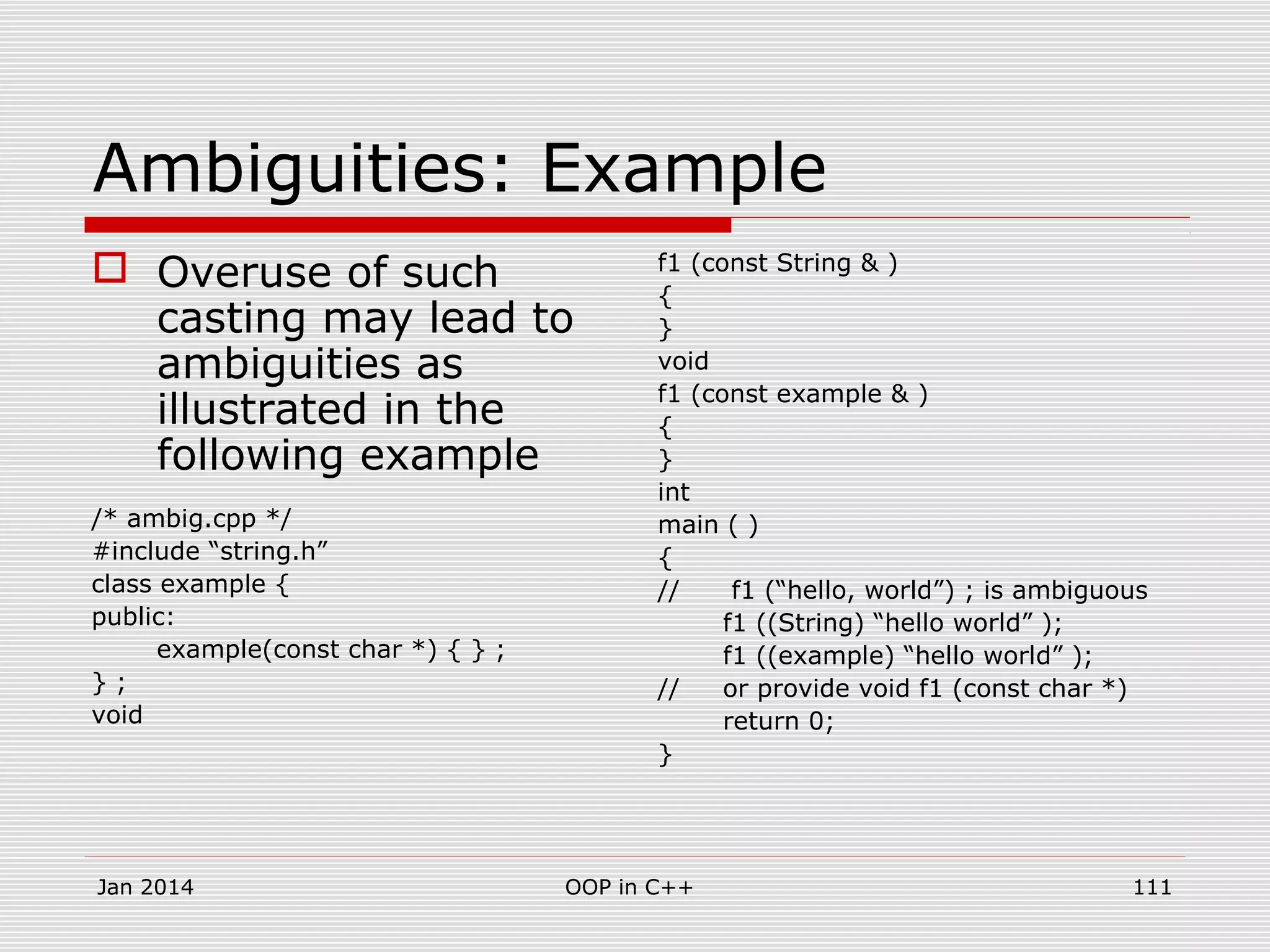
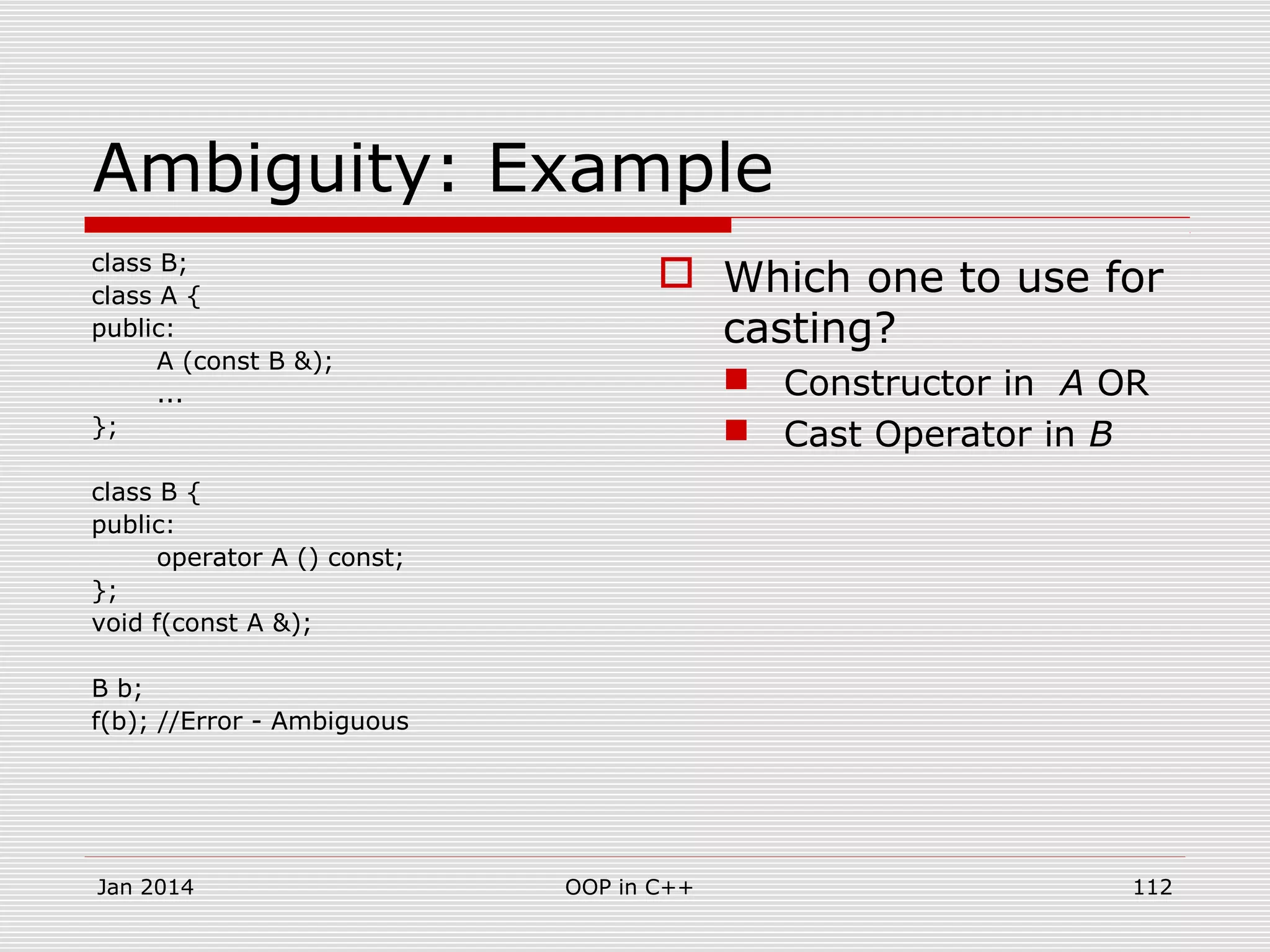
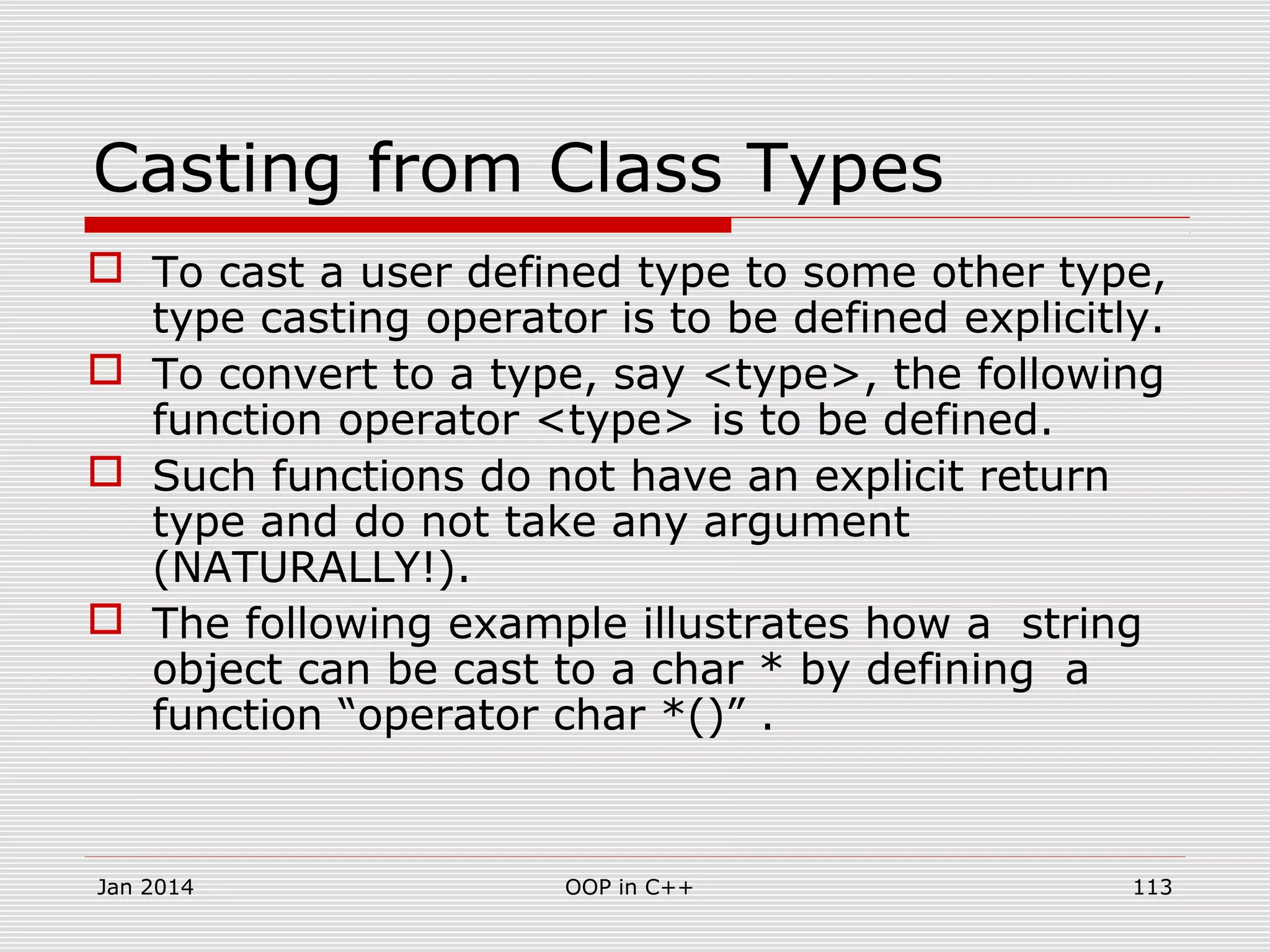
![Example of user defined cast
const int max_string_length = 128;
class String {
public:
String ( ) :
String (const String & ) ;
String (const char *);
~String ( ) ;
String & operator = (const String & )
;
operator const char * ( ) const ;
int length ( ) const ;
int read ( ) ;
void print ( ) const ;
.
.
private:
char text [max_string_length+1]
};
void operator-(const String &, const
String &);
int main ( ) {
int fd;
String filename = “tmp/test”;
// cast filename to type const char *
fd = open (filename, O_WRONLY |
O_CREAT, 0666);
write (fd, “test”, 4);
close (fd);
// not legal, since we can cast only
to const char *
// strcpy (filename, “zbc”);
String name = “Zaphod
Beeblebrox”;
name – “Beeblebrox”; // is now
ambiguous.
return 0 ;
}
114OOP in C++Jan 2014](https://image.slidesharecdn.com/se-lecture02-30oopinc-140803025901-phpapp02/75/OOP-in-C-114-2048.jpg)
![Avoiding Ambiguities
const int max_string_length = 128;
class String {
public:
String ( ) ;
String (const String & ) ;
String (const char *);
~ String ( ) ;
String & operator = (const String
& );
const char *as_char_pointer ( )
const;
int length ( ) const;
int read ( );
void print ( ) const;
...
private:
char text [max_string_length+1];
};
void operator-(const String &, const
String &);
int main ( ) {
int fd;
String filename = “/tmp/test”;
// convert filename to type char *
fd = open
(filename.as_char_pointer ( ),
O_WRONLY | O_CREAT, 0666);
write (fd, “test”, 4);
close (fd);
// not legal
// strcpy (filename.as_char_pointer (
), “zbc”);
String name = “Zaphod
Beeblebrox”;
name – “Beeblebrox”; // is no longer
ambiguous
return 0;
}
115OOP in C++Jan 2014](https://image.slidesharecdn.com/se-lecture02-30oopinc-140803025901-phpapp02/75/OOP-in-C-115-2048.jpg)
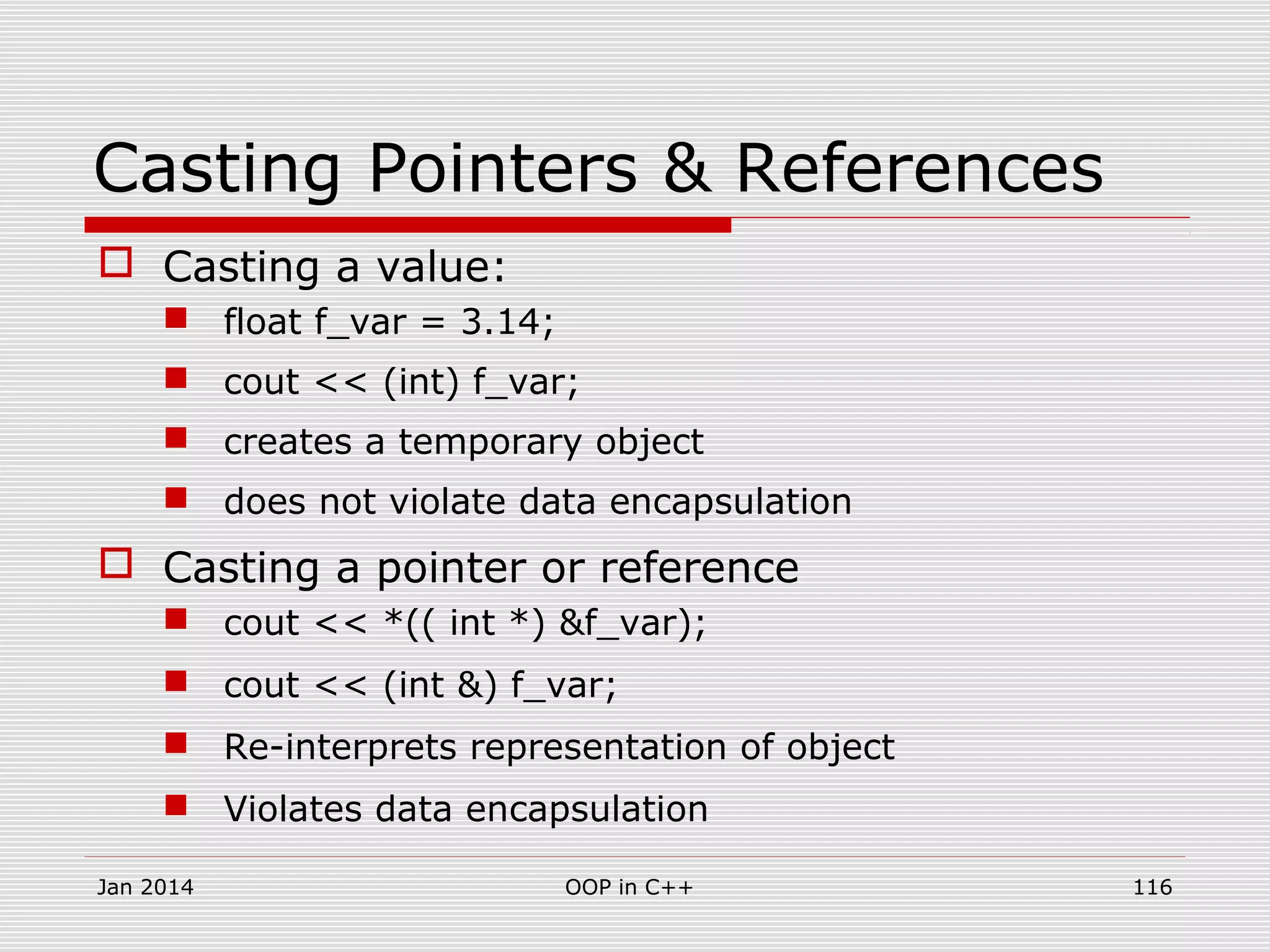
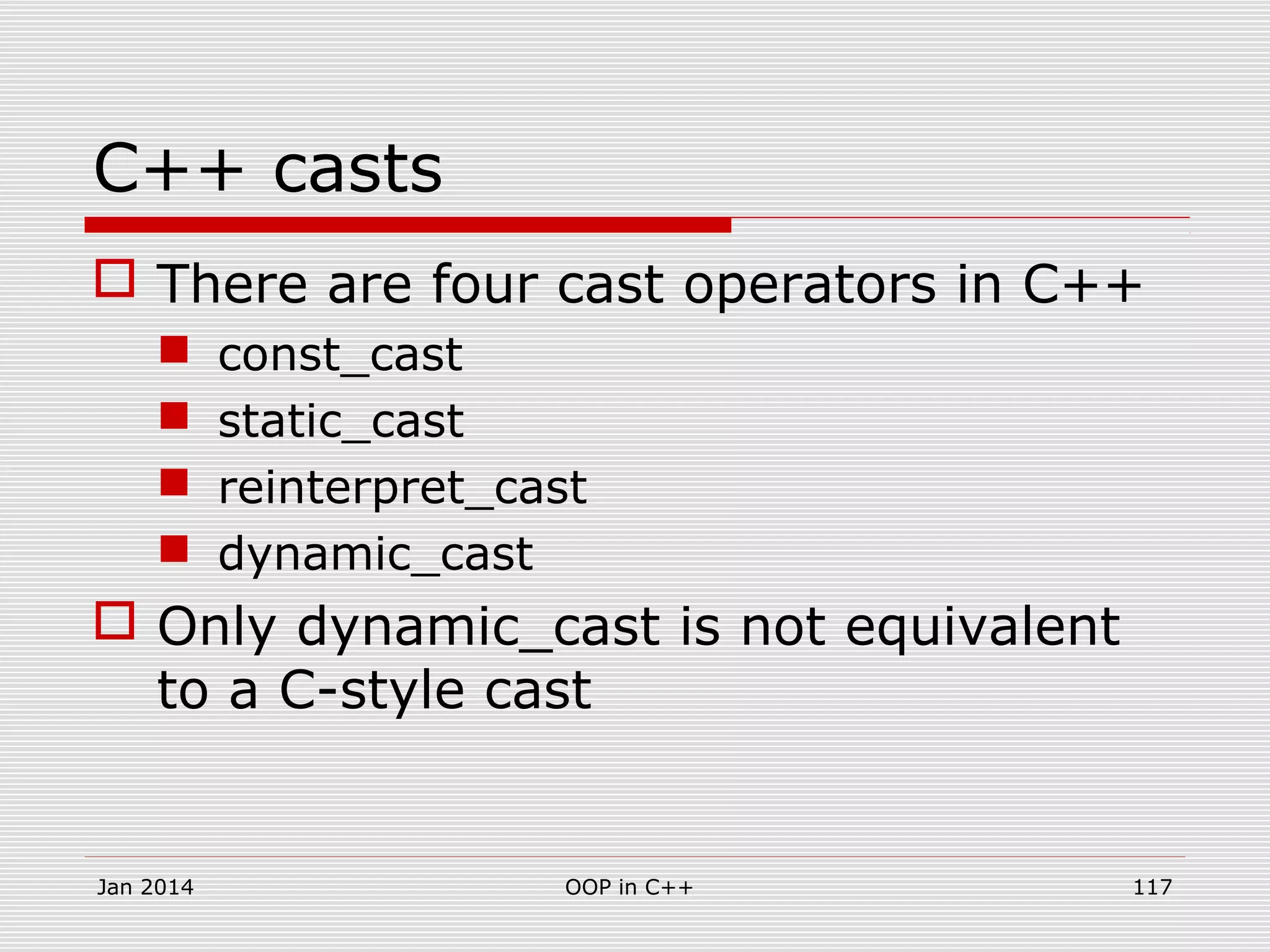
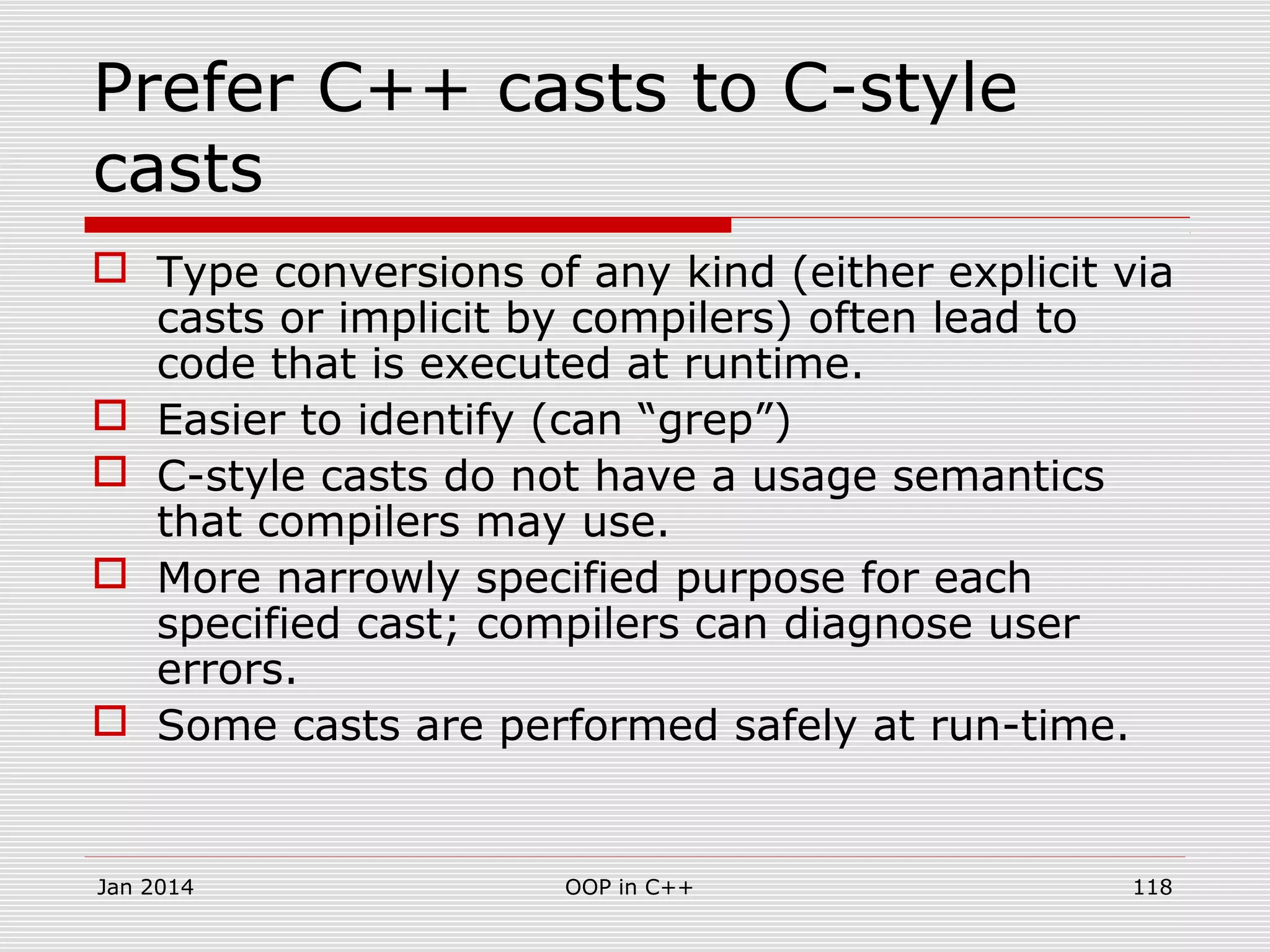
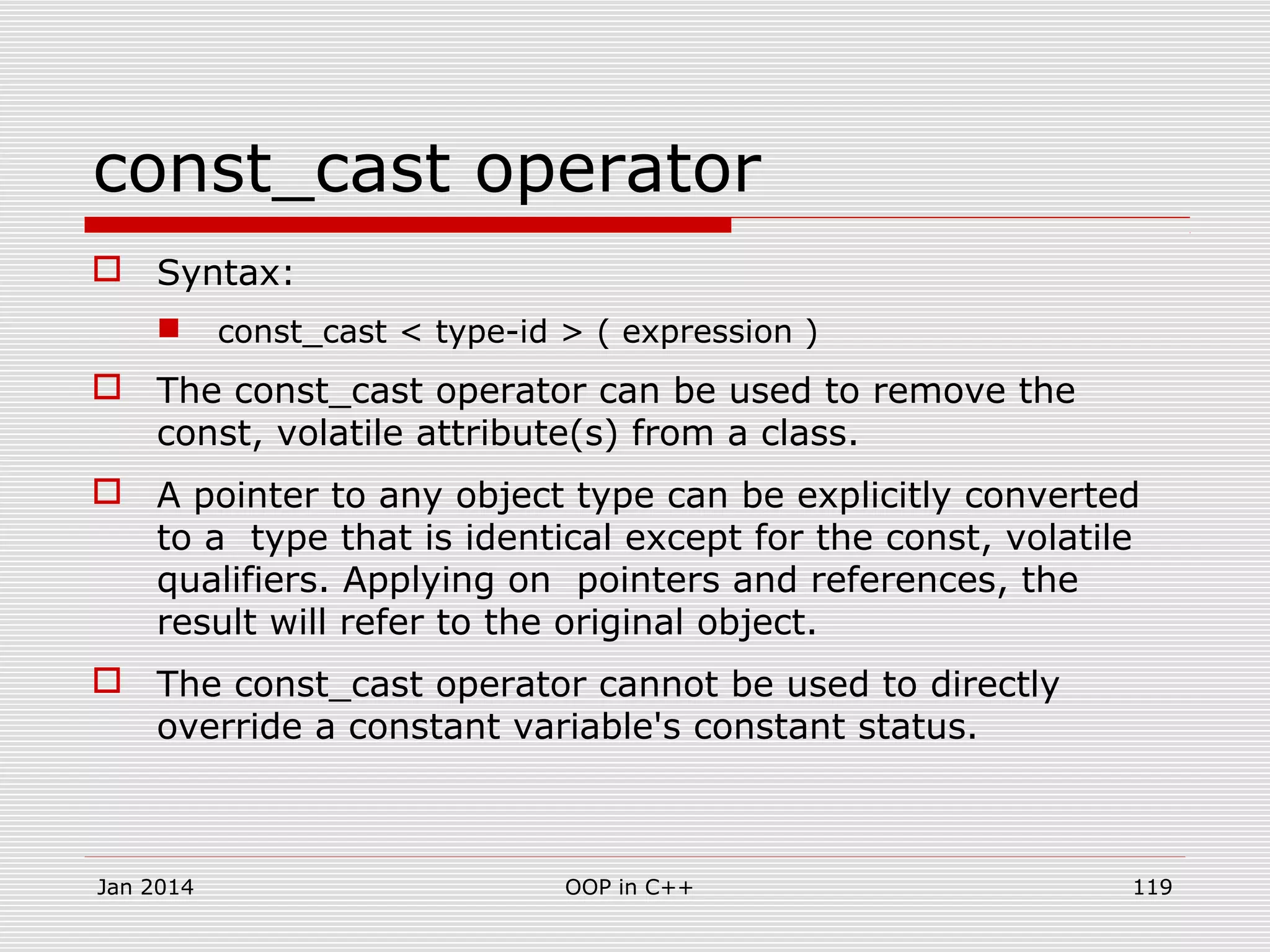
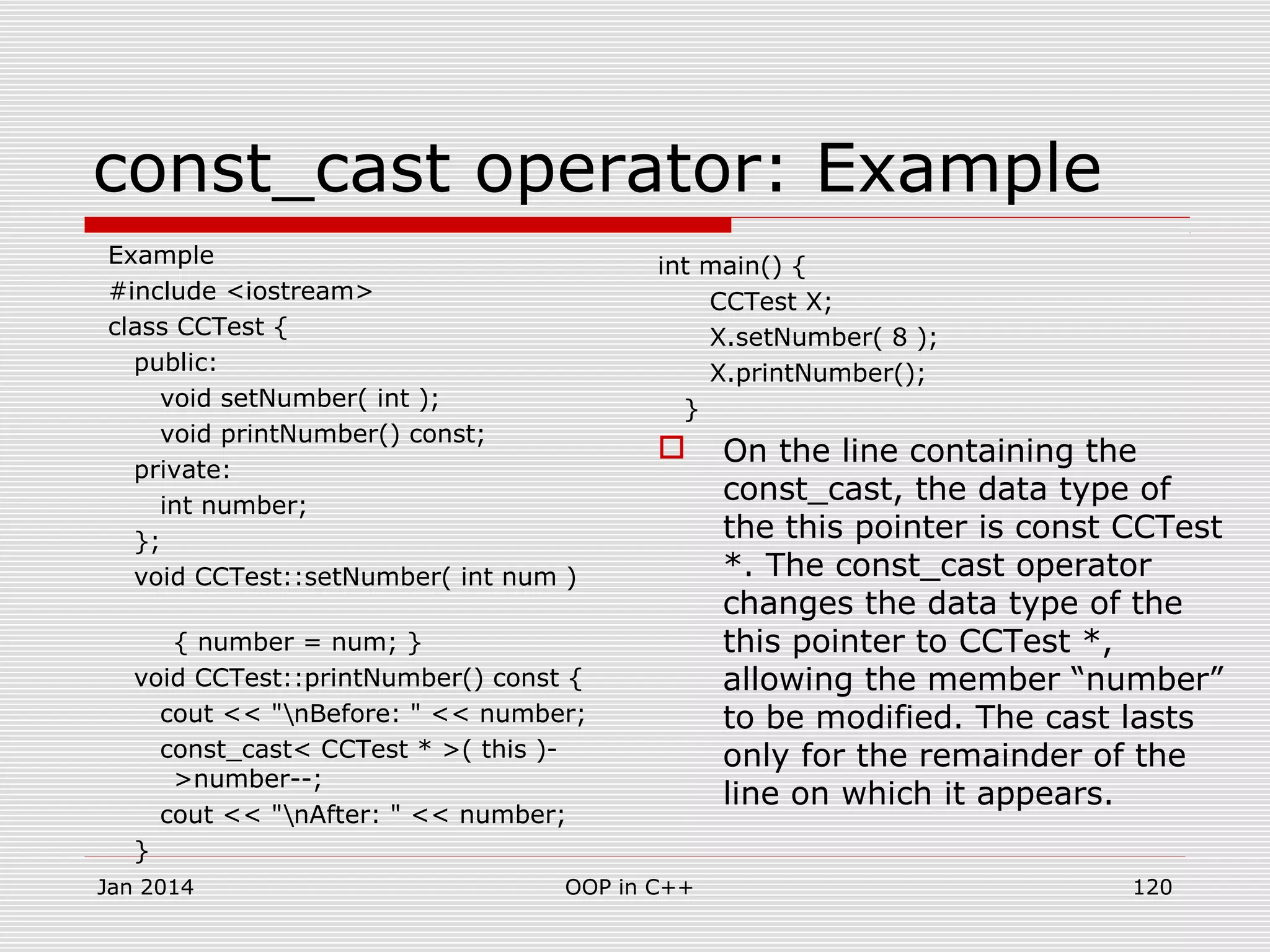
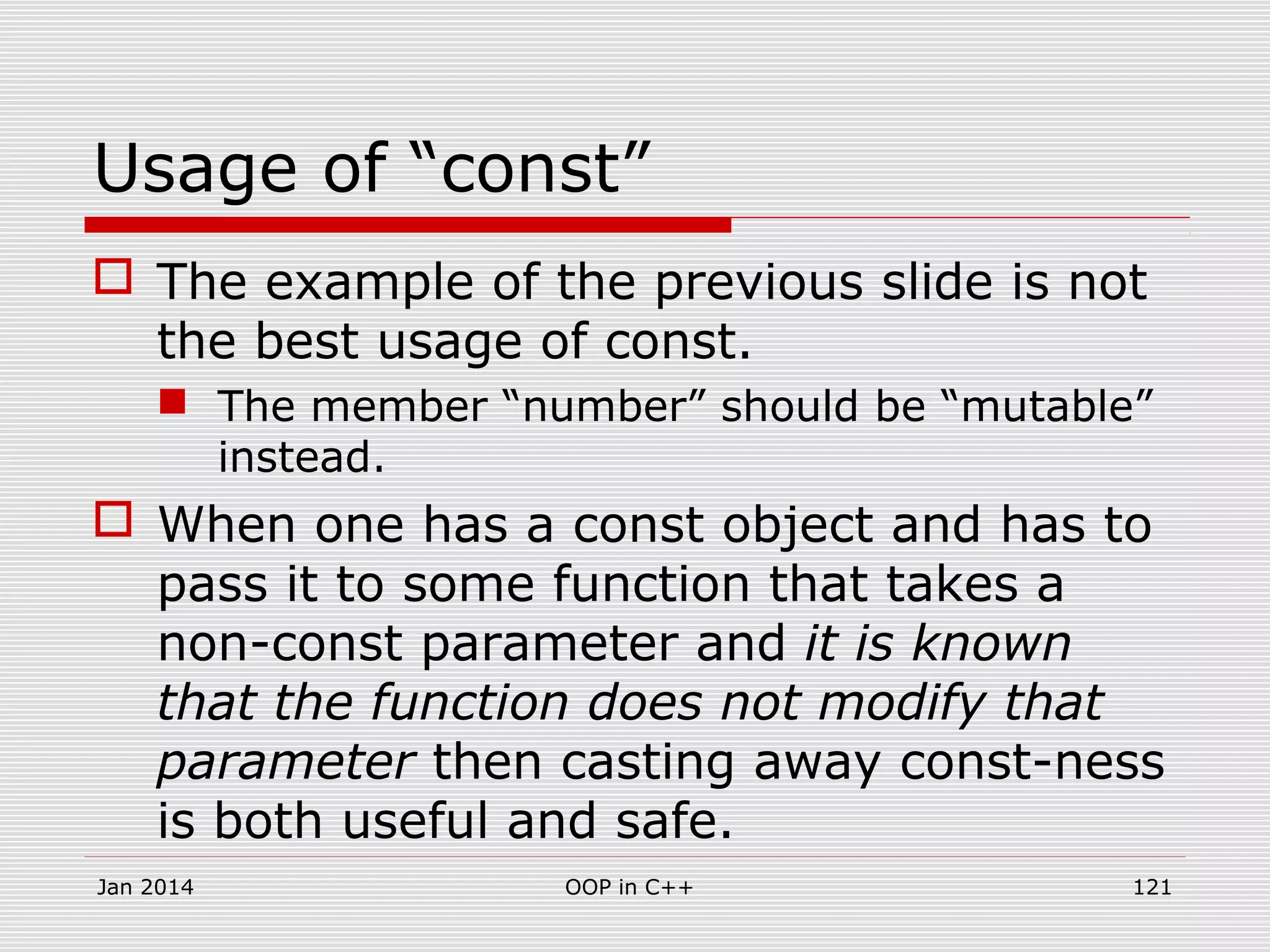
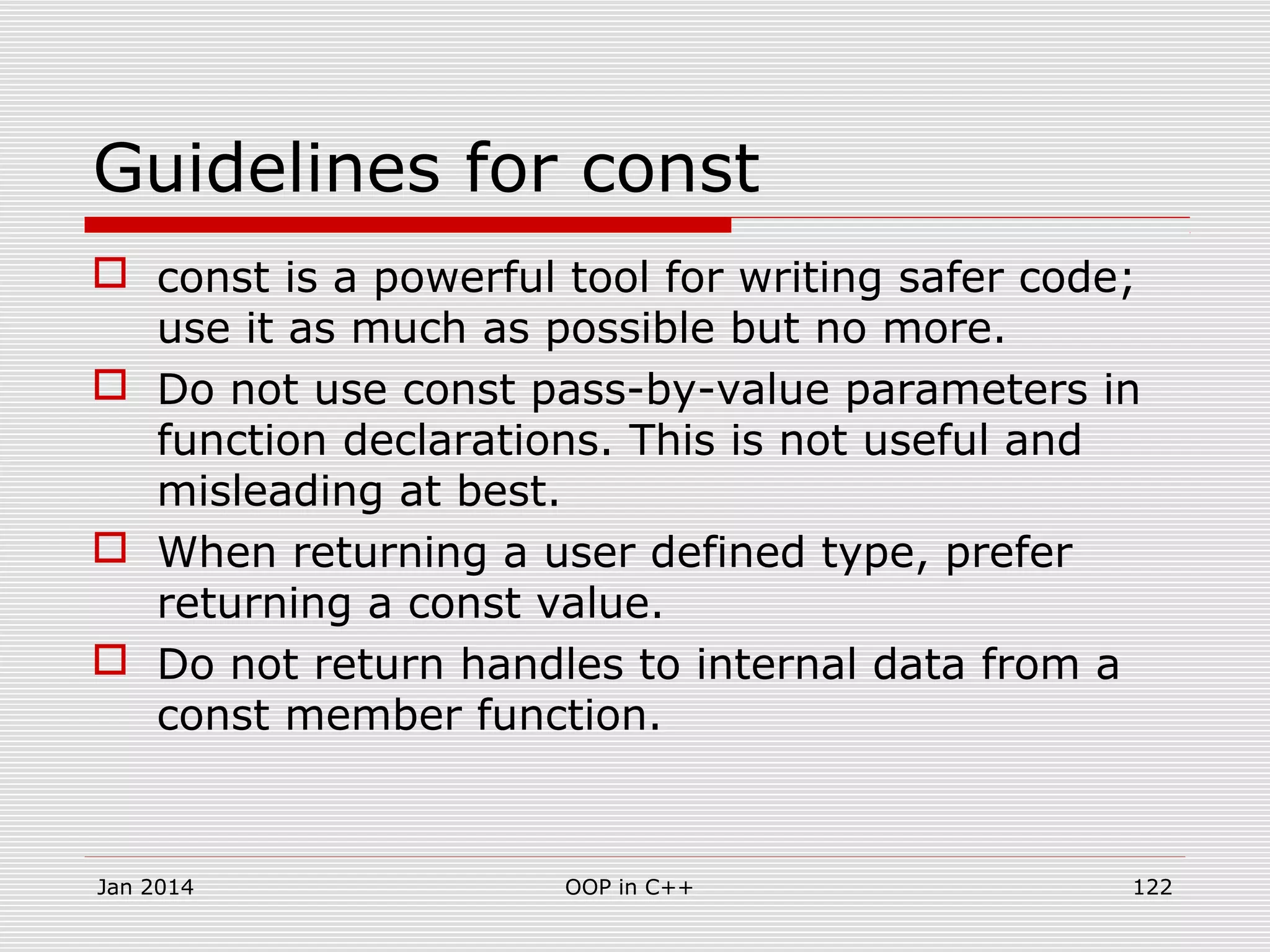
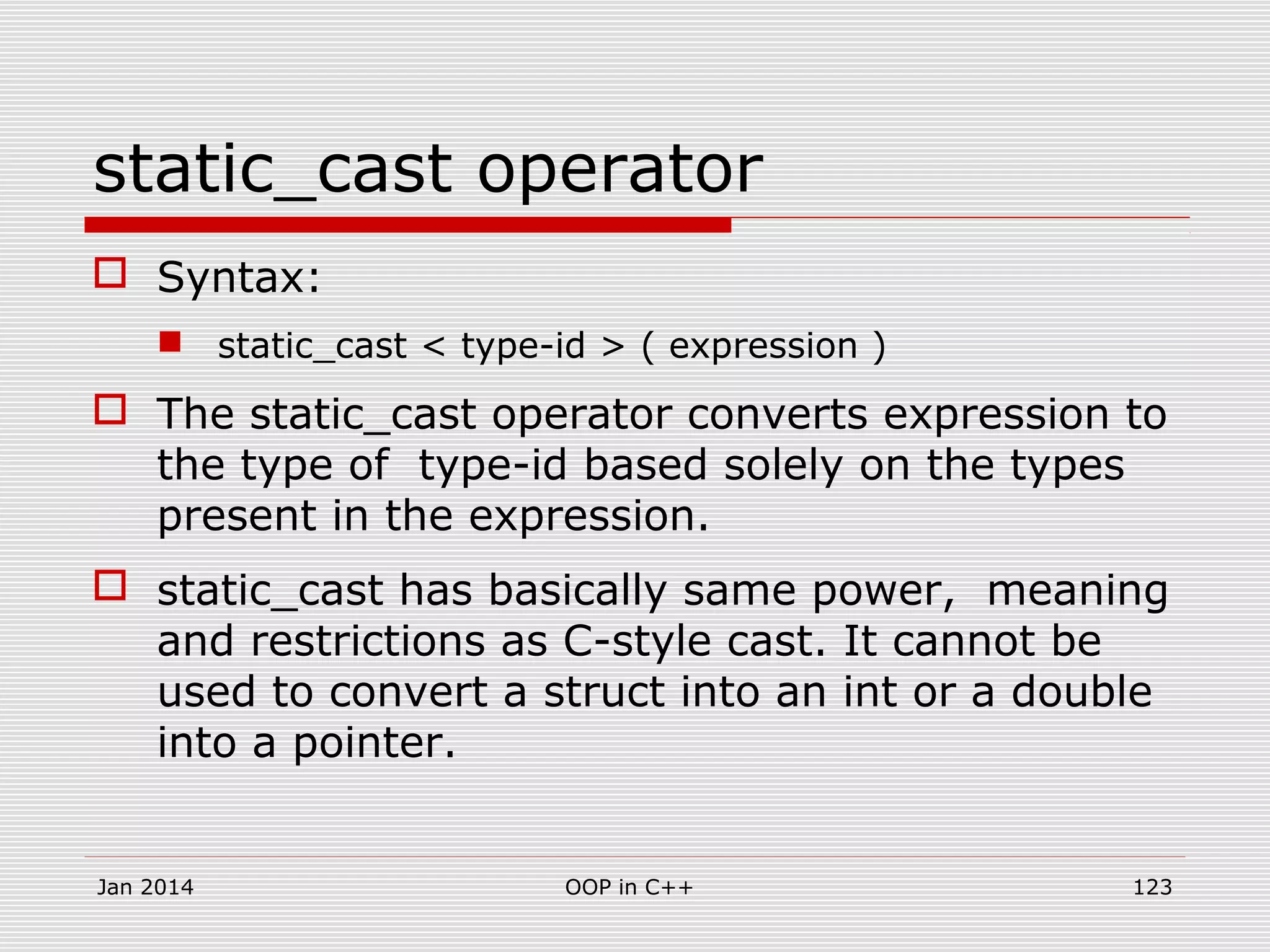
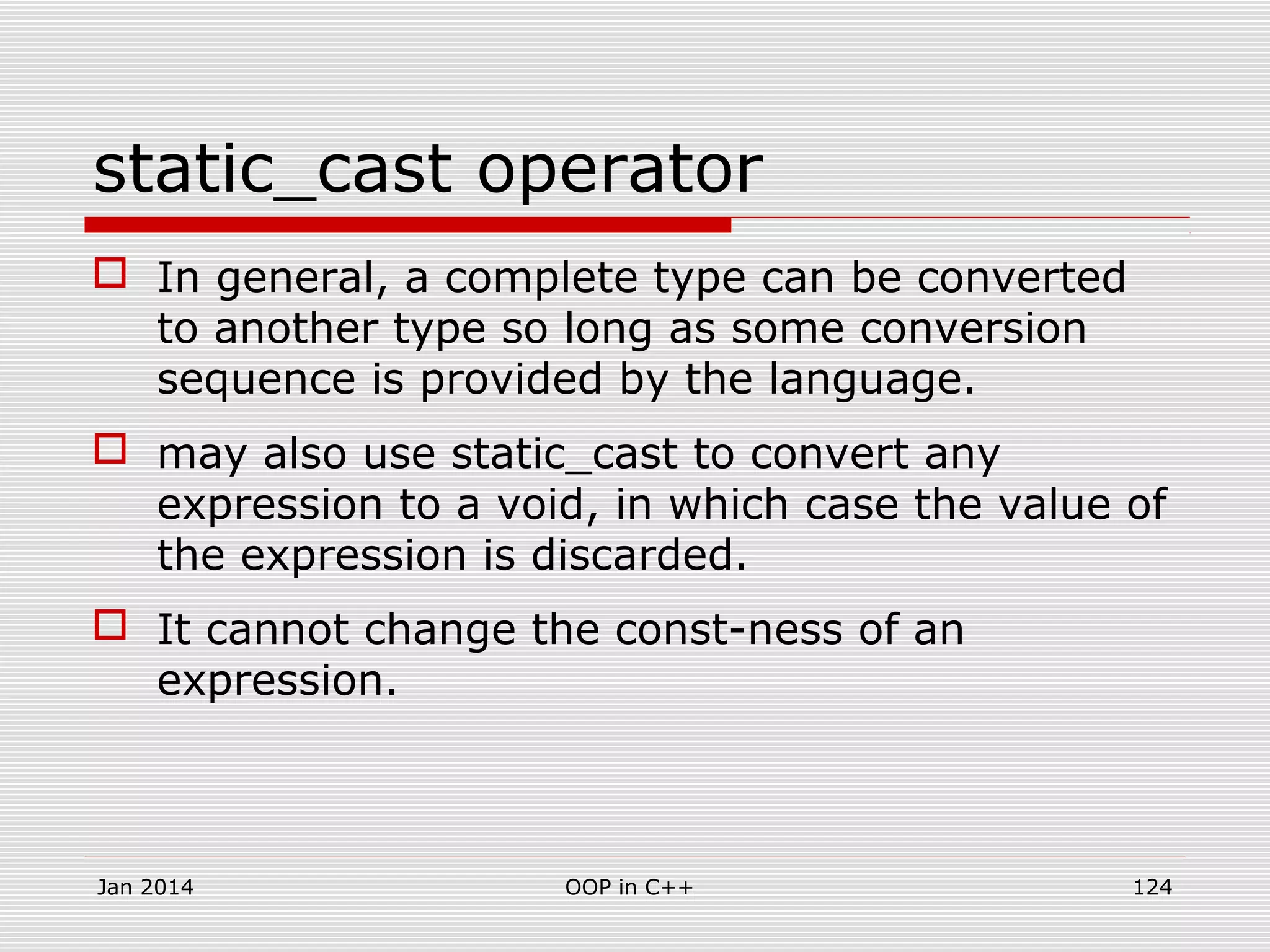
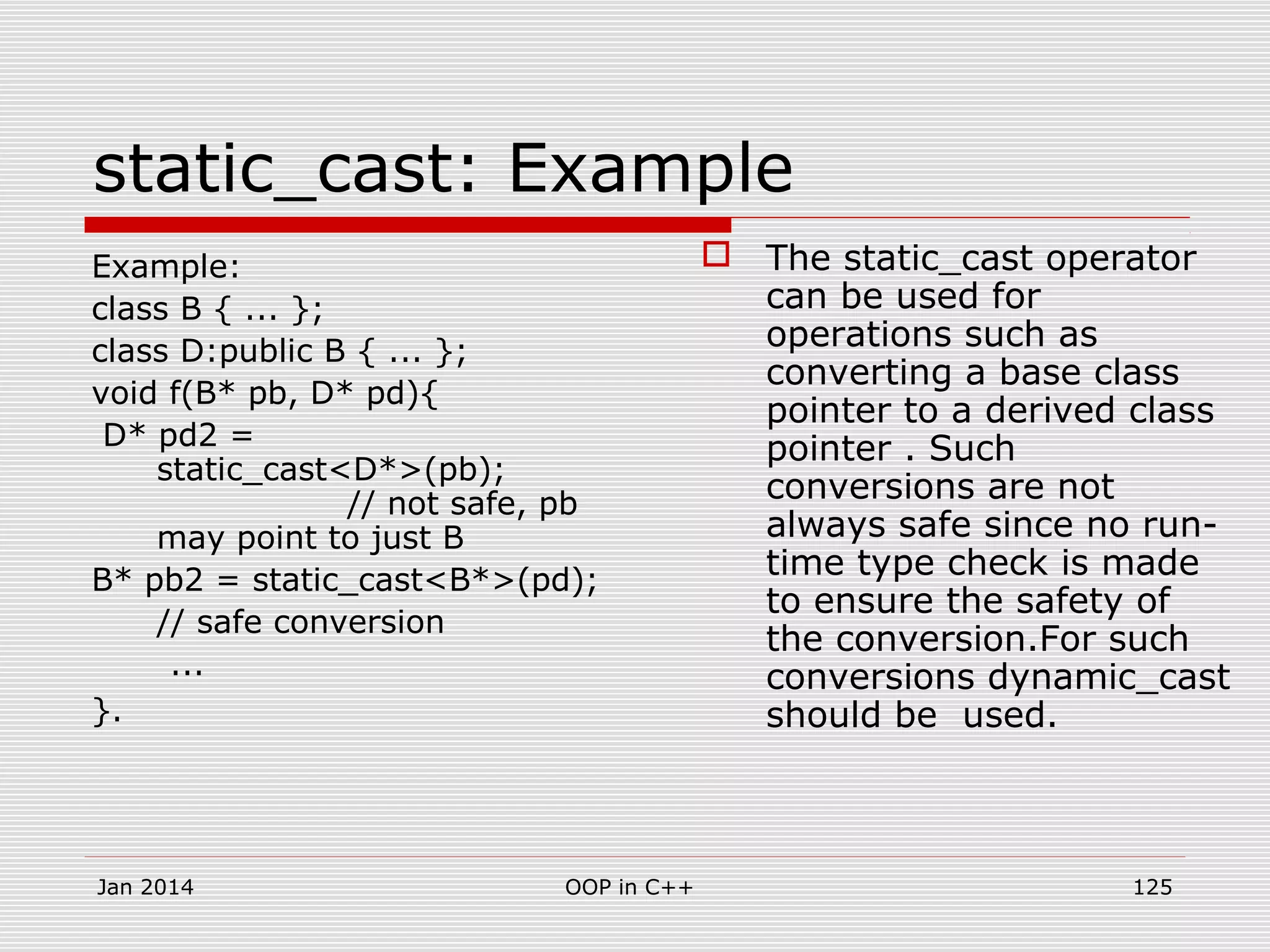
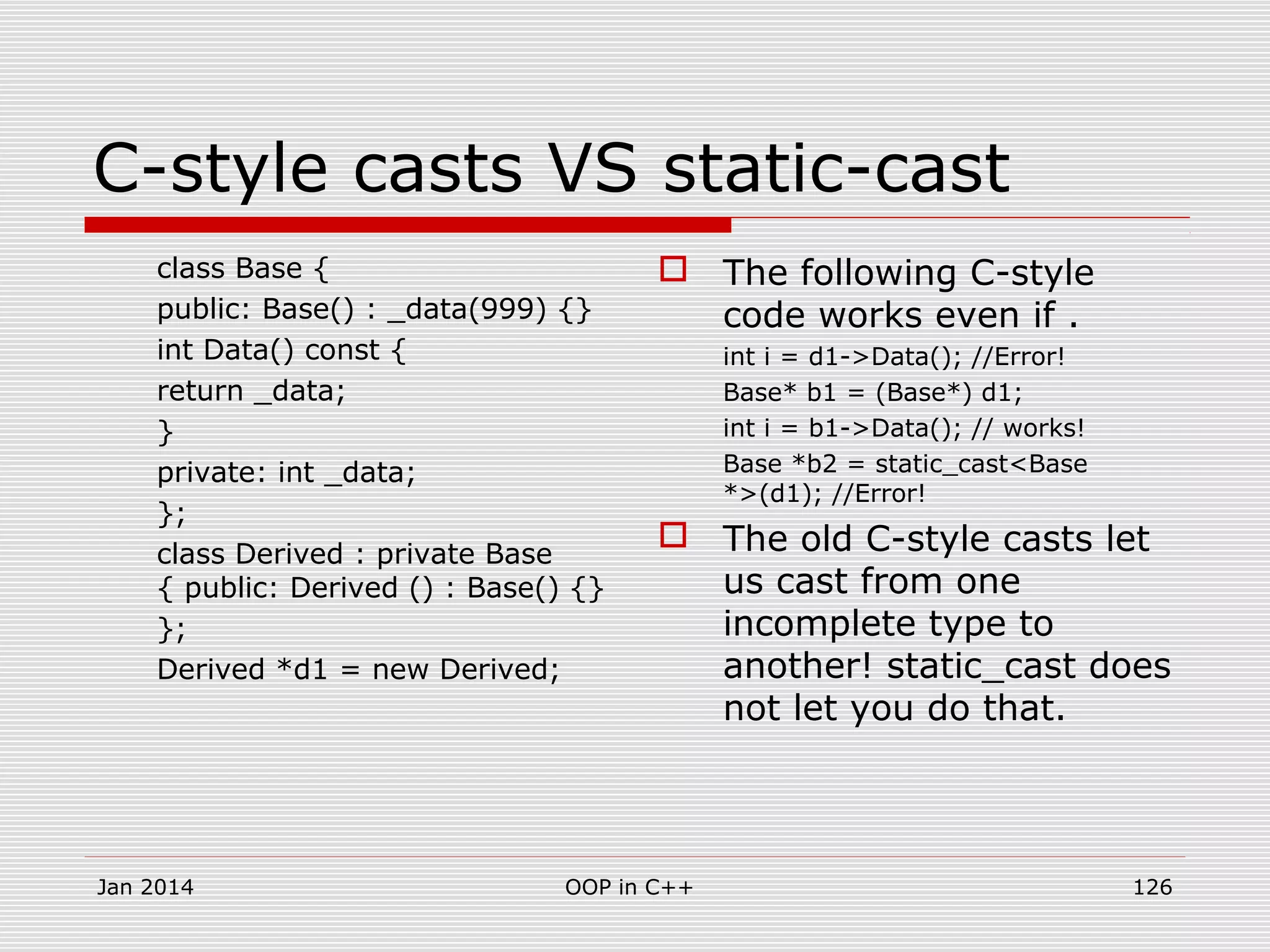
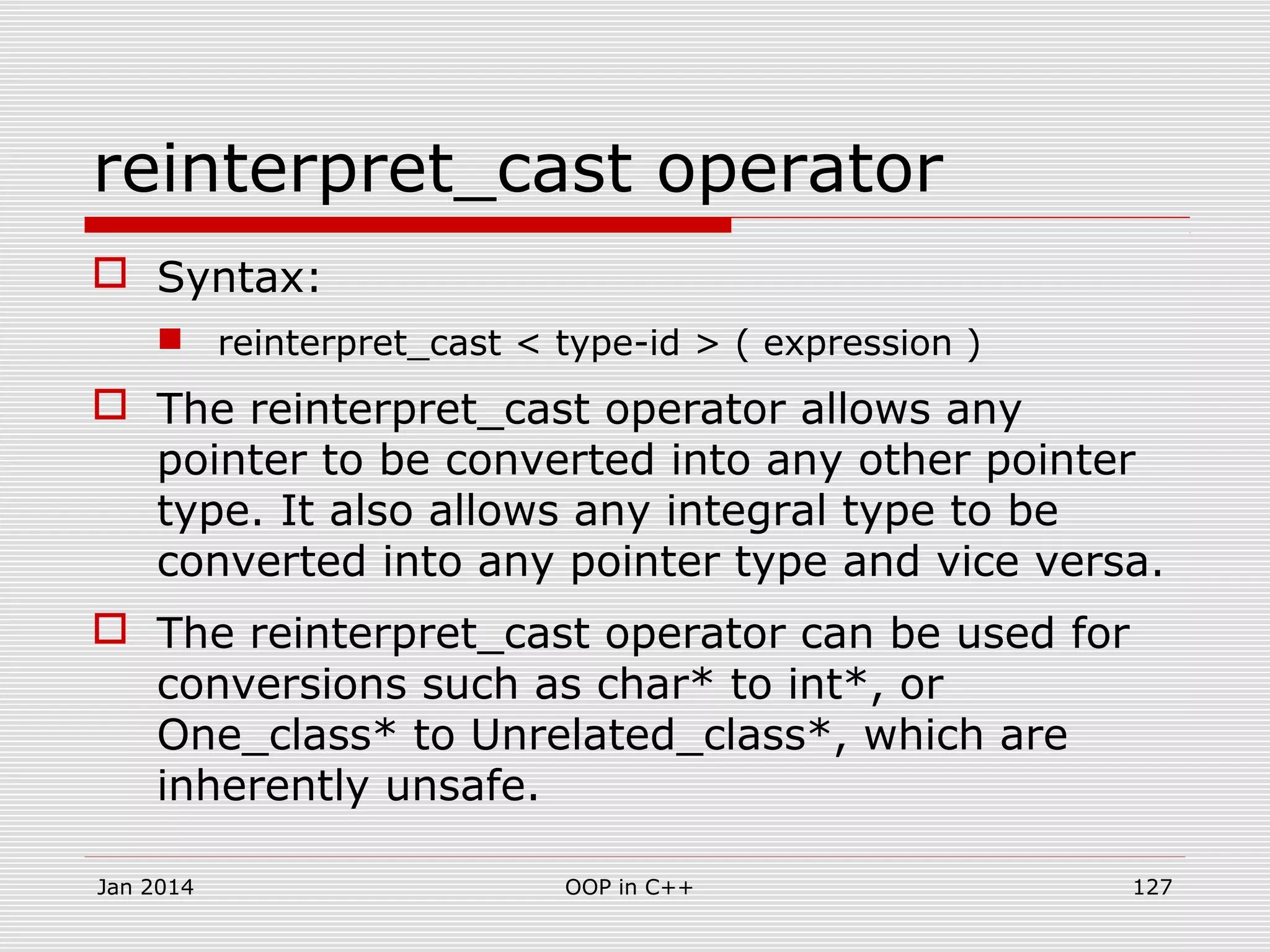
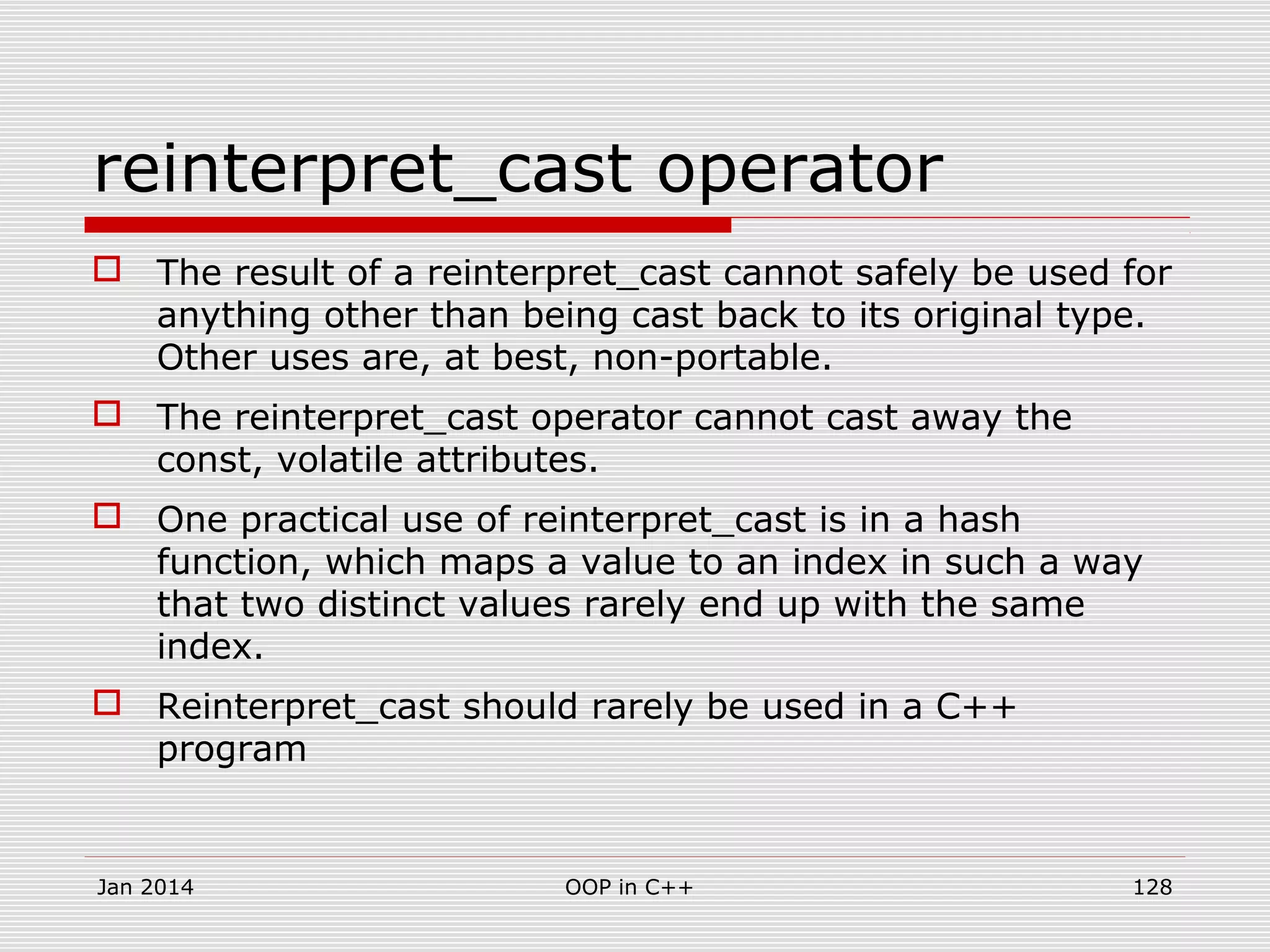
![reinterpret_cast: Example
Example
#include <iostream>
unsigned short Hash( void *p ){
// Returns a hash code based on an
address
unsigned int val =
reinterpret_cast<unsigned
int>( p );
return ( unsigned short )( val ^ (val
>> 16));
}
int main(){
int a[20];
for ( int i = 0; i < 20; i++ )
cout << Hash( a + i ) << endl;
}
The reinterpret_cast
allows the pointer to be
treated as an integral
type. The result is then
bit-shifted and XORed
with itself to produce a
unique index (unique to
a high degree of
probability). The index is
then truncated by a
standard C-style cast to
the return type of the
function.
Jan 2014 129OOP in C++](https://image.slidesharecdn.com/se-lecture02-30oopinc-140803025901-phpapp02/75/OOP-in-C-129-2048.jpg)
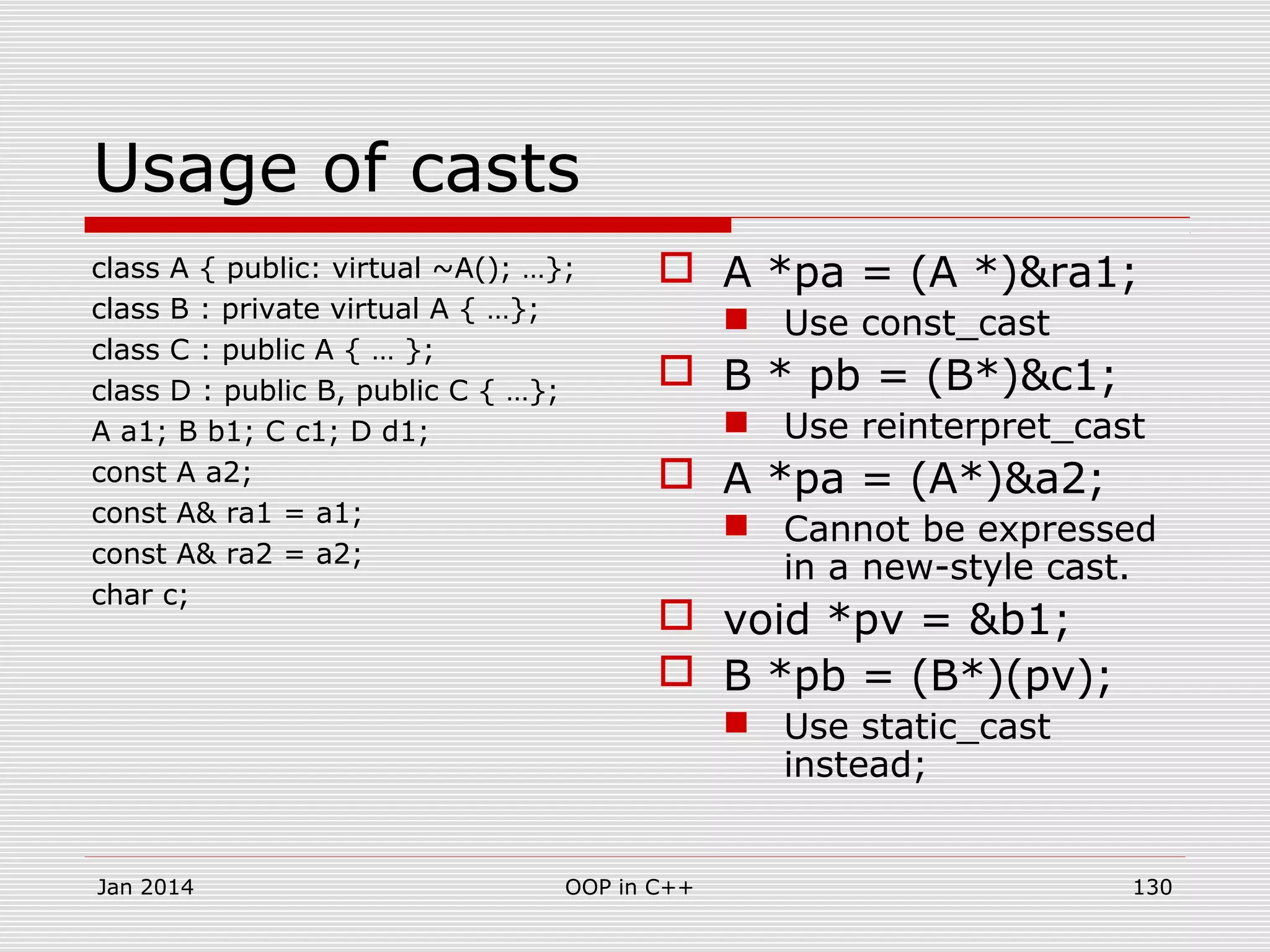

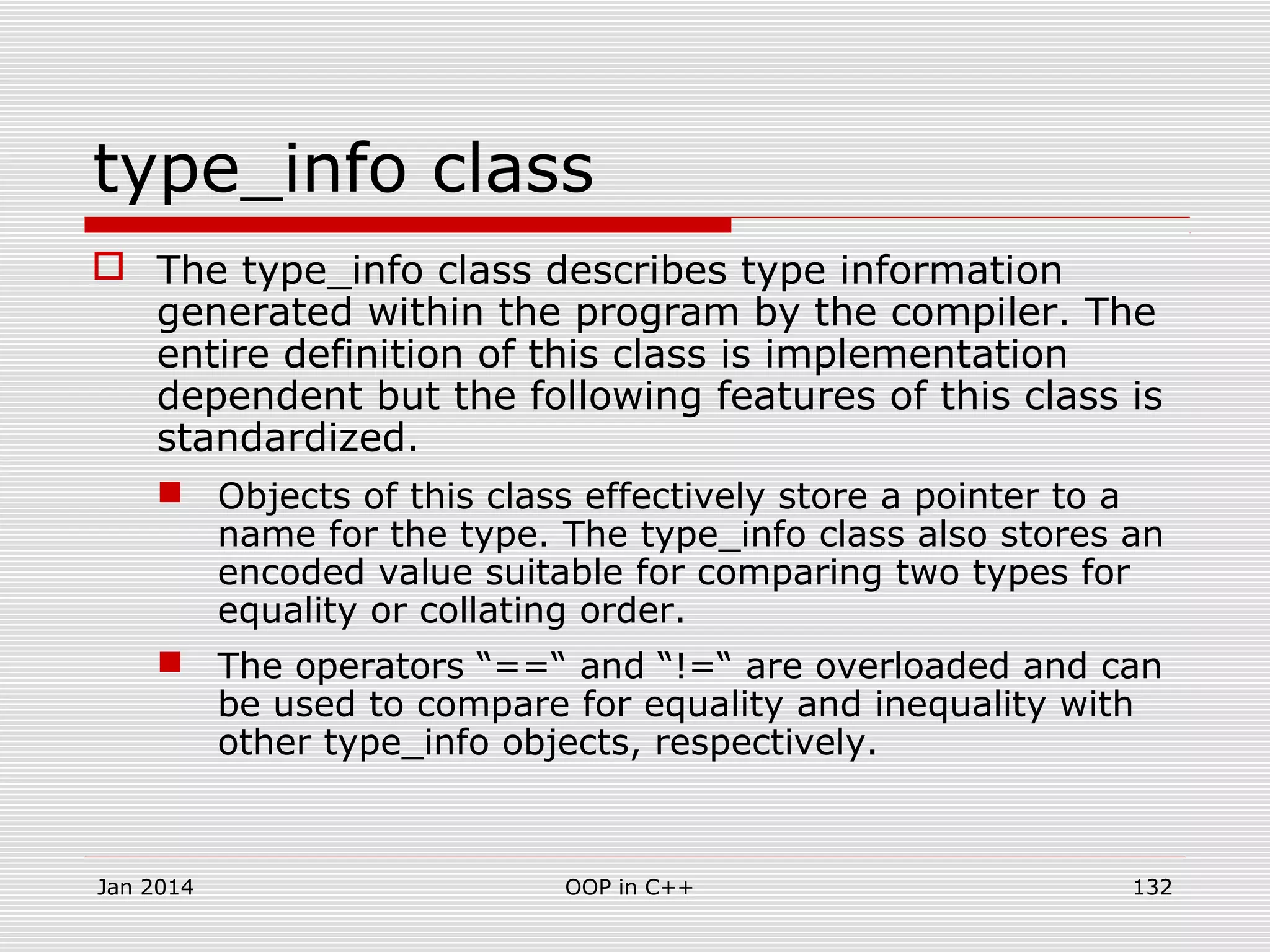
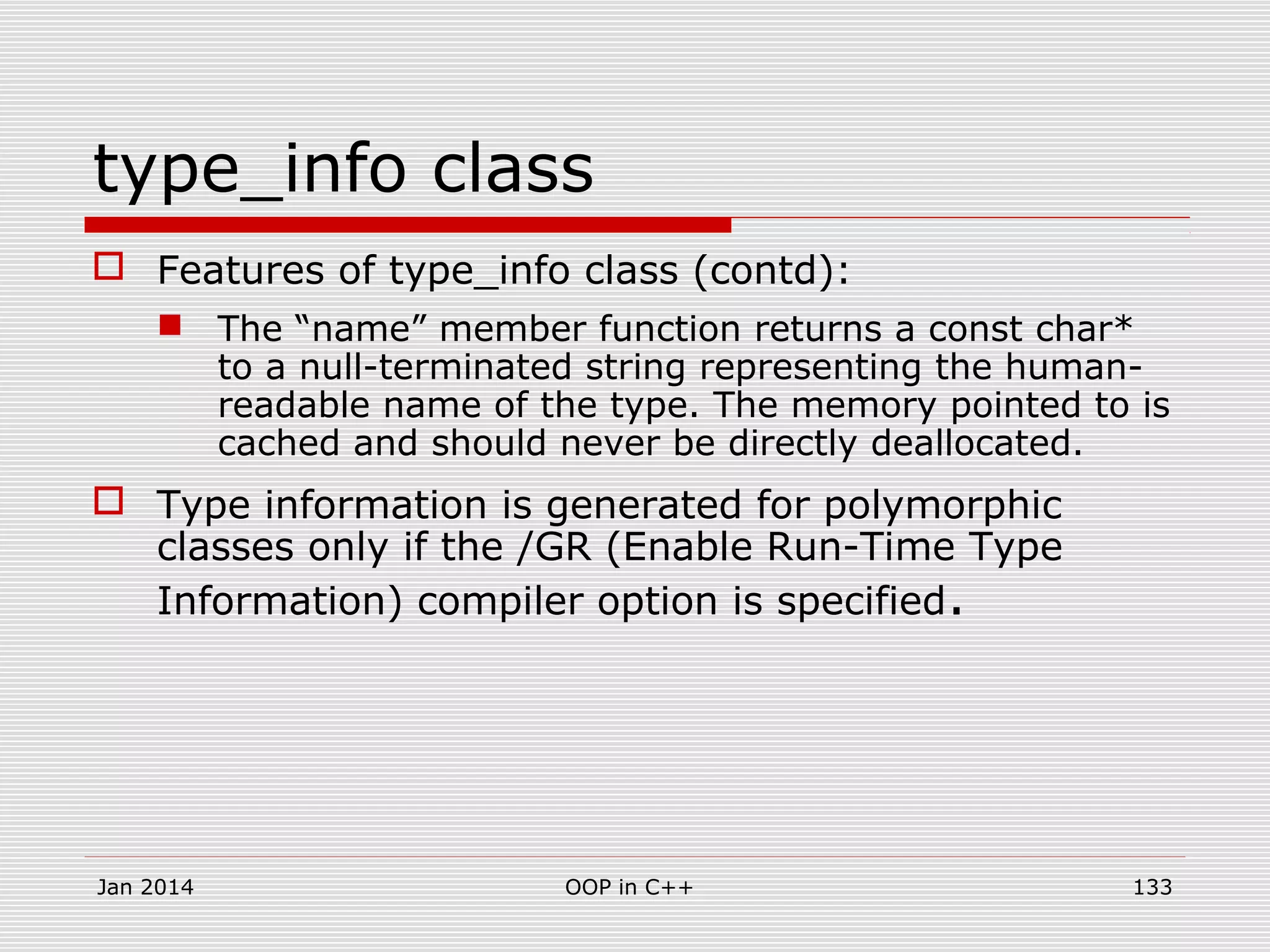
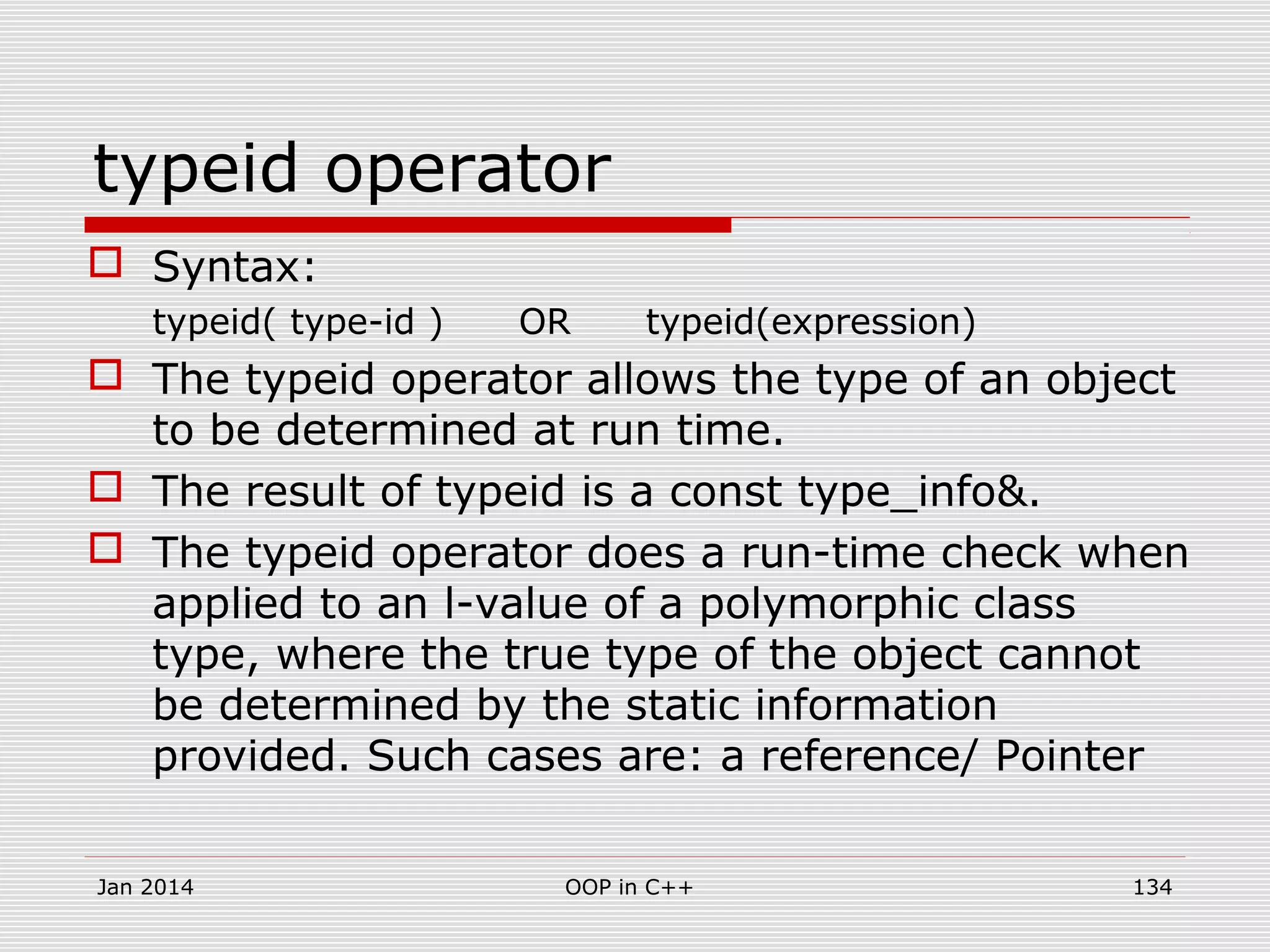
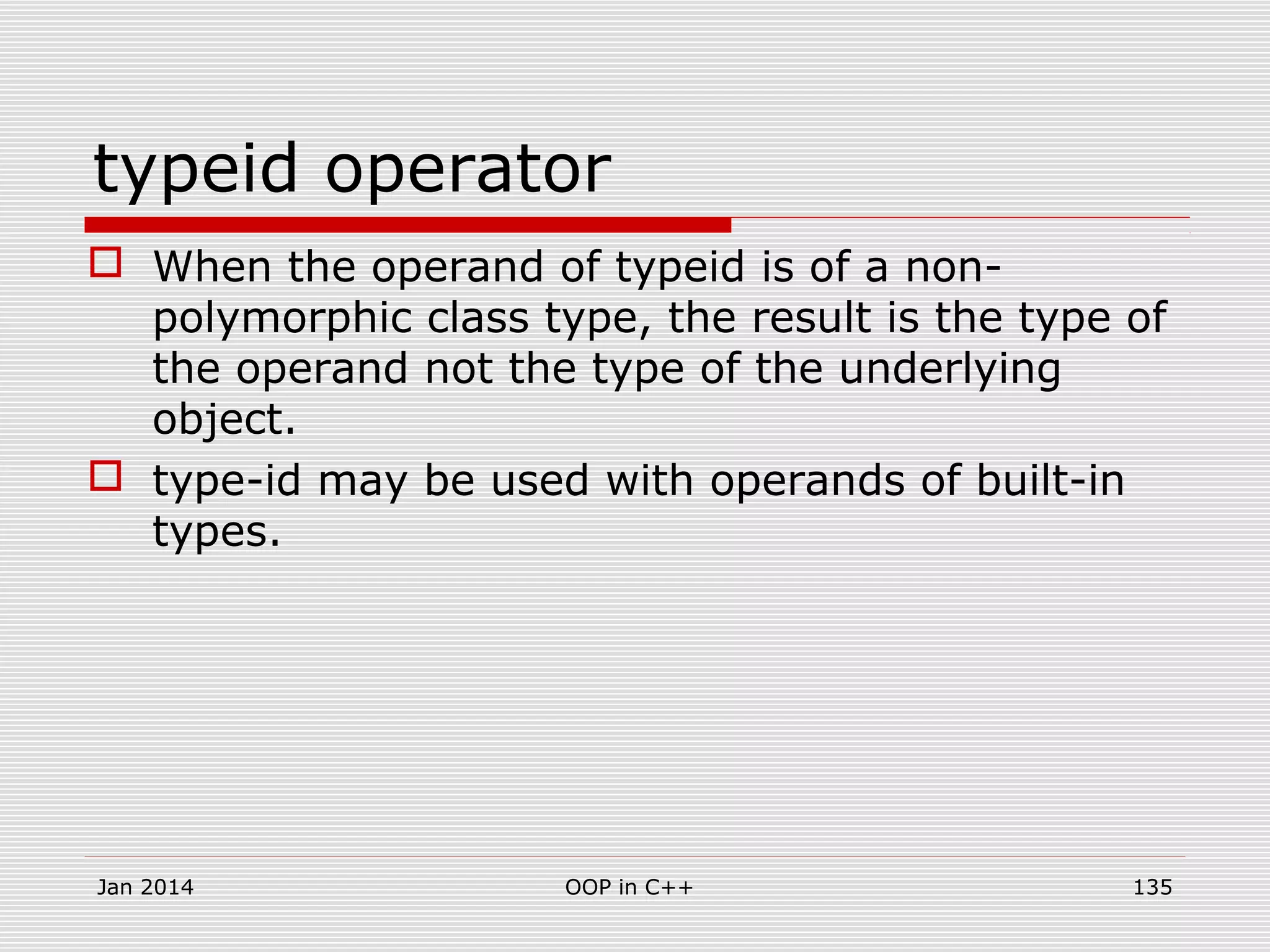

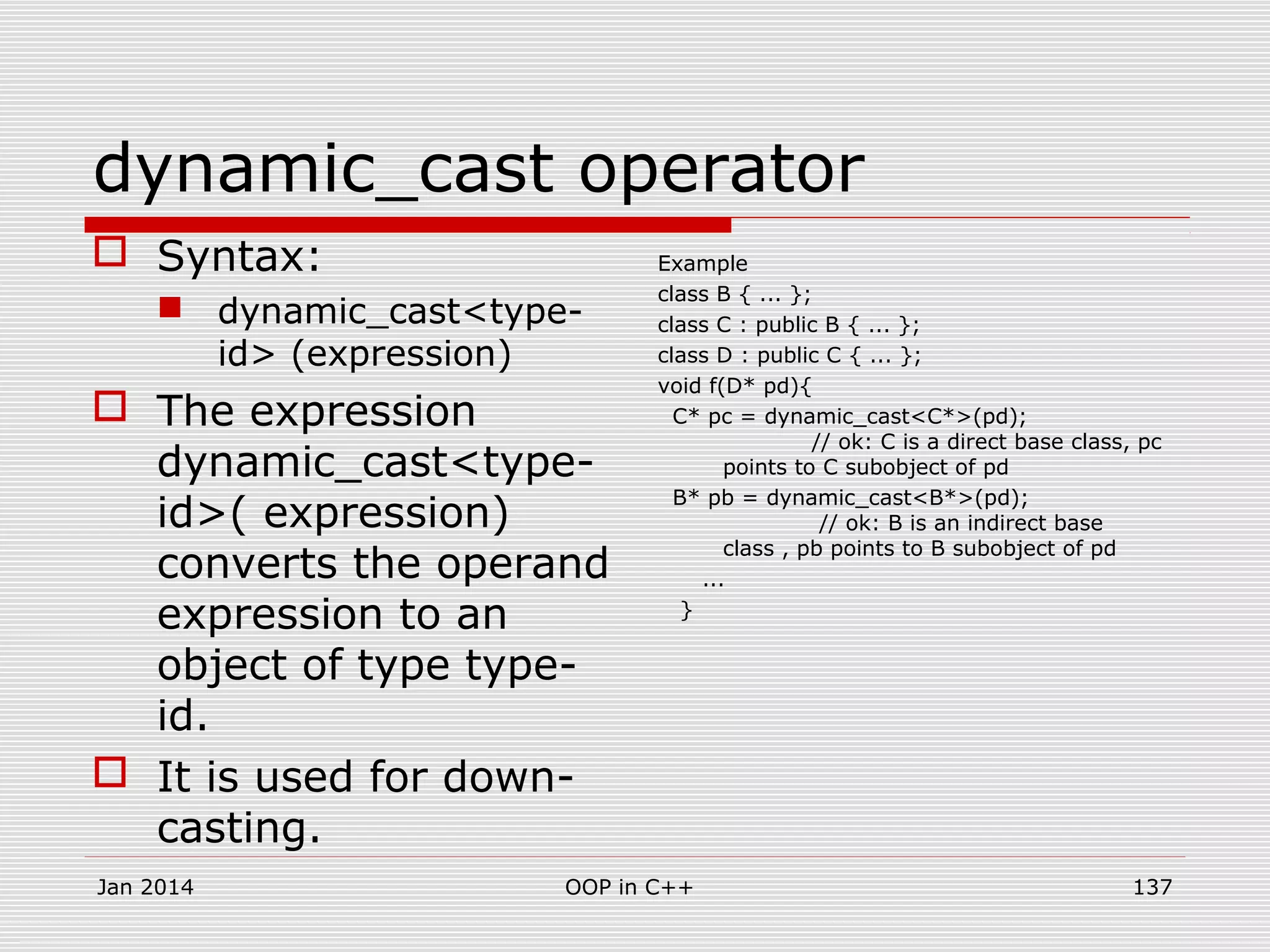
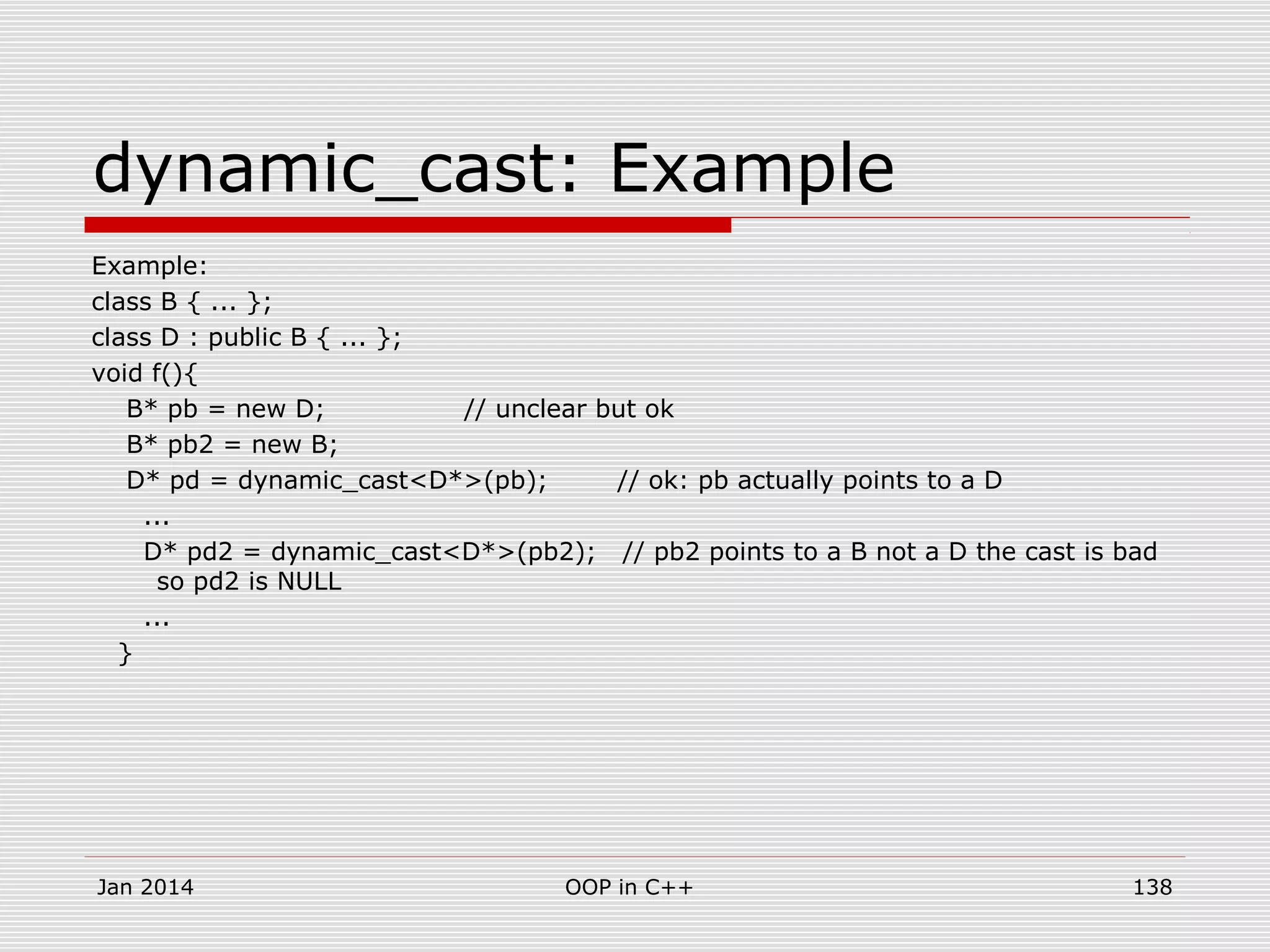
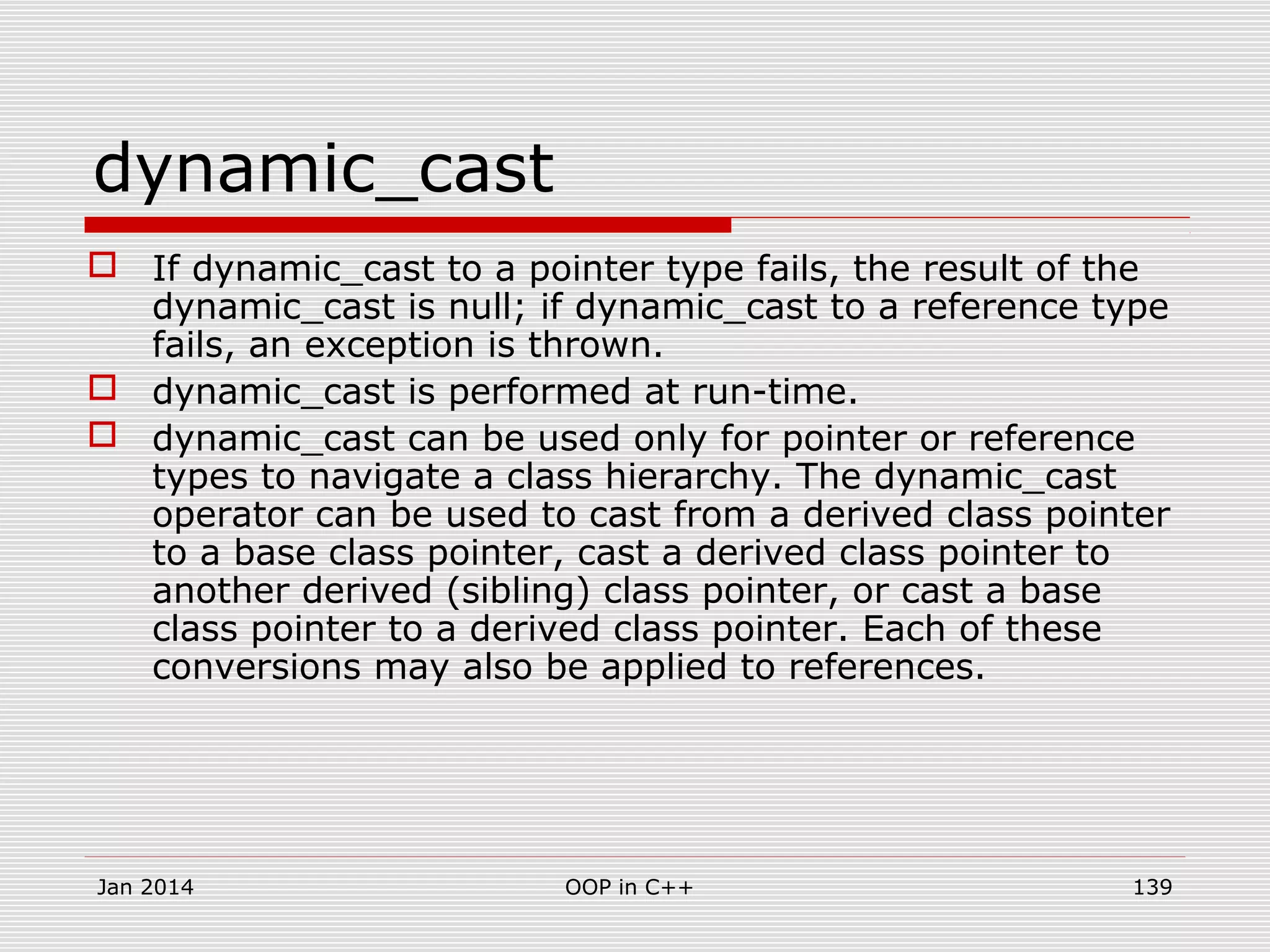
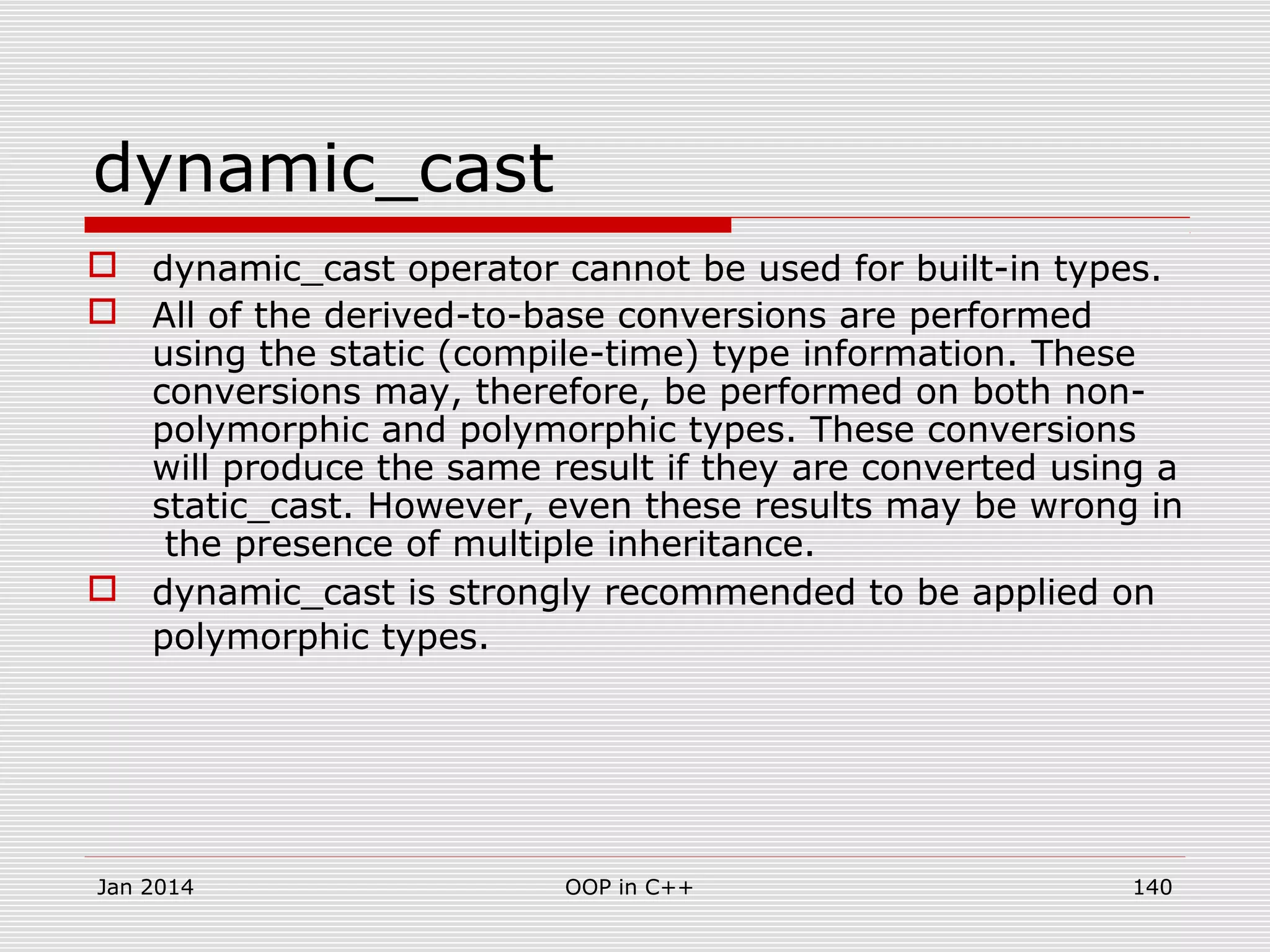
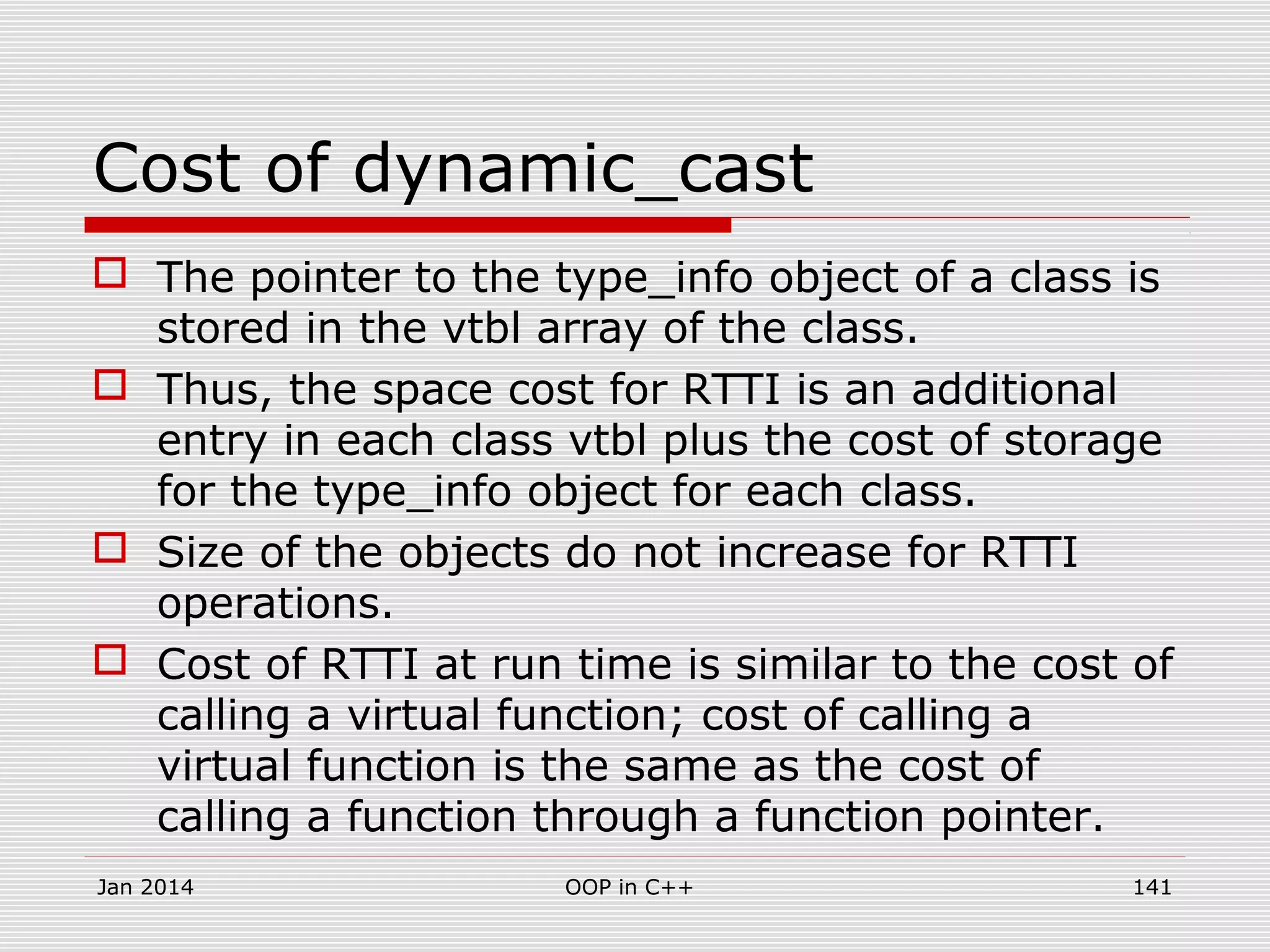
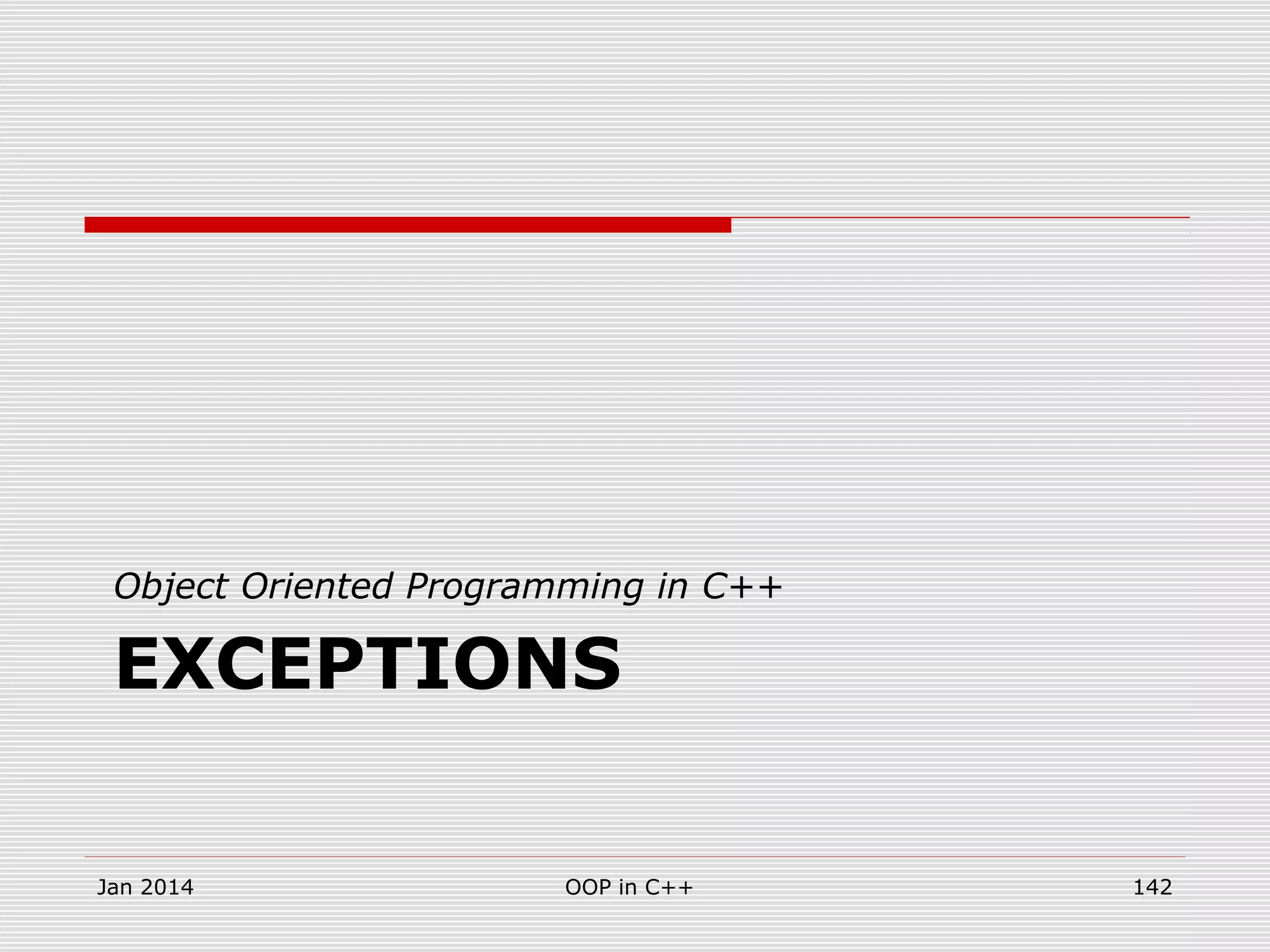
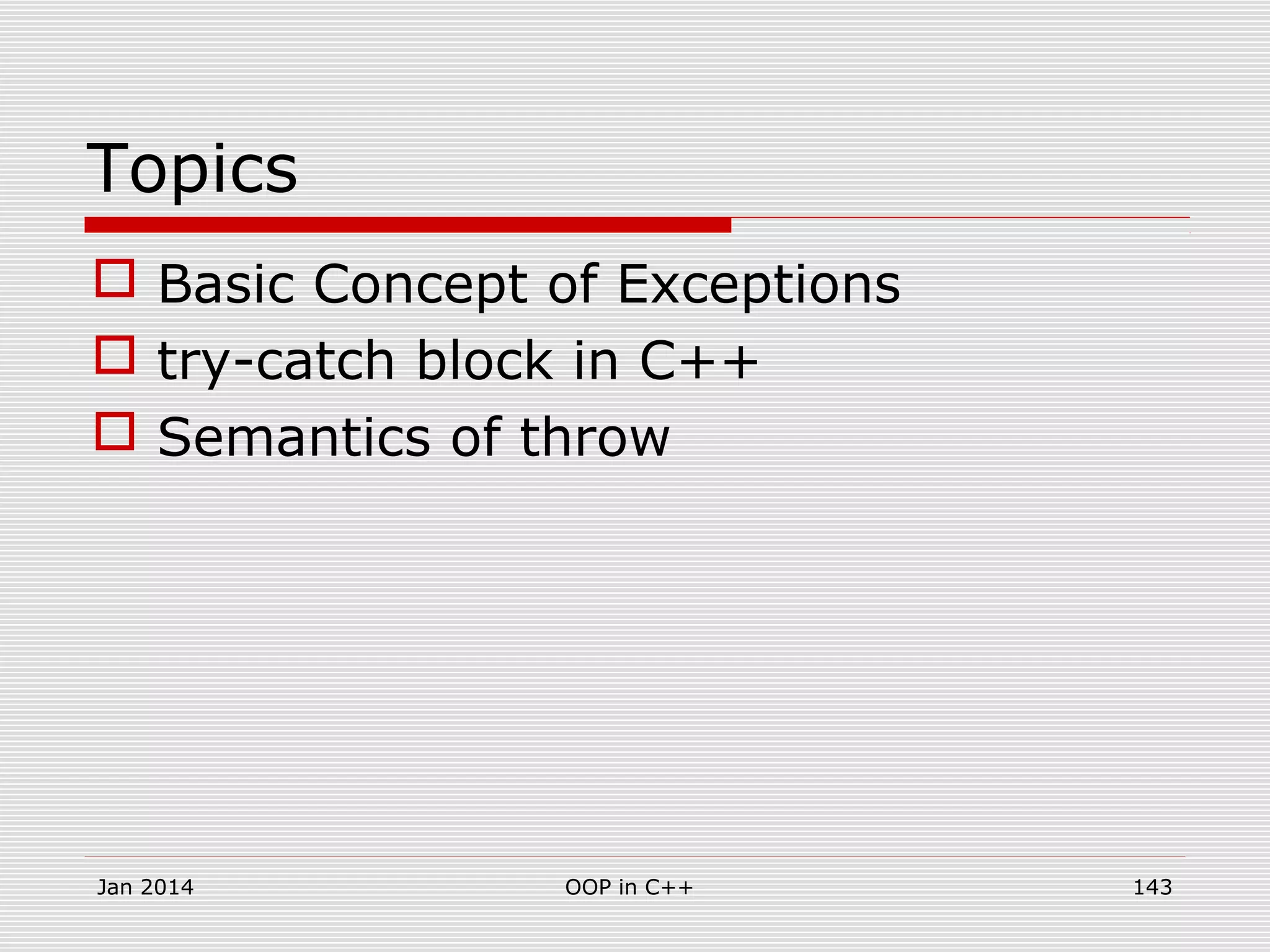
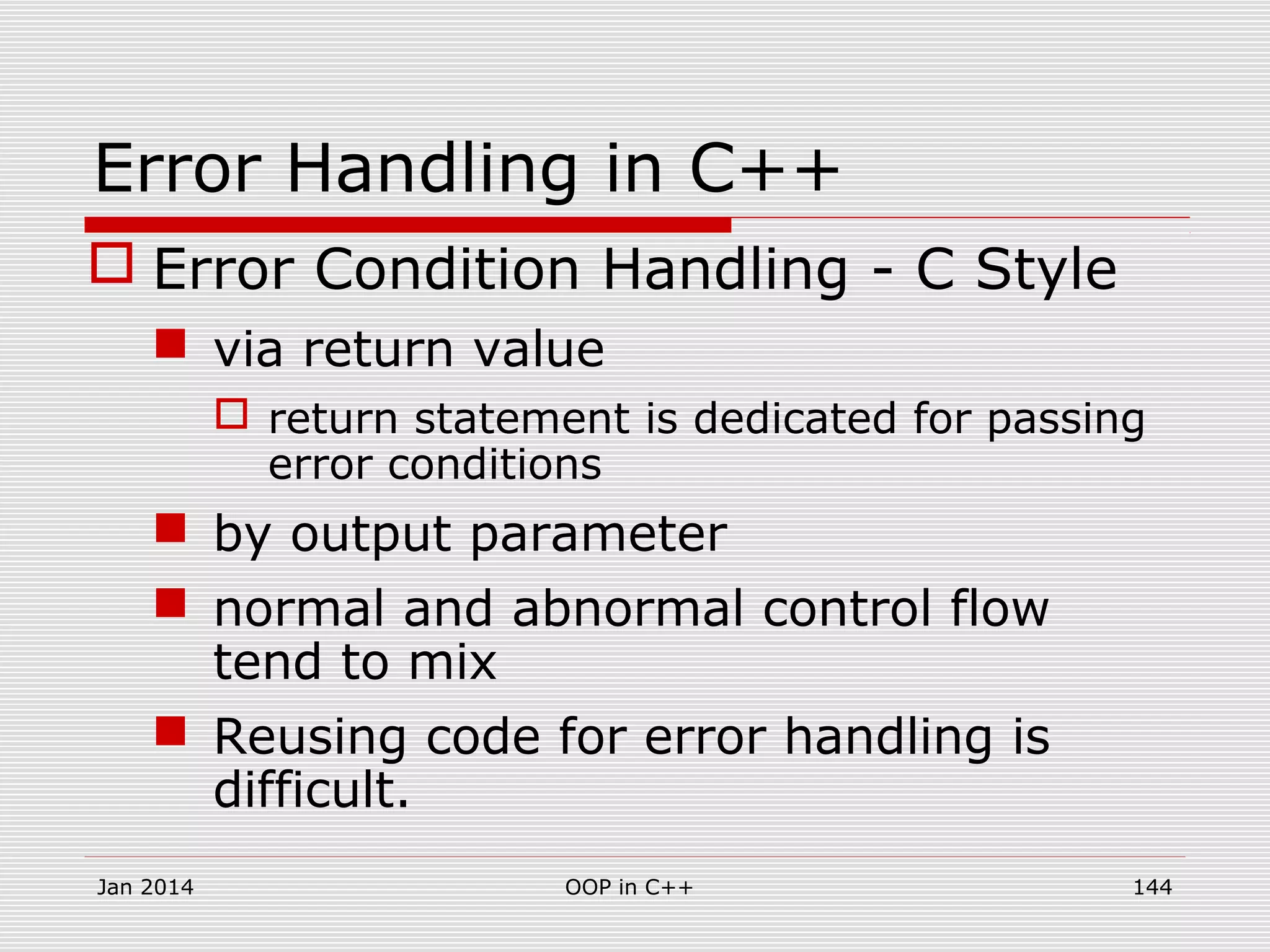
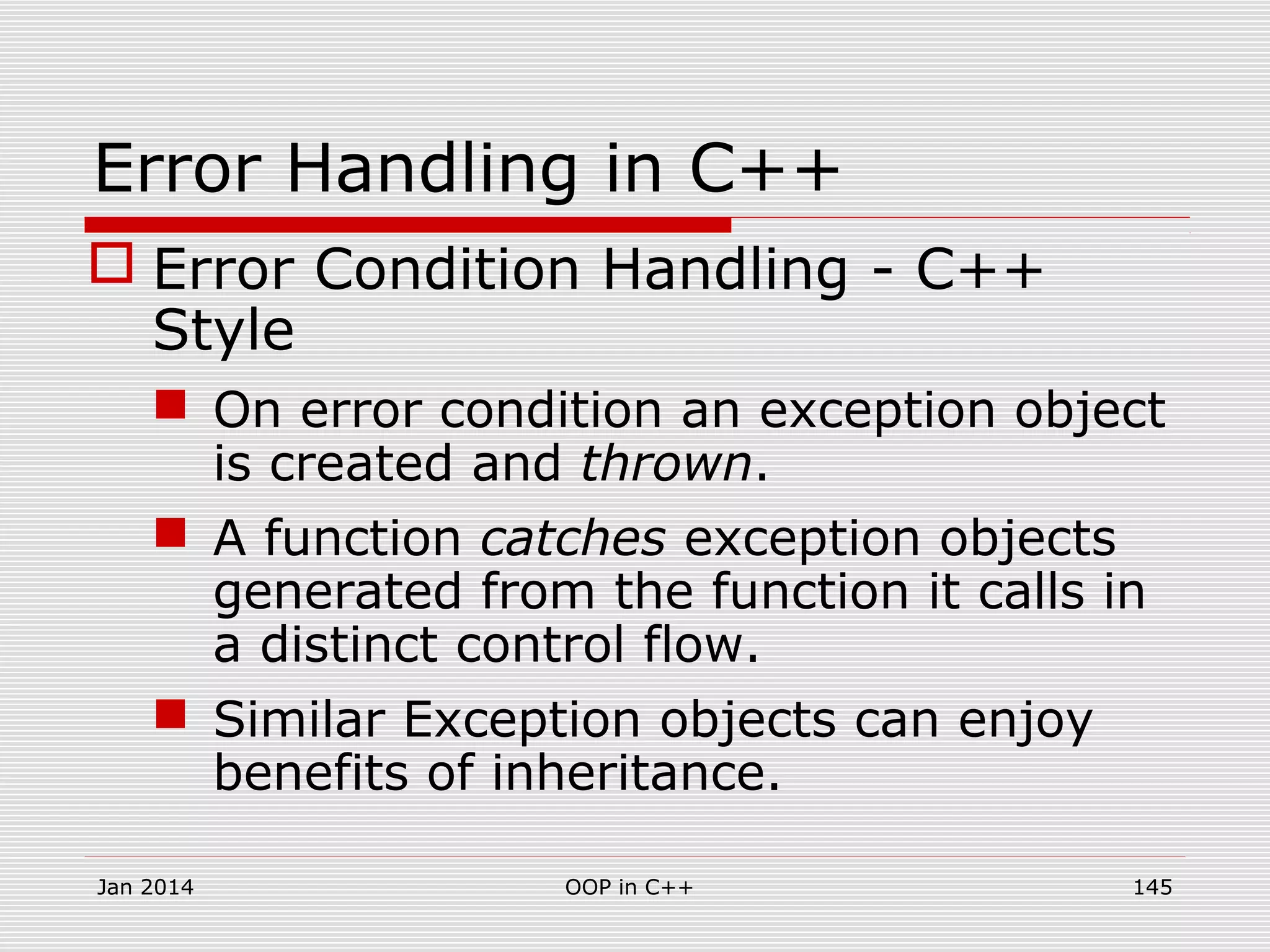
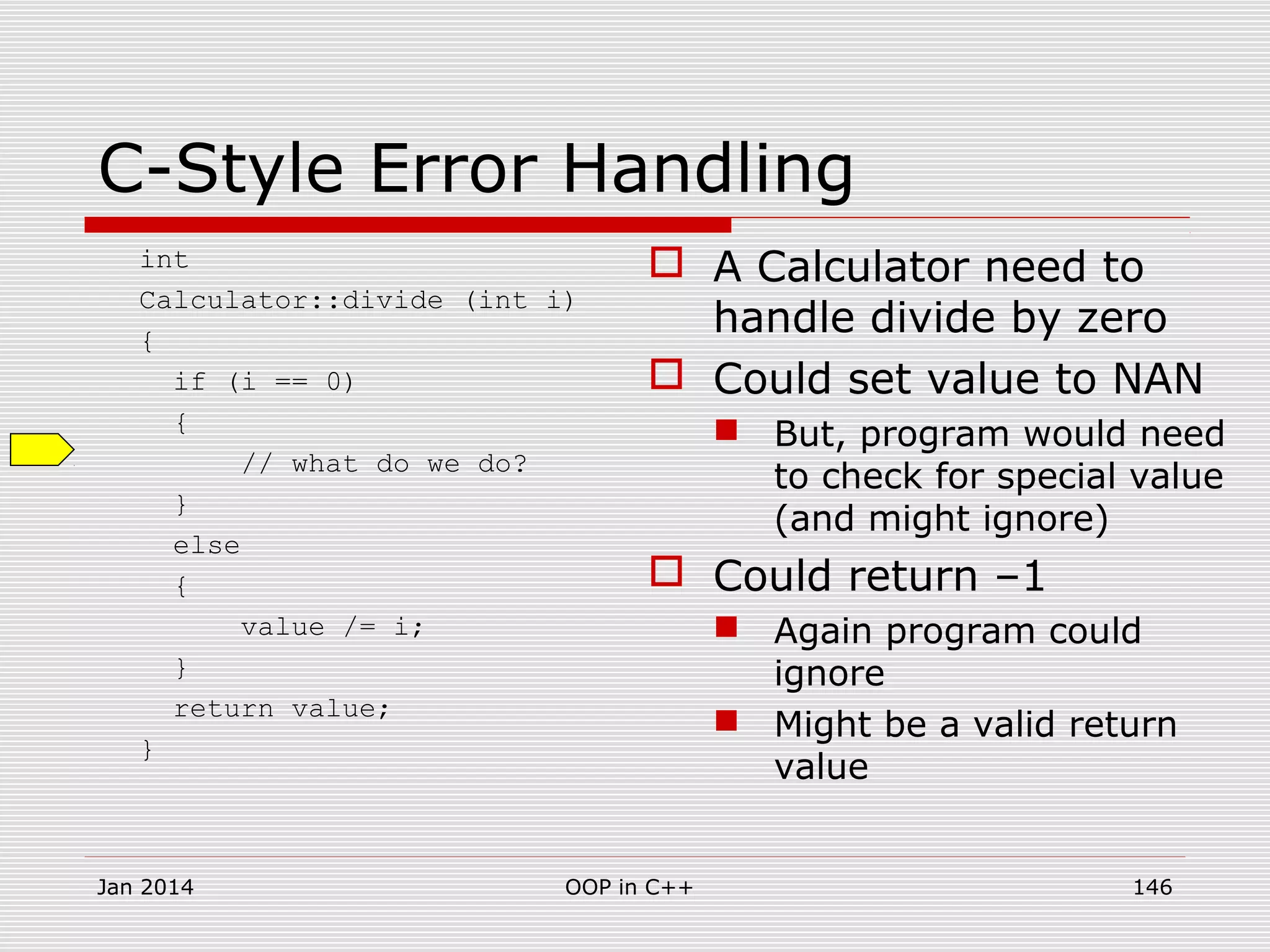
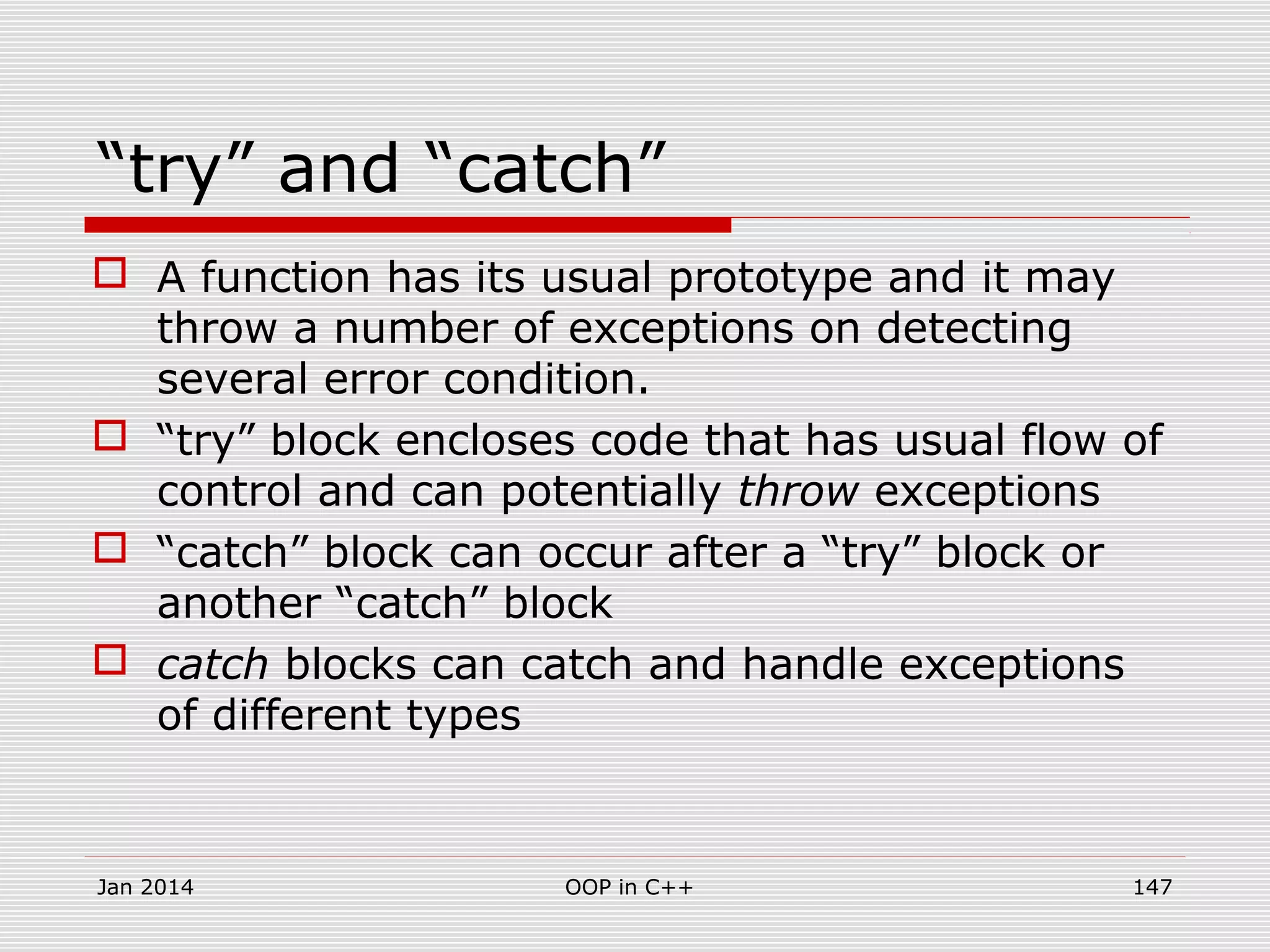
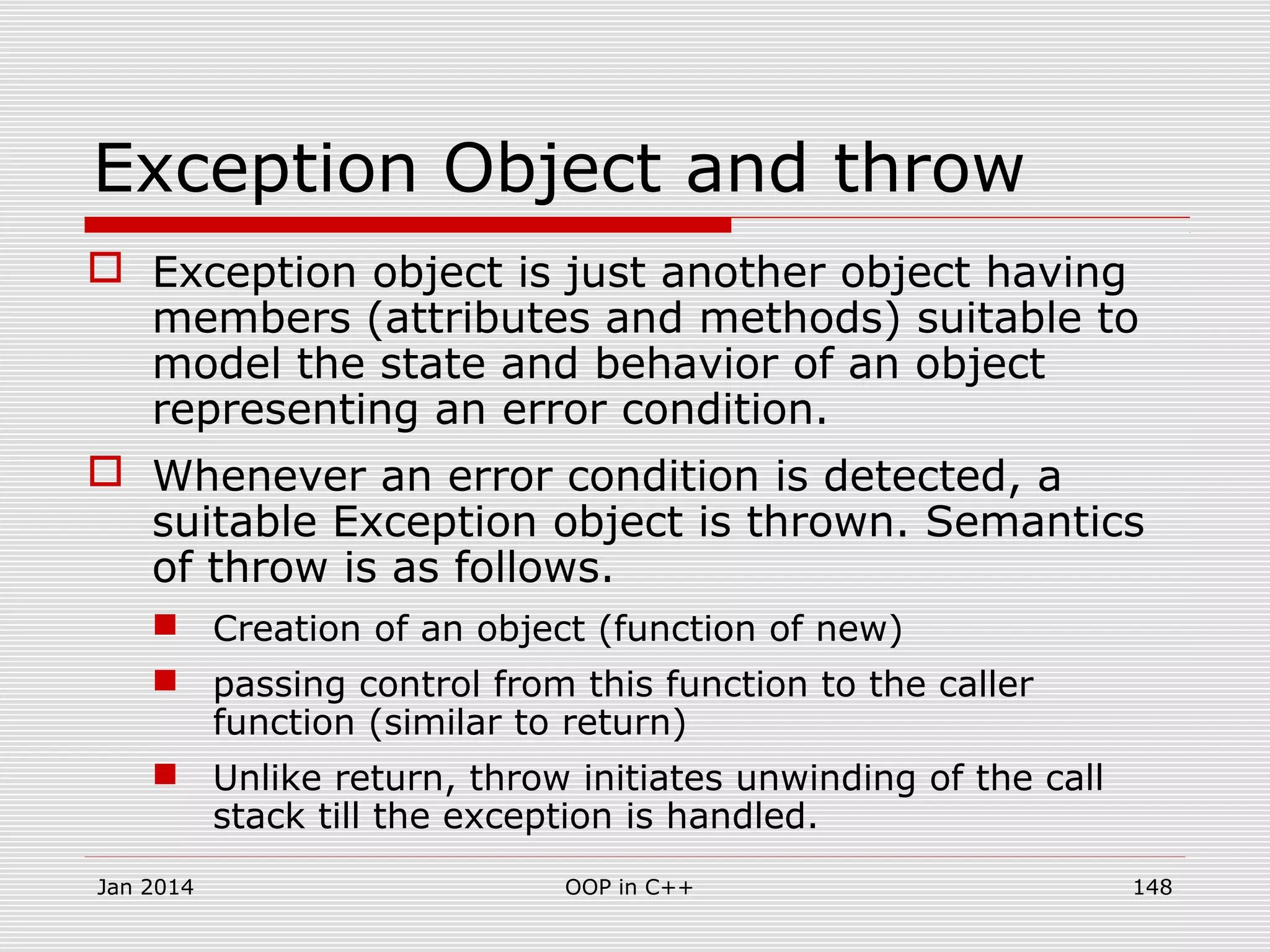
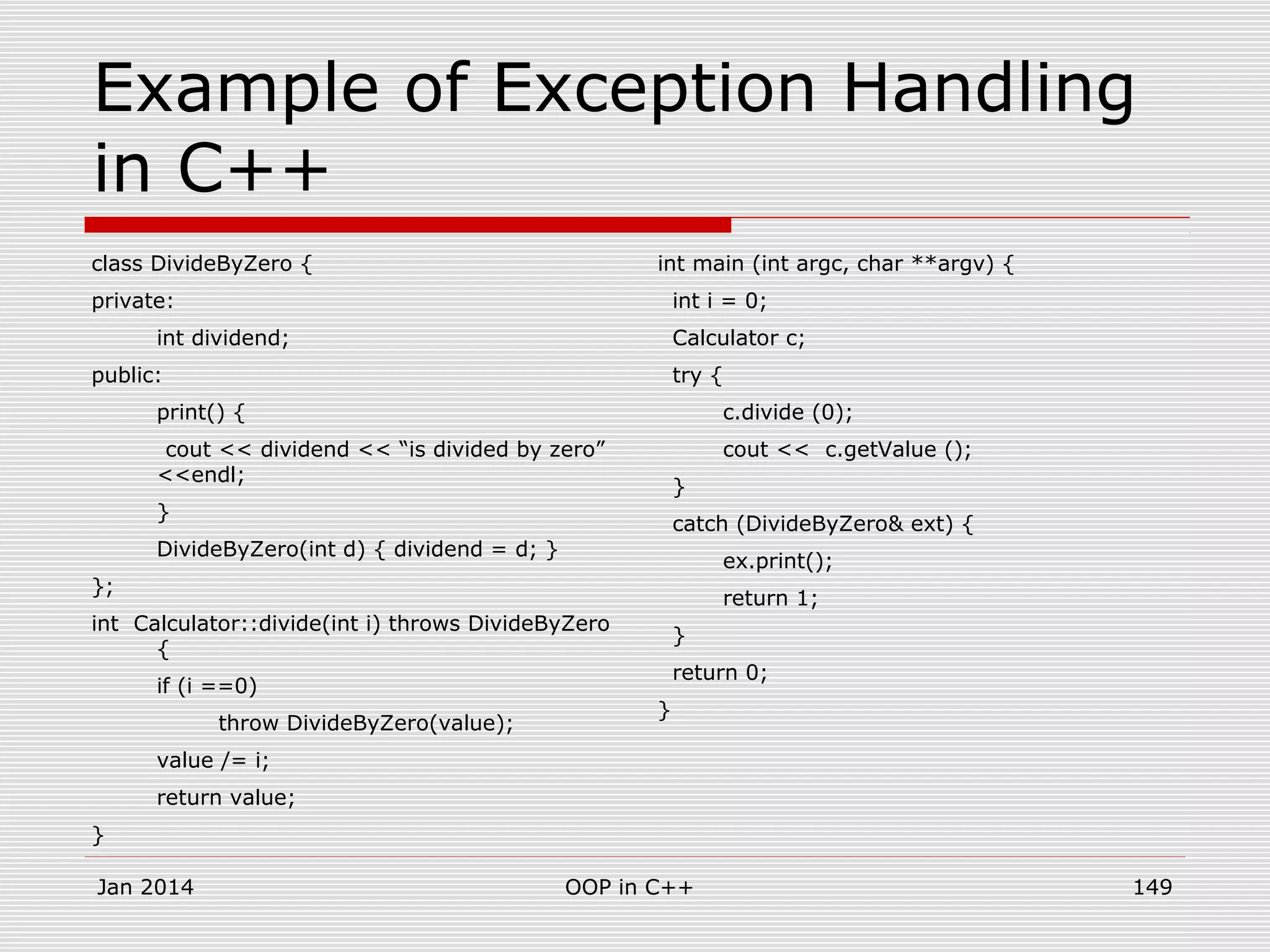

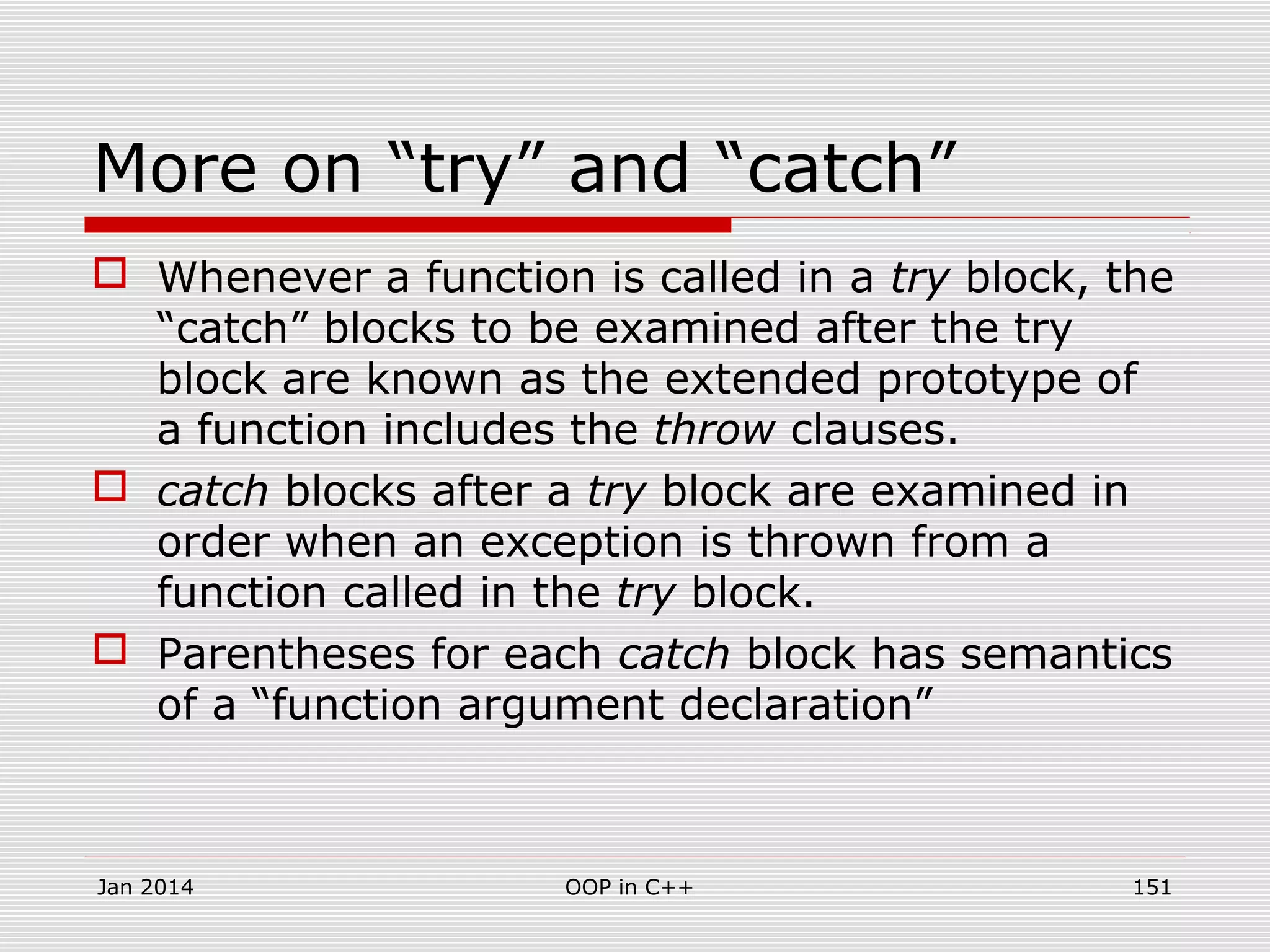
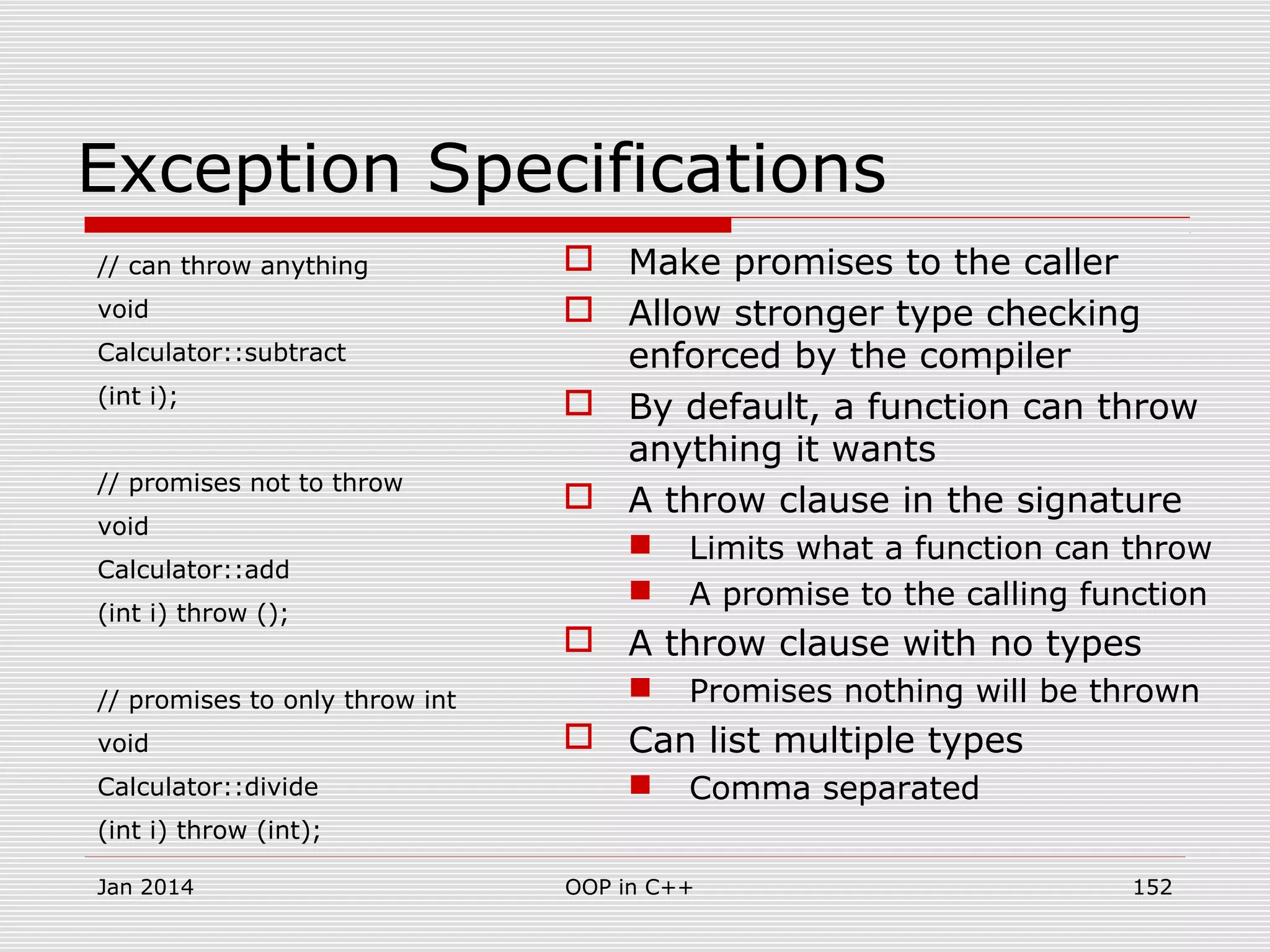
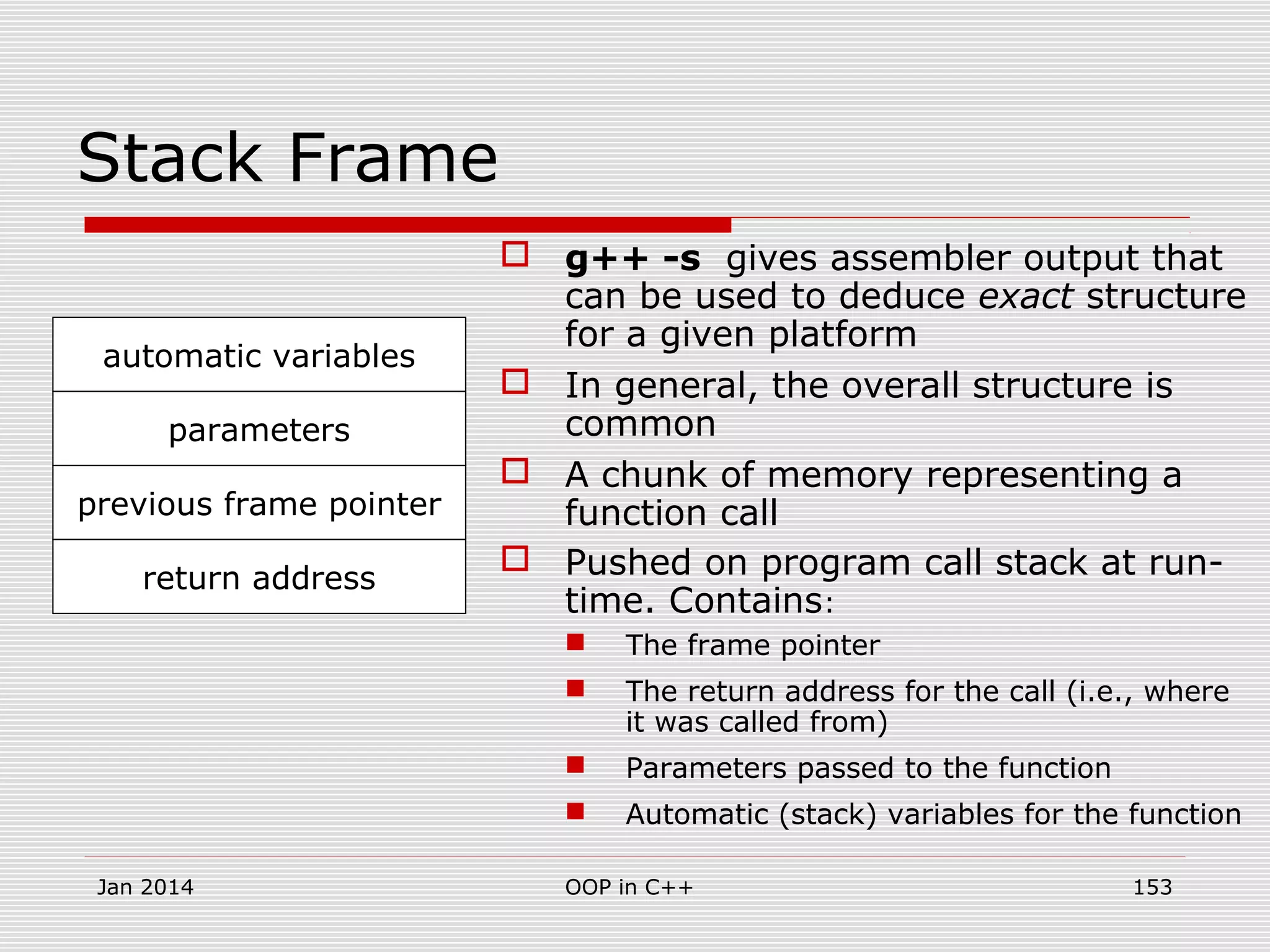
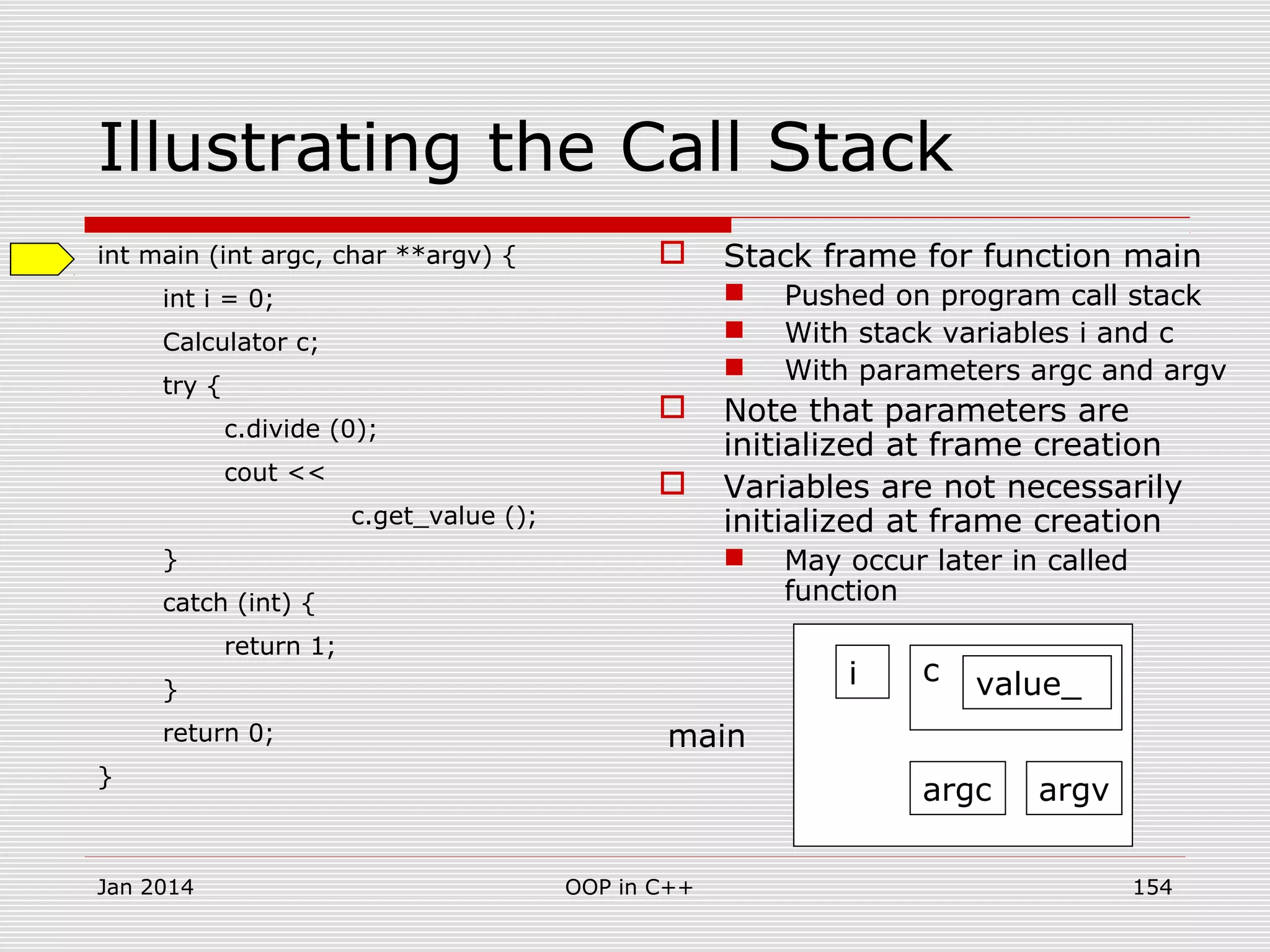
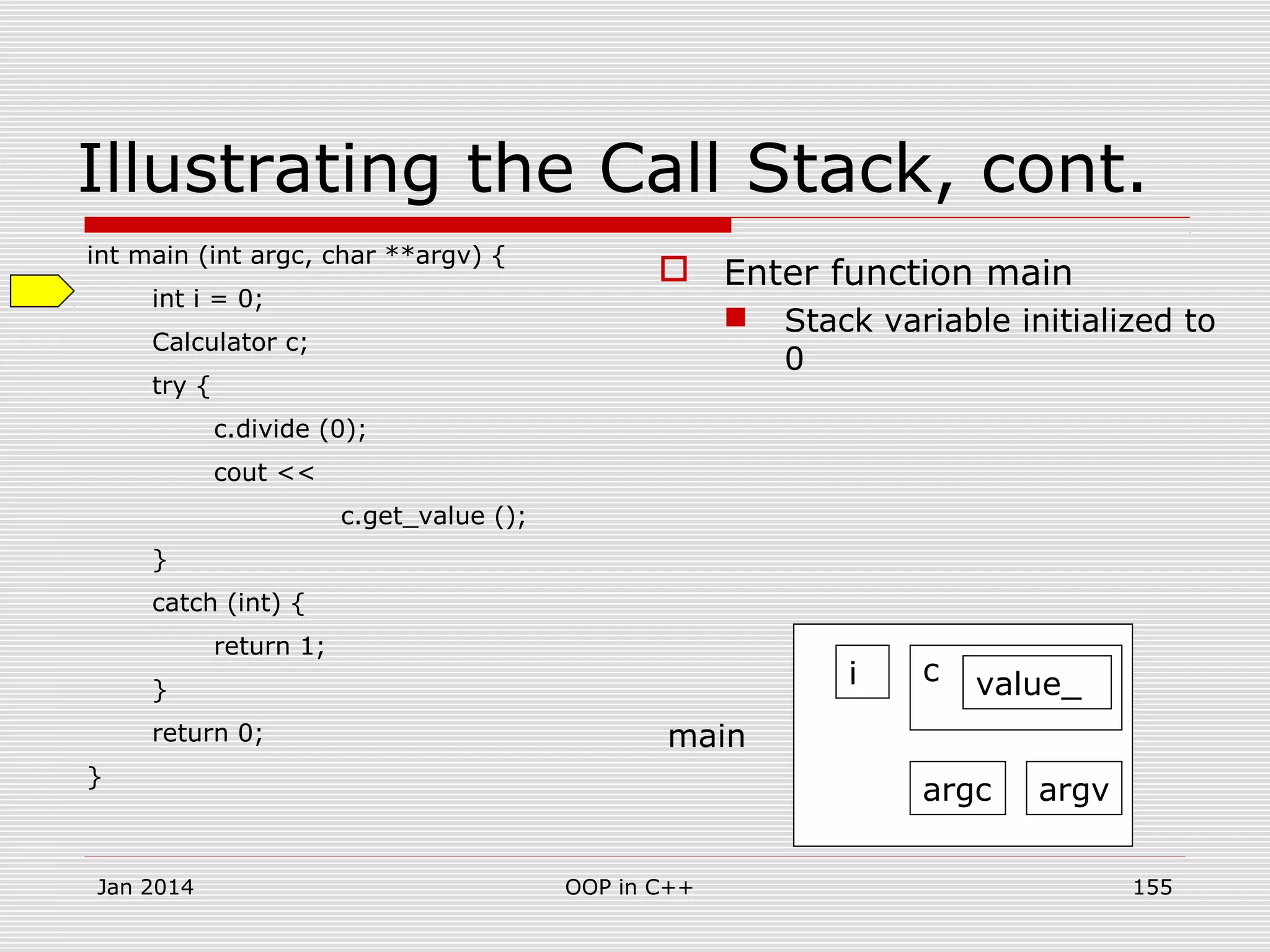
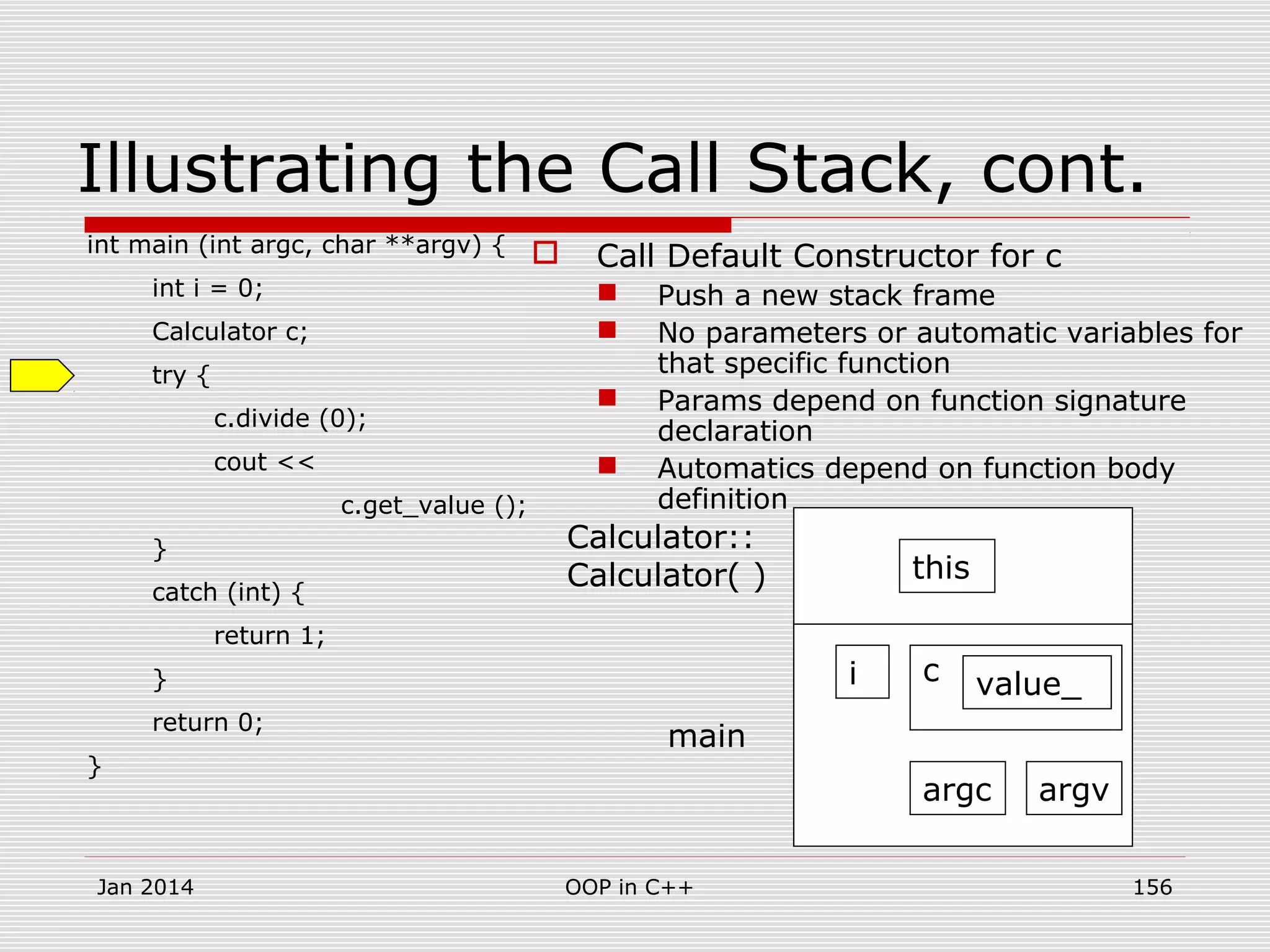
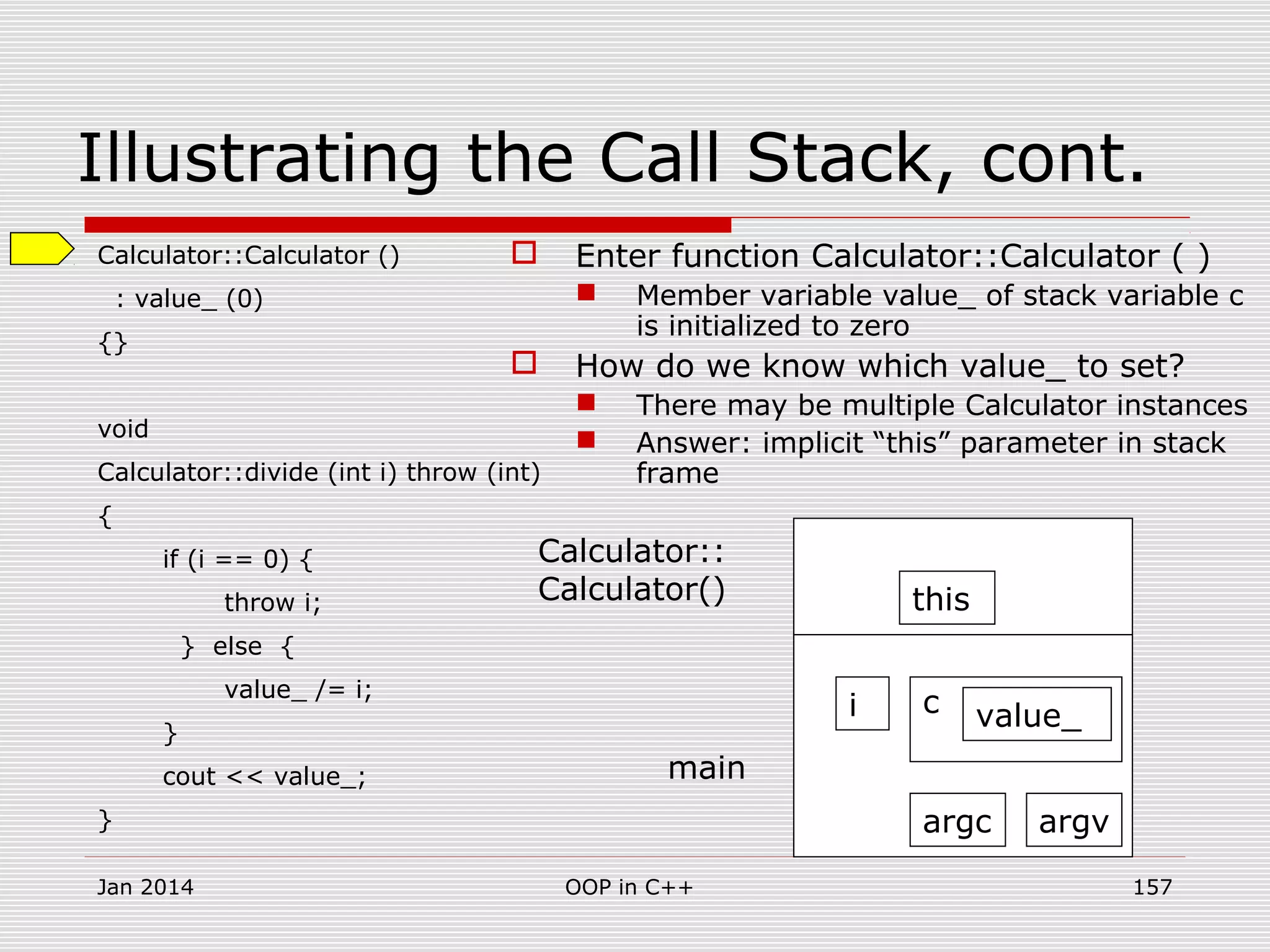
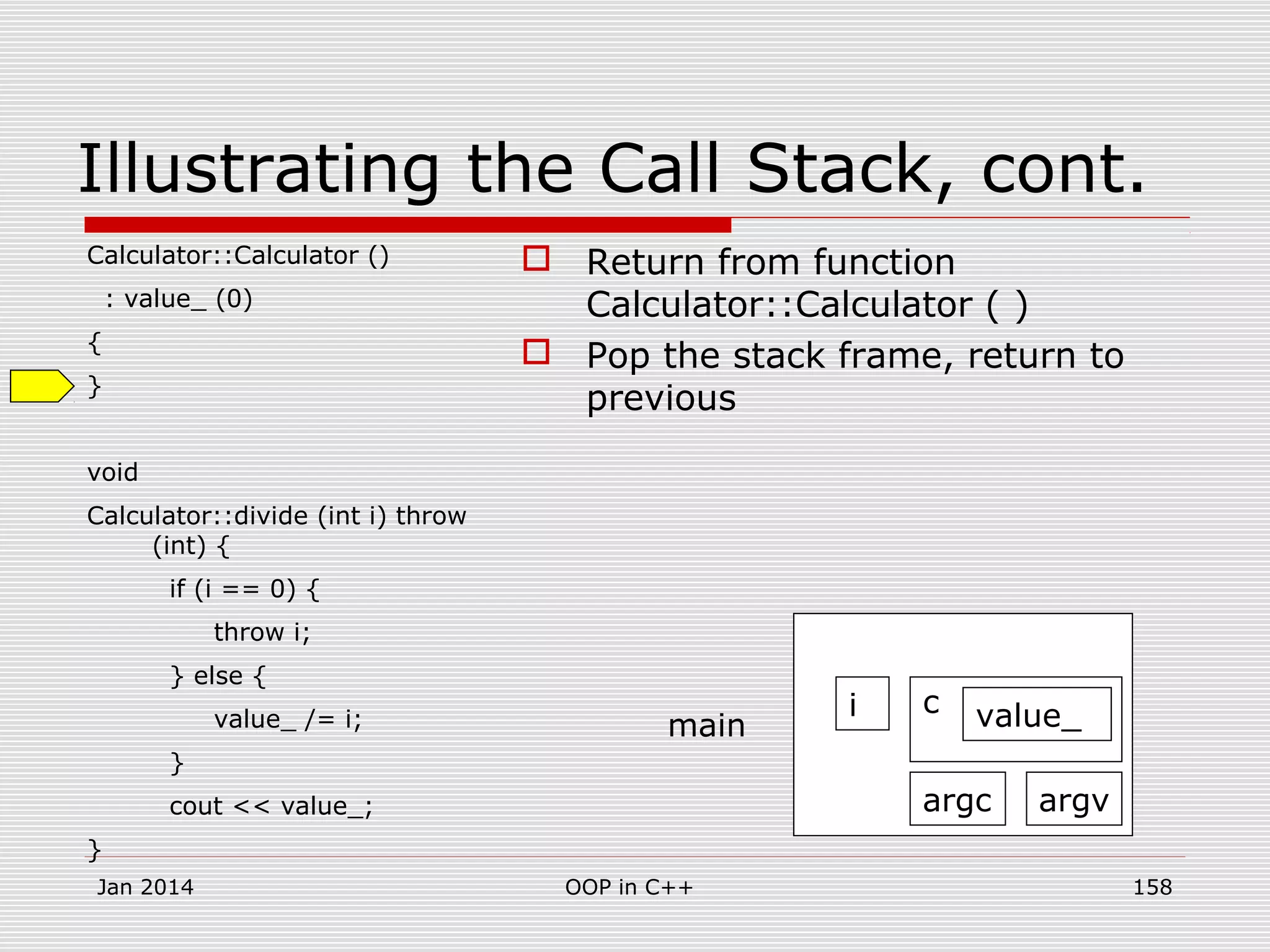
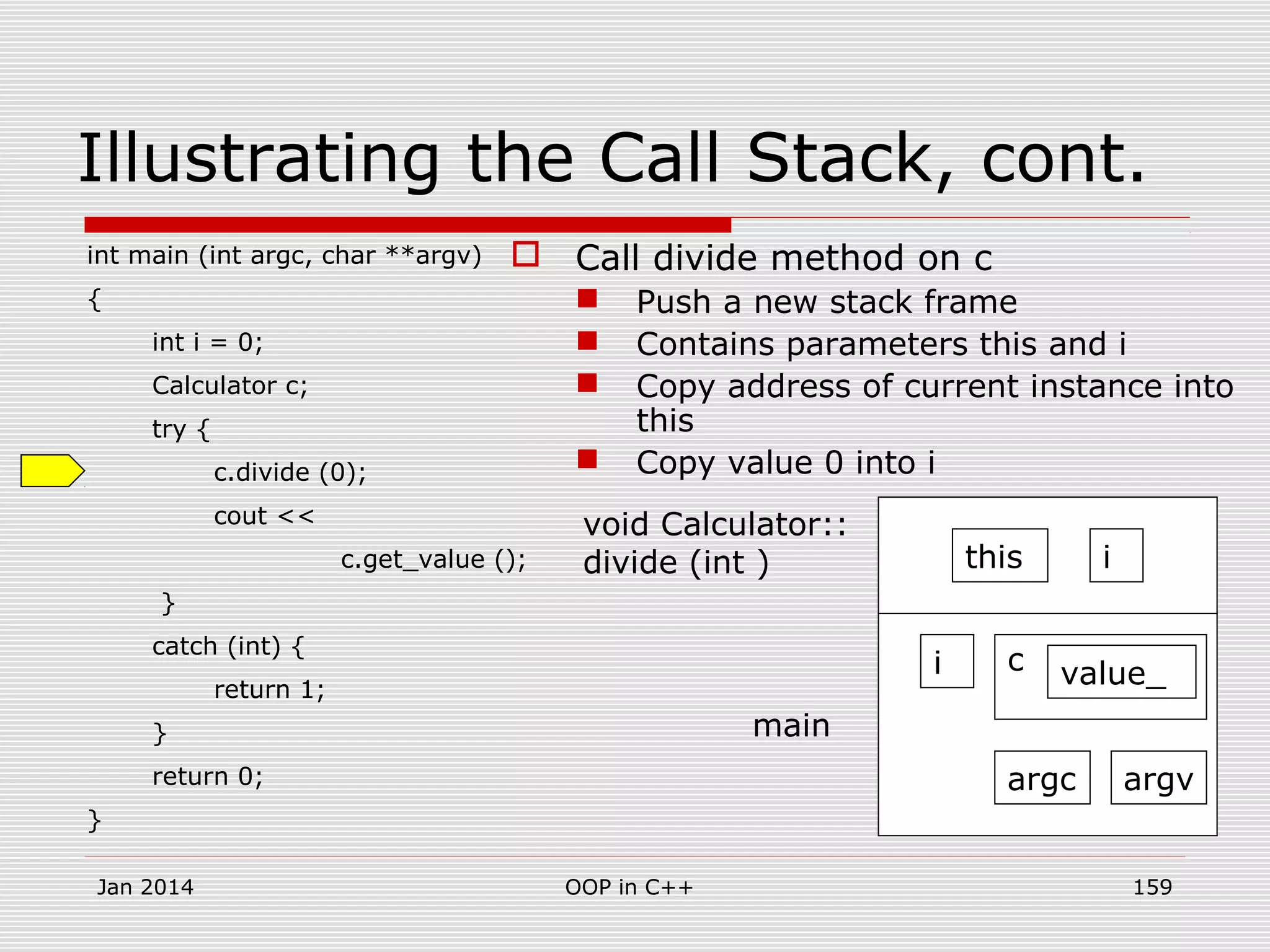
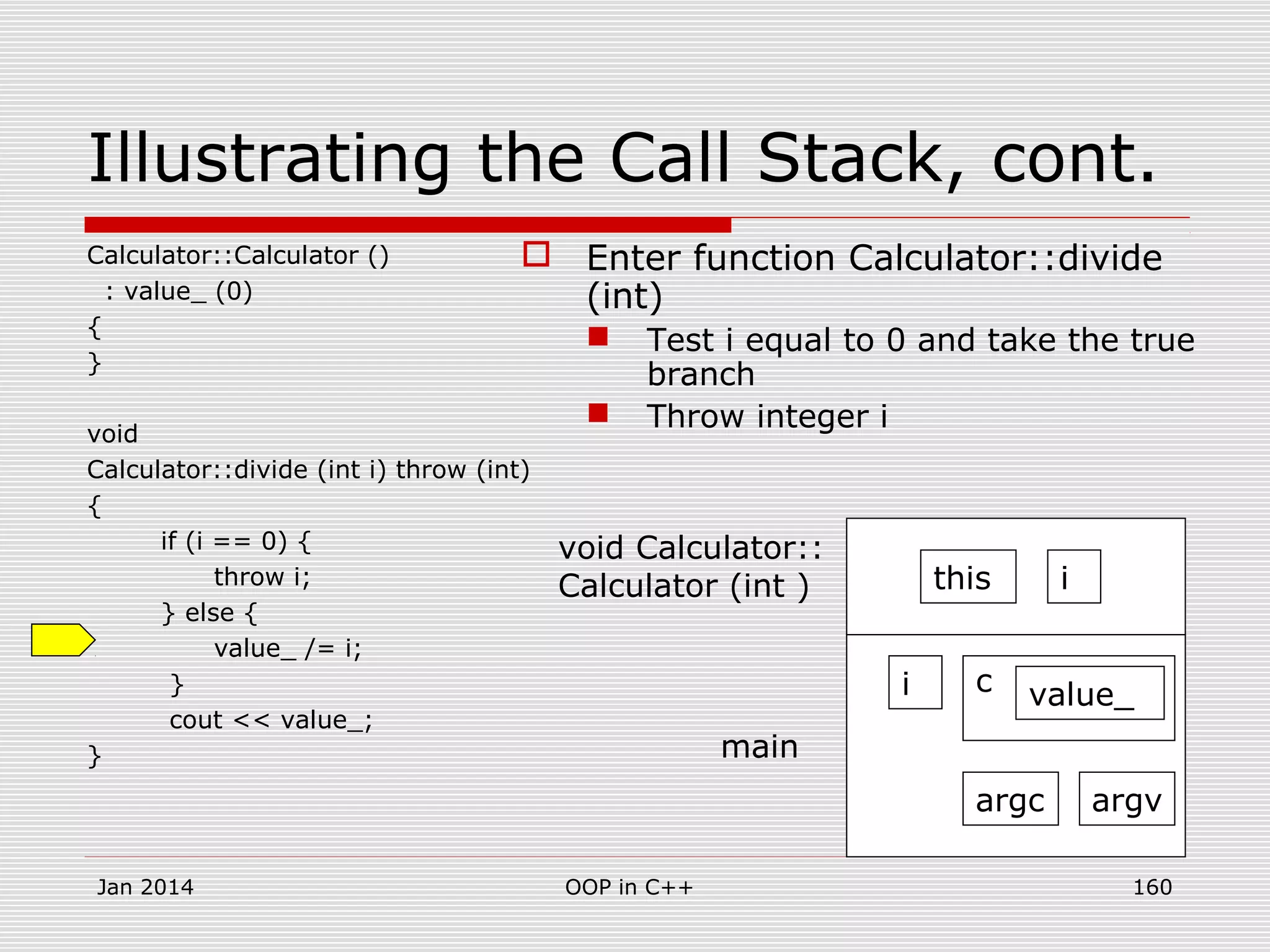
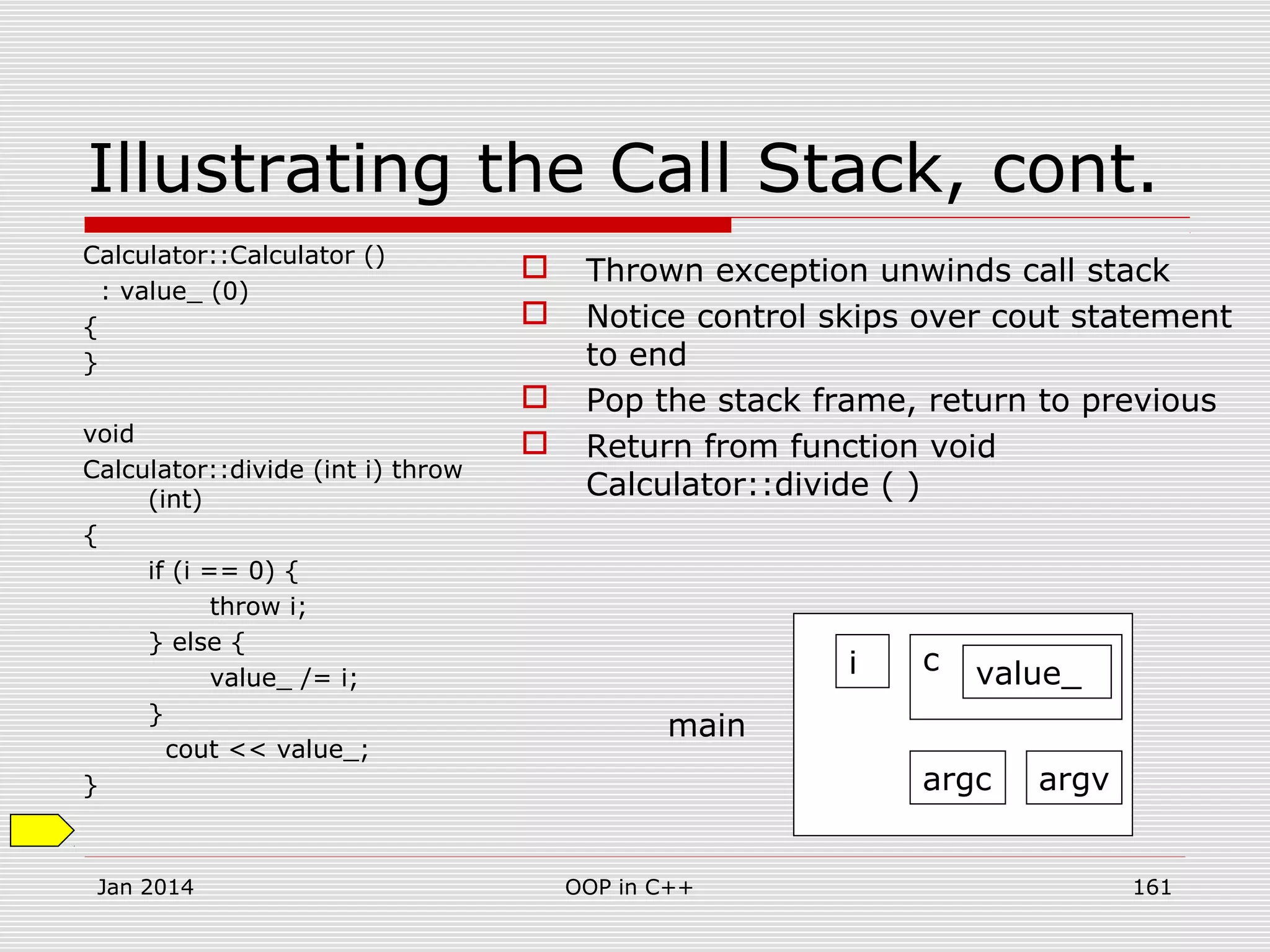
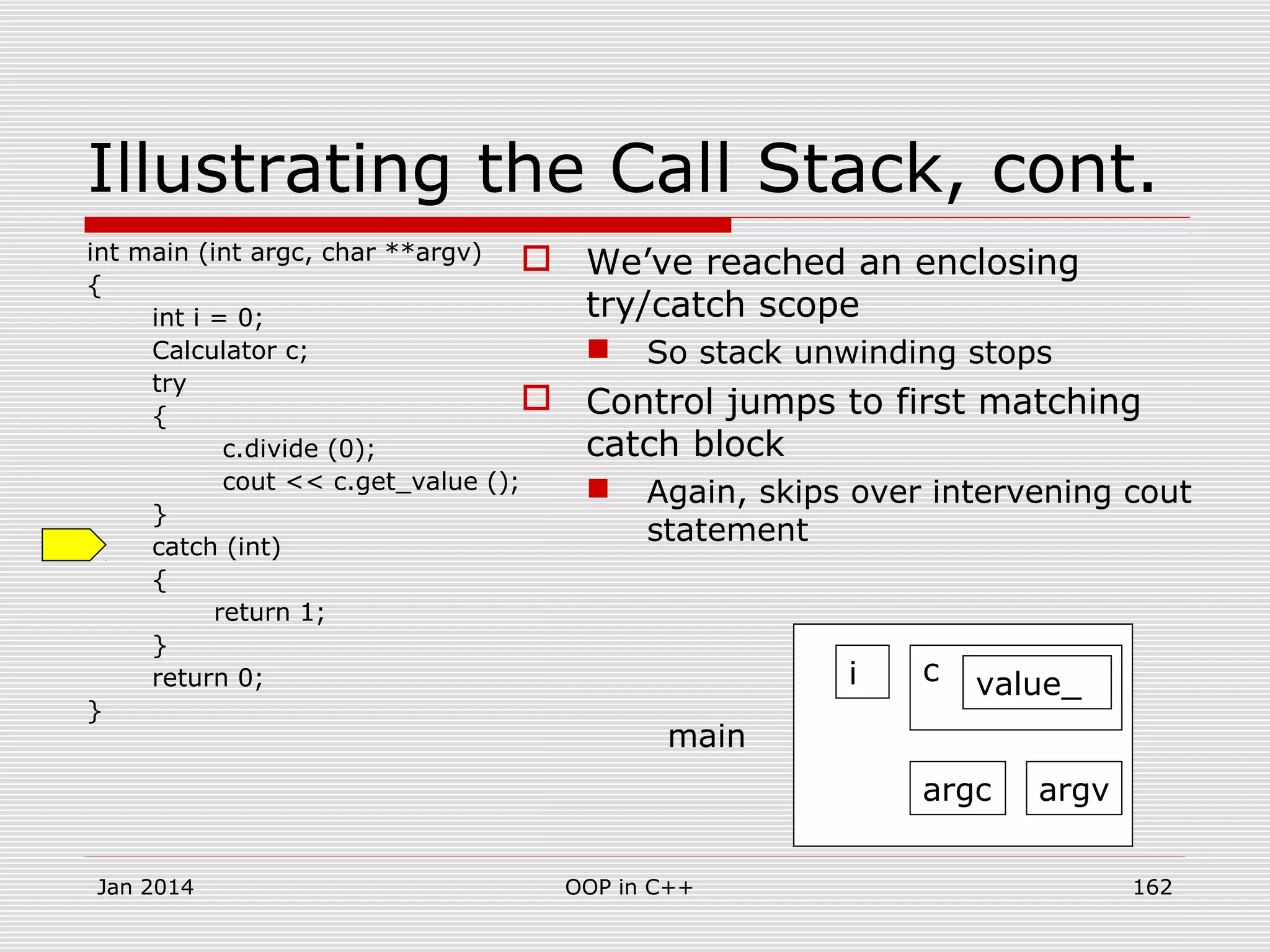
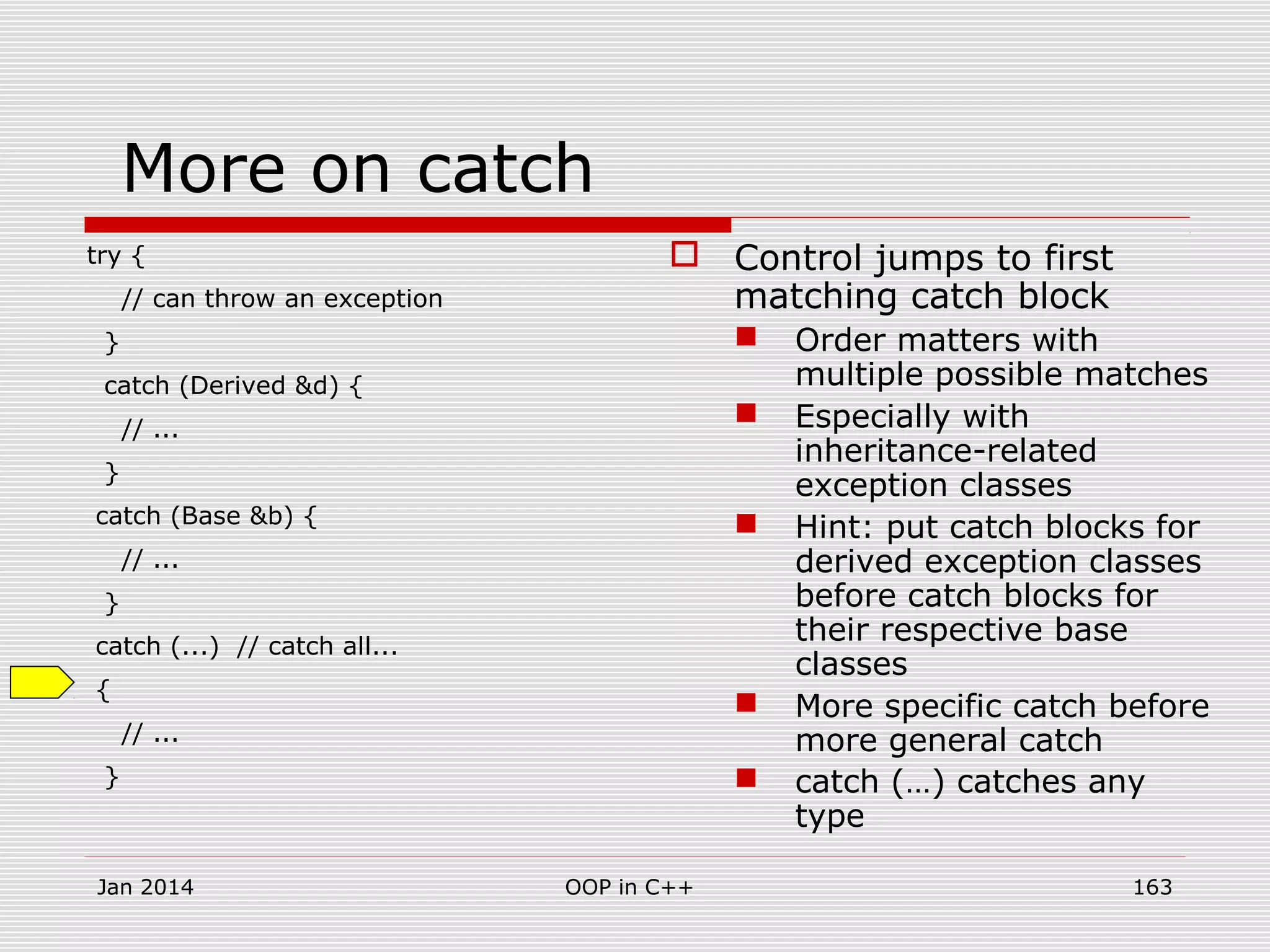
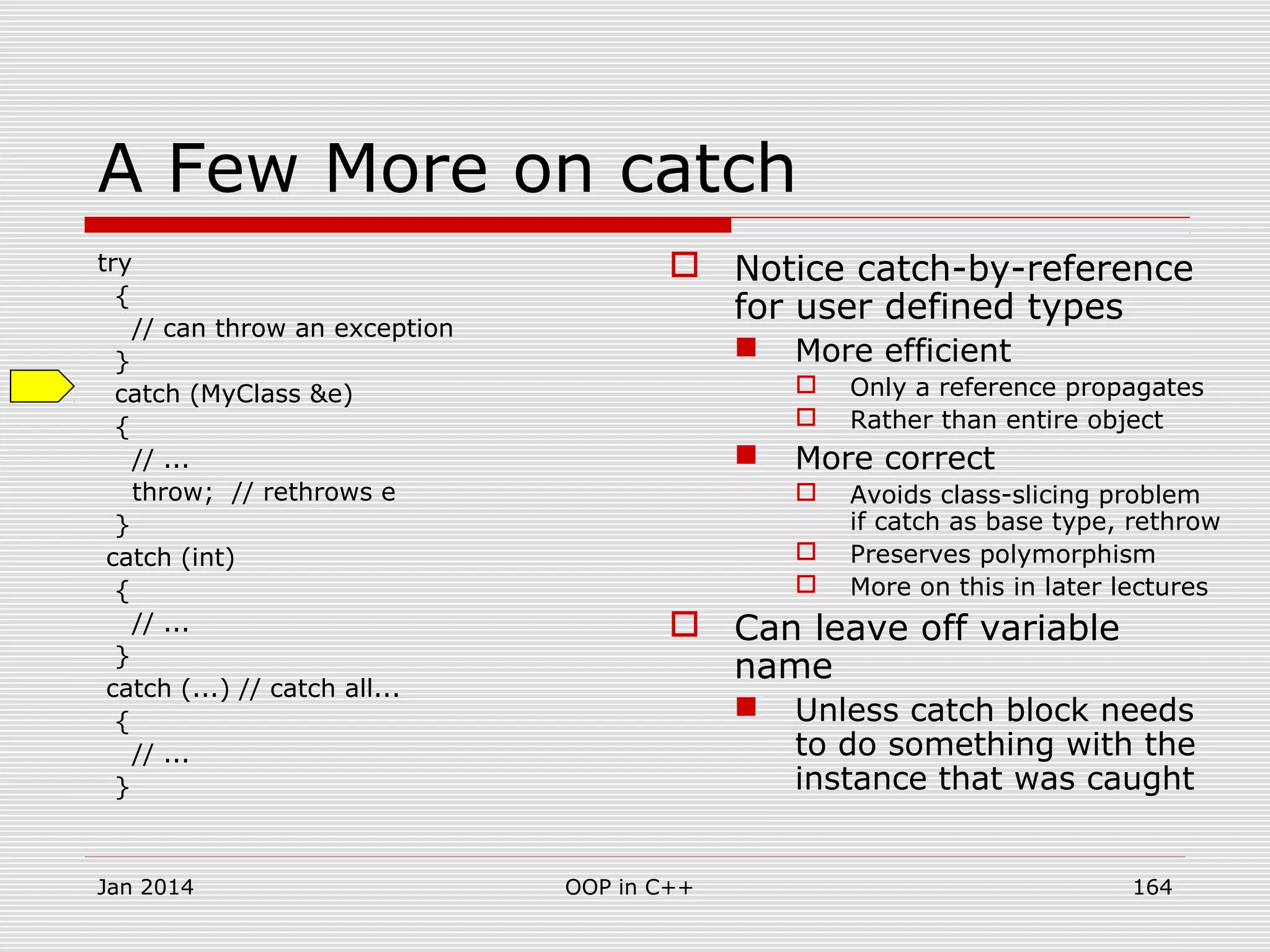
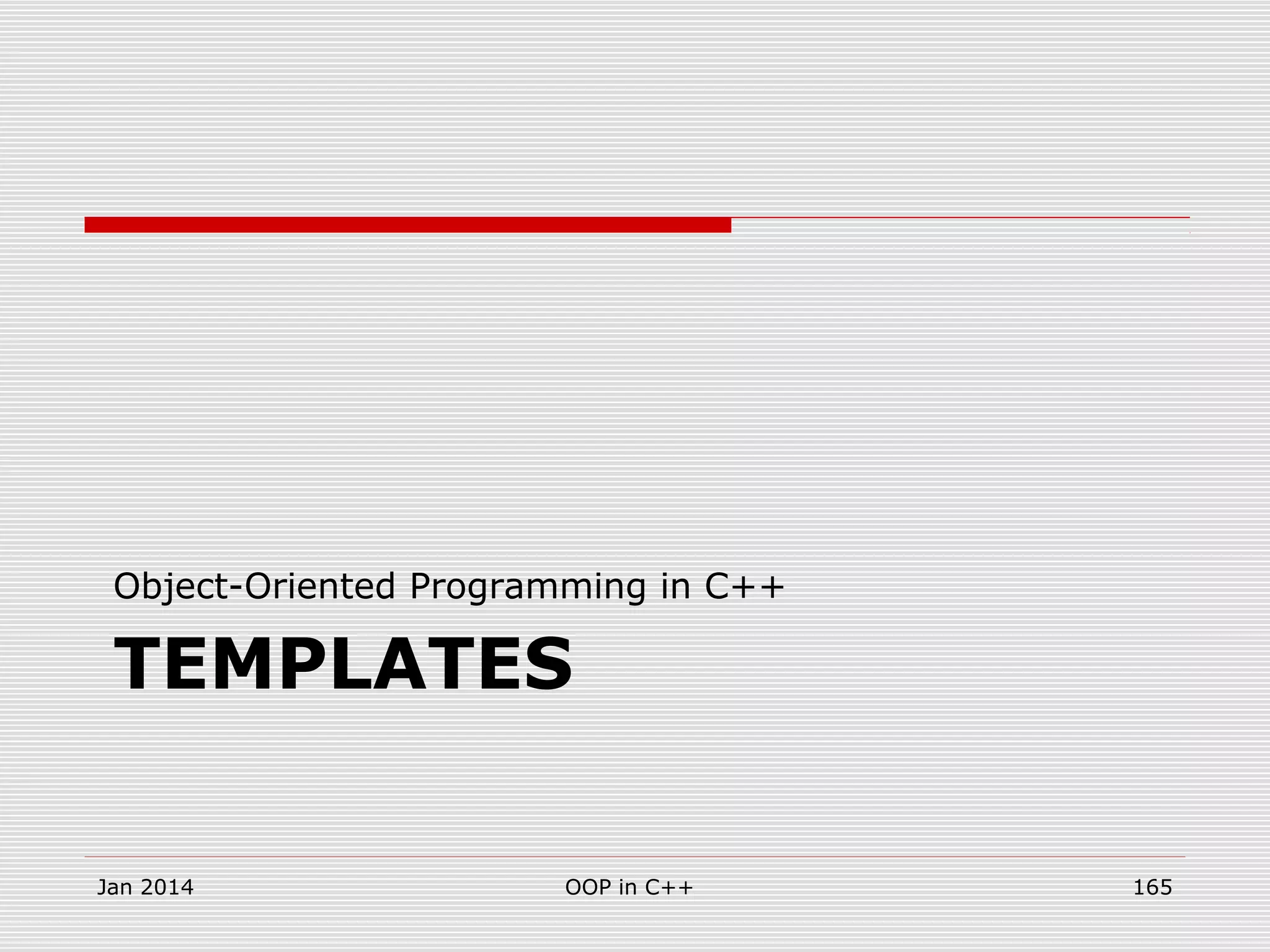
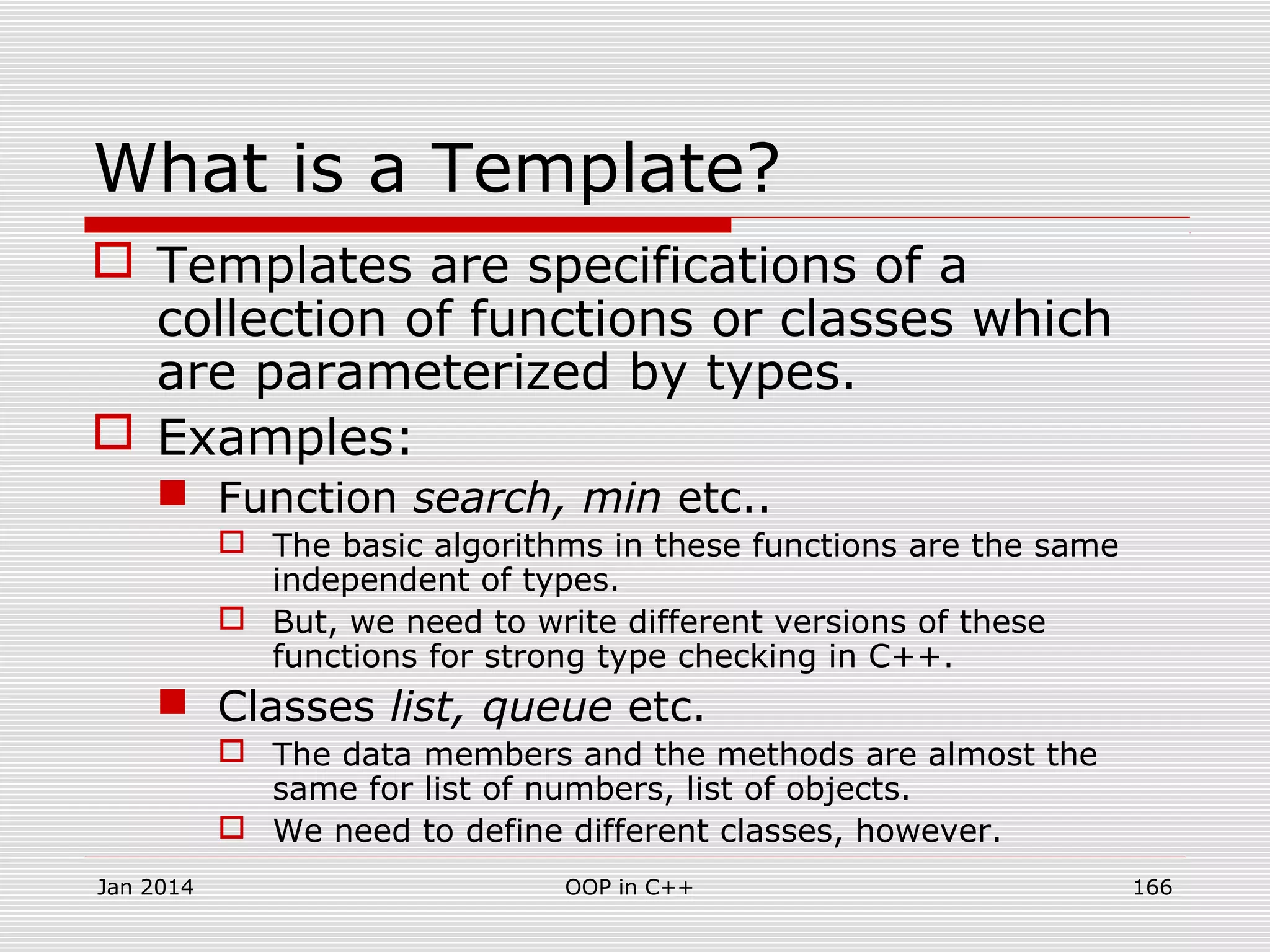
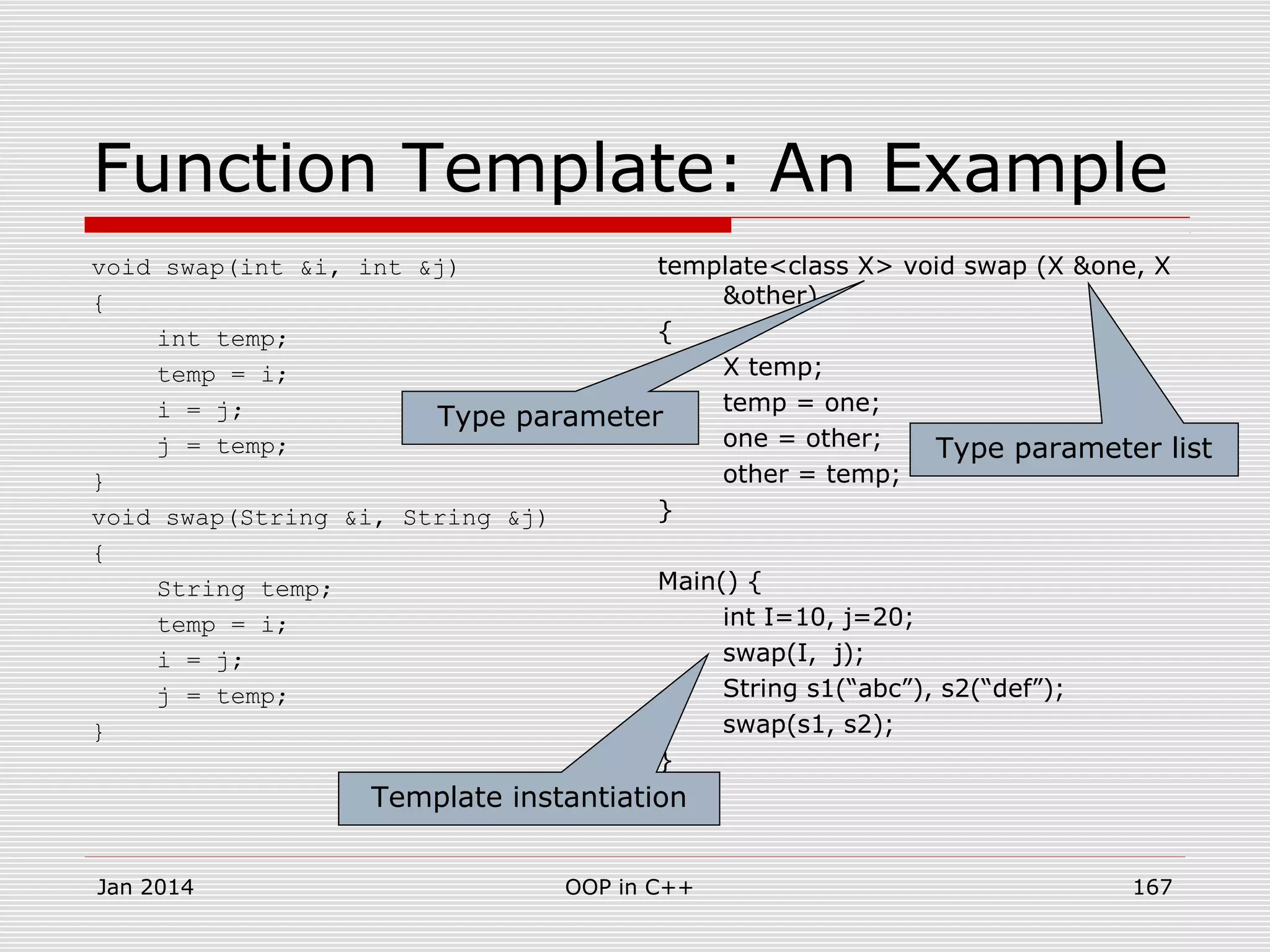
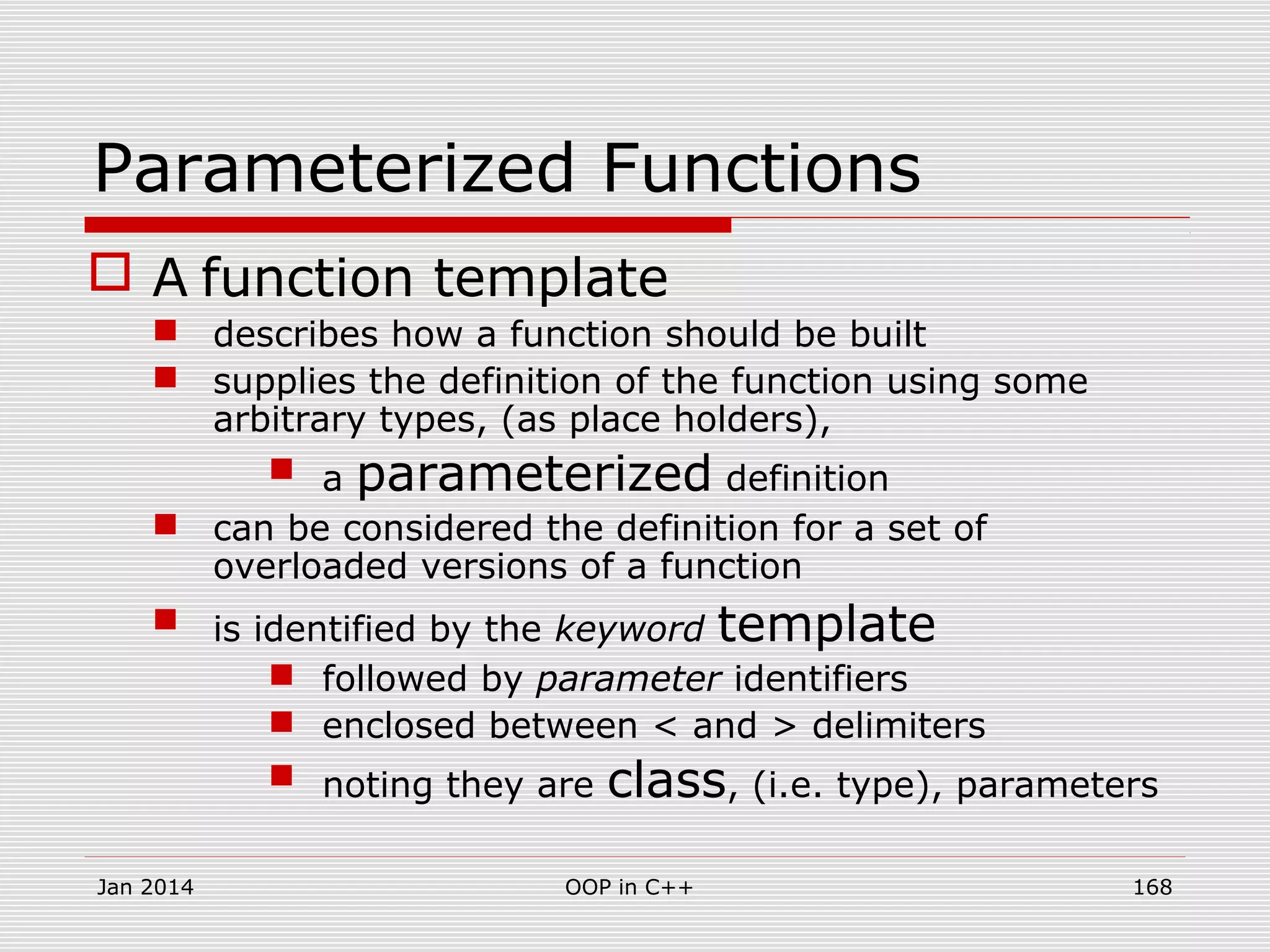
![Template Non-type Parameter
It is an ordinary parameter
template <class T, int size> T min (T
(&x[size]));
When min is called, size is replaced with
a constant value known at compile time
The actual value for a non-type
parameter must be a constant
expression.
Jan 2014 169OOP in C++](https://image.slidesharecdn.com/se-lecture02-30oopinc-140803025901-phpapp02/75/OOP-in-C-169-2048.jpg)
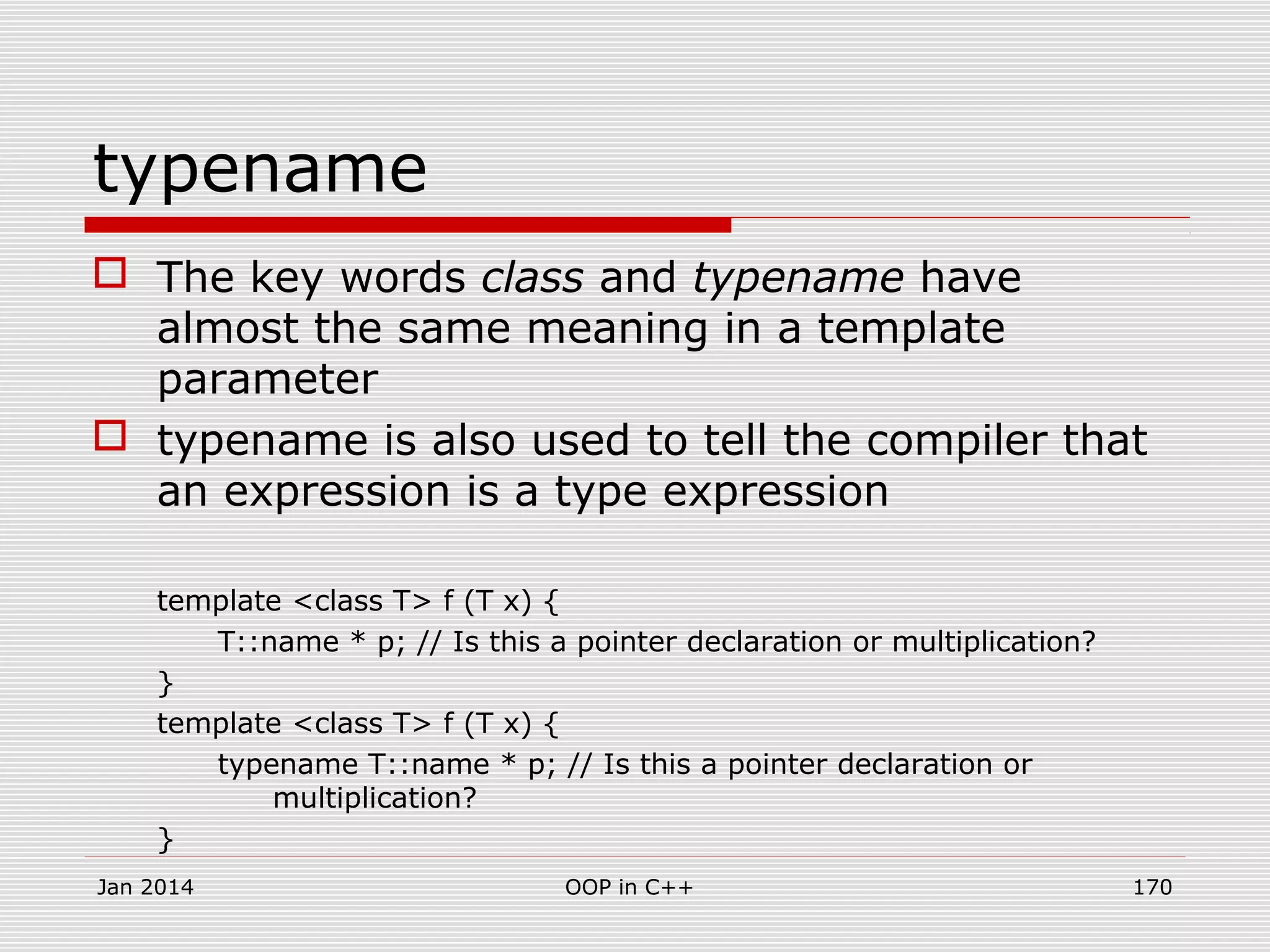
![Template Argument Deduction
Each item in the template parameter list is a
template argument
When a template function is invoked, the
values of the template arguments are
determined by seeing the types of the function
arguments
template <class T, int size> Type min( T(&x[size]));
int pval[9]; min(pval); //Error!!
Jan 2014 171OOP in C++](https://image.slidesharecdn.com/se-lecture02-30oopinc-140803025901-phpapp02/75/OOP-in-C-171-2048.jpg)
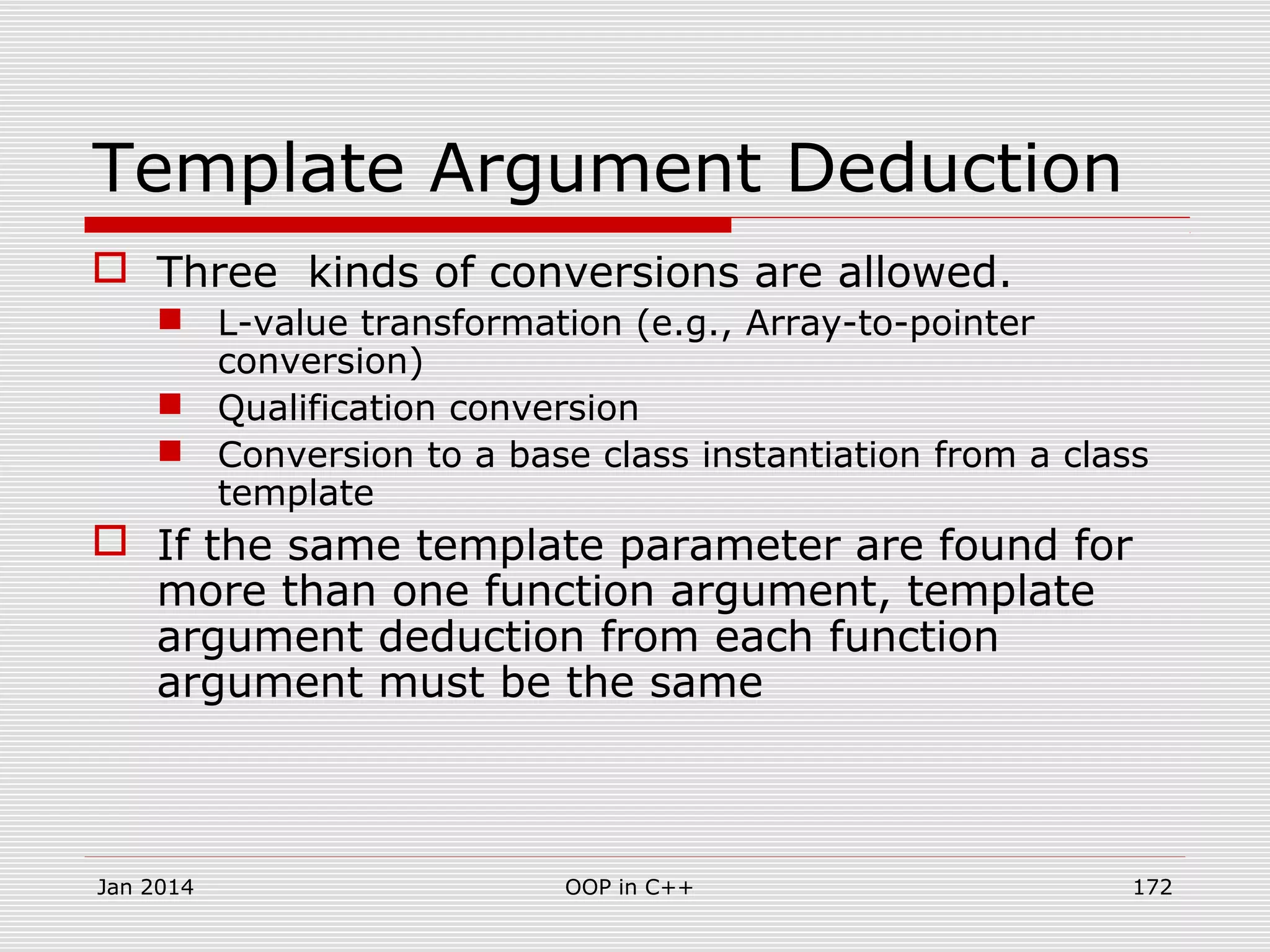
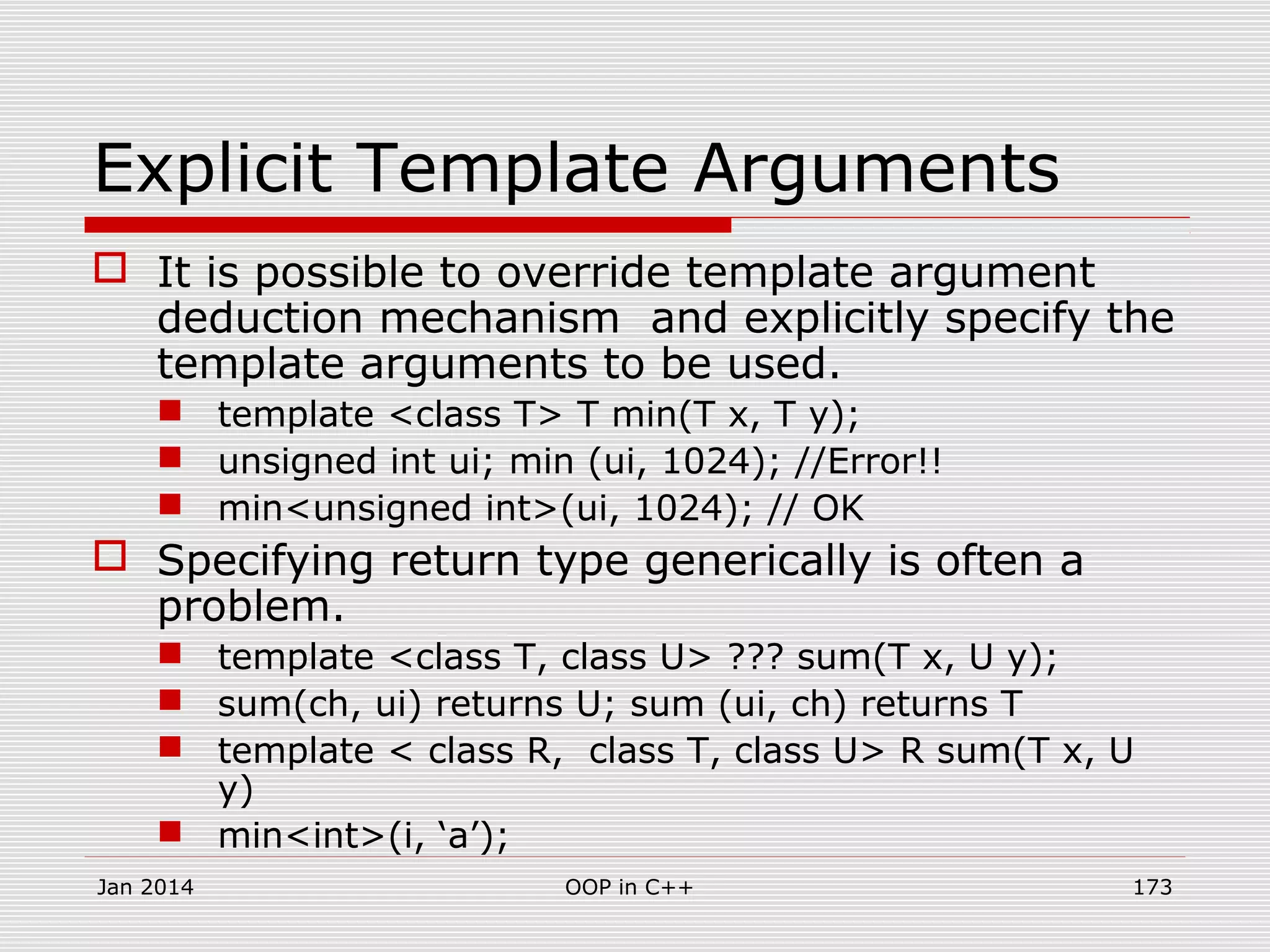

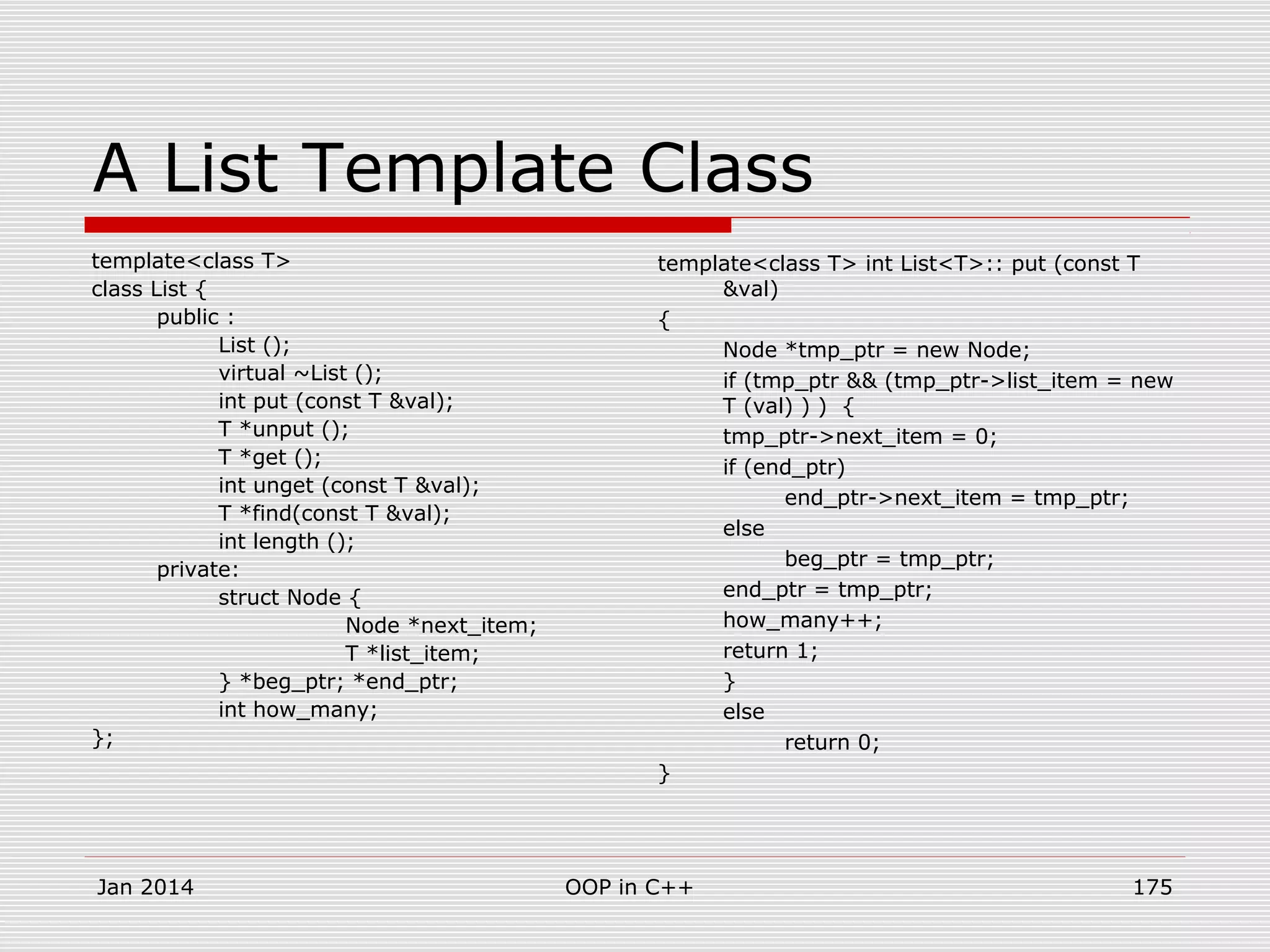
![Using a Template Class
int main () {
register int i, *iptr;
String *sptr;
char *somedata [] = {“one”, “two”, “three”, “four”,
“five”, “six”, “seven”, “eight”, “nine”, “ten”};
List<int> ii;
List<String> is;
for (i = 1; i <=10; i++) { ii.put(i); }
cout << “The List<int> contains “ ;
cout << ii.length () << “ itemsn” ;
return 0;
}
Jan 2014 176OOP in C++](https://image.slidesharecdn.com/se-lecture02-30oopinc-140803025901-phpapp02/75/OOP-in-C-176-2048.jpg)
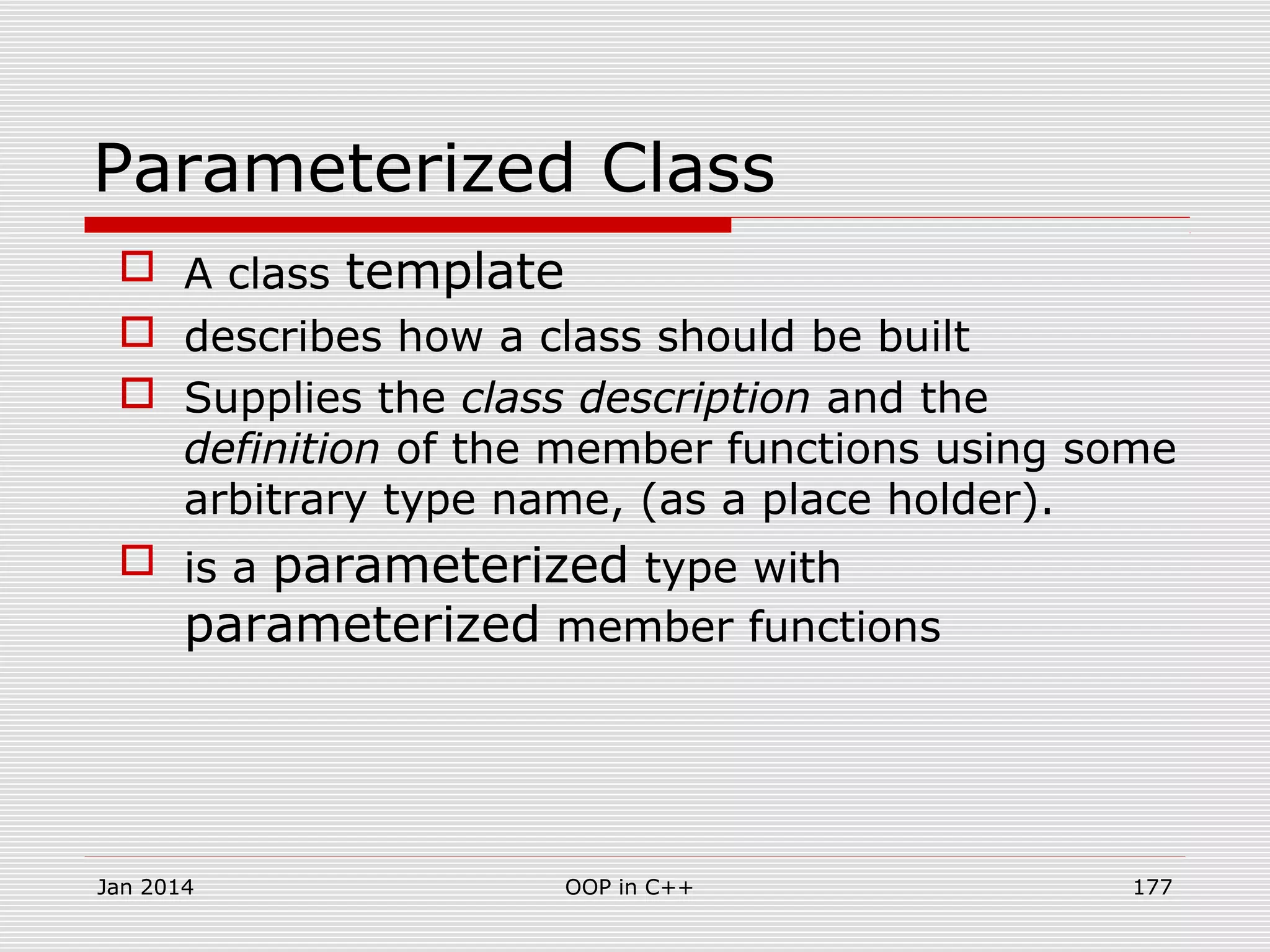
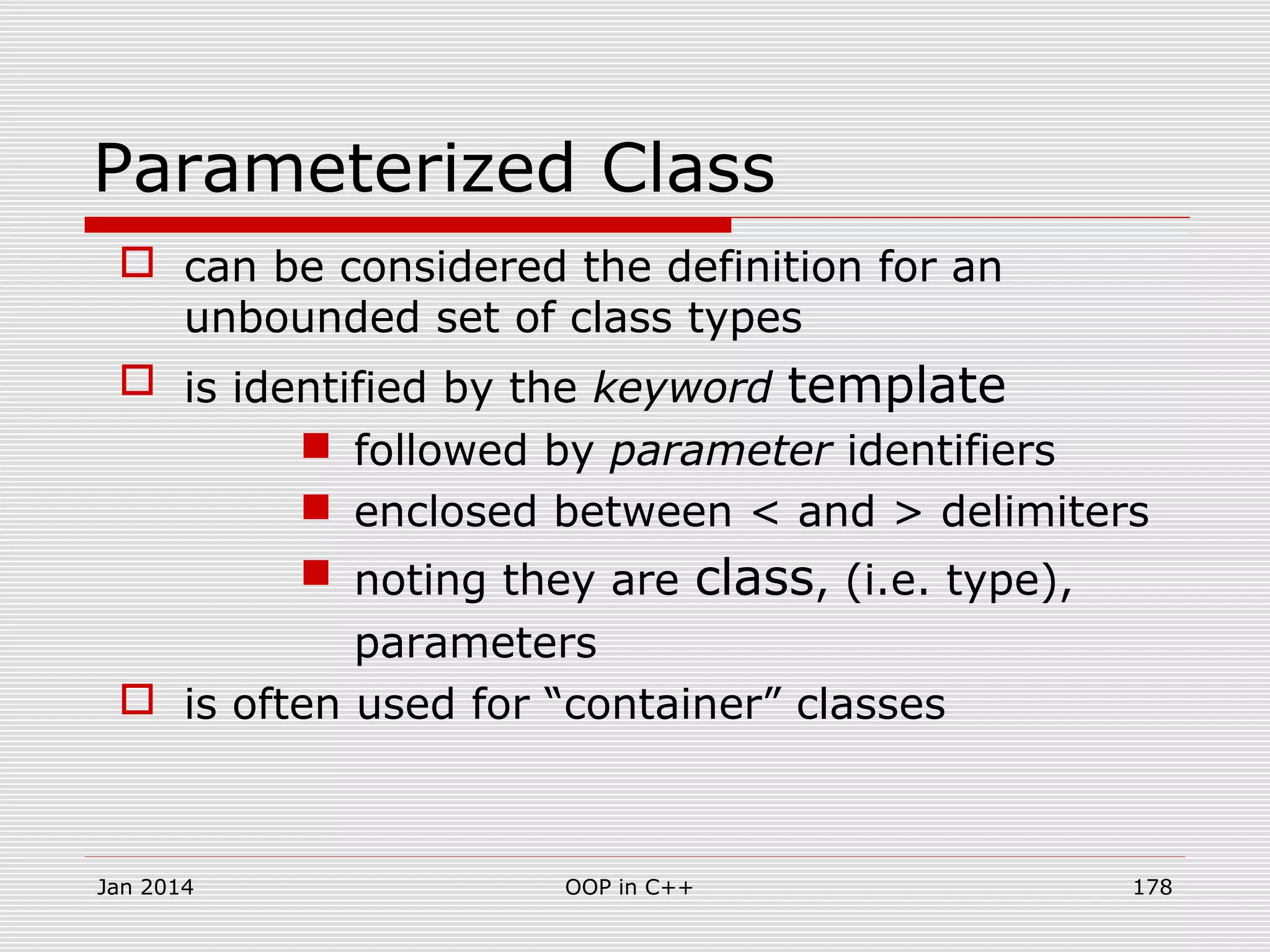
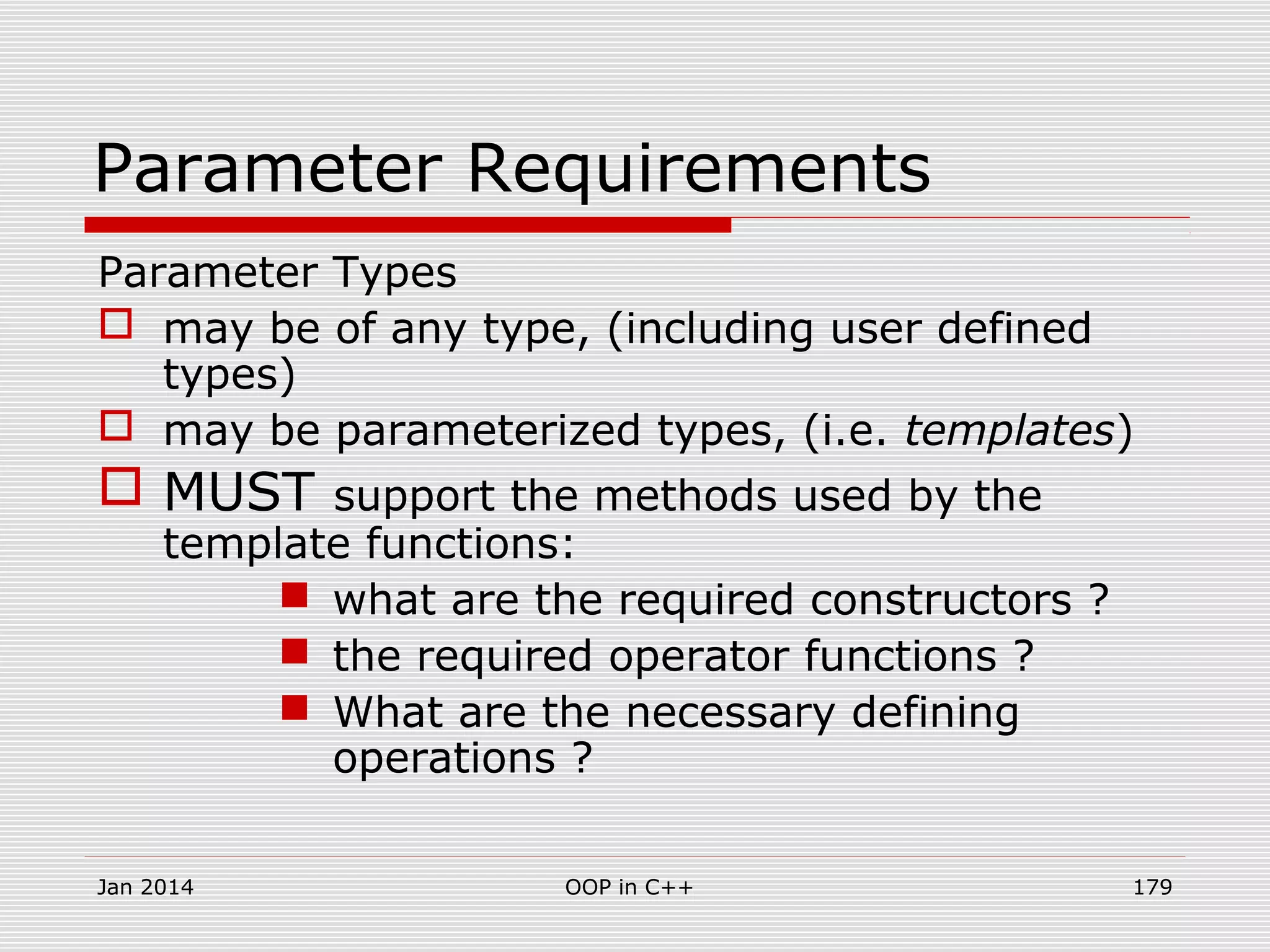
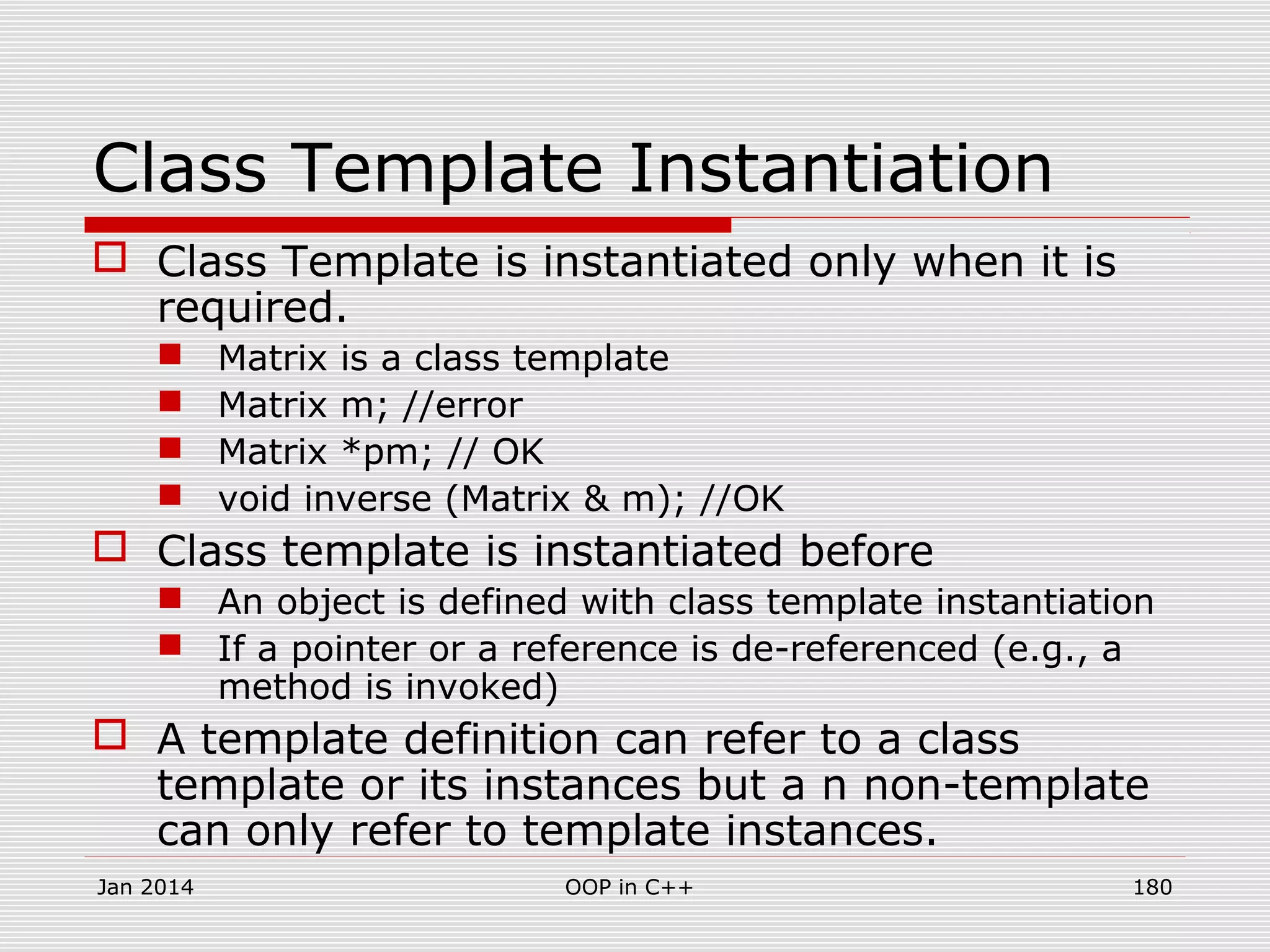
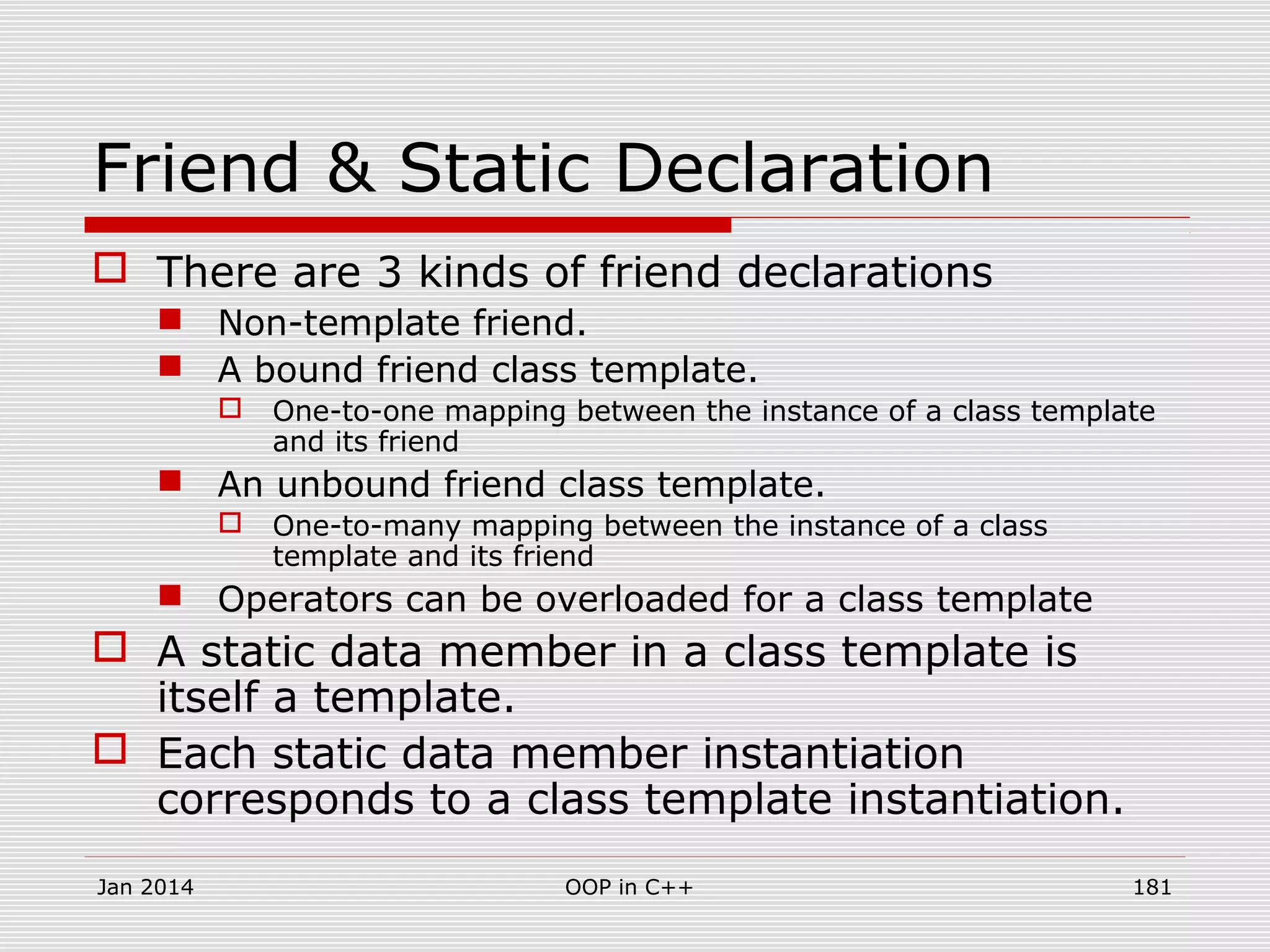
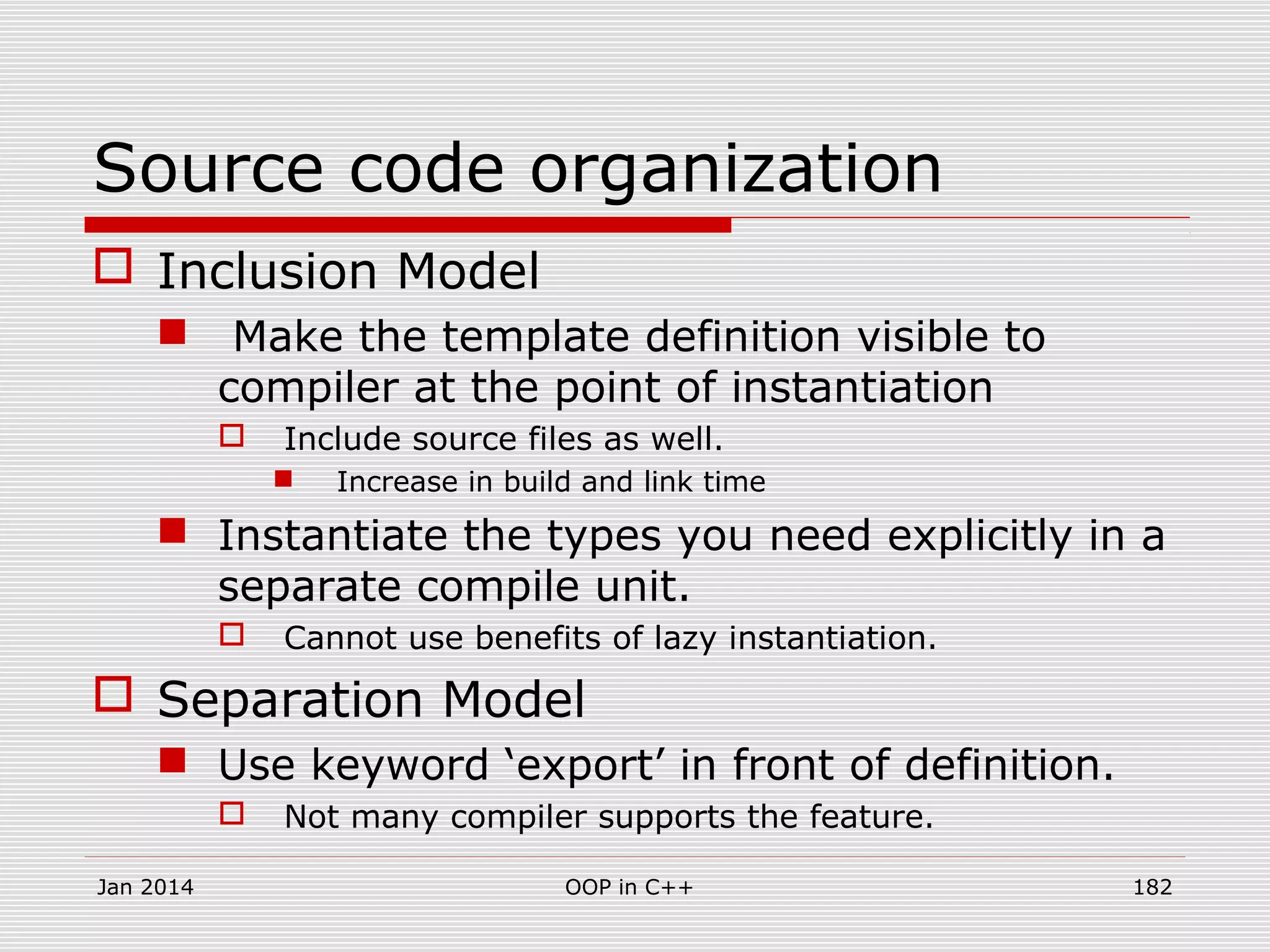
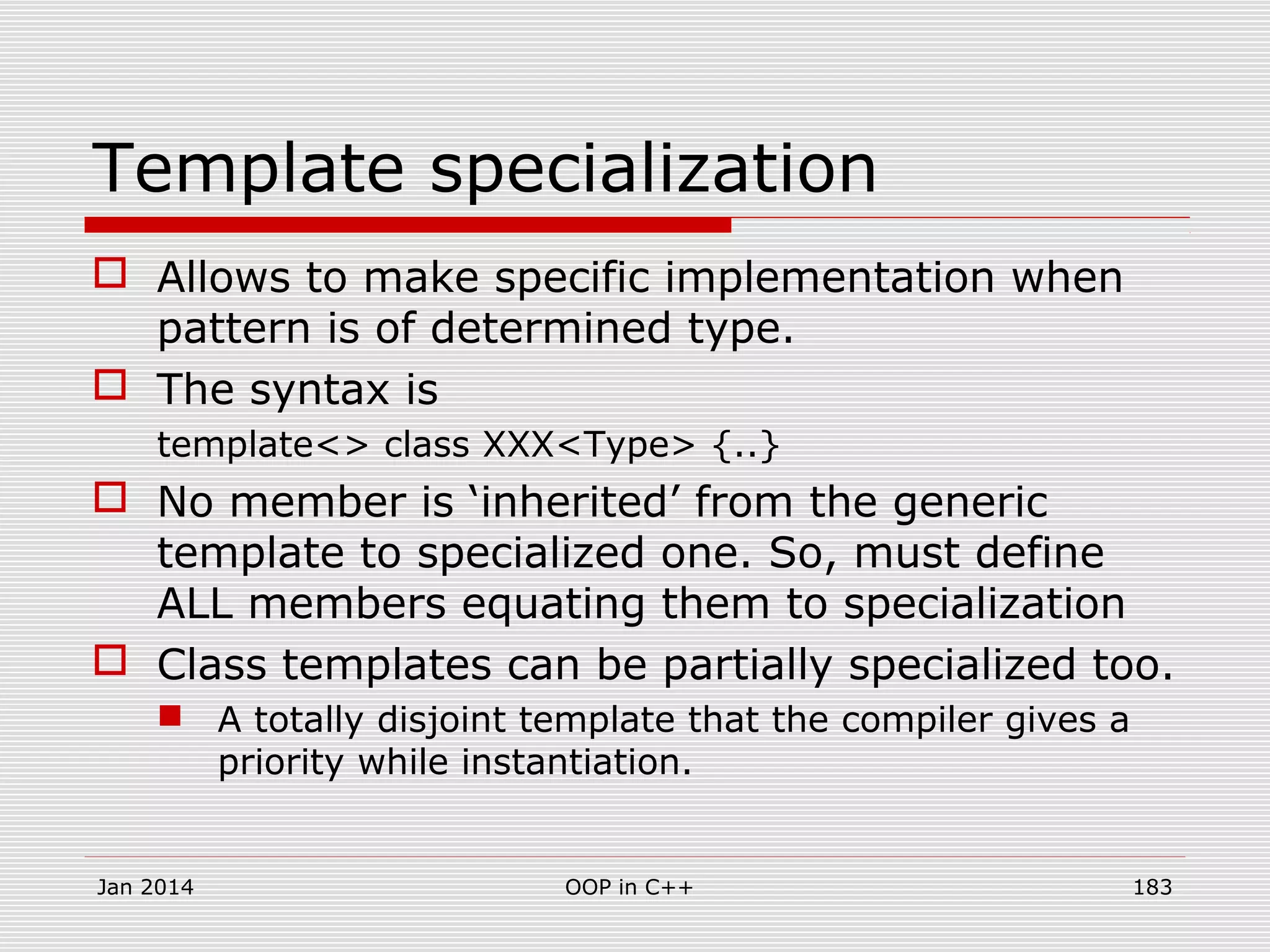
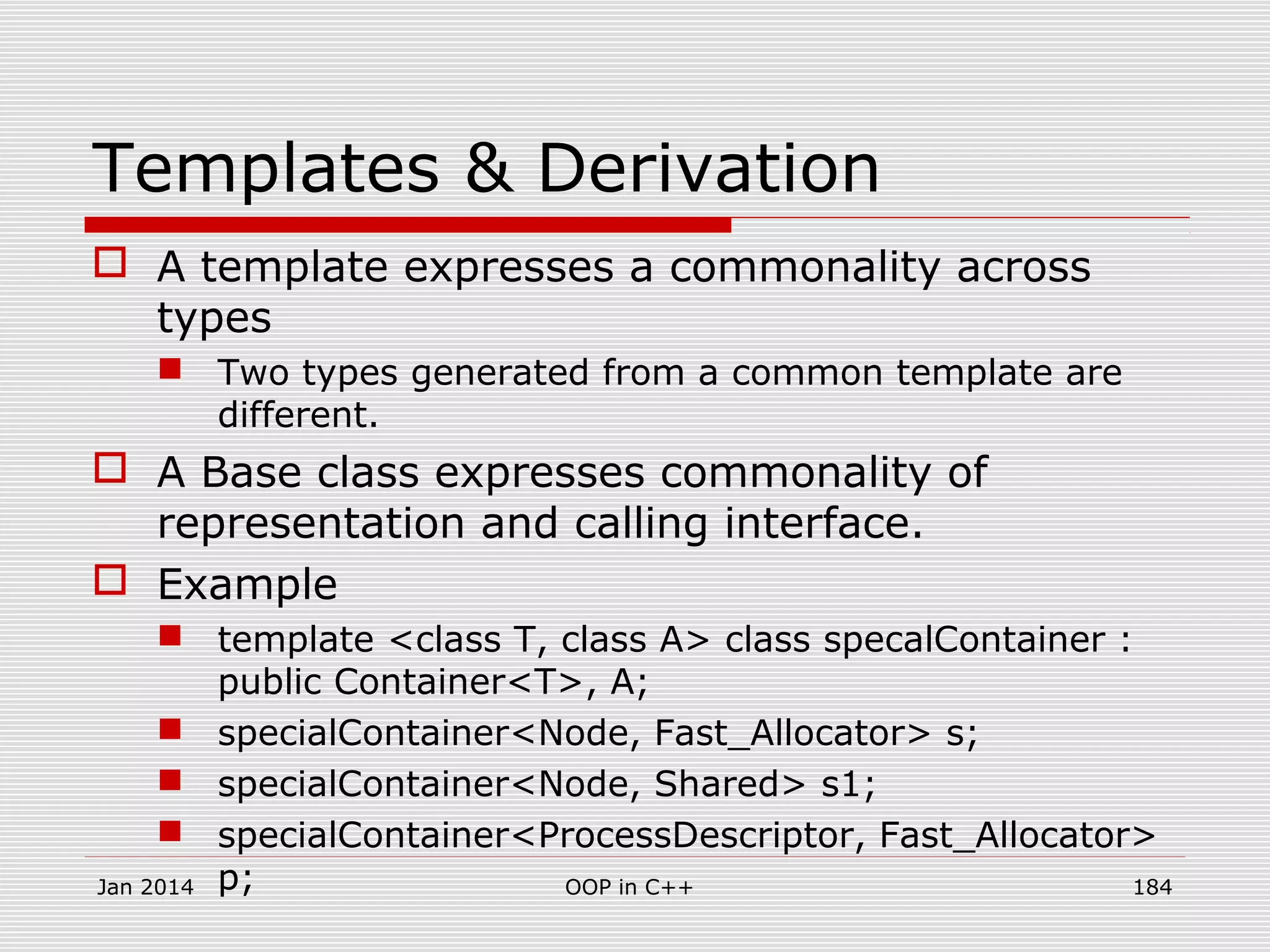
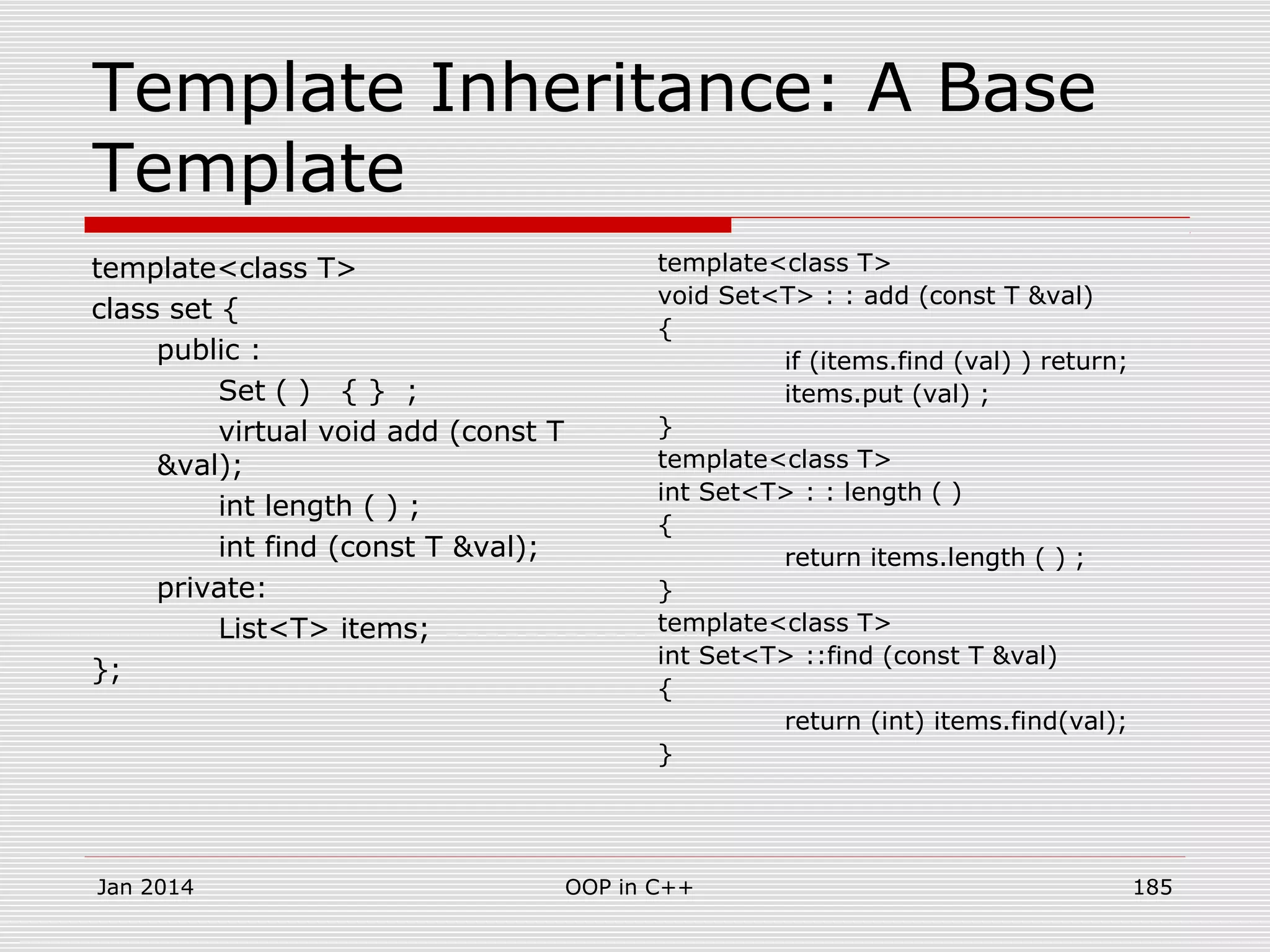
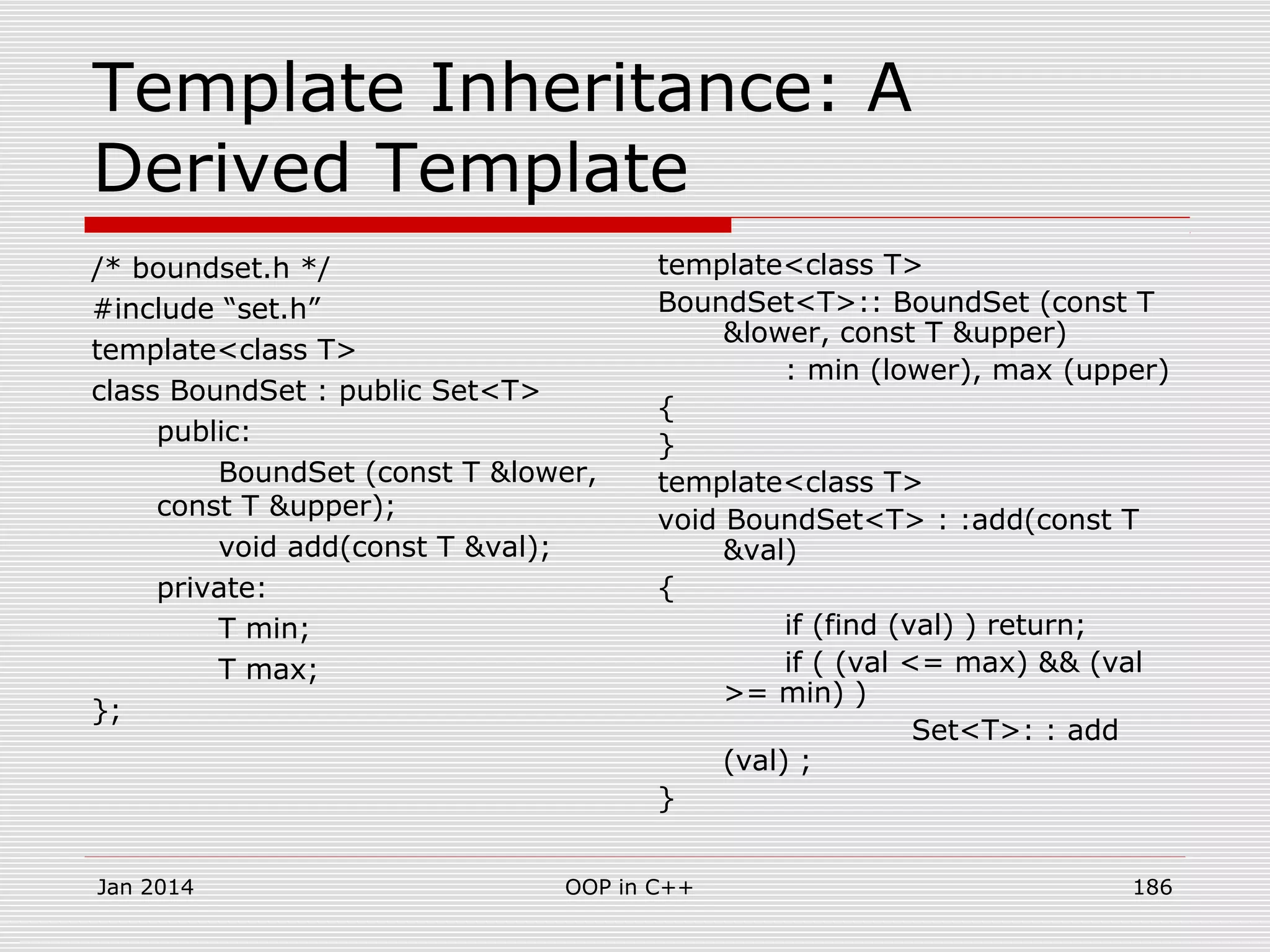
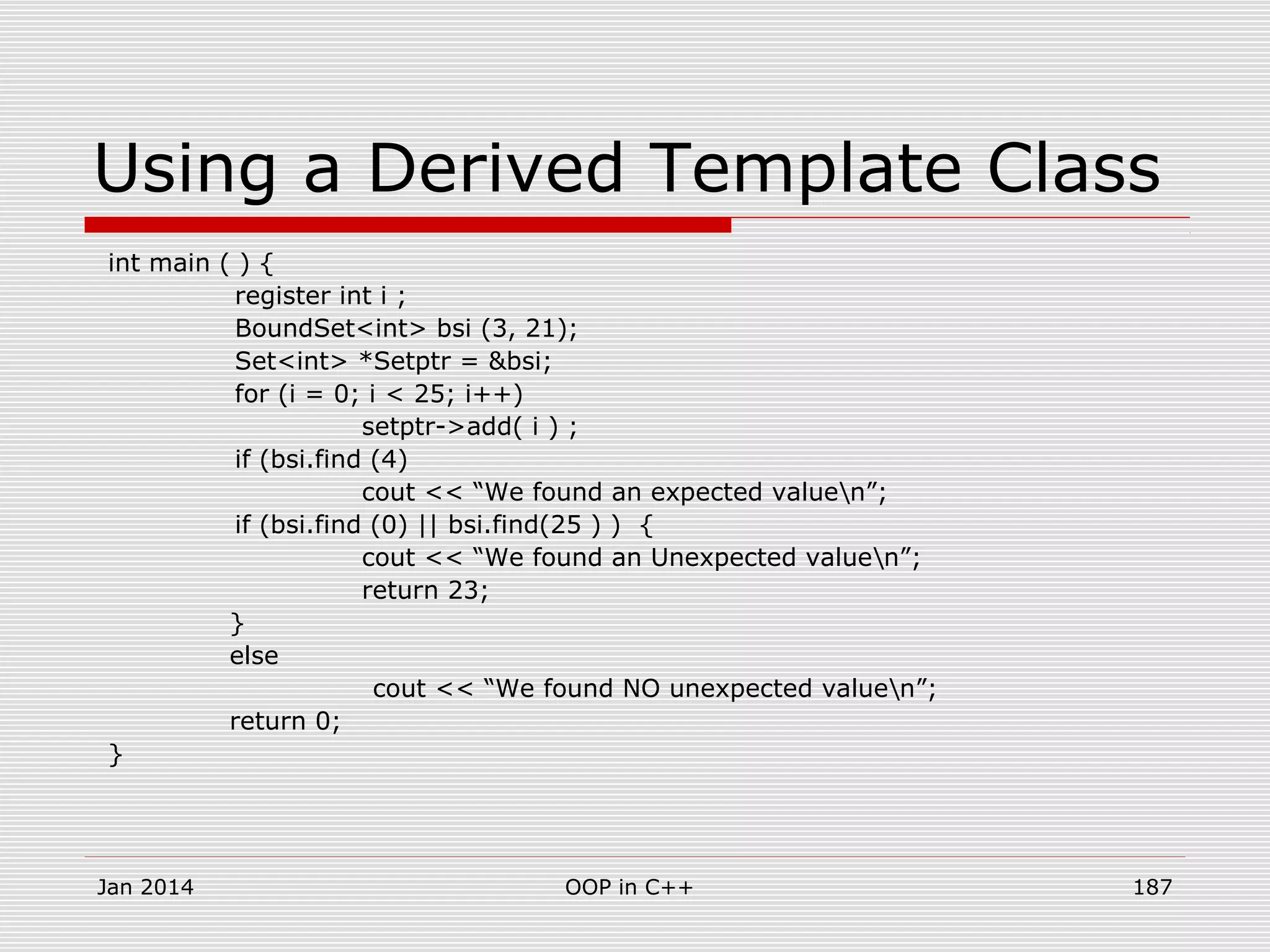
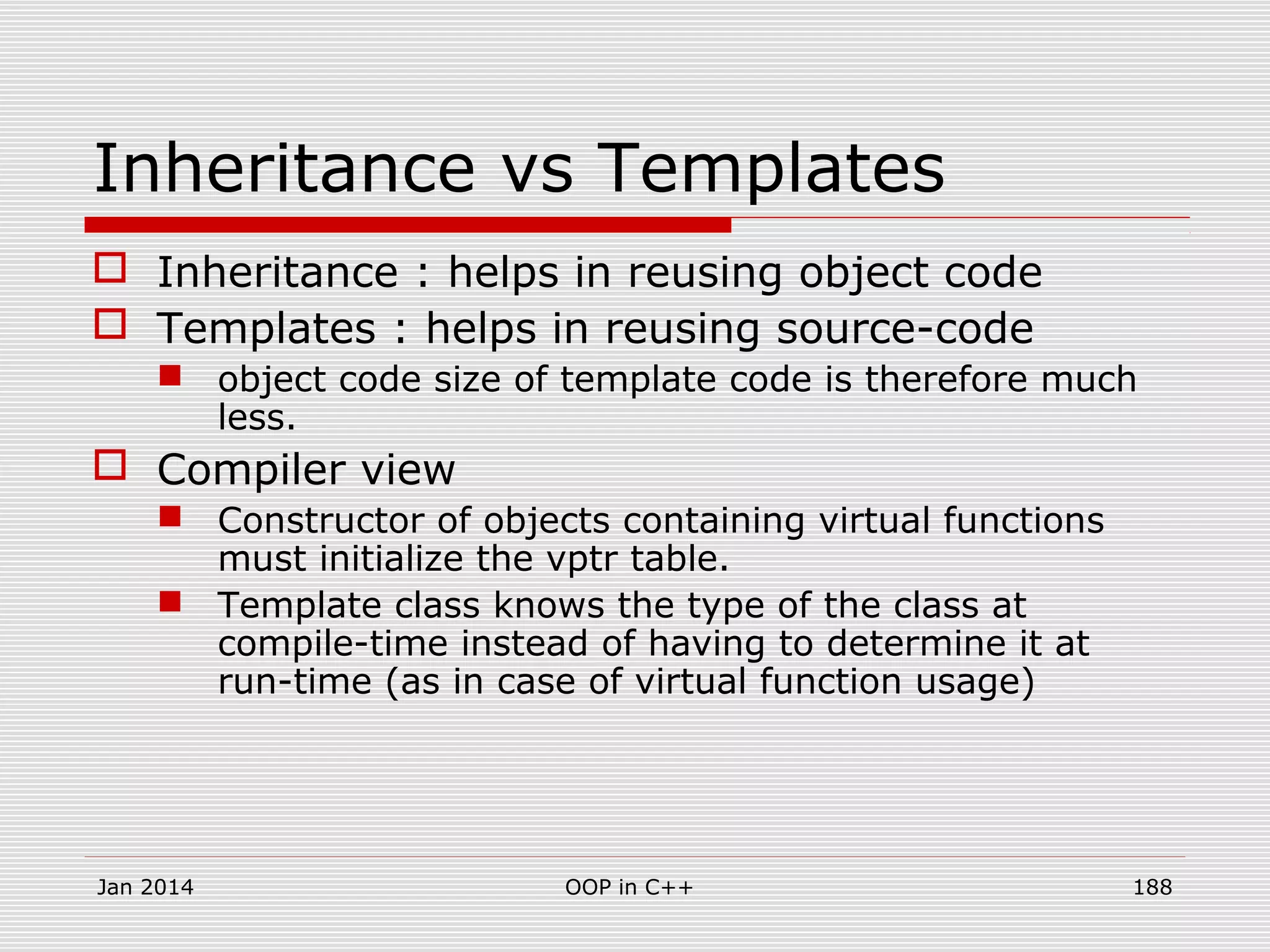
![Inheritance vs Templates:
Example
Implement the following command.
# ECHO infile outfile
main() {
(argc > 2 ? ofstream
(argv[2] ,ios::out) : cout)
<<
(argc > 1 ? ifstream (argv[1],
ios::in) : cin)
.rdbuf();
}
main()
{
fstream in, out;
if (argc > 1) in.open(argv[1],
ios::in);
if (argc > 2) out.open(argv[2],
ios::out);
Process(in.is_open() ? in : cin,
out.is_open() ? out :
cout);
}
How to implement ‘Process’ ?
Two ways to get the
polymorphic behavior
virtual function and templates
Jan 2014 189OOP in C++](https://image.slidesharecdn.com/se-lecture02-30oopinc-140803025901-phpapp02/75/OOP-in-C-189-2048.jpg)
